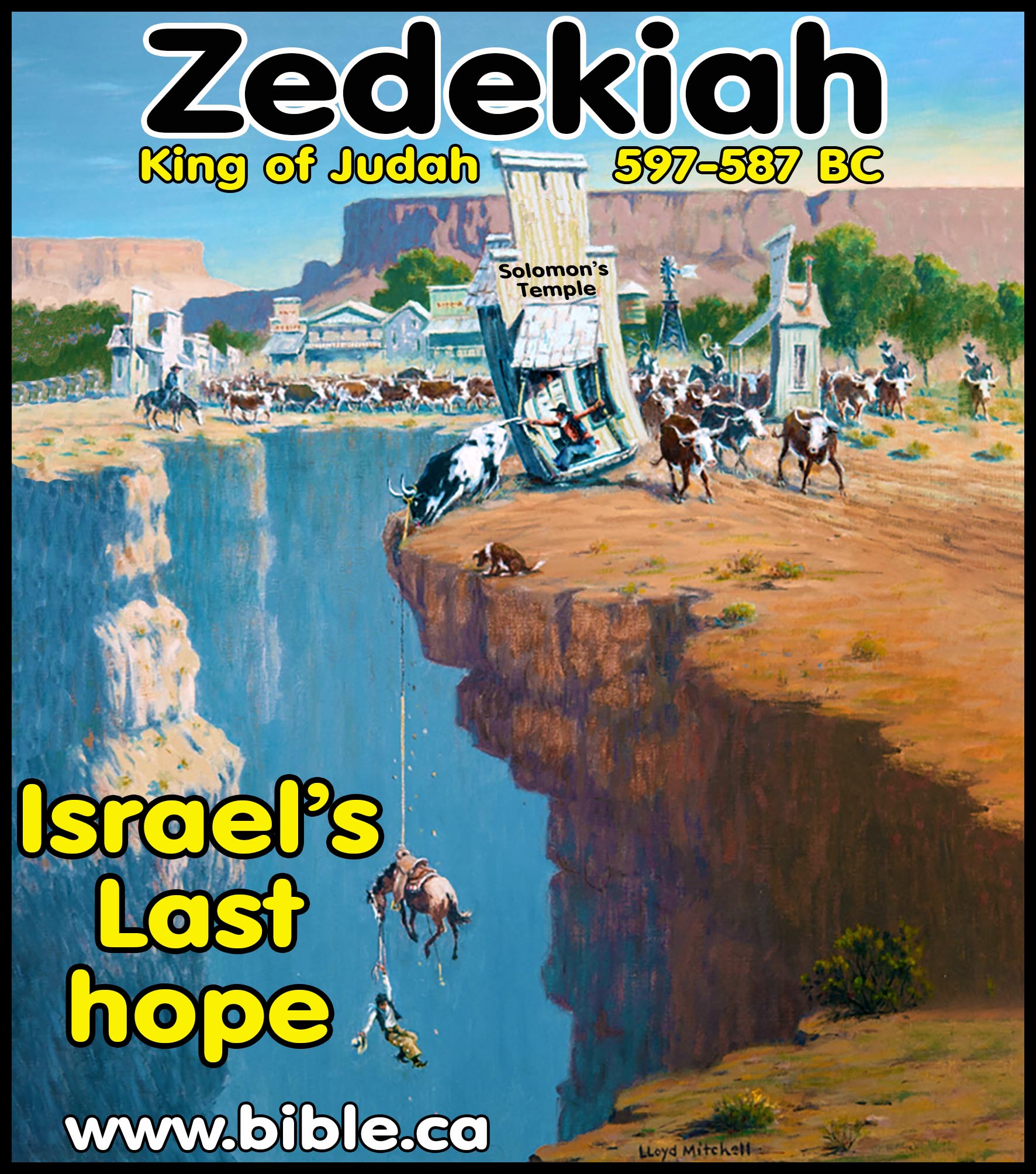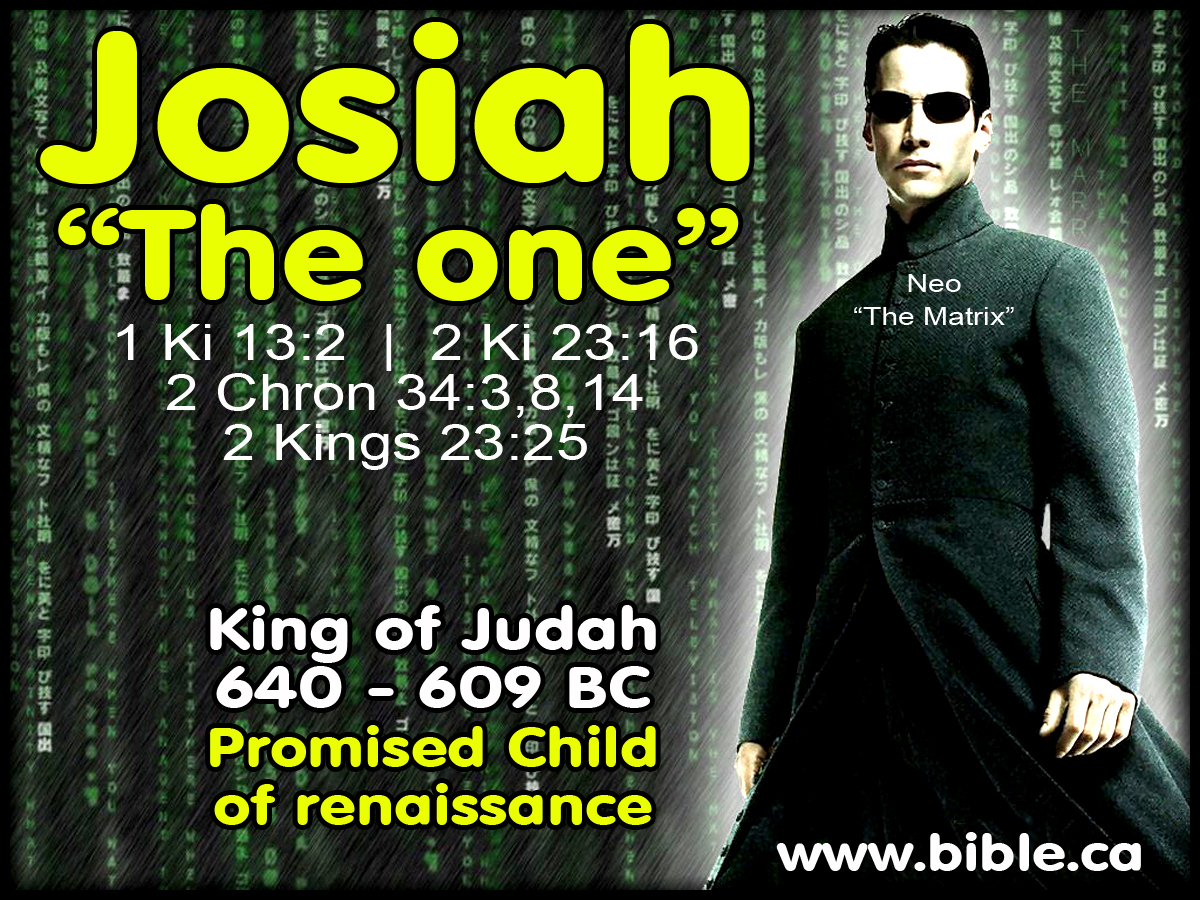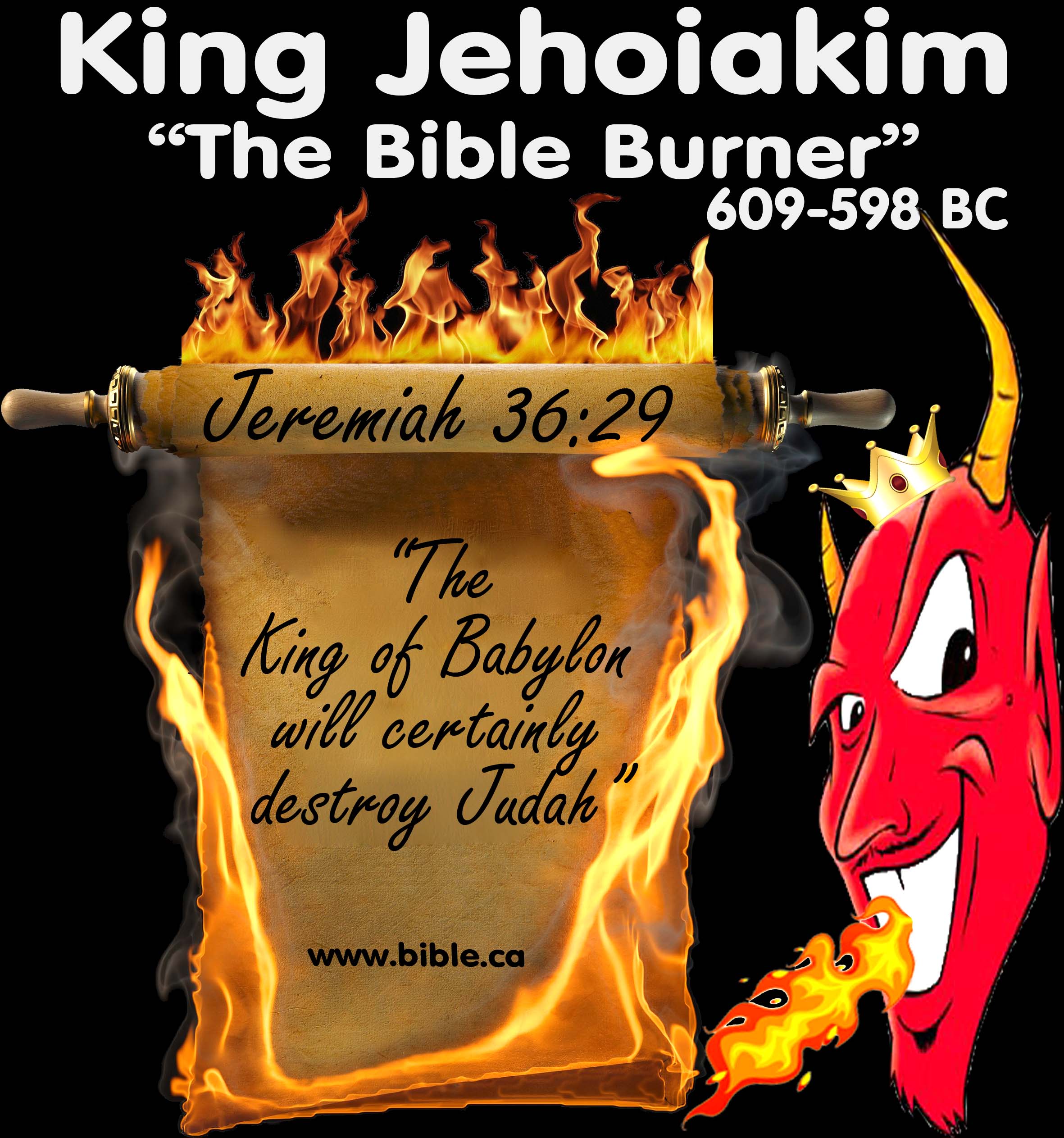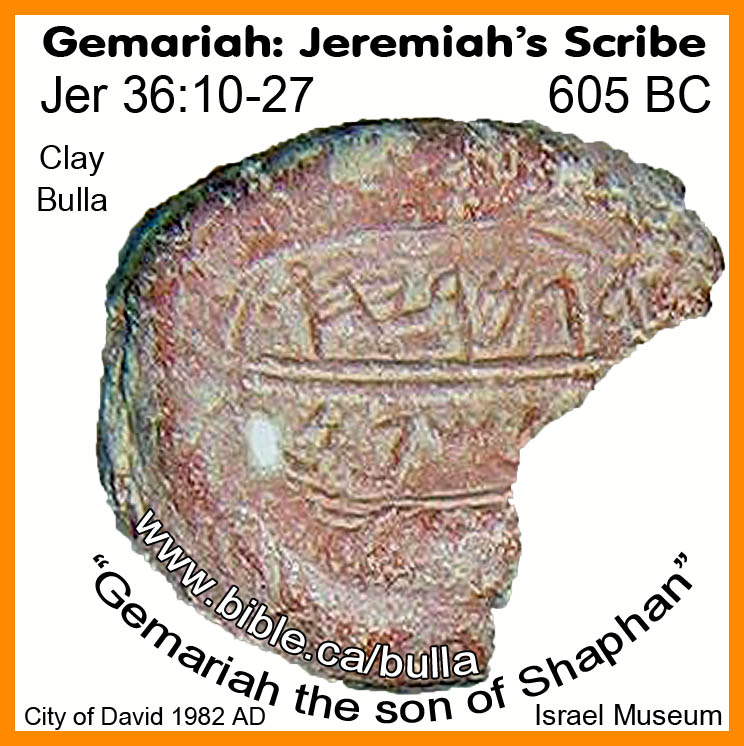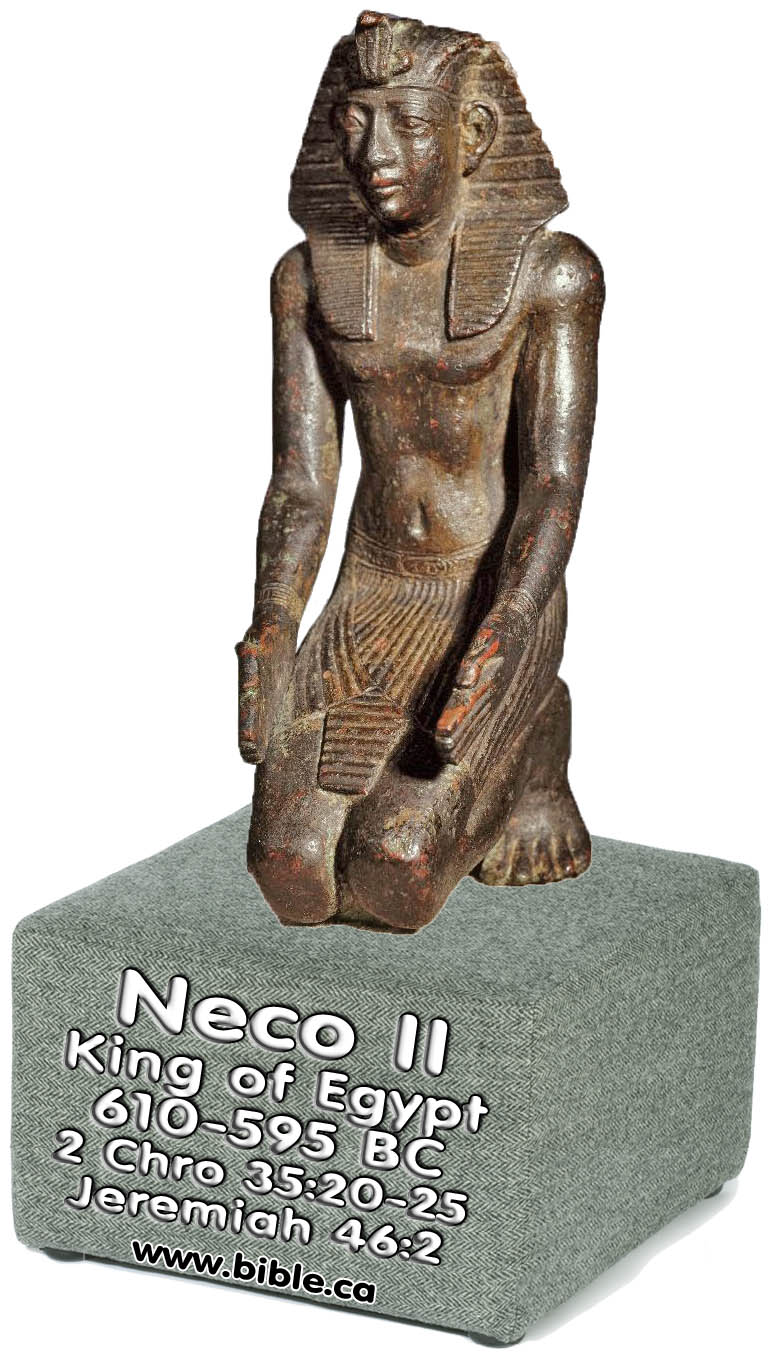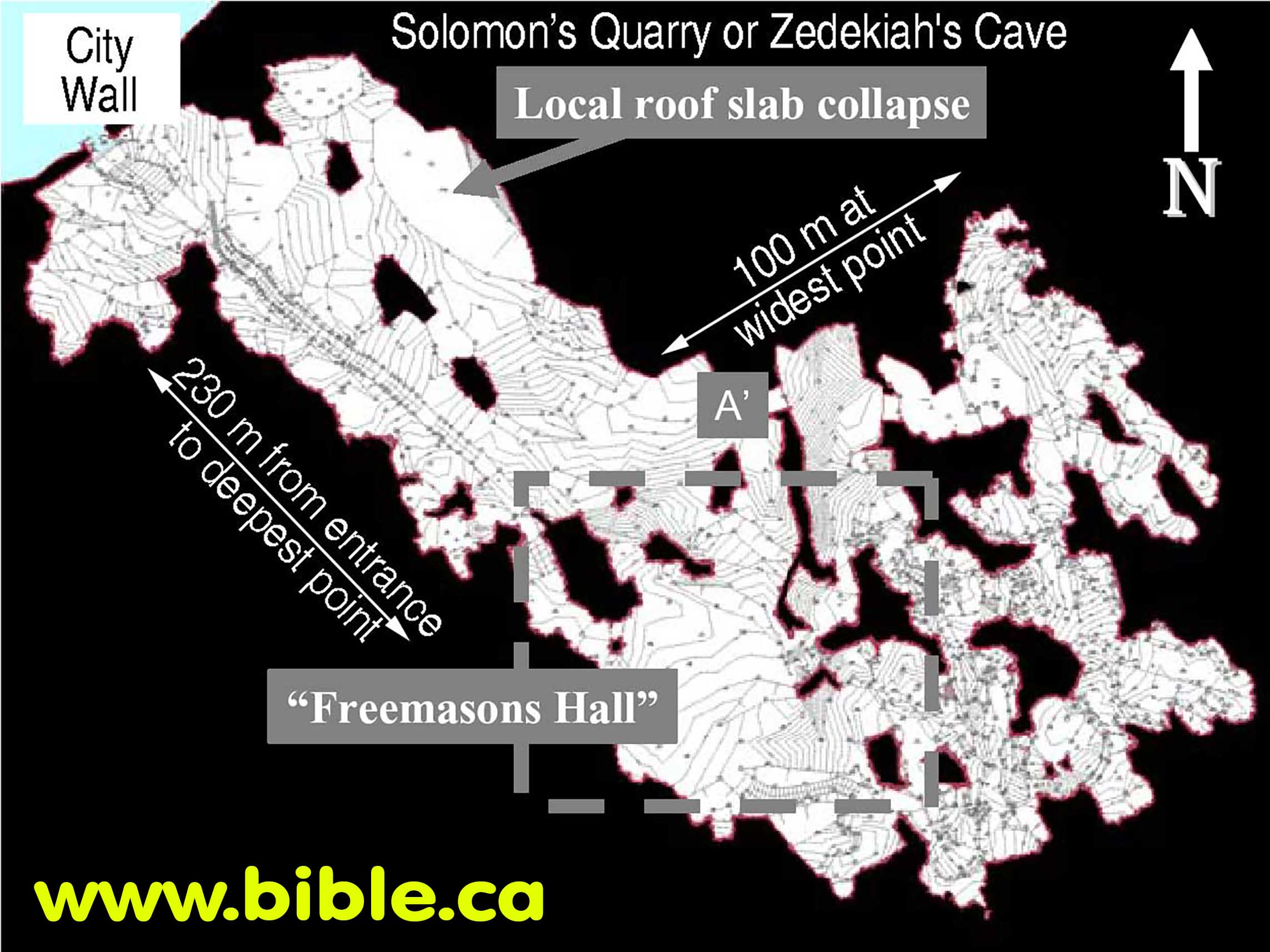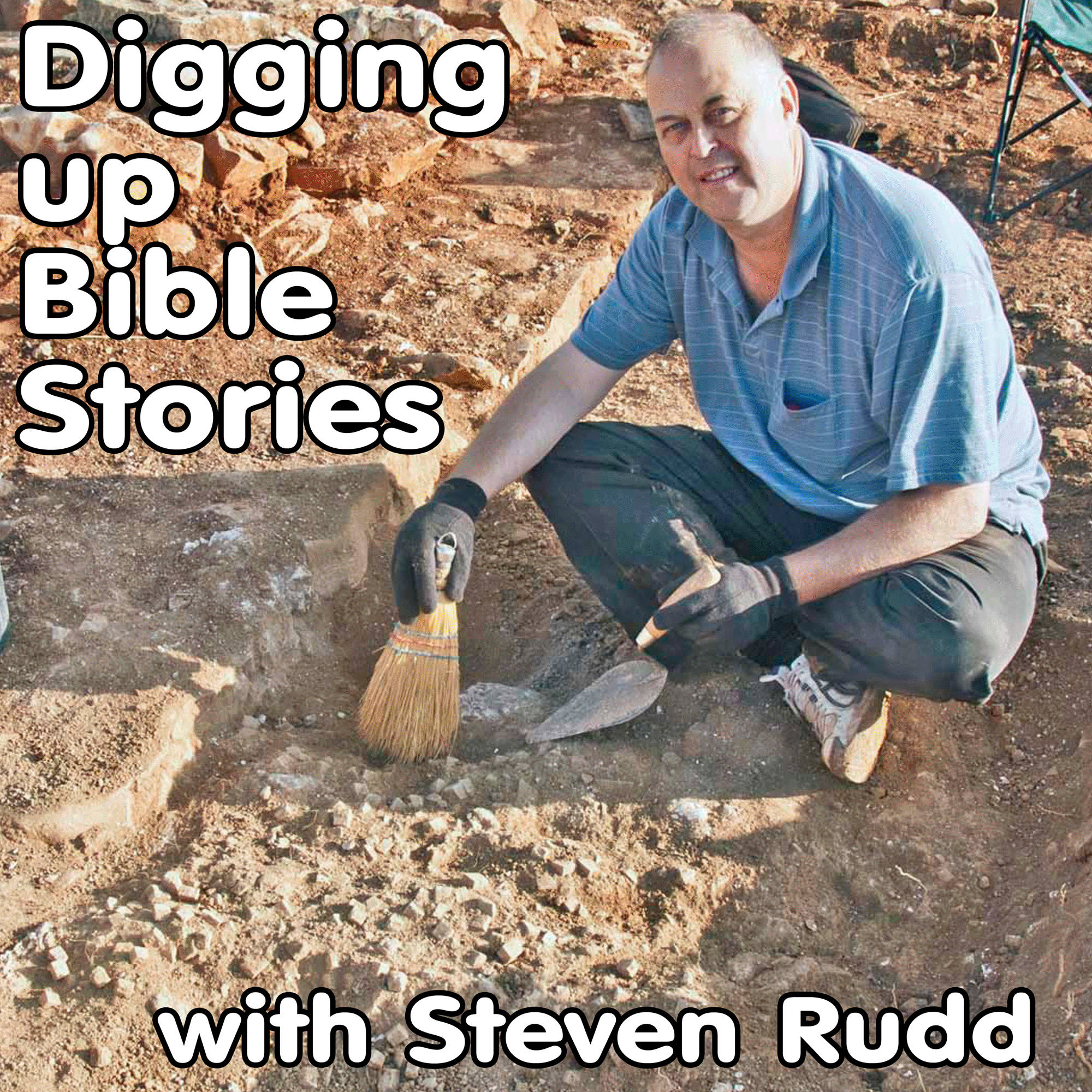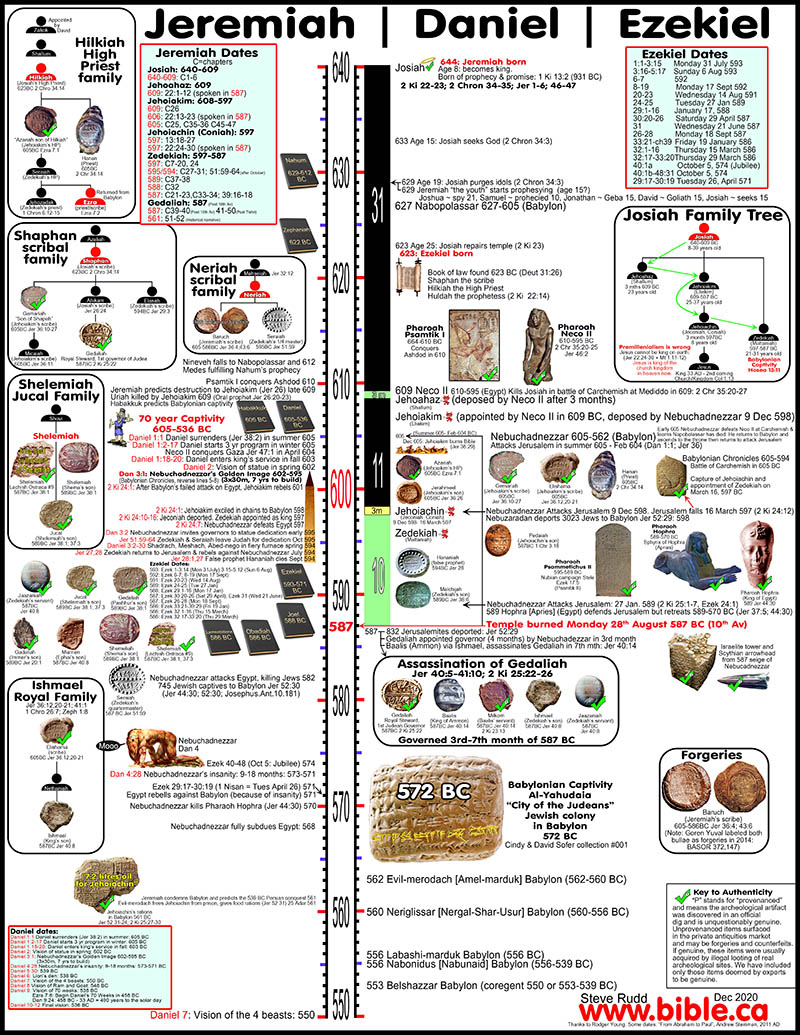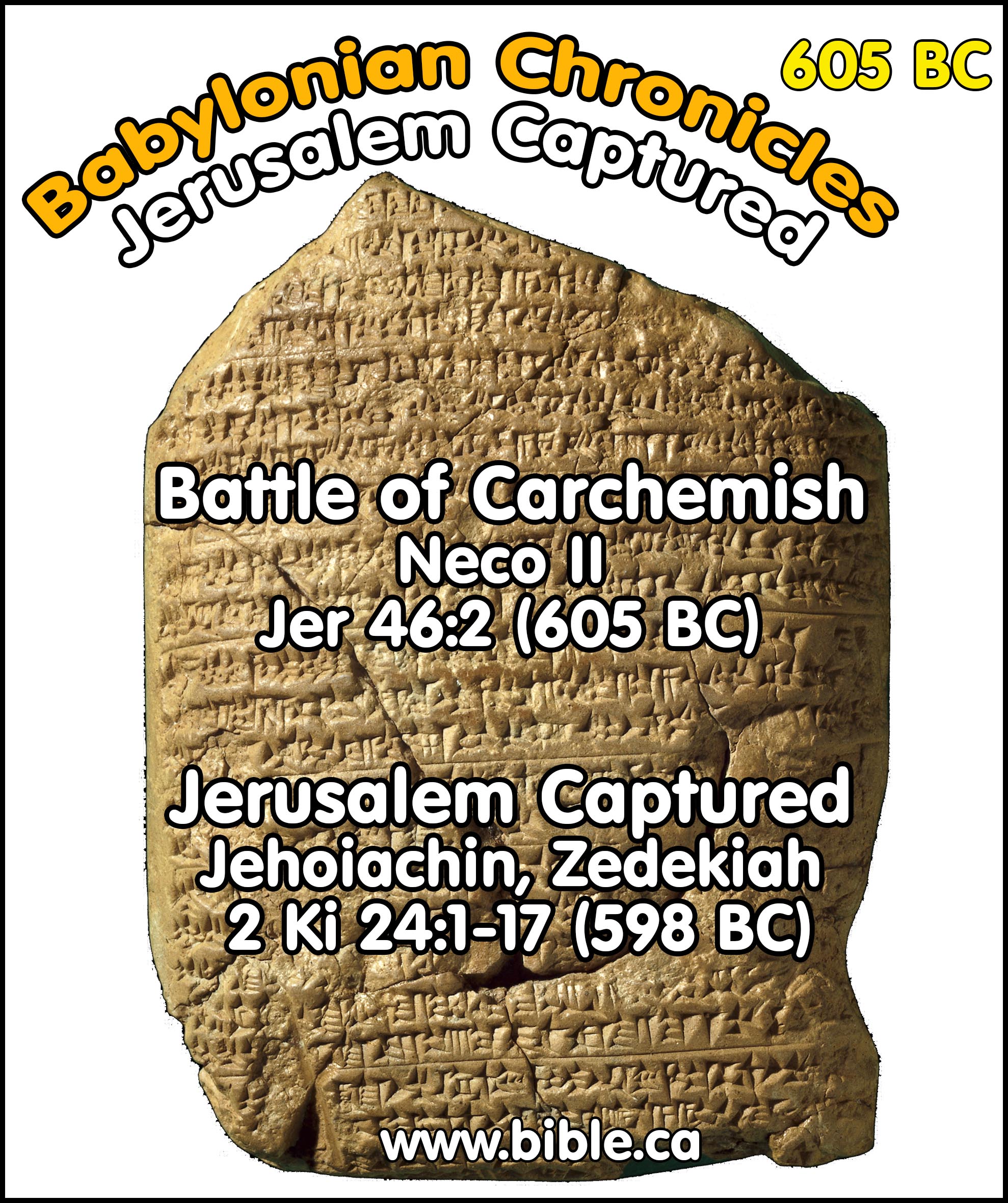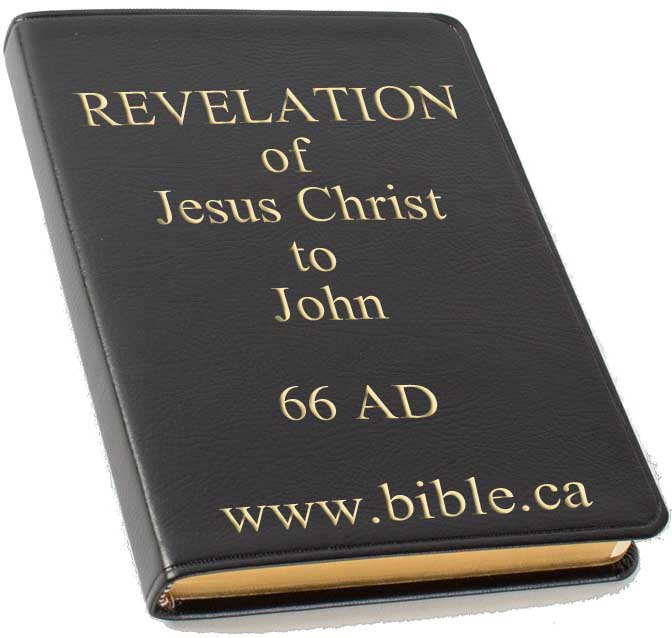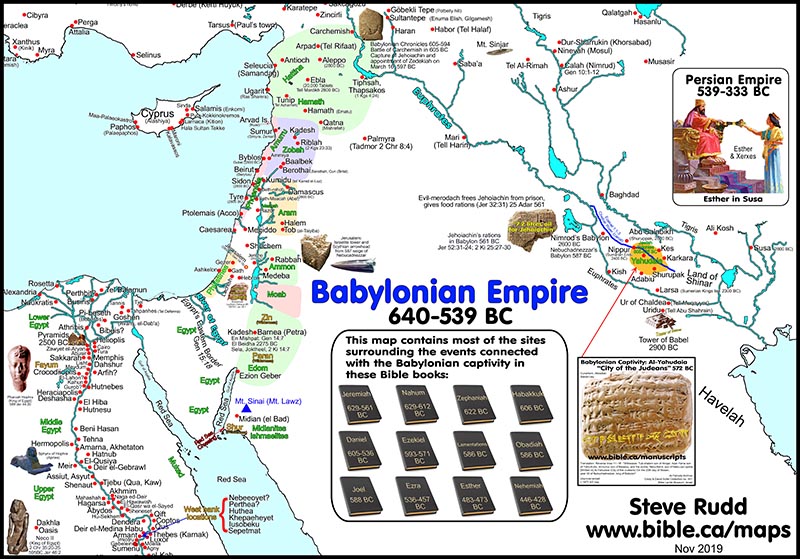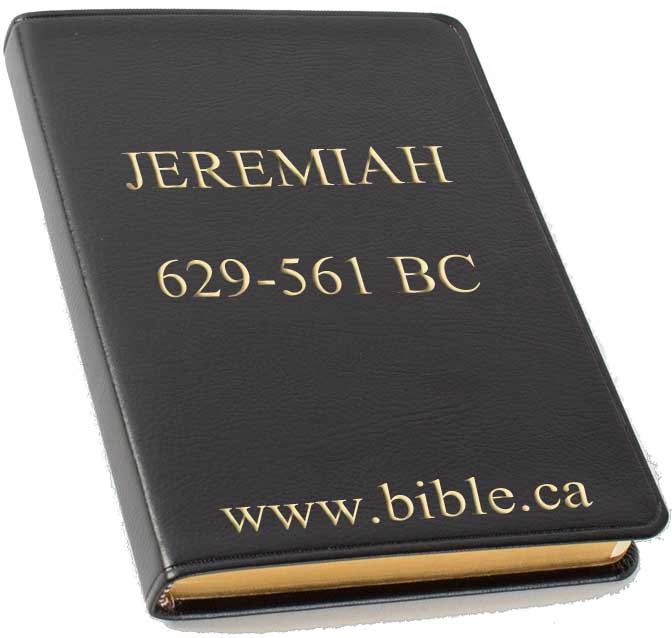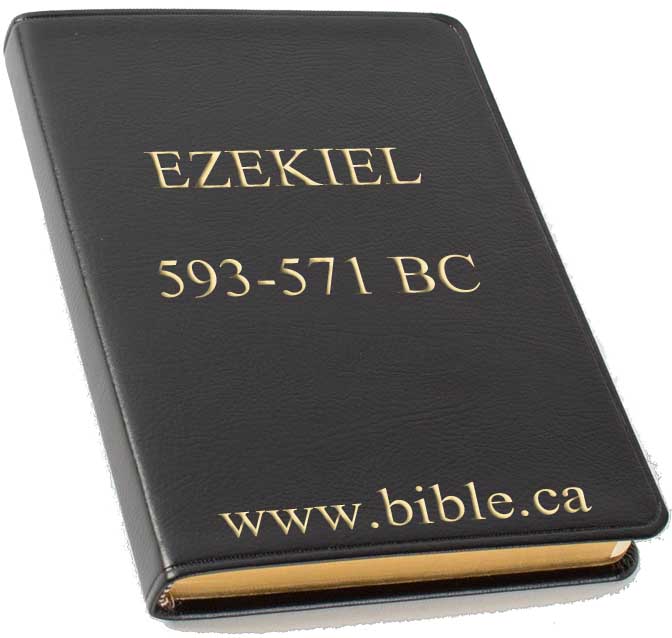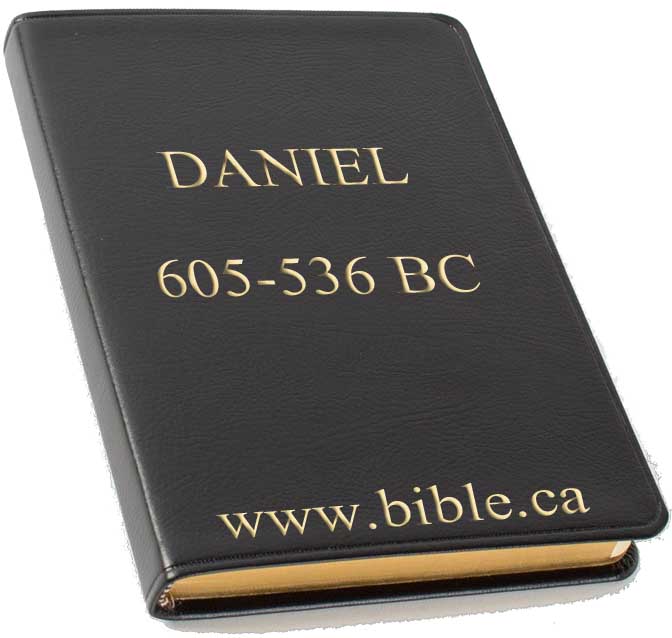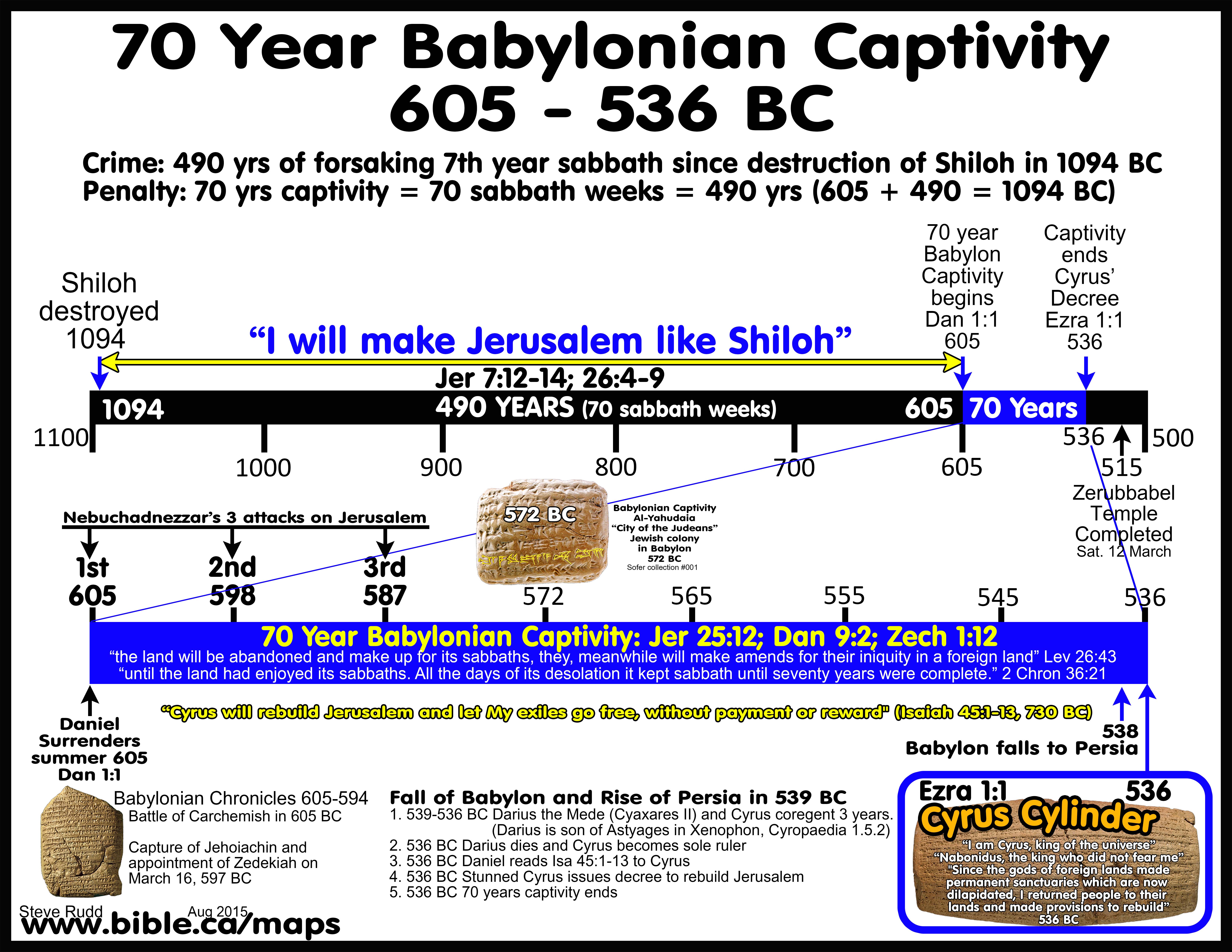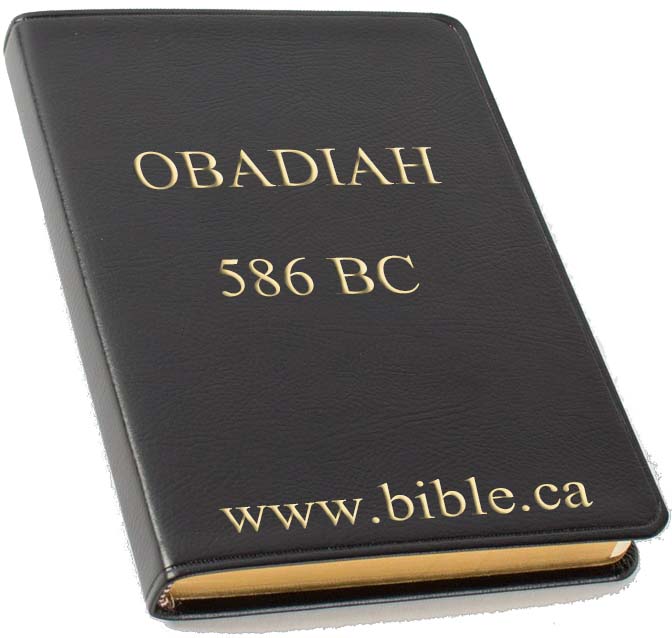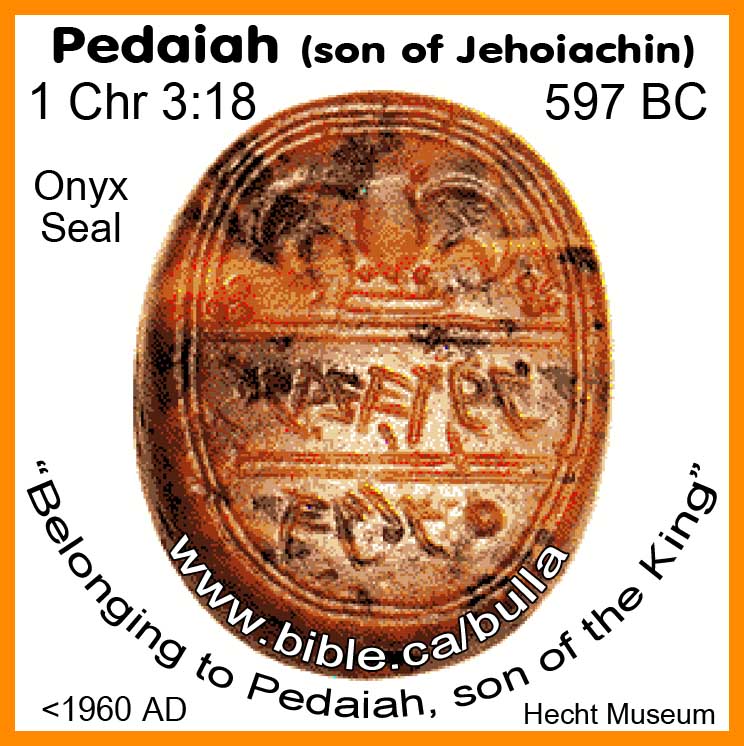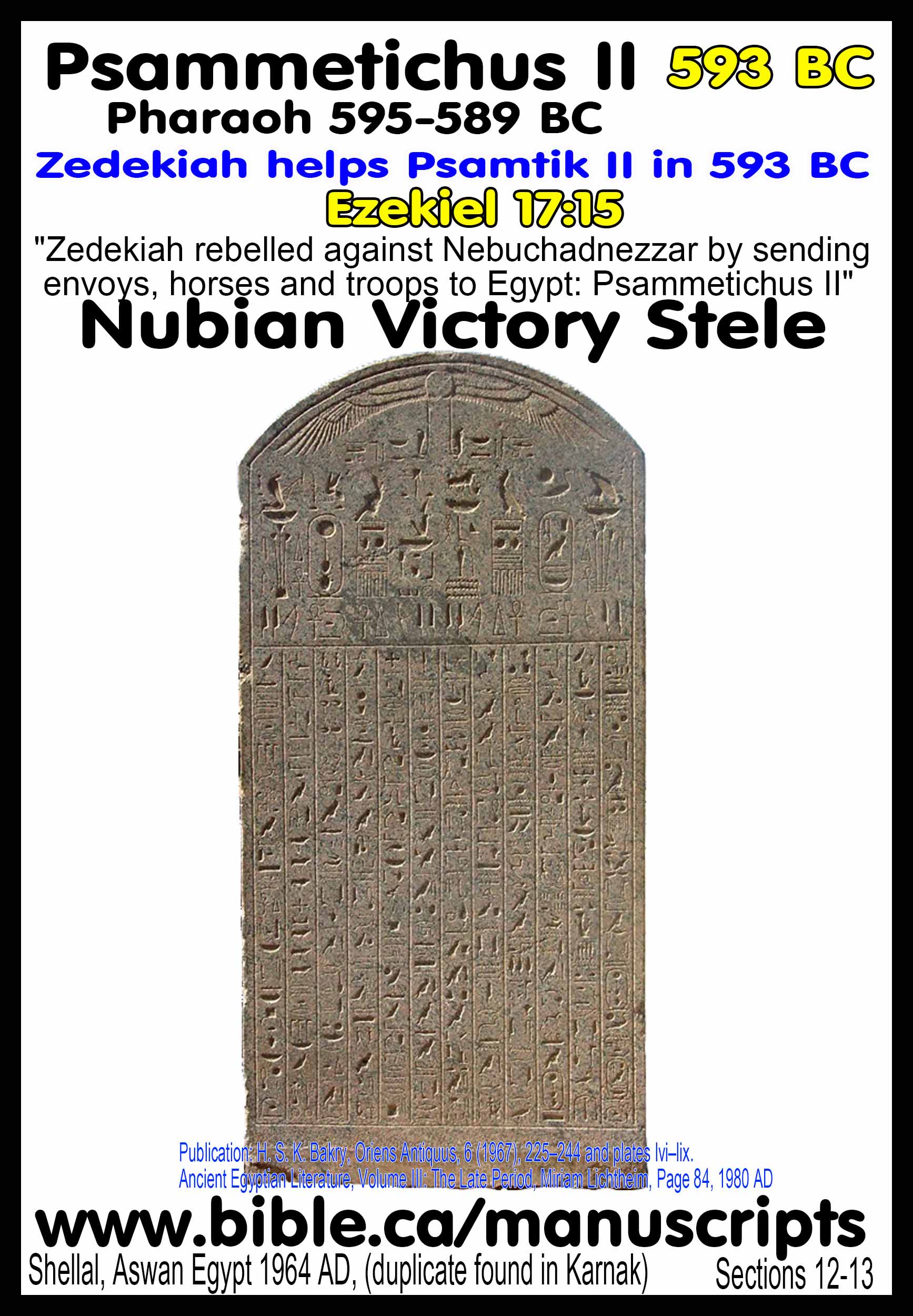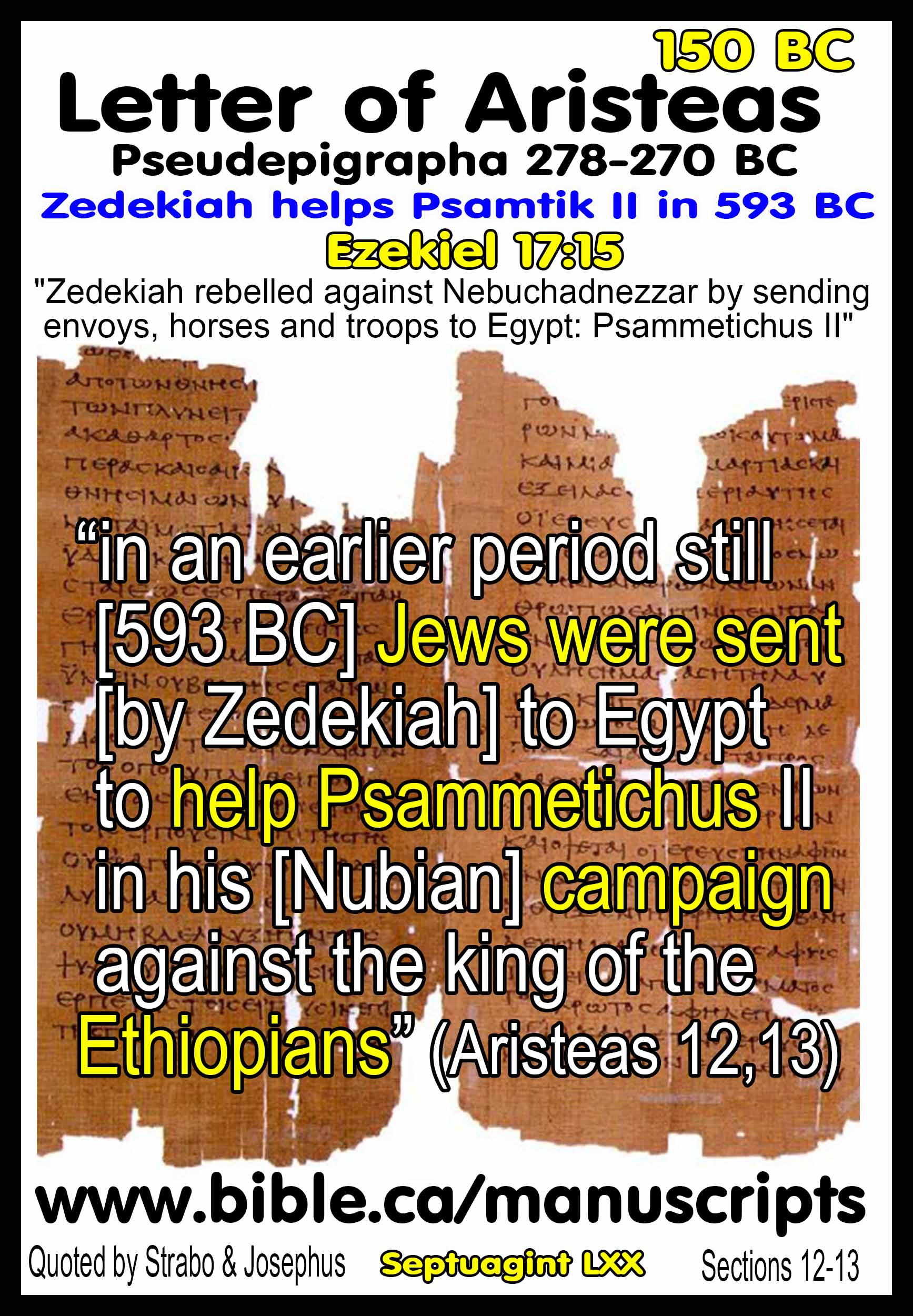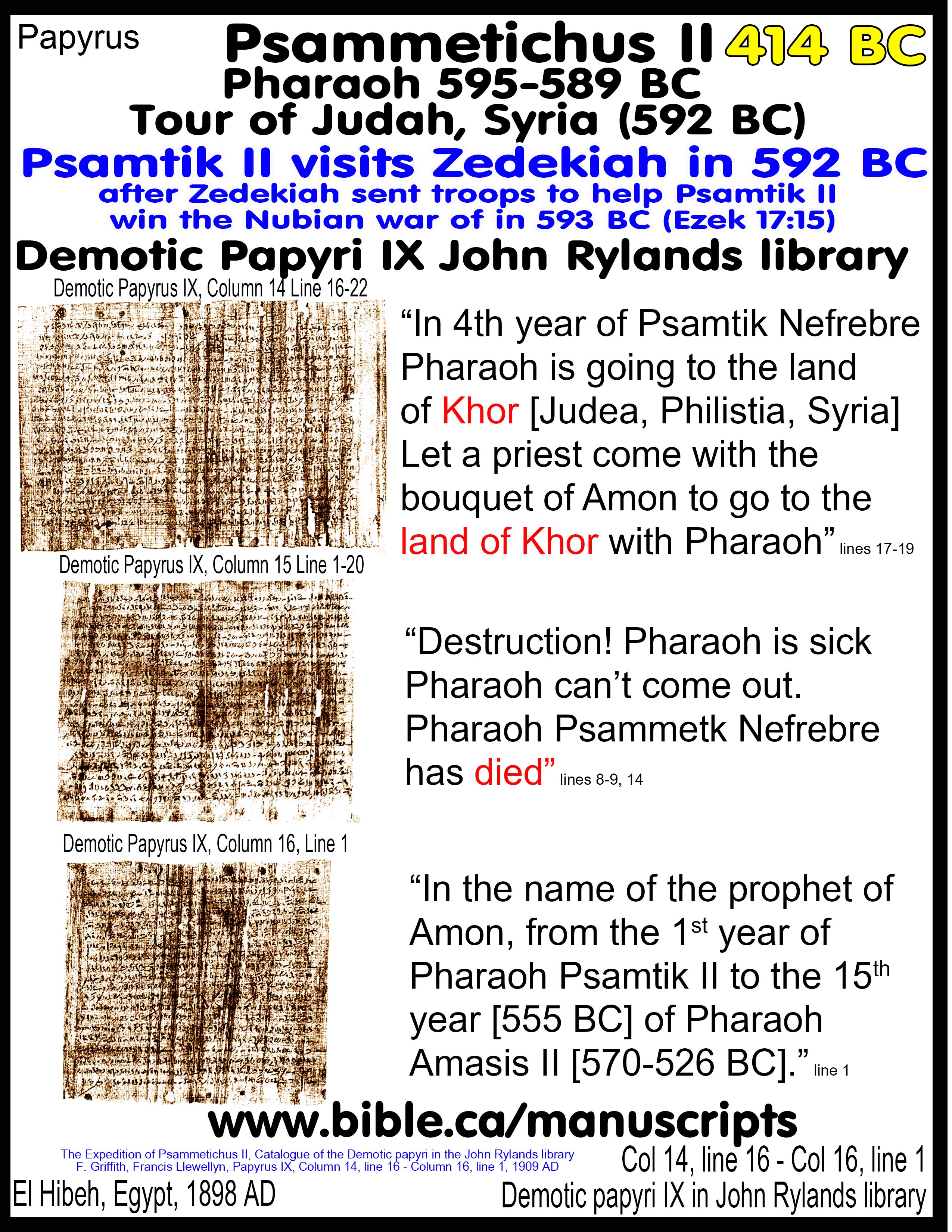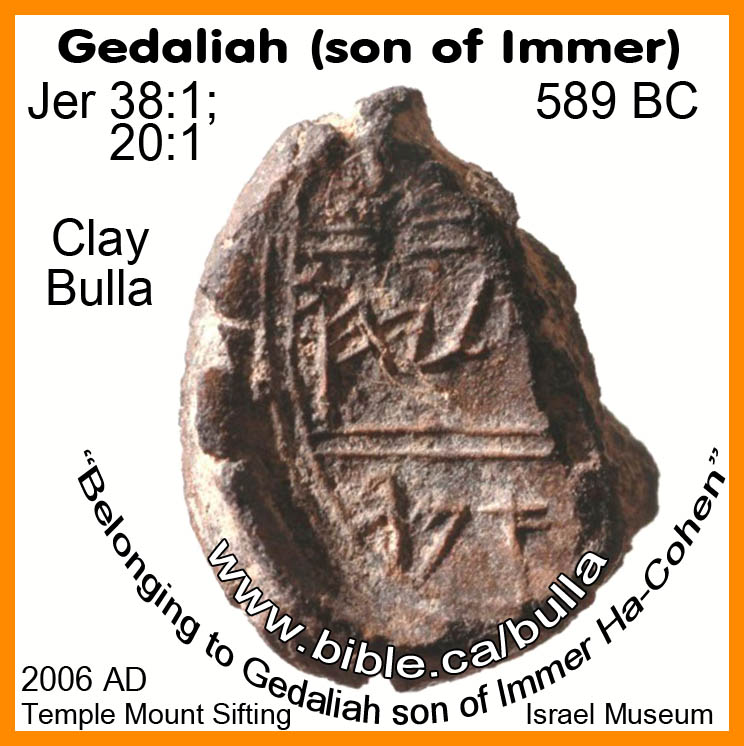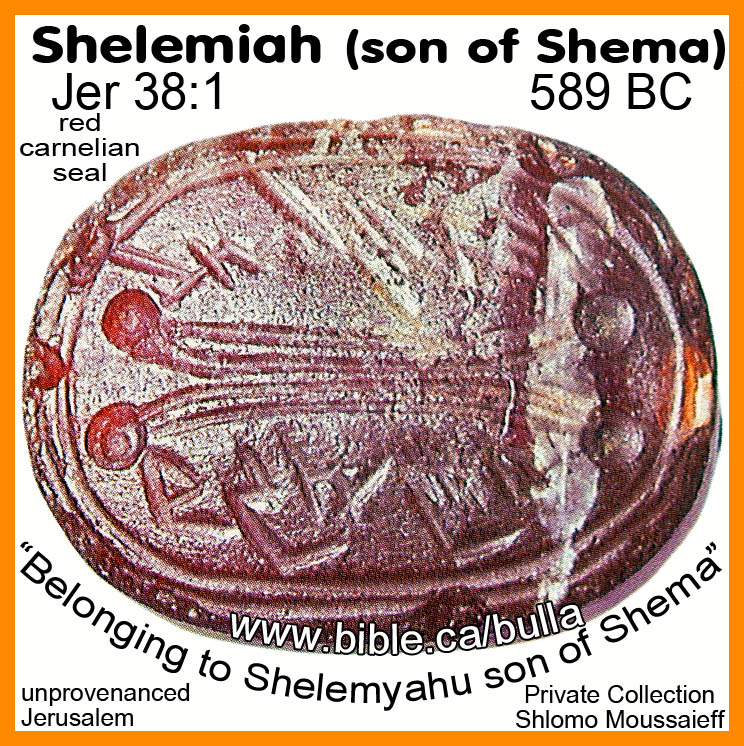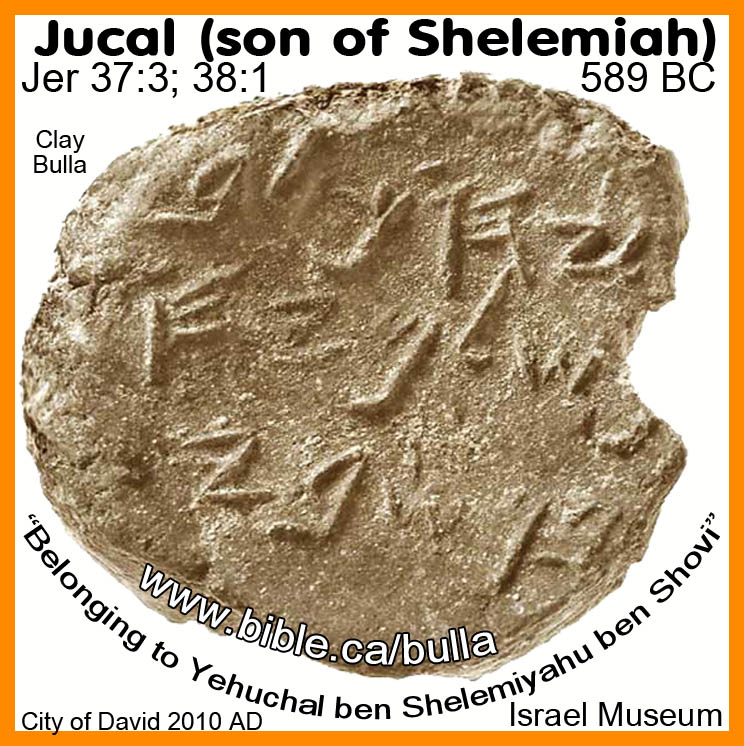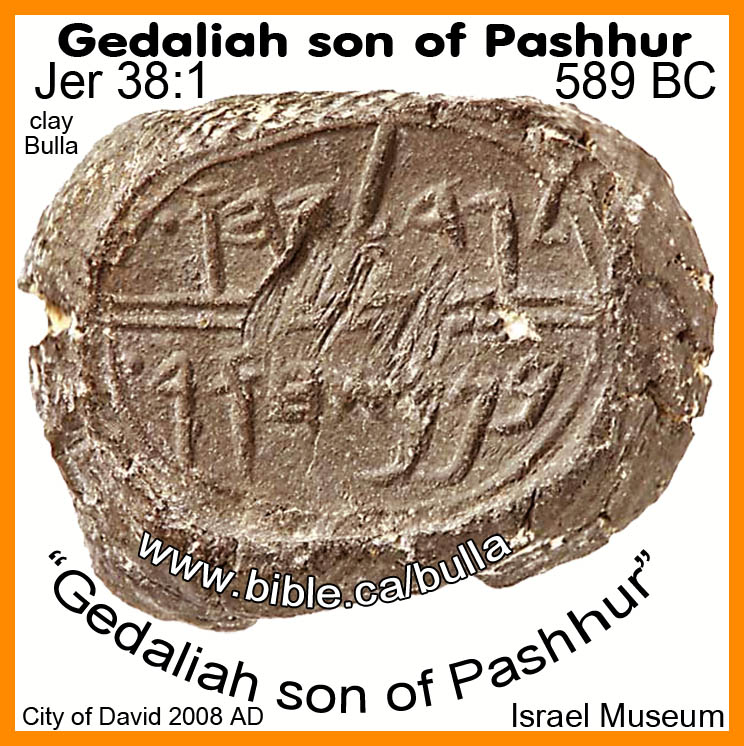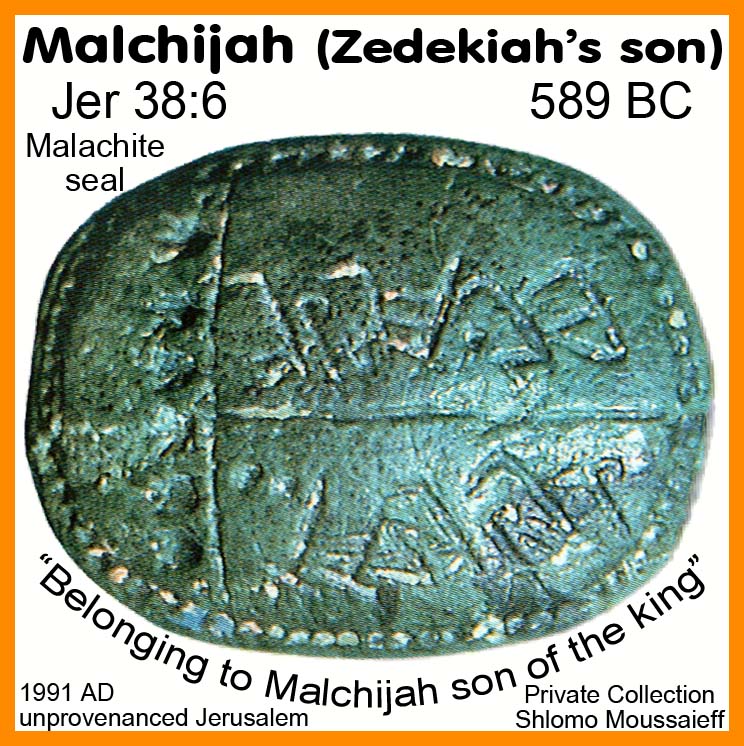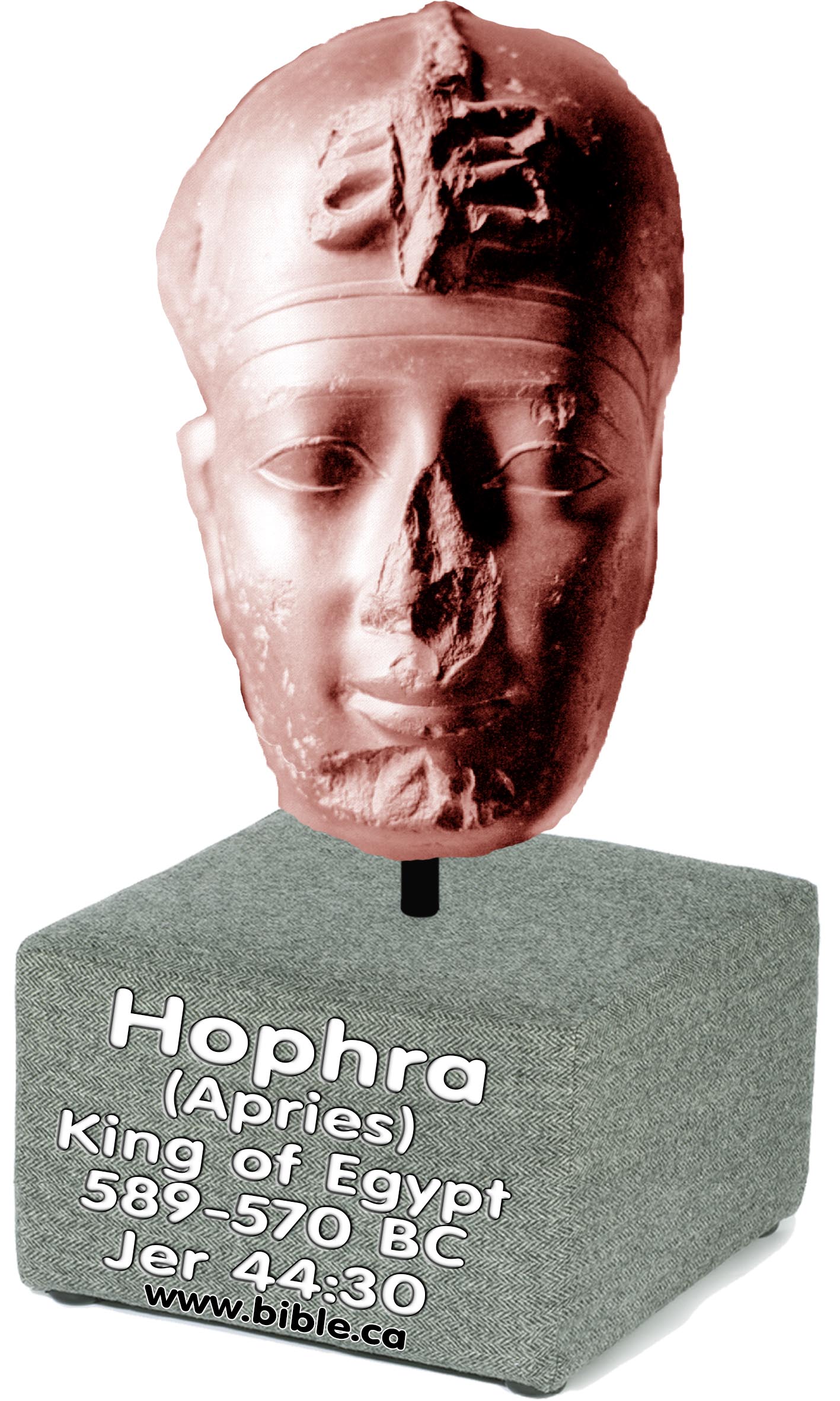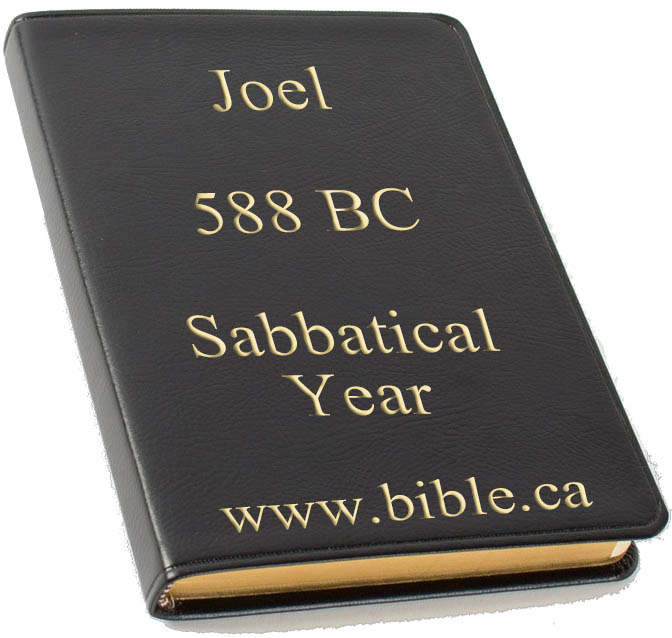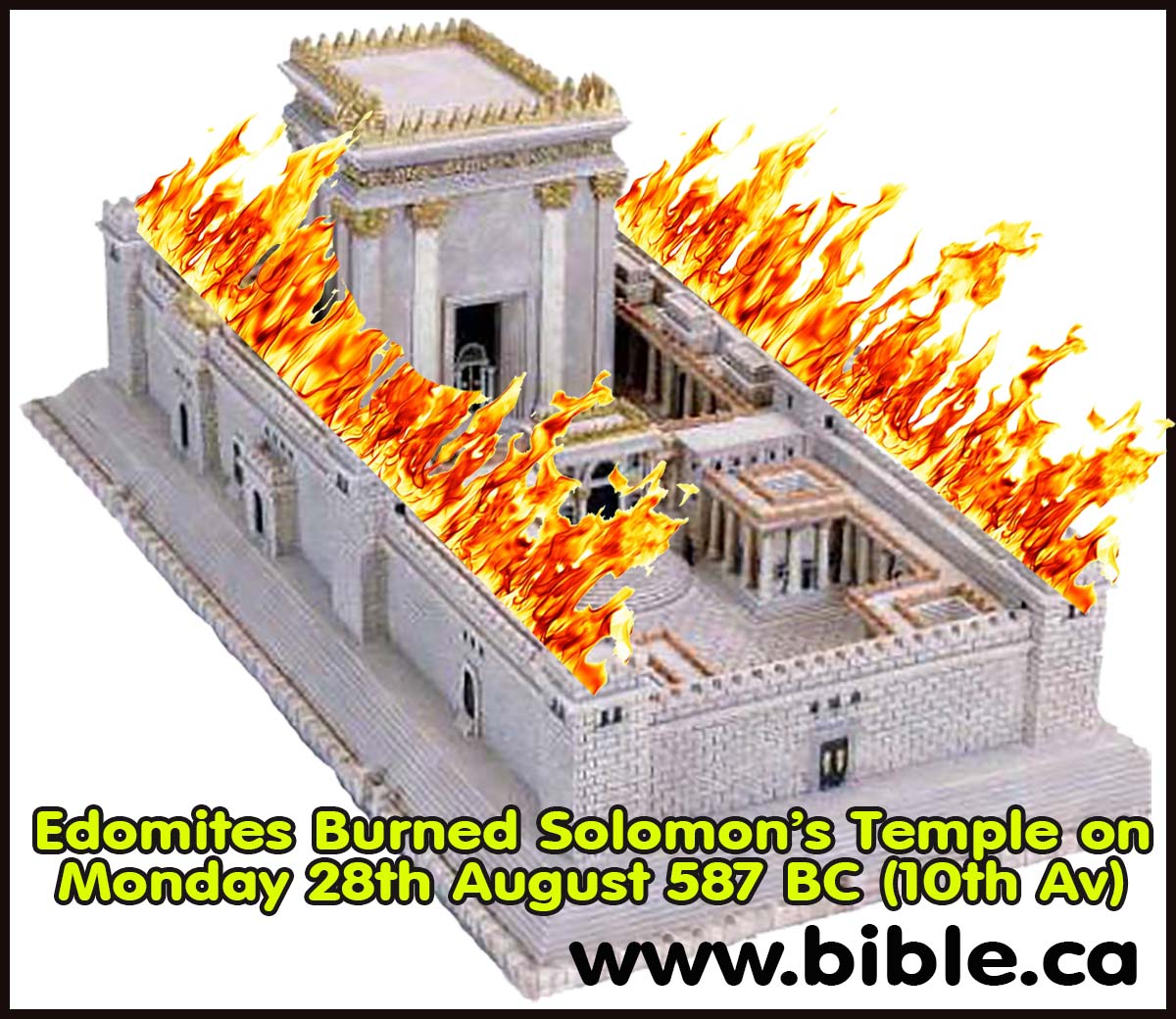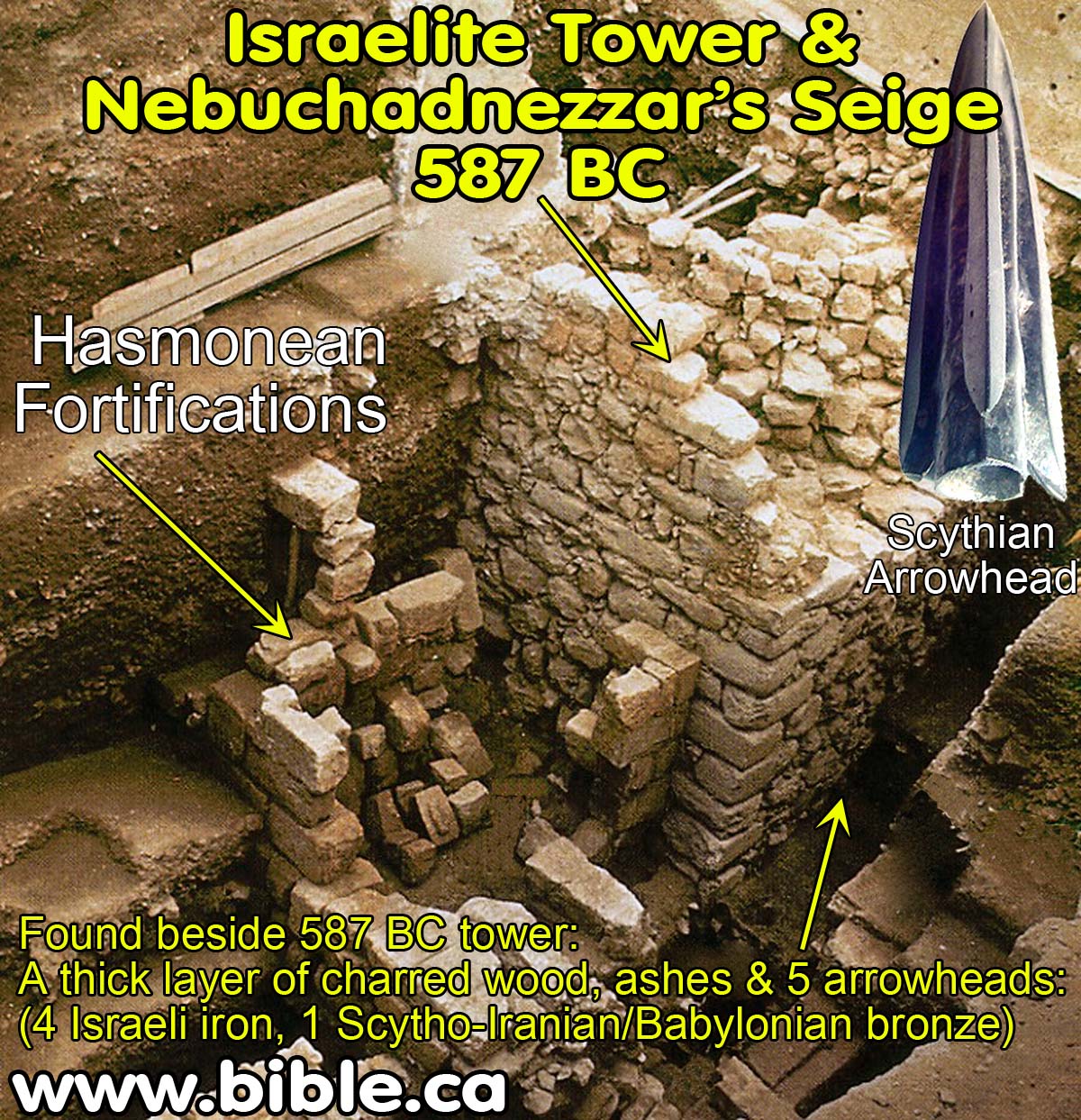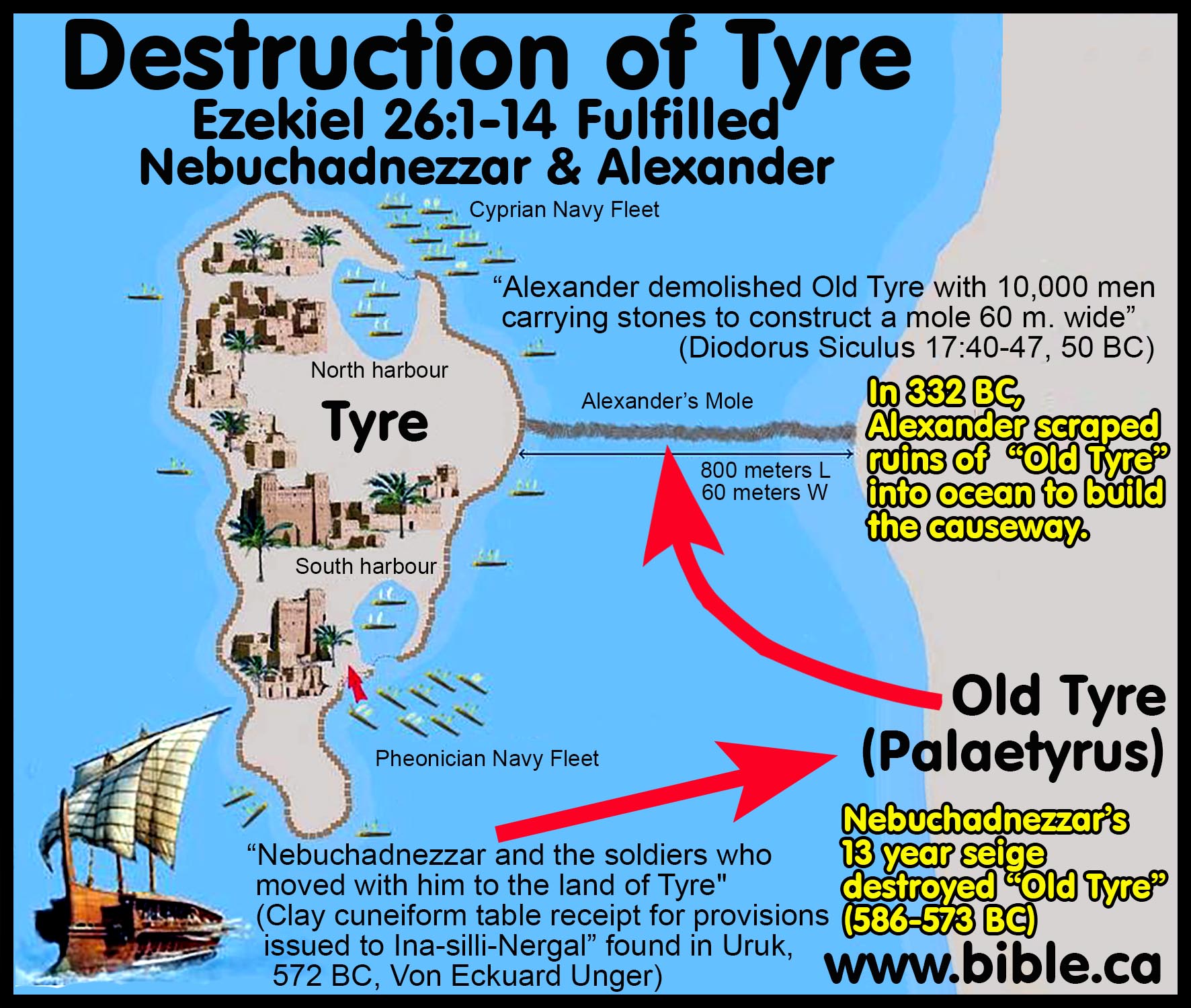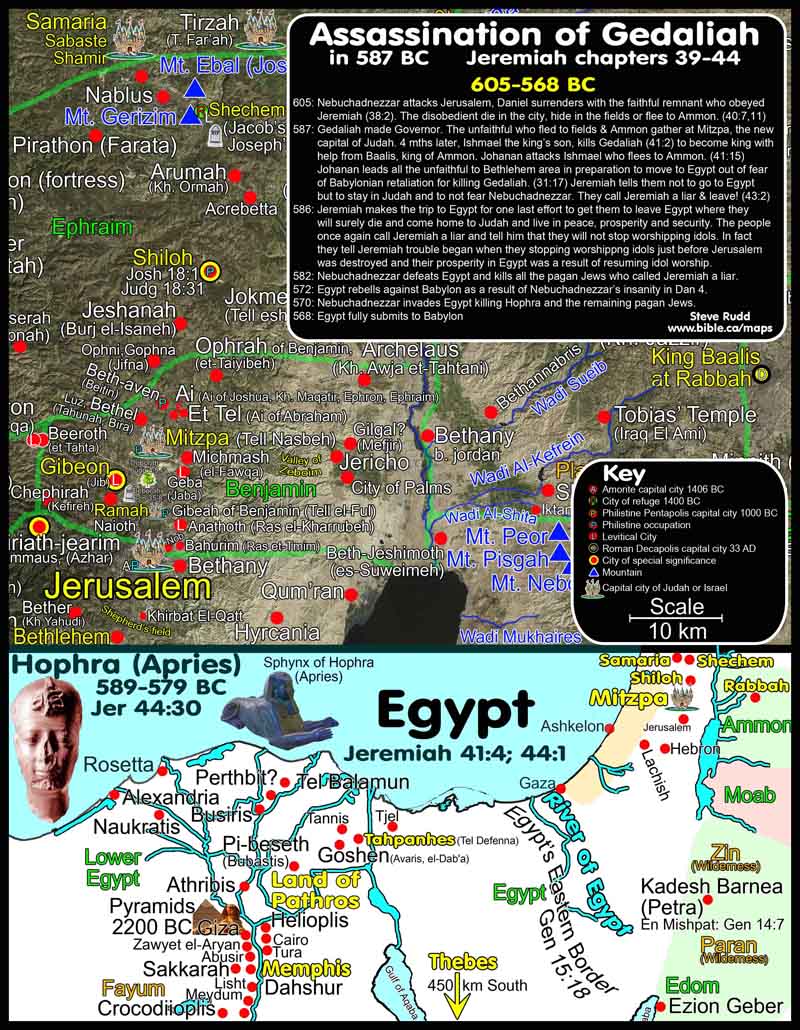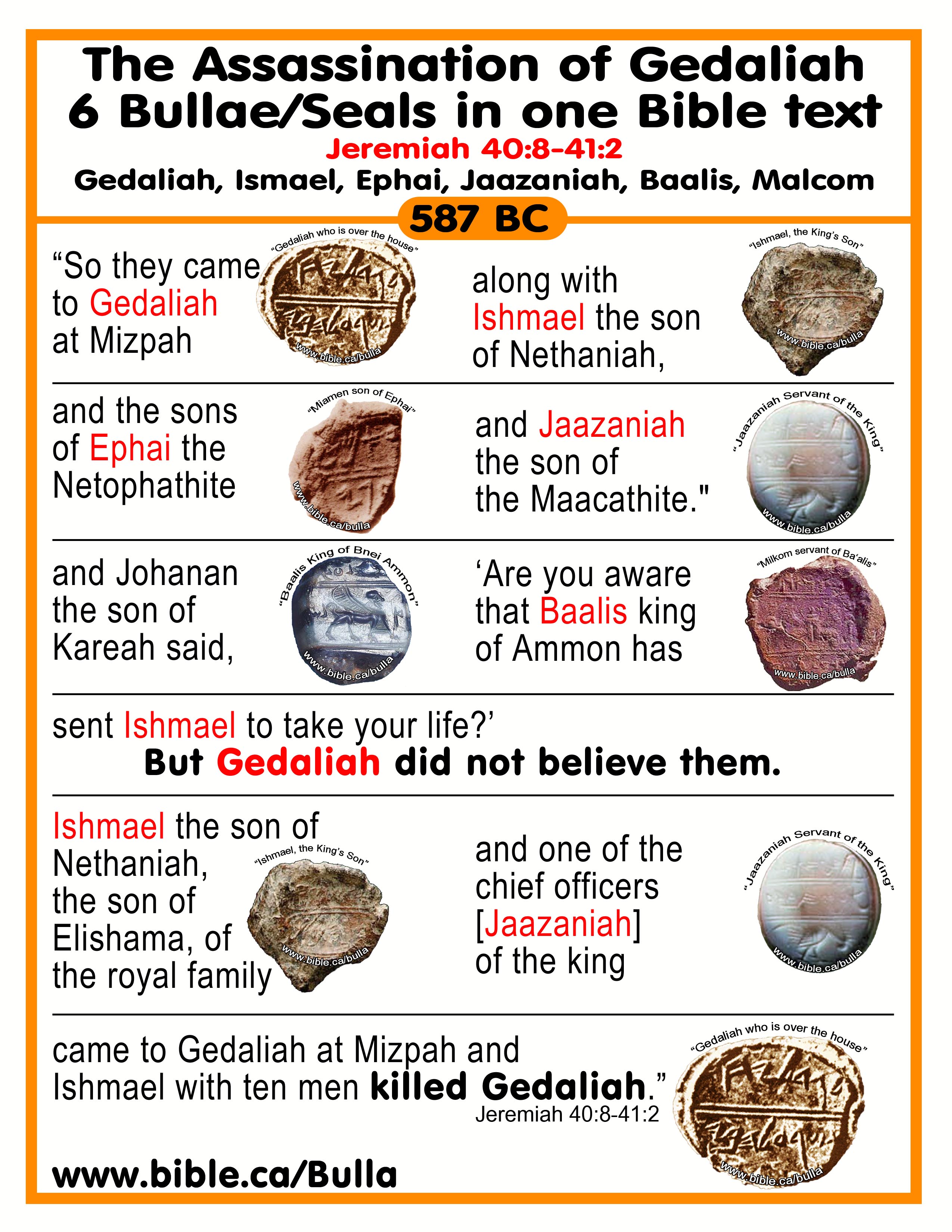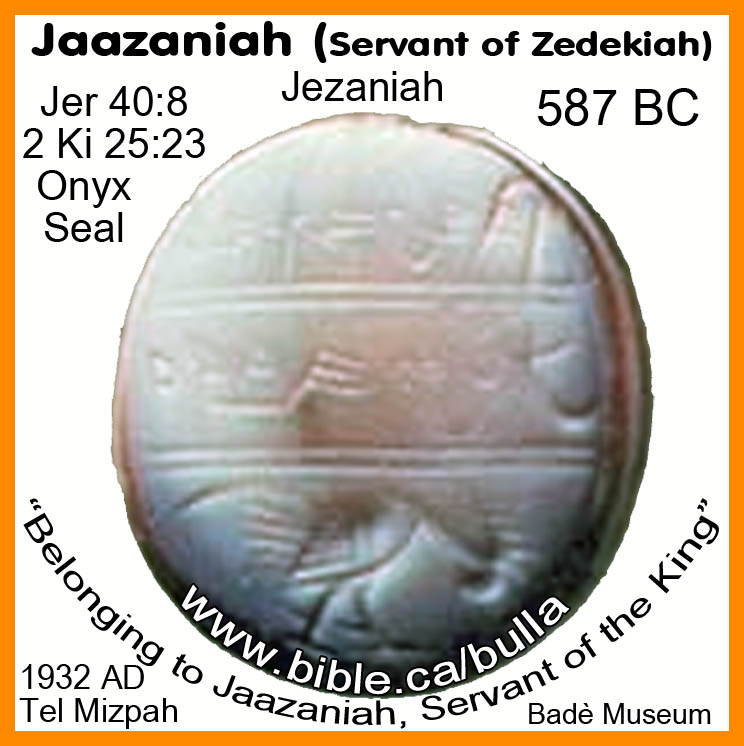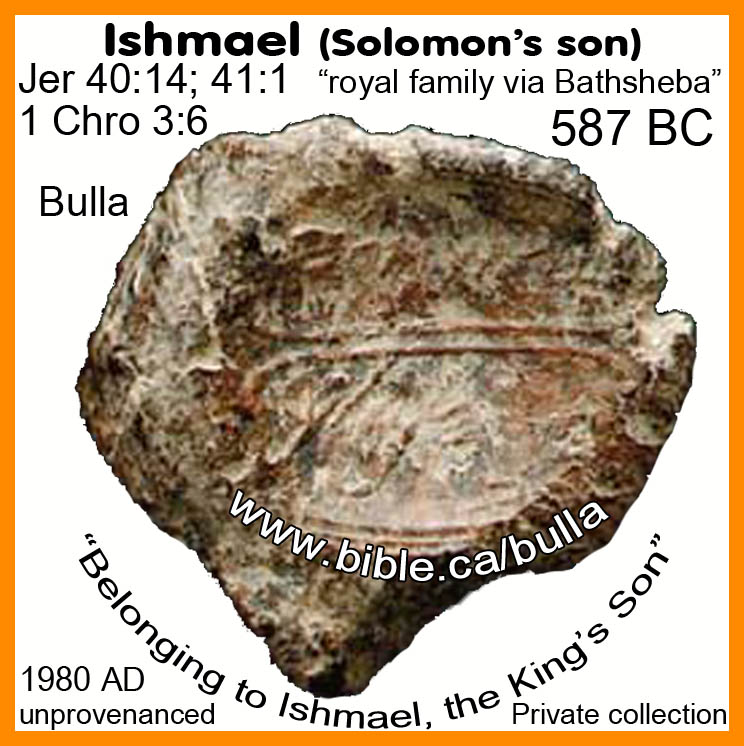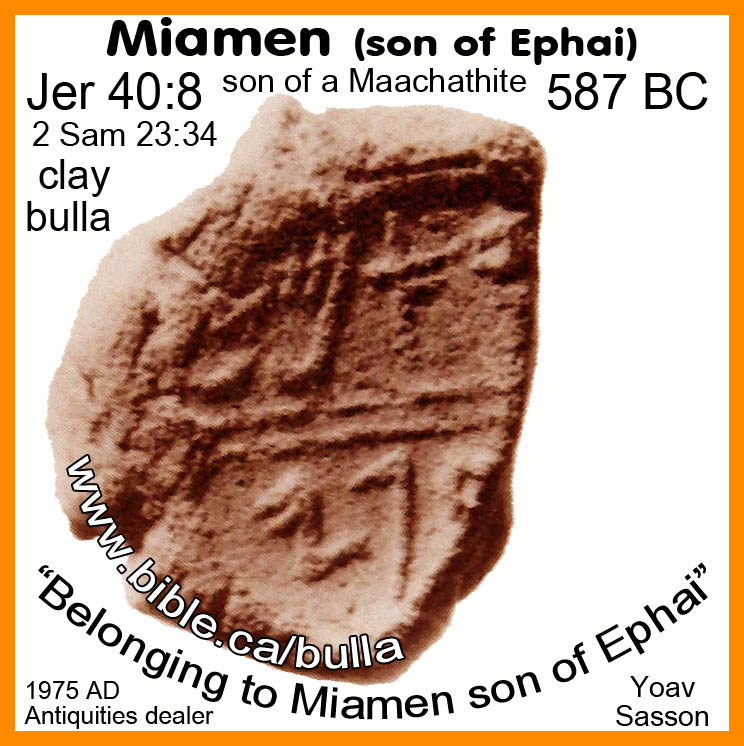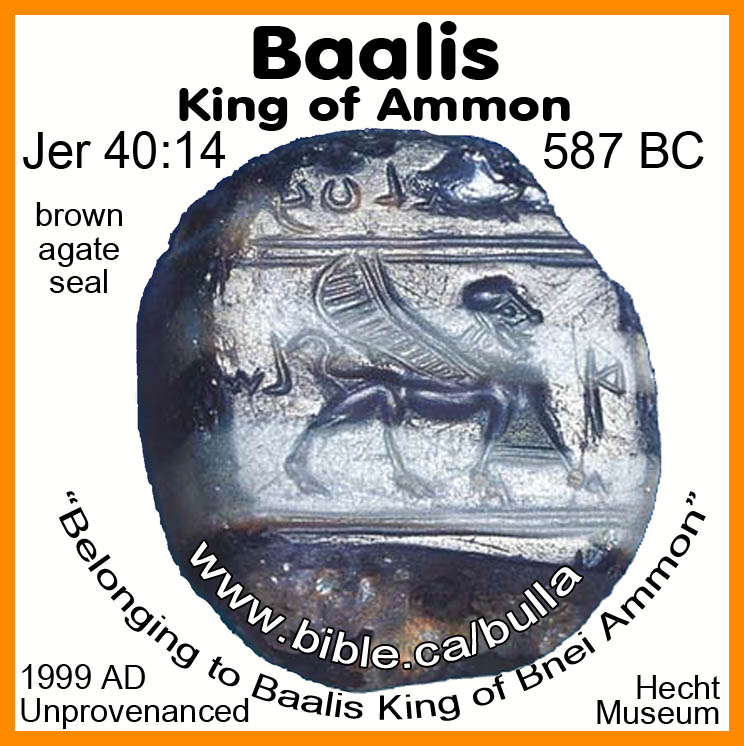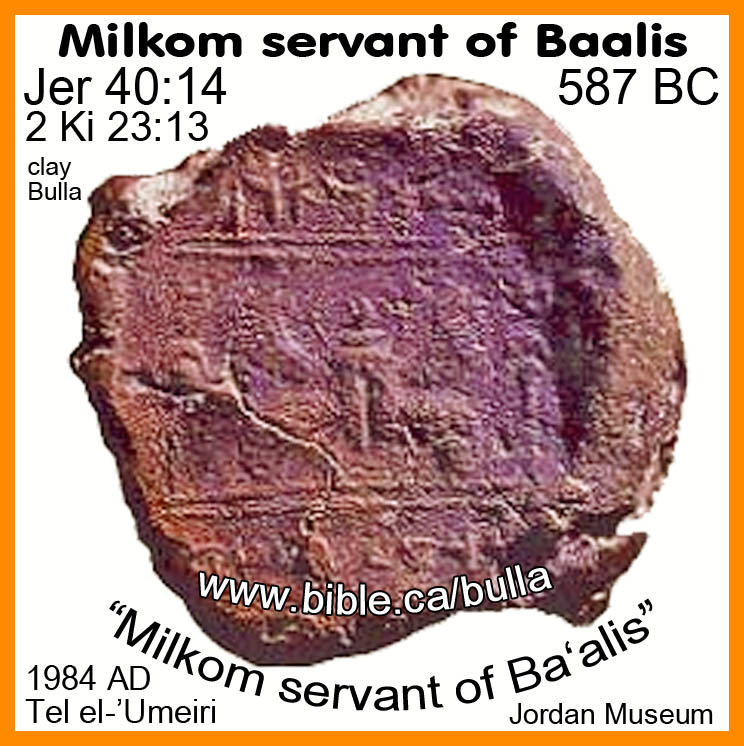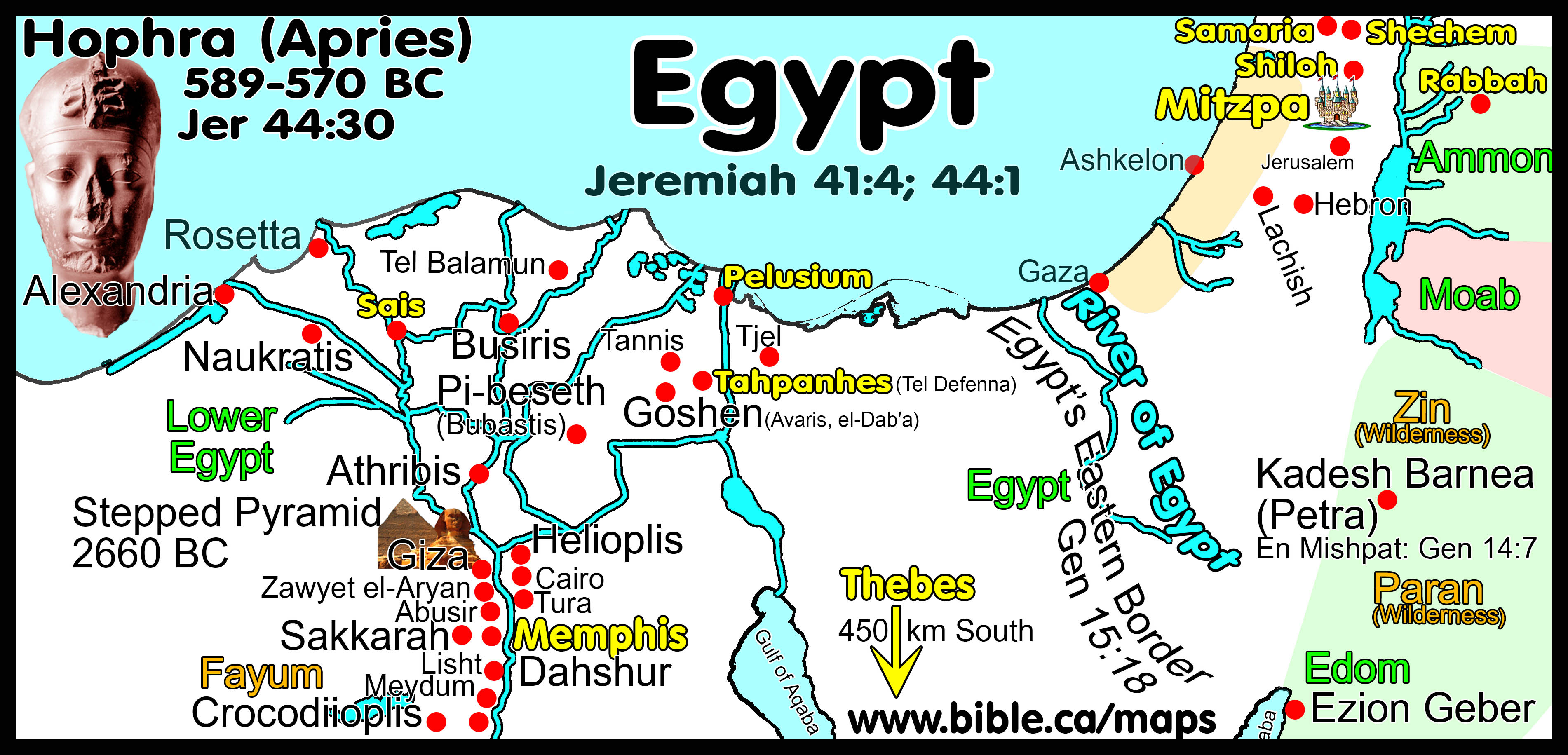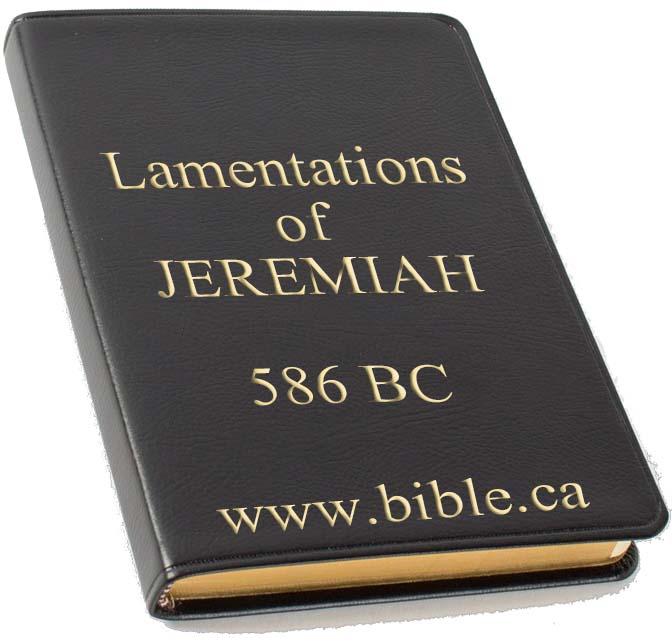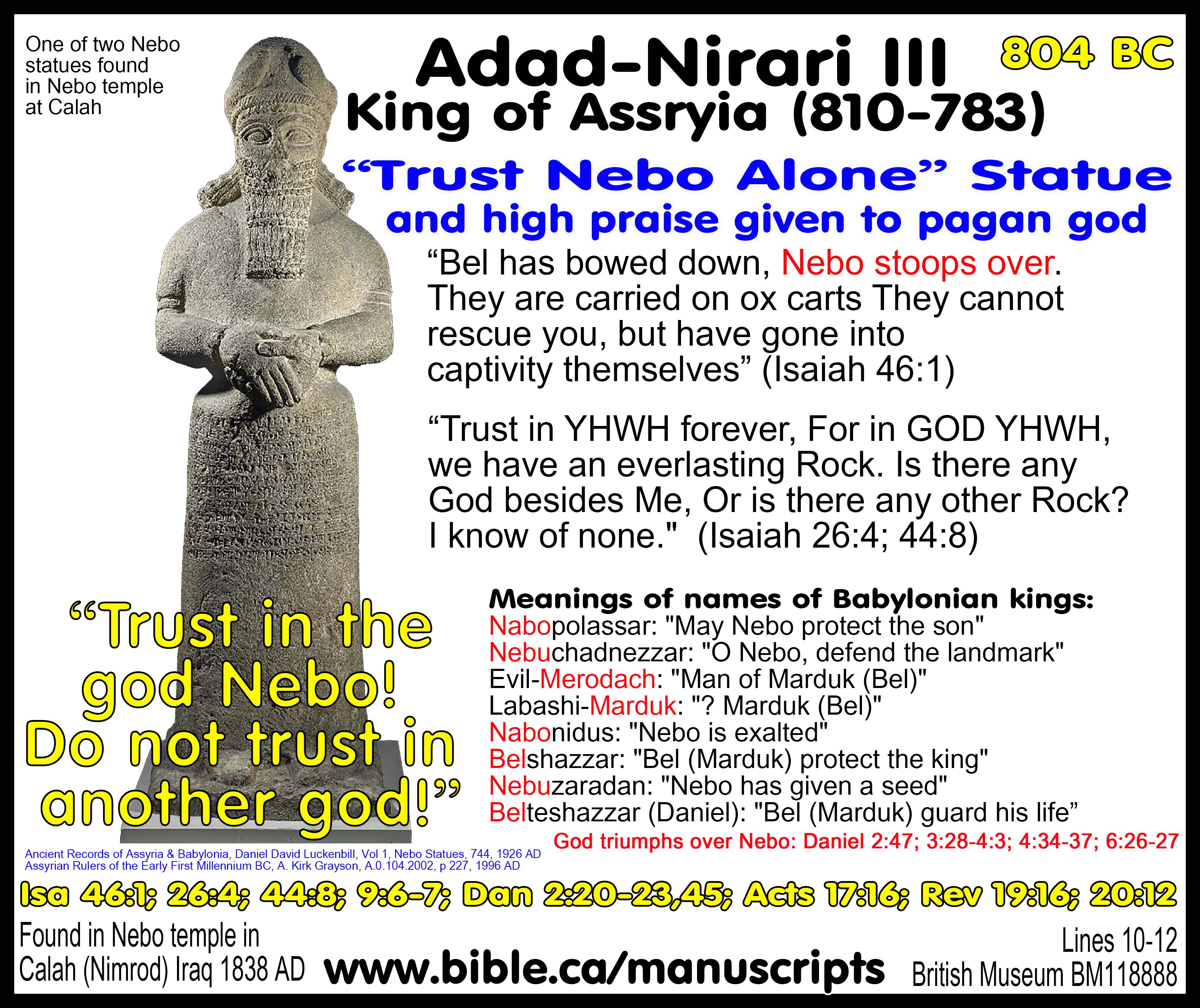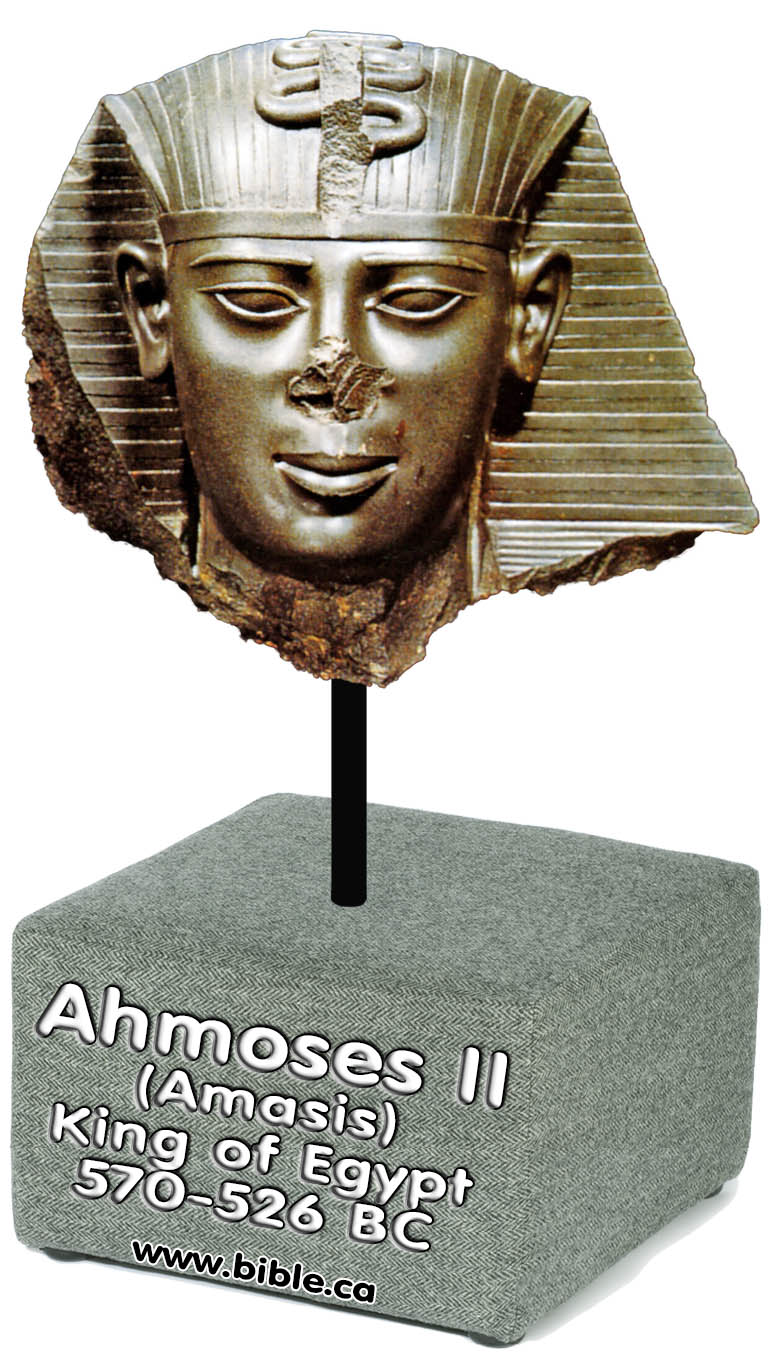Zedekiah, Last King of Judah: 597-587 BC
Archaeologists are digging up bible stories
2 Kings 24:17-25:7; 2 Chronicles 36:10-13
|
The Chronological Bible Only Commentary Quick links by year |
|||||
|
|
|||||
|
Zedekiah: Israel's last hope After countless loving warnings from God to repent of idolatry and moral sins, Zedekiah was Israel’s last chance before the temple of Solomon was destroyed on Monday 28th August 587 BC.
Jesus vs. Zedekiah: Zedekiah was a failed king who sought to save his own life but brought destruction upon his people. Jesus was a successful king who sought to lose his own life but saved his people from death. |
|||||
|
|
|||||
|
Josiah The Promised Child |
Jehoiakim The Bible Burner |
Gemariah Jeremiah's scribe |
Neco II King of Egypt |
|
|
|
Archaeologists are digging up bible stories!!! |
|||||
|
Archaeology is an important science that confirms the historical accuracy of the Bible. Since the Bible refers to hundreds of cities, kings, and places, we would expect to find evidence from on-site excavations. And this is exactly what we have found. The Bible is the most historically accurate book of history on earth. Read the Bible daily! What you read in the book, you find in the ground! |
|
||||
|
|
|||||
See also:
· Josiah, the chosen one, King of Judah: 640-609 BC
· Johoiakim, the Bible burner, King of Judah: 609-598 BC
· Zedekiah's Cave near the Jerusalem temple mount
· Gedaliah, first governor of Judea: 587 BC
· Egyptian Pharaohs of the Babylonian Captivity: 690-526 BC
· 32 Prophetic Sign Acts of the Bible
King Zedekiah: 597-587 BC (2 Kings 24:17-25:7; 2 Chronicles 36:10-13)
How to use this outline in church sermons and classes:
This monograph on Zedekiah is organized very simply.
1. One lesson can overview all the introductory components and assigned as homework.
2. The main section is divided by year with green banners. The orange banners are events within a single year.
3. Each year features:
a. Chronological reading of all bible texts for that year.
b. Synchronisms with the book of Revelation written in AD 66 to warn the Christians living in Jerusalem to flee its destruction in AD 70.
c. Messianic texts in that year
d. Notable quotables: Bible verses of special interest
e. Archeological verifications of Bible events in the year they occurred.
4. Each sermon or class can take either a series of sequential years, or in some cases a lesson on the events within a single year.
a. This is a chronological Bible study that reads bible chapters and sometimes entire books in the year the events took place.
b. This is actually a commentary on all Bible materials by year, as opposed to studying one entire book that spans many years.
5. It is critical for the teacher to study this monograph in its entirely and thoroughly become familiar with its content before proceeding to teach it.
6. This monograph is unique in design, format and content.
Introduction:
A. Passages from Kings and Chronicles about Zedekiah:
1. "Then the king of Babylon made his uncle Mattaniah king in his place, and changed his name to Zedekiah. Zedekiah was twenty-one years old when he became king, and he reigned eleven years in Jerusalem; and his mother’s name was Hamutal the daughter of Jeremiah of Libnah. He did evil in the sight of the Lord, according to all that Jehoiakim had done. For through the anger of the Lord this came about in Jerusalem and Judah until He cast them out from His presence. And Zedekiah rebelled against the king of Babylon. Now in the ninth year of his reign, on the tenth day of the tenth month, Nebuchadnezzar king of Babylon came, he and all his army, against Jerusalem, camped against it and built a siege wall all around it. So the city was under siege until the eleventh year of King Zedekiah. On the ninth day of the fourth month the famine was so severe in the city that there was no food for the people of the land. Then the city was broken into, and all the men of war fled by night by way of the gate between the two walls beside the king’s garden, though the Chaldeans were all around the city. And they went by way of the Arabah. But the army of the Chaldeans pursued the king and overtook him in the plains of Jericho and all his army was scattered from him. Then they captured the king and brought him to the king of Babylon at Riblah, and he passed sentence on him. They slaughtered the sons of Zedekiah before his eyes, then put out the eyes of Zedekiah and bound him with bronze fetters and brought him to Babylon." (2 Kings 24:17-25:7)
2. "At the turn of the year King Nebuchadnezzar sent and brought him to Babylon with the valuable articles of the house of the Lord, and he made his kinsman Zedekiah king over Judah and Jerusalem. Zedekiah was twenty-one years old when he became king, and he reigned eleven years in Jerusalem. He did evil in the sight of the Lord his God; he did not humble himself before Jeremiah the prophet who spoke for the Lord. He also rebelled against King Nebuchadnezzar who had made him swear allegiance by God. But he stiffened his neck and hardened his heart against turning to the Lord God of Israel." (2 Chronicles 36:10-13)
B. Pagan kings acted as God’s servants, agents, even God’s "anointed":
1. Pharaoh Neco II: “on a mission from God”
a. God speaks to the most righteous king in history (Josiah) through a pagan King and it cost him his life! Pharaoh Neco II killed Josiah after warning Josiah he was on a divine mission in 610 BC. Josiah was killed at Megiddo before the battle of Carchemish in 609 BC.
b. 609 BC: "After all this, when Josiah had set the temple in order, Neco king of Egypt came up to make war at Carchemish on the Euphrates, and Josiah went out to engage him. But Neco sent messengers to him, saying, “What have we to do with each other, O King of Judah? I am not coming against you today but against the house with which I am at war, and God has ordered me to hurry. Stop for your own sake from interfering with God who is with me, so that He will not destroy you.” However, Josiah would not turn away from him, but disguised himself in order to make war with him; nor did he listen to the words of Neco from the mouth of God, but came to make war on the plain of Megiddo. The archers shot King Josiah, and the king said to his servants, “Take me away, for I am badly wounded.”" (2 Chronicles 35:20-23)
c. 609 BC: "Then the king of Egypt sent the following message to him: “What have we to do with each other, O king of Judah? 25 I have not been sent out by the Lord God [YHWH] against you; rather my war is on the Euphrates. Now the Lord is with me, and the Lord who is with me is driving me on; so restrain yourself and do not resist the Lord.” Nevertheless Josiah did not return to his chariot but attacked him; paying no attention to [the] words of the prophet Jeremiah [which came] from the mouth of the Lord, 27 he engaged him in battle on the plain of Megiddo where the leaders came against King Josiah. (1 Esdras 1:24-27)
2. Nebuchadnezzar: “God’s
Servant”
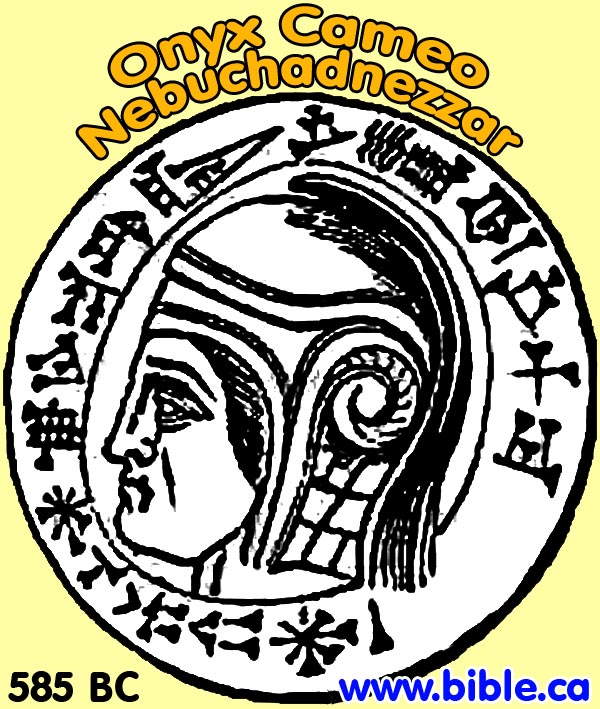
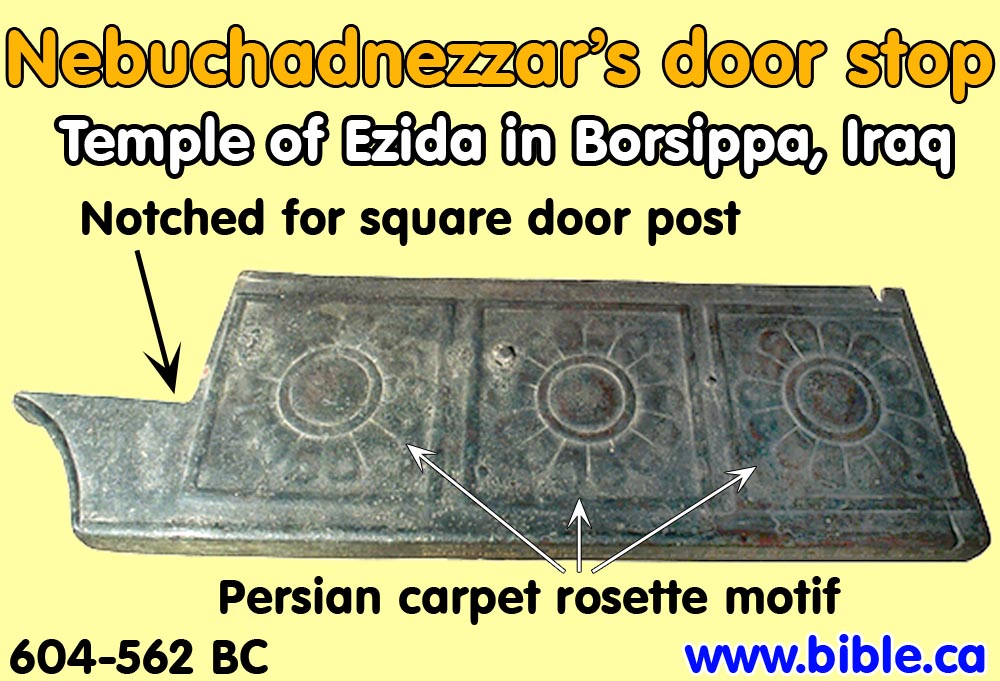
a. 595 BC: "“Now I have given all these lands into the hand of Nebuchadnezzar king of Babylon, My servant, and I have given him also the wild animals of the field to serve him. “All the nations shall serve him and his son and his grandson until the time of his own land comes; then many nations and great kings will make him their servant." (Jeremiah 27:6-7)
b. 574 BC: God talked directly to Nebuchadnezzar: "The king reflected and said, ‘Is this not Babylon the great, which I myself have built as a royal residence by the might of my power and for the glory of my majesty?’ “While the word was in the king’s mouth, a voice came from heaven, saying, ‘King Nebuchadnezzar, to you it is declared: sovereignty has been removed from you, and you will be driven away from mankind, and your dwelling place will be with the beasts of the field. You will be given grass to eat like cattle, and seven periods of time will pass over you until you recognize that the Most High is ruler over the realm of mankind and bestows it on whomever He wishes.’" (Daniel 4:30-32)
c. Fall 573- Spring 571 BC God talks directly to Nebuchadnezzar who is struck with insanity and acts like cow for 9-18 months. What is even more interesting, is that Nebuchadnezzar may have written the entry in Daniel 4 himself, since it is composed in the first hand party.
d. Tues April 26, 671 BC: Nebuchadnezzar was on God’s payroll: "Now in the twenty-seventh year, in the first month, on the first of the month, the word of the Lord came to me saying, “Son of man, Nebuchadnezzar king of Babylon made his army labor hard against Tyre; every head was made bald and every shoulder was rubbed bare. But he and his army had no wages from Tyre for the labor that he had performed against it.” Therefore thus says the Lord God, “Behold, I will give the land of Egypt to Nebuchadnezzar king of Babylon. And he will carry off her wealth and capture her spoil and seize her plunder; and it will be wages for his army. “I have given him the land of Egypt for his labor which he performed, because they acted for Me,” declares the Lord God." (Ezekiel 29:17-20)
3. Cyrus: “God’s Anointed”
a. Prophesied 730 BC: "Thus says the Lord to Cyrus His anointed, Whom I have taken by the right hand, To subdue nations before him And to loose the loins of kings; To open doors before him so that gates will not be shut: “I will go before you and make the rough places smooth; I will shatter the doors of bronze and cut through their iron bars. “I will give you the treasures of darkness And hidden wealth of secret places, So that you may know that it is I, The Lord, the God of Israel, who calls you by your name. … "“I have aroused him in righteousness And I will make all his ways smooth; He will build My city and will let My exiles go free, Without any payment or reward,” says the Lord of hosts." (Isaiah 45:1-3,13, 730 BC)
b.
Daniel the prophet would have asked Cyrus to
retrieve the Isaiah scroll from the vault where Nebuchadnezzar had stored them
since 587 BC. Daniel would show Cyrus he was the fulfillment of divine
prophecy. This is what motivated Cyrus to issue the decree which is recorded on
the famous archeological “Cyrus cylinder”. Most Bible students are unaware that
Cyrus’ decree was not limited to the Jews rebuilding the Jerusalem temple, but
included all pagan temples in the empire as well.
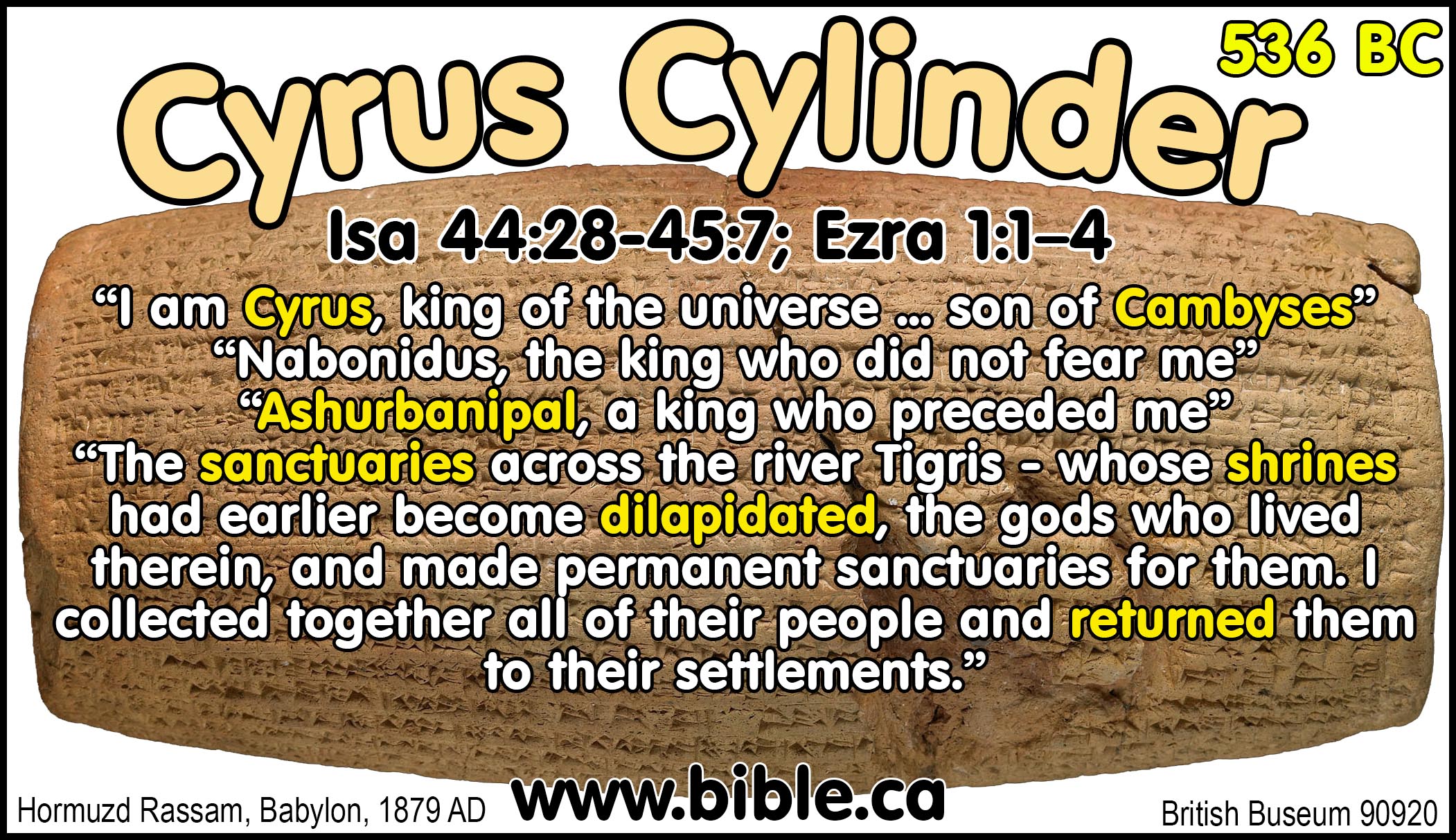
c. 536 BC: "Now in the first year of Cyrus king of Persia, in order to fulfill the word of the Lord by the mouth of Jeremiah, the Lord stirred up the spirit of Cyrus king of Persia, so that he sent a proclamation throughout all his kingdom, and also put it in writing, saying: “Thus says Cyrus king of Persia, ‘The Lord, the God of heaven, has given me all the kingdoms of the earth and He has appointed me to build Him a house in Jerusalem, which is in Judah. ‘Whoever there is among you of all His people, may his God be with him! Let him go up to Jerusalem which is in Judah and rebuild the house of the Lord, the God of Israel; He is the God who is in Jerusalem. ‘Every survivor, at whatever place he may live, let the men of that place support him with silver and gold, with goods and cattle, together with a freewill offering for the house of God which is in Jerusalem.’ ”" (Ezra 1:1-4)
4. Titus: AD 70 Fulfilled Jesus words in Luke 21:20
a. 30th June AD 70, Sabbath [3 Tammuz/Panemus]: synchronism between Nebuchadnezzar and Titus as anointed servants of YHWH:
b. Speech of Titus to his troops: “And now Titus, upon consideration that the alacrity of soldiers in war is chiefly excited by hopes and by good words, and that exhortations and promises do frequently make men to forget the hazards they run, nay, and sometimes to despise death itself, got together the most courageous part of his army, and tried what he could do with his men by these methods:—(34) “O fellow-soldiers,” said he, … it is unbecoming you, who are Romans and my soldiers, who have in peace been taught how to make wars, and who have also been used to conquer in those wars, to be inferior to Jews, either in action of the hand or in courage of the soul, and this especially when you are at the conclusion of your victory, and are assisted by God himself; (39) for as to our misfortunes, they have been owing to the madness of the Jews, while their sufferings have been owing to your valor, and to the assistance God hath afforded you; (40) for as to the seditions they have been in, and the famine they are under, and the siege they now endure, and the fall of their walls without our engines, what can they all be but demonstrations of God’s anger against them, and of his assistance afforded us? (41) It will not therefore be proper for you, either to show yourselves inferior to those to whom you are really superior, or to betray that divine assistance which is afforded you… These things were done upon the third day of the month Panemus [Tamuz].” (Josephus Wars of the Jews 6.33-67)
c. God indeed used both Titus and Nebuchadnezzar as his “anointed servants” to destroy Jerusalem.
d. The speech of Titus that God was with the Roman army and not with the Jews was exactly correct. God had used several pagan kings in the past as his “anointed agents”
C. Babylonian Cuneiform tablet: Battle of Carchemish and capture of Jerusalem
|
Babylonian Cuneiform tablet: Battle of Carchemish and capture of Jerusalem |
|
|
Babylonian Chronicle for 605-595 BC Click here for full translation of cuneiform tablet. 2 Ki 24:1-17; 25:1-30; 2 Chron 36:1-21; Dan 1:1-6; Jer 36:9; 46:1-12; 52:1-34 1. The tablet describes events shortly after the capture of Nineveh and the fall of the Assyrian empire in 612 BC. 2. Nebuchadnezzar’s defeats Pharaoh Neco II at Carchemish in 605 BC while he was still crown prince. (Jeremiah 46:2) 3. Note: In 609 BC, there was a previous battle at Carchemish between Josiah, Neco II and Nebuchadnezzar where Neco II killed Josiah before the battle of Carchemish at Megiddo. That battle is not mentioned in this tablet. (2 Ki 23:29-30; 2 Chron 35:20-27, Jer 46:2). 4. When Nebuchadnezzar learned his father Nabopolassar had died on the eighth of Ab (15 August 605 BC) he returned to Babylon to become king on the first of Elul (7 September 605 BC). 5. The tablet says that in August 598 BC, Nebuchadnezzar captures Jerusalem, along with king Jehoiachin and Daniel, while appointing Zedekiah (Jehoiachin's uncle Mattaniah renamed "Zedekiah") as the vassal king of Judah in Jerusalem. (2 Ki 24:1-17; 2 Chron 36:6-7; Dan 1:1-6). |
|
1. In 1955 a tablet was deciphered which records the captivity of king Jehoiachin and the appointment of Zedekiah. (2 kings 24:10, 15, 17)
2. Nebuchadnezzar, King of Babylon: 605-562 BC
a. Nebuchadnezzar is a major Bible character who was God's agent to destroy Judah for Idolatry.
b. Nebuchadnezzar is featured in the Book of Daniel as the first of four prophesied kingdoms (Babylon, Medo-Persia, Greece, Rome) and God would set up his eternal kingdom (the church) during the Roman Empire in 33 AD.
c. Nebuchadnezzar also went mad and was stricken with delusion for his pride.
d. See this outline on Mental illness and the Bible.
3. The captivity of Judah and Israel marked the end of political independence till the coming of Christ. Only during a few short years (110-63 BC) under the Maccabees did Judah have any independence from outside forces.
D. "Al-Yahudaia": The Jewish colony in Babylon 605-536 BC
1. "Al-Yahudaia": The Jewish colony in Babylon 605-536 BC
|
BLESSINGS OF JERUSALEM TRANSFERRED TO Jewish colony in Babylon called "Al-Yahudaia" in 605 BC. Al-Yahudaia (City of the Judeans) was not Jerusalem in Judea but a brand new colony city set up by Nebuchadnezzar in 605 BC! This swapping of blessings and curses between Babylon and Jerusalem are seen in the book of Revelation. Every time you read "Babylon" in Revelation, it is literally "Jerusalem" which was to be destroyed in AD 70. This firmly and unquestionably dates Revelation to AD 66. |
- The recently published Cindy and David Sofer collection at the "Bible Lands Museum" in Jerusalem of 103 Cuneiform tables called the "Al Yahuda Archive" documents everyday life in these same colonies the Jews lived in while in Babylon captivity.
- Tablet "number 001" pictured below was written from one of these colony cities named, "Al-Yahudaia" in Babylon which means, "City of the Judeans".
- What an amazing confirmation that the Bible is true and what we read in the book we find in the ground!
- The tablet has this inscription on the baked clay cuneiform script in Akkadian language: Translation, Reverse lines 11’-18’: "Witnesses: Tub-shalam son of Ahiqar; Azar-Yama son of Yahu-Kullu; Ah-lumur son of Balassu, and the scribe, Nabu-Na'id, son of Nabu-zar-iqisha. [Written in] Al-Yahudaia (City of the Judeans) On the 20th day of Nisan, year 33 of Nebuchadnezzar, king of Babylon"
- There are actually over 200 of these unprovenanced tablets that are believed to have been purchased on the private antiquities market from Iraq after 1970 AD, but only 103 were featured at the museum in Israel.
- These tables, though unprovenanced are believed to be genuine by all experts.
- Babylonian Chronicles and Berosus record how Nabopolassar died while Nebuchadnezzar was attacking Jerusalem in 605 BC. He raced home across the dessert in 3 weeks to claim the throne. It was at this time he designated the lands for the exiled Jews to live in that became known as "Al-Yahudaia"
a. Dated to 605 BC: Berosus, Chaldaic History, book 3, Josephus Antiquities 10.222-223: "it happened that his father Nebuchodonosor [Nabopollassar] fell ill, and ended his life in the city of Babylon, when he had reigned twenty-one years; (222) and when he was made sensible, as he was in a little time, that his father, Nebuchodonosor [Nebopollassar], was dead, and having settled the affairs of Egypt, and the other countries, as also those that concerned the captive Jews, [Daniel would be among these] and Phoenicians, and Syrians, and those of the Egyptian nations, and having committed the conveyance of them to Babylon to certain of his friends, together with the gross of his army, and the rest of the ammunition and provisions, he went himself hastily, accompanied with a few others, over the desert, and came to Babylon. (223) So he took upon him the management of public affairs, and of the kingdom which had been kept for him by one that was the principal of the Chaldeans, and he received the entire dominions of his father, and appointed, that when the captives came, they should be placed as colonies, in the most proper places of Babylonia" (Josephus Antiquities 10.222-223)
b. Dated to 605 BC: "For twenty-one years Nabopolassar had been king of Babylon, when on 8 Abu [15 August 605 BC] he went to his destiny; in the month of Ululu Nebuchadnezzar returned to Babylon and on 1 Ululu [7 September 605 BC] he sat on the royal throne in Babylon. (Babylonian Chronicles cuneiform tablet line 9-11)
4. WHAT YOU READ IN THE BOOK YOU FIND IN THE GROUND!!!
a. Here we have spectacular confirmation from archeology that the Babylonian captivity was a real event.
b. We can actually visit ancient Al-Yahudah today in Iraq and it has been located on maps.
|
|
I. 19 Theatrical Sign Acts during the time of Zedekiah:
|
Definition of a Sign Act: 1. See outline on 32 Sign Acts of the Bible 2. Sign Acts are non-verbal tools of prophecy. 3. A “sign act” is where a prophet engages in a non-verbal theatrical display in order to visualize in advance, the outcome of a prophecy. 4. “Sign acts are nonverbal actions and objects intentionally employed by the prophets so that message content was communicated through them to the audiences” (Dictionary of the Old Testament: Prophets, K. G. Friebel, Sign Acts, p707, 2012 AD) 5. 19 Signs total, 6 from Jeremiah and 13 from Ezekiel |
Listed Chronologically from Jeremiah and Ezekiel
See outline on 33 Sign Acts of the Bible
1. Sign Act in 597 BC (Jer 13:1-11)
a. Jeremiah buys, wears and buries, by the River Perat, a waist sash to illustrate the people’s initial closeness to God and their subsequent deterioration.
b. "Thus the LORD said to me, “Go and buy yourself a linen waistband and put it around your waist, but do not put it in water.” So I bought the waistband in accordance with the word of the LORD and put it around my waist. Then the word of the LORD came to me a second time, saying, “Take the waistband that you have bought, which is around your waist, and arise, go to the Euphrates and hide it there in a crevice of the rock.” So I went and hid it by the Euphrates, as the LORD had commanded me. After many days the LORD said to me, “Arise, go to the Euphrates and take from there the waistband which I commanded you to hide there.” Then I went to the Euphrates and dug, and I took the waistband from the place where I had hidden it; and lo, the waistband was ruined, it was totally worthless. Then the word of the LORD came to me, saying, “Thus says the LORD, ‘Just so will I destroy the pride of Judah and the great pride of Jerusalem. ‘This wicked people, who refuse to listen to My words, who walk in the stubbornness of their hearts and have gone after other gods to serve them and to bow down to them, let them be just like this waistband which is totally worthless. ‘For as the waistband clings to the waist of a man, so I made the whole household of Israel and the whole household of Judah cling to Me,’ declares the LORD, ‘that they might be for Me a people, for renown, for praise and for glory; but they did not listen.’" (Jeremiah 13:1-11)
2. Sign Act in 597 BC (Jer 16:1-9)
a. Jeremiah does not marry or attend funerals or feasts, representing the people’s future decimation, such that they would be devoid of family members and occasions of ritual mourning and festivity.
b. "The word of the Lord also came to me saying, “You shall not take a wife for yourself nor have sons or daughters in this place.” For thus says the Lord concerning the sons and daughters born in this place, and concerning their mothers who bear them, and their fathers who beget them in this land: “They will die of deadly diseases, they will not be lamented or buried; they will be as dung on the surface of the ground and come to an end by sword and famine, and their carcasses will become food for the birds of the sky and for the beasts of the earth.” For thus says the Lord, “Do not enter a house of mourning, or go to lament or to console them; for I have withdrawn My peace from this people,” declares the Lord, “My lovingkindness and compassion. “Both great men and small will die in this land; they will not be buried, they will not be lamented, nor will anyone gash himself or shave his head for them. “Men will not break bread in mourning for them, to comfort anyone for the dead, nor give them a cup of consolation to drink for anyone’s father or mother. “Moreover you shall not go into a house of feasting to sit with them to eat and drink.” For thus says the Lord of hosts, the God of Israel: “Behold, I am going to eliminate from this place, before your eyes and in your time, the voice of rejoicing and the voice of gladness, the voice of the groom and the voice of the bride." (Jeremiah 16:1-9)
3.
Sign Act in 597 BC (Jer 19:1-13)
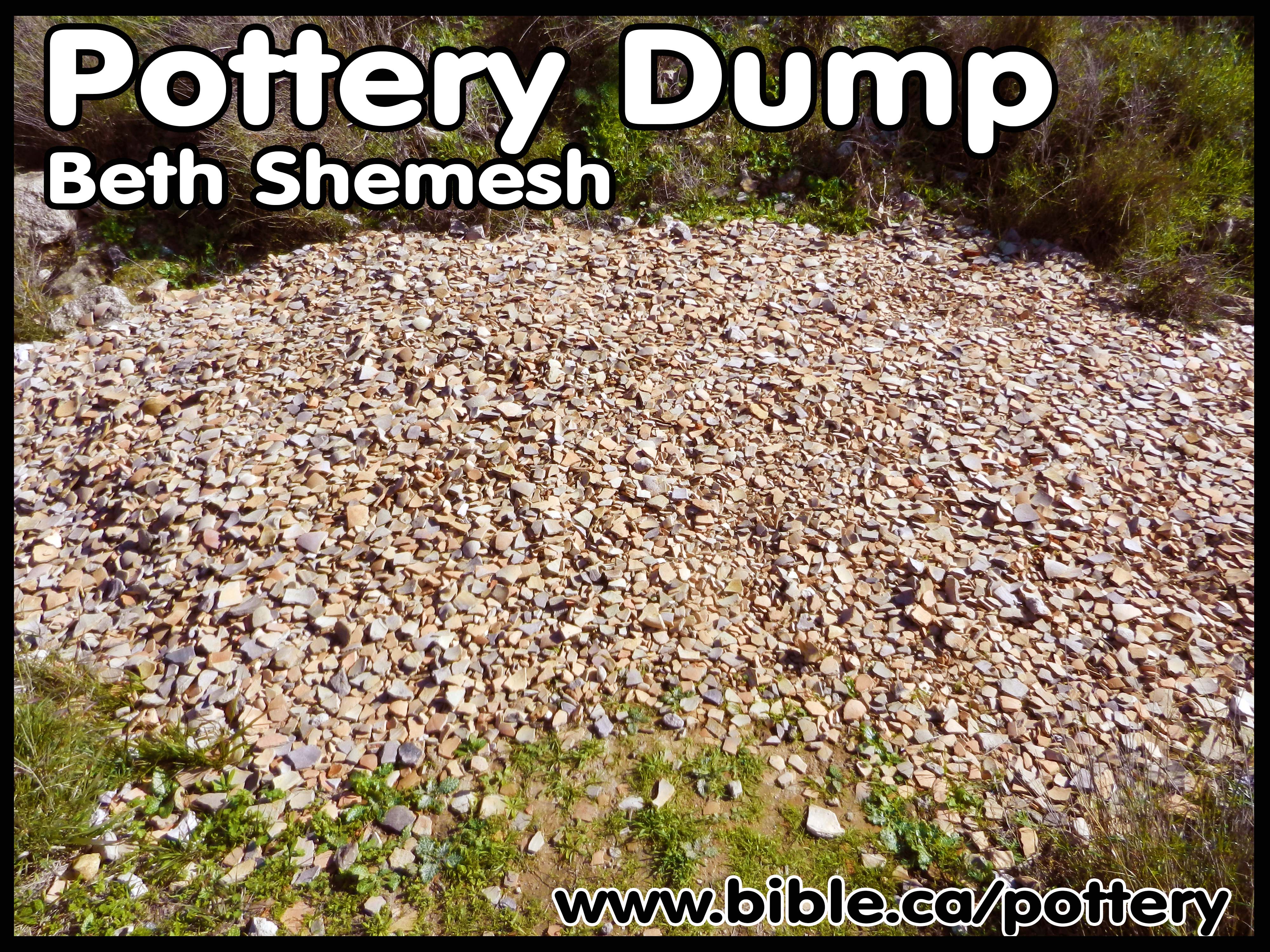
a. Jeremiah shatters an earthenware jar, demonstrating that God will shatter Jerusalem.
b. "Thus says the LORD, “Go and buy a potter’s earthenware jar, and take some of the elders of the people and some of the senior priests. “Then go out to the valley of Ben-hinnom, which is by the entrance of the potsherd gate, and proclaim there the words that I tell you, and say, ‘Hear the word of the LORD, O kings of Judah and inhabitants of Jerusalem: thus says the LORD of hosts, the God of Israel, “Behold I am about to bring a calamity upon this place, at which the ears of everyone that hears of it will tingle. “Because they have forsaken Me and have made this an alien place and have burned sacrifices in it to other gods, that neither they nor their forefathers nor the kings of Judah had ever known, and because they have filled this place with the blood of the innocent and have built the high places of Baal to burn their sons in the fire as burnt offerings to Baal, a thing which I never commanded or spoke of, nor did it ever enter My mind; therefore, behold, days are coming,” declares the LORD, “when this place will no longer be called Topheth or the valley of Ben-hinnom, but rather the valley of Slaughter. “I will make void the counsel of Judah and Jerusalem in this place, and I will cause them to fall by the sword before their enemies and by the hand of those who seek their life; and I will give over their carcasses as food for the birds of the sky and the beasts of the earth. “I will also make this city a desolation and an object of hissing; everyone who passes by it will be astonished and hiss because of all its disasters. “I will make them eat the flesh of their sons and the flesh of their daughters, and they will eat one another’s flesh in the siege and in the distress with which their enemies and those who seek their life will distress them.” ’ “Then you are to break the jar in the sight of the men who accompany you and say to them, ‘Thus says the LORD of hosts, “Just so will I break this people and this city, even as one breaks a potter’s vessel, which cannot again be repaired; and they will bury in Topheth because there is no other place for burial. “This is how I will treat this place and its inhabitants,” declares the LORD, “so as to make this city like Topheth. “The houses of Jerusalem and the houses of the kings of Judah will be defiled like the place Topheth, because of all the houses on whose rooftops they burned sacrifices to all the heavenly host and poured out drink offerings to other gods.” ’ ”" (Jeremiah 19:1-13)
4.
Sign Act in Av 594 BC (late summer) (Jer
27)
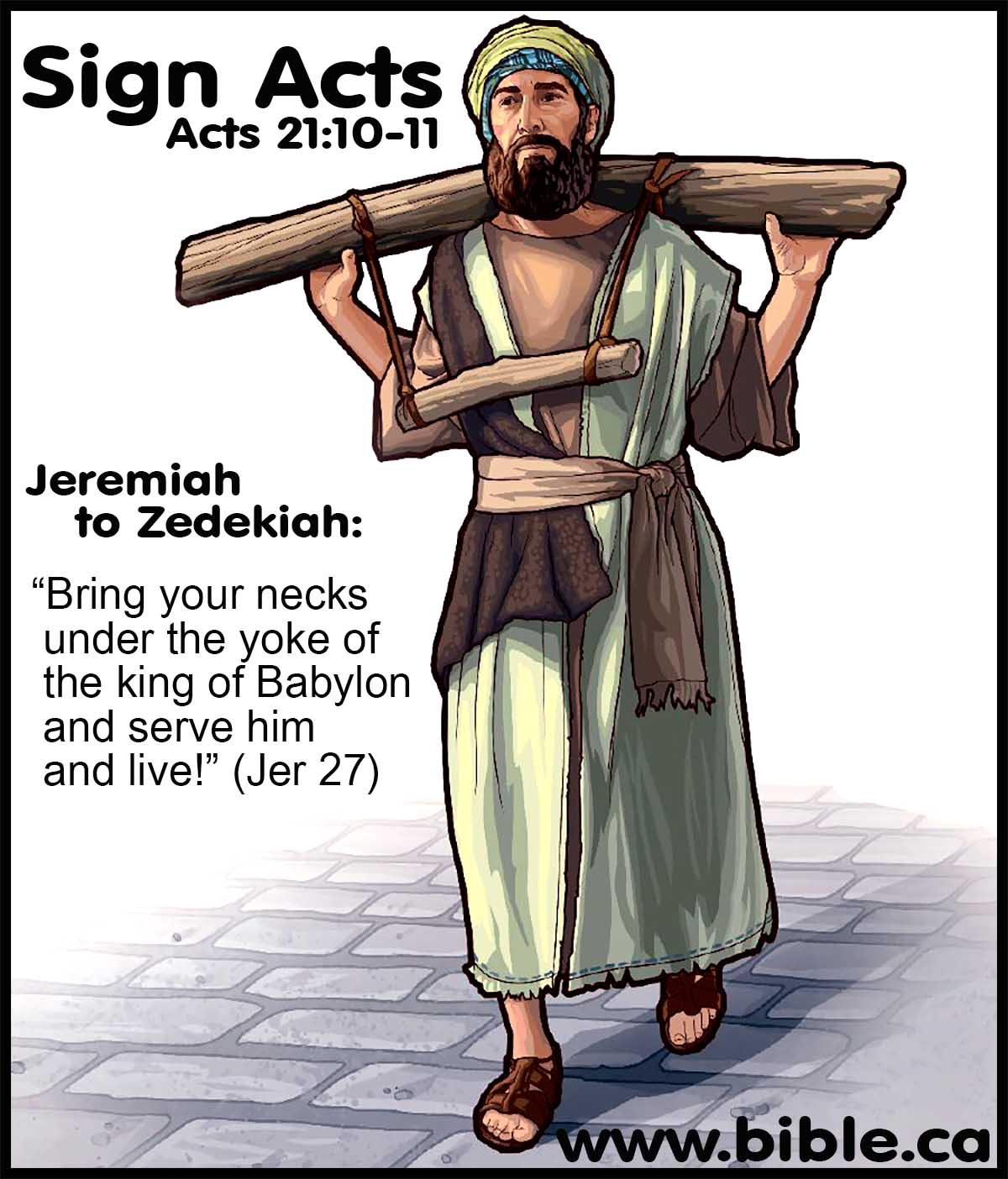
a. Jeremiah wears a yoke to advise Judah to continue its submission to Babylon. In response, Hananiah the false prophet breaks the yoke to symbolize the divine breaking of the Babylonians’ rule.
b. "In the beginning of the reign of Zedekiah the son of Josiah, king of Judah, this word came to Jeremiah from the Lord, saying— thus says the Lord to me—“Make for yourself bonds and yokes and put them on your neck, and send word to the king of Edom, to the king of Moab, to the king of the sons of Ammon, to the king of Tyre and to the king of Sidon by the messengers who come to Jerusalem to Zedekiah king of Judah." (Jeremiah 27:1-3)
c. "I spoke words like all these to Zedekiah king of Judah, saying, “Bring your necks under the yoke of the king of Babylon and serve him and his people, and live!" (Jeremiah 27:12)
d. "Then Hananiah the prophet took the yoke from the neck of Jeremiah the prophet and broke it. Hananiah spoke in the presence of all the people, saying, “Thus says the Lord, ‘Even so will I break within two full years the yoke of Nebuchadnezzar king of Babylon from the neck of all the nations.’ ” Then the prophet Jeremiah went his way. The word of the Lord came to Jeremiah after Hananiah the prophet had broken the yoke from off the neck of the prophet Jeremiah, saying, “Go and speak to Hananiah, saying, ‘Thus says the Lord, “You have broken the yokes of wood, but you have made instead of them yokes of iron.” ‘For thus says the Lord of hosts, the God of Israel, “I have put a yoke of iron on the neck of all these nations, that they may serve Nebuchadnezzar king of Babylon; and they will serve him. And I have also given him the beasts of the field.” ’ ” Then Jeremiah the prophet said to Hananiah the prophet, “Listen now, Hananiah, the Lord has not sent you, and you have made this people trust in a lie. “Therefore thus says the Lord, ‘Behold, I am about to remove you from the face of the earth. This year you are going to die, because you have counseled rebellion against the Lord.’ ” So Hananiah the prophet died in the same year in the seventh month." (Jeremiah 28:10-17)
5. Ezekiel remains speechless from the time of his calling as a prophet until he receives the news that Jerusalem has fallen.
a. Sign Act in 593 BC (Ezek 3:24-27) "The Spirit then entered me and made me stand on my feet, and He spoke with me and said to me, “Go, shut yourself up in your house. “As for you, son of man, they will put ropes on you and bind you with them so that you cannot go out among them. “Moreover, I will make your tongue stick to the roof of your mouth so that you will be mute and cannot be a man who rebukes them, for they are a rebellious house. “But when I speak to you, I will open your mouth and you will say to them, ‘Thus says the Lord GOD.’ He who hears, let him hear; and he who refuses, let him refuse; for they are a rebellious house." (Ezekiel 3:24-27)
b. Sign Act in 589 Ezek (Ezek 24:25-27) "‘As for you, son of man, will it not be on the day when I take from them their stronghold, the joy of their pride, the desire of their eyes and their heart’s delight, their sons and their daughters, that on that day he who escapes will come to you with information for your ears? ‘On that day your mouth will be opened to him who escaped, and you will speak and be mute no longer. Thus you will be a sign to them, and they will know that I am the LORD.’ ”" (Ezekiel 24:25-27)
c. Sign Act in 586 BC (Ezek 33:21-22) "Now in the twelfth year of our exile, on the fifth of the tenth month, the refugees from Jerusalem came to me, saying, “The city has been taken.” Now the hand of the LORD had been upon me in the evening, before the refugees came. And He opened my mouth at the time they came to me in the morning; so my mouth was opened and I was no longer speechless." (Ezekiel 33:21-22)
6. Sign Act in 593 BC: (Ezek 4:1-3)
a.
Ezekiel drawing Jerusalem on a brick and mimicking the future time when
Nebuchadnezzar lays siege to the city. He inscribes “Jerusalem” on the brick.
He lays siege to the city, sets an iron griddle next to it, and sets his face
against the griddle. Here is an unrelated brick from Esagila and Ezida in
Babylon that was stamped with Nebuchadnezzar’s inscription. It is interesting
that many of these bricks have been excavated and they were made in the
millions. This means they were common and well known at the time of Zedekiah.
Ezekiel who was living in Babylon at the time did a kind of imitation
inscription. In place of the common Nebuchadnezzar inscription, was Ezekiel’s
drawing of Jerusalem, which would be destroyed by Nebuchadnezzar!
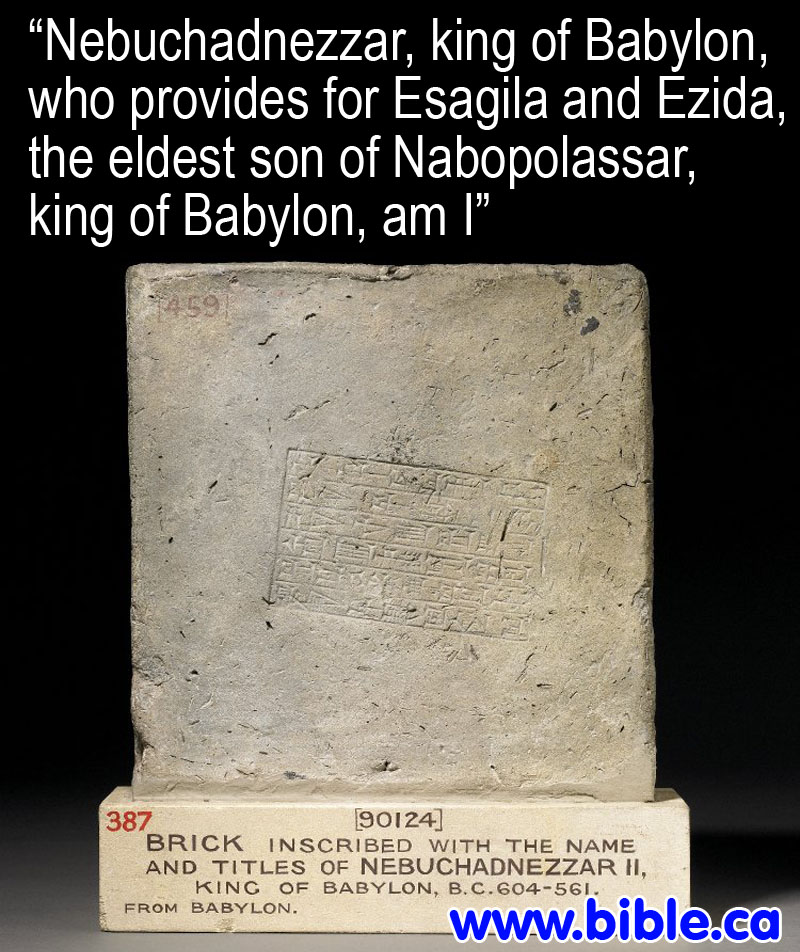
b. “In the representation of the model siege (4:1-2), there was no ambiguity as to what the nonverbal artifacts represented—they illustrated the siege of a city. But there was probably ambiguity over specifics of the representation, such as what city it was and who the attackers were. Since the inscribed city may have been like that of a victory depiction showing the siege from the ground level with primarily only the outer city walls being depicted, distinctive internal characteristics of the city, such as the Temple, the royal palace, significant streets, would not have been represented. Due to the schematized nature of the drawing, regardless of whether it was a side view of the city walls or an overhead, map-type drawing, the specific identification of the city may well have been very difficult to ascertain immediately. Because of the popular theology, the audience may have thought or hoped that Ezekiel was representing the siege of Babylon itself, and thus declaring a message like other prophets (cf. Jer. 27-29) who were proclaiming Babylon’s imminent demise. This ambiguity was not clarified until the verbal proclamation was given by Ezekiel (4:7). If the nonverbal displays by the prophet were thus erroneously misconstrued by the audience because of their being filtered through the popular theological beliefs, the impact of Ezekiel’s words ‘This is Jerusalem’ (5:5) must have been immensely shocking. It was a message the audience would not have anticipated hearing nor desired to hear.” (Jeremiah's and Ezekiel's Sign-Acts, Kelvin G. Friebel, p229, 1999 AD)
c. "“Now you son of man, get yourself a brick, place it before you and inscribe a city on it, Jerusalem. “Then lay siege against it, build a siege wall, raise up a ramp, pitch camps and place battering rams against it all around. “Then get yourself an iron plate and set it up as an iron wall between you and the city, and set your face toward it so that it is under siege, and besiege it. This is a sign to the house of Israel." (Ezekiel 4:1-3)
7. Sign Act in 593 BC: (Ezek 4:4-6)
a. Ezekiel lying on his side for 390 days and then on his right side for forty days to symbolize the him bearing of the people’s sins.
b. "“As for you, lie down on your left side and lay the iniquity of the house of Israel on it; you shall bear their iniquity for the number of days that you lie on it. “For I have assigned you a number of days corresponding to the years of their iniquity, three hundred and ninety days; thus you shall bear the iniquity of the house of Israel. “When you have completed these, you shall lie down a second time, but on your right side and bear the iniquity of the house of Judah; I have assigned it to you for forty days, a day for each year." (Ezekiel 4:4-6)
8. Sign Act in 593 BC: (Ezek 4:9-17)
a. Ezekiel eats rationed portions of food and water to represent the scarcity of food during the siege; he bakes his bread on dung to symbolize the unclean food of the exile.
b. "“But as for you, take wheat, barley, beans, lentils, millet and spelt, put them in one vessel and make them into bread for yourself; you shall eat it according to the number of the days that you lie on your side, three hundred and ninety days. “Your food which you eat shall be twenty shekels a day by weight; you shall eat it from time to time. “The water you drink shall be the sixth part of a hin by measure; you shall drink it from time to time. “You shall eat it as a barley cake, having baked it in their sight over human dung.” Then the LORD said, “Thus will the sons of Israel eat their bread unclean among the nations where I will banish them.” But I said, “Ah, Lord GOD! Behold, I have never been defiled; for from my youth until now I have never eaten what died of itself or was torn by beasts, nor has any unclean meat ever entered my mouth.” Then He said to me, “See, I will give you cow’s dung in place of human dung over which you will prepare your bread.” Moreover, He said to me, “Son of man, behold, I am going to break the staff of bread in Jerusalem, and they will eat bread by weight and with anxiety, and drink water by measure and in horror, because bread and water will be scarce; and they will be appalled with one another and waste away in their iniquity." (Ezekiel 4:9-17)
9. Sign Act in 593 BC: (Ezek 5:1-4)
a. Ezekiel cuts his hair, divides it into three portions, and then, to show the threefold fate of the inhabitants of Jerusalem, burns one third upon the model siege, chops up another third with his sword, and scatters the last third to the wind and chases after it with the sword.
b. "“As for you, son of man, take a sharp sword; take and use it as a barber’s razor on your head and beard. Then take scales for weighing and divide the hair. “One third you shall burn in the fire at the center of the city, when the days of the siege are completed. Then you shall take one third and strike it with the sword all around the city, and one third you shall scatter to the wind; and I will unsheathe a sword behind them. “Take also a few in number from them and bind them in the edges of your robes. “Take again some of them and throw them into the fire and burn them in the fire; from it a fire will spread to all the house of Israel." (Ezekiel 5:1-4)
10. Sign Act in 592 BC: (Ezek 6:11-12)
a. Ezekiel claps his hands and cries “Ah!” to display God’s indignation over the people’s wicked practices.
b. "“Thus says the Lord GOD, ‘Clap your hand, stamp your foot and say, “Alas, because of all the evil abominations of the house of Israel, which will fall by sword, famine and plague! “He who is far off will die by the plague, and he who is near will fall by the sword, and he who remains and is besieged will die by the famine. Thus will I spend My wrath on them." (Ezekiel 6:11-12)
11. Sign Act in 592 BC: (Ezek 12:1-16)
a. Ezekiel mimicking going into exile. Ezekiel prepares a bag, digs a hole in the wall of his house, places the bag upon his shoulder, exits through the hole with his eyes covered, and departs from the city to represent the people of Jerusalem going off into exile.
b. "Then the word of the Lord came to me, saying, “Son of man, you live in the midst of the rebellious house, who have eyes to see but do not see, ears to hear but do not hear; for they are a rebellious house. “Therefore, son of man, prepare for yourself baggage for exile and go into exile by day in their sight; even go into exile from your place to another place in their sight. Perhaps they will understand though they are a rebellious house. “Bring your baggage out by day in their sight, as baggage for exile. Then you will go out at evening in their sight, as those going into exile. “Dig a hole through the wall in their sight and go out through it. “Load the baggage on your shoulder in their sight and carry it out in the dark. You shall cover your face so that you cannot see the land, for I have set you as a sign to the house of Israel.” I did so, as I had been commanded. By day I brought out my baggage like the baggage of an exile. Then in the evening I dug through the wall with my hands; I went out in the dark and carried the baggage on my shoulder in their sight. In the morning the word of the Lord came to me, saying, “Son of man, has not the house of Israel, the rebellious house, said to you, ‘What are you doing?’ “Say to them, ‘Thus says the Lord God, “This burden concerns the prince in Jerusalem as well as all the house of Israel who are in it.” ’ “Say, ‘I am a sign to you. As I have done, so it will be done to them; they will go into exile, into captivity.’ “The prince who is among them will load his baggage on his shoulder in the dark and go out. They will dig a hole through the wall to bring it out. He will cover his face so that he can not see the land with his eyes. “I will also spread My net over him, and he will be caught in My snare. And I will bring him to Babylon in the land of the Chaldeans; yet he will not see it, though he will die there. “I will scatter to every wind all who are around him, his helpers and all his troops; and I will draw out a sword after them. “So they will know that I am the Lord when I scatter them among the nations and spread them among the countries. “But I will spare a few of them from the sword, the famine and the pestilence that they may tell all their abominations among the nations where they go, and may know that I am the Lord.”" (Ezekiel 12:1-16)
12. Sign Act in 592 BC: (Ezek 12:17-20)
a. Ezekiel eats and drinks with trembling to show the Jerusalemites’ emotional distress during the Babylonian invasion.
b. "Moreover, the word of the LORD came to me saying, “Son of man, eat your bread with trembling and drink your water with quivering and anxiety. “Then say to the people of the land, ‘Thus says the Lord GOD concerning the inhabitants of Jerusalem in the land of Israel, “They will eat their bread with anxiety and drink their water with horror, because their land will be stripped of its fullness on account of the violence of all who live in it. “The inhabited cities will be laid waste and the land will be a desolation. So you will know that I am the LORD.” ’ ”" (Ezekiel 12:17-20)
13. Sign Act in 591 BC: (Ezek 21:6-7)
a. Ezekiel groans to demonstrate the people’s response to the news of God’s impending judgment.
b. "“As for you, son of man, groan with breaking heart and bitter grief, groan in their sight. “And when they say to you, ‘Why do you groan?’ you shall say, ‘Because of the news that is coming; and every heart will melt, all hands will be feeble, every spirit will faint and all knees will be weak as water. Behold, it comes and it will happen,’ declares the Lord GOD.”" (Ezekiel 21:6-7)
14. Sign Act in 591 BC: (Ezek 21:8-17)
a. Ezekiel cries out and strikes his thigh to depict the people’s gestures of grief. Later, he claps his hands to show the divine indignation toward the people.
b. "Again the word of the Lord came to me, saying, “Son of man, prophesy and say, ‘Thus says the Lord.’ Say, ‘A sword, a sword sharpened And also polished! ‘Sharpened to make a slaughter, Polished to flash like lightning!’ Or shall we rejoice, the rod of My son despising every tree? “It is given to be polished, that it may be handled; the sword is sharpened and polished, to give it into the hand of the slayer. “Cry out and wail, son of man; for it is against My people, it is against all the officials of Israel. They are delivered over to the sword with My people, therefore strike your thigh. “For there is a testing; and what if even the rod which despises will be no more?” declares the Lord God. “You therefore, son of man, prophesy and clap your hands together; and let the sword be doubled the third time, the sword for the slain. It is the sword for the great one slain, which surrounds them, that their hearts may melt, and many fall at all their gates. I have given the glittering sword. Ah! It is made for striking like lightning, it is wrapped up in readiness for slaughter. “Show yourself sharp, go to the right; set yourself; go to the left, wherever your edge is appointed. “I will also clap My hands together, and I will appease My wrath; I, the Lord, have spoken.”" (Ezekiel 21:8-17)
15. Sign Act in 591 BC: (Ezek 21:18-23)
a. Ezekiel sets up a signpost to show the ways the king of Babylon might take in his march against the west.
b. "The word of the Lord came to me saying, “As for you, son of man, make two ways for the sword of the king of Babylon to come; both of them will go out of one land. And make a signpost; make it at the head of the way to the city. “You shall mark a way for the sword to come to Rabbah of the sons of Ammon, and to Judah into fortified Jerusalem. “For the king of Babylon stands at the parting of the way, at the head of the two ways, to use divination; he shakes the arrows, he consults the household idols, he looks at the liver. “Into his right hand came the divination, ‘Jerusalem,’ to set battering rams, to open the mouth for slaughter, to lift up the voice with a battle cry, to set battering rams against the gates, to cast up ramps, to build a siege wall. “And it will be to them like a false divination in their eyes; they have sworn solemn oaths. But he brings iniquity to remembrance, that they may be seized." (Ezekiel 21:18-23)
16. Sign Act in 589 BC: (Ezek 24:15-18, 24)
a. Ezekiel not mourning his wife’s death. Ezekiel refrains from weeping or performing the normal mourning rituals at his wife’s death to illustrate how the people should respond to the news of the fall of Jerusalem.
b. "And the word of the Lord came to me saying, “Son of man, behold, I am about to take from you the desire of your eyes with a blow; but you shall not mourn and you shall not weep, and your tears shall not come. “Groan silently; make no mourning for the dead. Bind on your turban and put your shoes on your feet, and do not cover your mustache and do not eat the bread of men.” So I spoke to the people in the morning, and in the evening my wife died. And in the morning I did as I was commanded." (Ezekiel 24:15-18)
c. "‘Thus Ezekiel will be a sign to you; according to all that he has done you will do; when it comes, then you will know that I am the Lord God.’ ”" (Ezekiel 24:24)
17. Sign Act in 17th January 589 BC: (Ezek 24:17)
a. The opening of Ezekiel’s mouth fulfilling a 42 month period of muteness:
a. Begins being mute at the time Zedekiah liberated Jerusalem: 6 August 593 BC (Ezek 3:24-27) and when Nebuchadnezzar’s armies arrive on 27th Jan 589 BC (Ezek 24:25-27) which is exactly 42 months.
b. "‘On that day your mouth will be opened to him who escaped, and you will speak and be mute no longer. Thus you will be a sign to them, and they will know that I am the Lord.’ ”" (Ezekiel 24:27)
b. 42 months ended when the destroying armies of Nebuchadnezzar arrived.
c. This is a synchronism with the two witnesses in the book of Revelation.
d. See Bible Only Revelation Commentary by Steven Rudd
18. Sign Act in 588 BC (Jer 32:6-15)
a.
See also: Creation
of legal documents sealed with string and bulla. Notice two copies were
made, one that was sealed and placed in a vault and the second was located in
room outside the vault for anyone to look inside. If anyone disputed the
outside copy differed from the copy in the vault, they would unseal the copy in
the vault.

b. Jeremiah purchases a parcel of land to signify that, in the future, fields would once again be bought and sold by the Judahites.
c. "And Jeremiah said, “The word of the Lord came to me, saying, ‘Behold, Hanamel the son of Shallum your uncle is coming to you, saying, “Buy for yourself my field which is at Anathoth, for you have the right of redemption to buy it.” ’ “Then Hanamel my uncle’s son came to me in the court of the guard according to the word of the Lord and said to me, ‘Buy my field, please, that is at Anathoth, which is in the land of Benjamin; for you have the right of possession and the redemption is yours; buy it for yourself.’ Then I knew that this was the word of the Lord. “I bought the field which was at Anathoth from Hanamel my uncle’s son, and I weighed out the silver for him, seventeen shekels of silver. “I signed and sealed the deed, and called in witnesses, and weighed out the silver on the scales. “Then I took the deeds of purchase, both the sealed copy containing the terms and conditions and the open copy; and I gave the deed of purchase to Baruch the son of Neriah, the son of Mahseiah, in the sight of Hanamel my uncle’s son and in the sight of the witnesses who signed the deed of purchase, before all the Jews who were sitting in the court of the guard. “And I commanded Baruch in their presence, saying, ‘Thus says the Lord of hosts, the God of Israel, “Take these deeds, this sealed deed of purchase and this open deed, and put them in an earthenware jar, that they may last a long time.” ‘For thus says the Lord of hosts, the God of Israel, “Houses and fields and vineyards will again be bought in this land.” ’" (Jeremiah 32:6-15)
19. Sign Act in 587 BC (Jer 43:8-13)
a. In Tahpanes, Egypt, Jeremiah buries a stone to indicate that the king of Babylon would invade Egypt and construct a throne on that very location.
b. "Then the word of the Lord came to Jeremiah in Tahpanhes, saying, “Take some large stones in your hands and hide them in the mortar in the brick terrace which is at the entrance of Pharaoh’s palace in Tahpanhes, in the sight of some of the Jews; and say to them, ‘Thus says the Lord of hosts, the God of Israel, “Behold, I am going to send and get Nebuchadnezzar the king of Babylon, My servant, and I am going to set his throne right over these stones that I have hidden; and he will spread his canopy over them. “He will also come and strike the land of Egypt; those who are meant for death will be given over to death, and those for captivity to captivity, and those for the sword to the sword. “And I shall set fire to the temples of the gods of Egypt, and he will burn them and take them captive. So he will wrap himself with the land of Egypt as a shepherd wraps himself with his garment, and he will depart from there safely. “He will also shatter the obelisks of Heliopolis, which is in the land of Egypt; and the temples of the gods of Egypt he will burn with fire.” ’ ”" (Jeremiah 43:8-13)
20. Sign Act in 586 BC: (Ezek 37:15-28)
a. The unifying of the two sticks after Ezekiel learns Jerusalem has fallen. Ezekiel joins two pieces of wood to signify the reunification of Israel and Judah in the church.
b. "The word of the Lord came again to me saying, “And you, son of man, take for yourself one stick and write on it, ‘For Judah and for the sons of Israel, his companions’; then take another stick and write on it, ‘For Joseph, the stick of Ephraim and all the house of Israel, his companions.’ “Then join them for yourself one to another into one stick, that they may become one in your hand. “When the sons of your people speak to you saying, ‘Will you not declare to us what you mean by these?’ say to them, ‘Thus says the Lord God, “Behold, I will take the stick of Joseph, which is in the hand of Ephraim, and the tribes of Israel, his companions; and I will put them with it, with the stick of Judah, and make them one stick, and they will be one in My hand.” ’ “The sticks on which you write will be in your hand before their eyes. “Say to them, ‘Thus says the Lord God, “Behold, I will take the sons of Israel from among the nations where they have gone, and I will gather them from every side and bring them into their own land; and I will make them one nation in the land, on the mountains of Israel; and one king will be king for all of them; and they will no longer be two nations and no longer be divided into two kingdoms. “They will no longer defile themselves with their idols, or with their detestable things, or with any of their transgressions; but I will deliver them from all their dwelling places in which they have sinned, and will cleanse them. And they will be My people, and I will be their God. “My servant David will be king over them, and they will all have one shepherd; and they will walk in My ordinances and keep My statutes and observe them. “They will live on the land that I gave to Jacob My servant, in which your fathers lived; and they will live on it, they, and their sons and their sons’ sons, forever; and David My servant will be their prince forever. “I will make a covenant of peace with them; it will be an everlasting covenant with them. And I will place them and multiply them, and will set My sanctuary in their midst forever. “My dwelling place also will be with them; and I will be their God, and they will be My people. “And the nations will know that I am the Lord who sanctifies Israel, when My sanctuary is in their midst forever.” ’ ”" (Ezekiel 37:15-28)
21. See outline on 33 Sign Acts of the Bible
|
|
II. Chronological reading of Jeremiah during the time of Zedekiah: 597-587 BC
|
BOOK OF JEREMIAH: 597-587 BC · Jeremiah is born the same year as Josiah: 648 BC · Both Jeremiah and Josiah were chosen before birth. · Jeremiah started preaching in 629 BC at age 19, the same year Josiah began purging the idols. · Jeremiah was the central prophet of the captivity. · Jeremiah died in 561 BC at the age of 87 years. · The book of Jeremiah has two ancient autograph inspired textual versions. · Jeremiah also wrote 1st & 2nd Kings. |
A. Jeremiah wrote two autograph copies of “Jeremiah”:
1. The book of Jeremiah has two ancient autograph inspired textual versions.
2. Jeremiah wrote two autograph copies of “Jeremiah”.
3.
Both copies were inspired by the Holy Spirit:
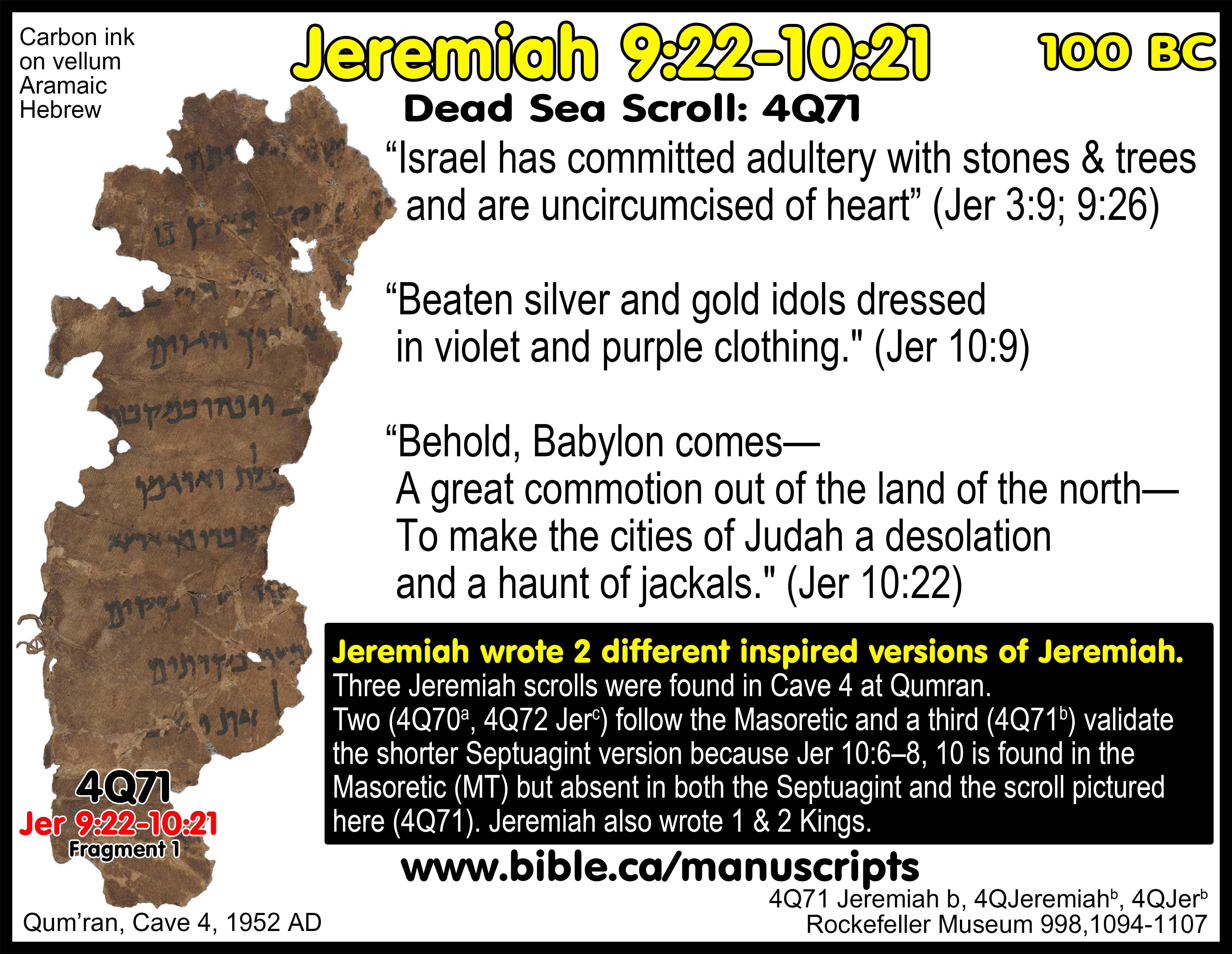
B. Chronological reading of Jeremiah during the time of Zedekiah: 597-587 BC
· 597 BC: Chapters 7-20, 24
· 595/594 BC: Chapters 27-31; 51:59-64 (after October)
· 589 BC: Chapters 37-38
· 588 BC: Chapters 32
· 587 BC: (on or before 10 Av) Chapters 21-23, Chapters 33-34; 39:16-18, Chapter 22 (Historical narrative)
C. Jeremiah was born in the same year as King Josiah and begins preaching when both were age 19:
1. Jeremiah and King Josiah were chosen before they were born the same year in 648 BC: Jer 1:7
a. "Now the word of the LORD came to me saying, “Before I formed you in the womb I knew you, And before you were born I consecrated you; I have appointed you a prophet to the nations.” Then I said, “Alas, Lord GOD! Behold, I do not know how to speak, Because I am a youth.” But the LORD said to me, “Do not say, ‘I am a youth,’ Because everywhere I send you, you shall go, And all that I command you, you shall speak. “Do not be afraid of them, For I am with you to deliver you,” declares the LORD. Then the LORD stretched out His hand and touched my mouth, and the LORD said to me, “Behold, I have put My words in your mouth. “See, I have appointed you this day over the nations and over the kingdoms, To pluck up and to break down, To destroy and to overthrow, To build and to plant.”" (Jeremiah 1:4-10)
b. Jeremiah was called at age 19. Josiah was enlightened at age 15 as part of a list of other 15-year-olds in the Bible: Joseph - Egypt (17), Jonathan - Geba (15), David - Goliath (15), Samuel (10)
c. Jeremiah's last entry is when Evil-Merodach frees Jehoiachin from prison in 561 BC. Jeremiah would be 87 years old.
2. Where Jeremiah fits into the three-stage enlightenment of Josiah in 629 BC:
a. AGE 15, 633 BC: Josiah first sought God in 633 BC at age 15. "For in the eighth year of his reign while he was still a youth, he began to seek the God of his father David; and in the twelfth year he began to purge Judah and Jerusalem of the high places, the Asherim, the carved images and the molten images." (2 Chronicles 34:3)
b. AGE 19, 629 BC: Jeremiah age 19 beings preaching and Josiah (also age 19) purged the idols: (2 Chron 34:3)
c. AGE 26, 623 BC: Ezekiel is born and Josiah repairs the temple and finds the lost book of the Law at age 26: 2 Ki 23
d. Restorations: remove idols from temple and killed the idolatrous priests. (2 Ki 23:4-20). Restored the Passover: 2 Ki 23:21-23. Removes mediums and spiritists: 2 Ki 23:24.
D. Jeremiah would likely have been the high priest in his day, had his “Eli” bloodline not been defrocked by David:
1. Jeremiah, like Josiah, was an outsider because he descended from the Eli line of high priests from Anathoth who were deposed by David according to the prophecy of Samuel.
a. "The words of Jeremiah the son of Hilkiah, of the priests who were in Anathoth in the land of Benjamin, to whom the word of the Lord came in the days of Josiah the son of Amon, king of Judah, in the thirteenth year of his reign. It came also in the days of Jehoiakim the son of Josiah, king of Judah, until the end of the eleventh year of Zedekiah the son of Josiah, king of Judah, until the exile of Jerusalem in the fifth month." (Jeremiah 1:1-3)
b. "It is likely that these priests of Anathoth were descendants of Eli and Abiathar, priests who at one time presided over worship before the Ark but who were exiled to Anathoth early in the reign of Solomon. This places Jeremiah in a rather unusual position as there is an almost automatic antagonism between Jeremiah and the Zadokite priests who preside over temple worship. This inbred antagonism explains the bitterness one senses in some of the conversations between Jeremiah and the temple priests (e.g., Jer 20:1-6; 29:24-32)." (NIV commentary, Jer 1:1, 2002 AD)
2. Jeremiah was not the son of Hilkiah the High priest:
a. Jeremiah was a resident from Anathoth where the descendants of Eli were banished by David and dismissed forever from being high priest.
b. We have Jeremiah, a youth prophet like Samuel, sent to warn of the destruction of the temple pointing to Shiloh as a warning.
c. This answers the question definitively that Jeremiah's father, Hilkiah, was not the same as the Hilkiah the high priest who would find the book of the law in the temple.
3. Both Josiah and Jeremiah were at war with the religious establishment and the idol worship that was rampant among the people.
a. Josiah destroyed the high places of worship, killed the false priests and did his best to reestablish fundamentalist Mosaic Judaism. This set him was war with the leaders and he became hated by the people.
b. Jeremiah was the mouth of God who condemned kings, idolatrous priests, false prophets and the masses who refused to obey God.
c. Jeremiah also prophesied everything king, priest and people knew, would be utterly destroyed by the Babylonians.
4. Josiah and Jeremiah mirror the ministry of Jesus, the apostles and all Christians today who are a tiny minority condemning the world, false religion and warning about impending judgement destruction from God.
5. Three times Zedekiah rejected Jeremiah’s advice and three times God ordered him to stop praying for Zedekiah:
a. Three times God told Jeremiah NOT to pray to him for Zedekiah or the welfare of Judah:
i. 597 BC: Jeremiah 7:16-18
ii. 597 BC: Jeremiah 11:13-14
iii. 597 BC: Jeremiah 14:11-12
b. As Nebuchadnezzar was attacking Jerusalem and laying the two year siege, Zedekiah sought the advice of Jeremiah three times in 589 BC. Each time Zedekiah rejected Jeremiah's advice to surrender to Nebuchadnezzar. This proves God knew the heart of Zedekiah was unworthy of prayers!
i. 589 BC: Jeremiah 37:1-10
ii. 589 BC: Jeremiah 37:16-21
iii. 589 BC: Jeremiah 38:14-28
|
|
III. Chronological reading of Ezekiel during the time of Zedekiah: 597-587 BC
|
BOOK OF EZEKIEL: 597-587 BC · Ezekiel was born the same year Hilkiah found the lost book of the law, which was also a Jubilee year: 623 BC. · Ezekiel surrendered to Nebuchadnezzar in 598 BC along with Jehoiakim (Coniah). · Ezekiel began preaching in 593 BC at the age of 30, (minimum age of Priests), in the 30th year of the Jubilee cycle. |
A. Chronological reading of Ezekiel during the time of Zedekiah: 597-587 BC
See Bible Only Revelation Commentary by Steven Rudd
|
5 Tammuz |
Ezek 1:1-3:15 |
Ezekiel’s first vision of the “glory of Yahweh” 1:1 “In the 13th year in the fourth month on the fifth day” 1:2 “In the fifth month, of the fifth year of King Jehoiachin’s exile” 30 years = 623 BC 1. Book of the law found 2. Year Ezekiel was born: now age 30 and can serve as a priest 3. Year 30 of 49 year jubilee cycle. |
|
|
Sunday 6 Aug 593 |
11 Tammuz |
Ezek 3:16-5:17 |
Ezekiel’s official call as a “watchman” for the “house of Israel” |
|
592 |
- |
Ezek 6-7 |
Total destruction predicted for Judea “Andy Steinman said, “The way I figured it was this: Except for Ezek 29:17-30:19, Ezekiel’s prophecies appear to have been arranged chronologically. That would imply that Ezek 6-7 fall somewhere between 3:16-5:17 (11 Tammuz 593) and 8:1 (5 Elul 592). Given the content of Ezek 6-7, later in Ezekiel’s 430 days seems more likely to me, so I think 592 is most likely.” (Rodger Young, 2017 AD) |
|
Monday 17 Sept 592 |
5 Elul |
Ezek 8-19 |
Ezekiel is translated to Jerusalem for the first temple vision |
|
Wednesday 14 Aug 591 |
10 Av |
Ezek 20-23 |
Ezekiel has a visit from the “elders” of the people in exile |
|
Tuesday 27 Jan 589 |
10 Tebeth |
Ezek 24-25 |
Nebuchadnezzar's siege of Jerusalem begins |
|
17 January 588 |
12 Tebeth |
Ezek 29:1-16 |
FIRST prophecy against Egypt |
|
Saturday 29 April 587 |
7 Nisan |
Ezek 30:20-26 |
SECOND prophecy against Egypt |
|
Wednesday 21 June 587 |
1 Sivan |
Ezek 31 |
THIRD prophecy against Pharaoh of Egypt |
|
Monday 18 Sept 587 |
1 Elul |
Ezek 26-28 |
Prophecy against Tyre
Sept. 18, 587. Month was Elul, although Ezekiel does not state this explicitly. See From Abraham to Paul: A Biblical Chronology (FATP), p. 168. |
|
Friday 19 January 586 |
5 Tebeth |
Ezek 33:21- ch 39 |
Ezekiel first learns Jerusalem has fallen |
|
Thursday 15 March 586 |
1 Adar |
Ezek 32:1-16 |
FOURTH prophecy against Pharaoh of Egypt |
|
Thursday 29 March 586 |
15 Adar |
Ezek 32:17-33:20 |
FIFTH prophecy against Egypt |
|
5 October 574 |
10 Tishri |
Ezek 40:1a |
Ezekiel has a visionary translation to Jerusalem for the Second Temple vision It was Rosh HaShanah, New Year’s Day. Only in a Jubilee year did Rosh HaShanah occur on Tishri 10 instead of the usual Tishri 1. |
|
5 October 574 |
10 Tishri |
Ezek 40:1b-48:31 |
Double date notation for the final vision |
|
Tuesday 26 April 571 |
1 Nisan |
Ezek 29:17-30:19 |
SIXTH prophecy against Egypt |
B. Ezekiel begins preaching at age 30, which is also year 30 of 49 year jubilee cycle:
1. Ezek 1:1 = 593 BC = Ezekiel is 30 years old
a. Year Ezekiel was born: now age 30 and can serve as a priest
b. 593 BC + 30 years = 623 BC = Book of the law found
c. "Then Hilkiah the high priest said to Shaphan the scribe, “I have found the book of the law in the house of the LORD.” And Hilkiah gave the book to Shaphan who read it. Shaphan the scribe came to the king and brought back word to the king and said, “Your servants have emptied out the money that was found in the house, and have delivered it into the hand of the workmen who have the oversight of the house of the LORD.” Moreover, Shaphan the scribe told the king saying, “Hilkiah the priest has given me a book.” And Shaphan read it in the presence of the king. When the king heard the words of the book of the law, he tore his clothes." (2 Kings 22:8-11)
2. Levitical priests served autonomously from age 30-50:
a. Ezekiel began serving as a priest at age 30: Ezek 1:1
b. "from thirty years and upward, even to fifty years old, all who enter the service to do the work in the tent of meeting." (Numbers 4:3)
c. "The Levites were numbered from thirty years old and upward, and their number by census of men was 38,000." (1 Chronicles 23:3)
d. Training began at age 25: “This is what applies to the Levites: from twenty-five years old and upward they shall enter to perform service in the work of the tent of meeting." (Numbers 8:24)
e. Jesus began at age 30: "When He began His ministry, Jesus Himself was about thirty years of age, being, as was supposed, the son of Joseph, the son of Eli," (Luke 3:23)
3. Ezekiel was born in the Jubilee year of 623 BC: Ezek 40:1
a. Ezek 40:1 = Jubilee year = 25th year from 598 exile = 574 BC = year 49 of Jubilee
b. 598 BC - 25 = 574 BC = Jubilee of 49 year cycle
c. Birth of Ezekiel = 574 BC + 49 = 623 BC = the Jubilee year.
d. "In the twenty-fifth year of our exile, at the beginning of the year, on the tenth of the month, in the fourteenth year after the city was taken, on that same day the hand of the Lord was upon me and He brought me there." (Ezekiel 40:1)
e. "The double date notation is fatal to any scenario that dates the of Jerusalem to the Babylonians in 586 BC. Ezek 40:1 cannot be both the 25th year of the captivity of Jehoiachin and Ezekiel, as well as 14 years after the fall of the city if the fall of the city is put in the summer of 586. Try any combination you like: Nisan years for Judah and the captivity, Jehoiachin’s captivity not starting until one month after he was captured on Adar 16 597 (so Thiele), etc. None of these combinations work. But using the most straightforward reckoning (Tishri years for regnal years of Jehoiachin and years of the captivity, Jehoiachin’s captivity began the month he was captured, etc.) the math all works out exactly for 587 BC without special pleading." Rodger Young
|
|
IV. Ezekiel decodes the book of Revelation
|
Revelation written in AD 66: Flee Jerusalem or be destroyed in AD 70 · The central synchronism in the book of Revelation is with the destruction of Jerusalem in 587 BC and AD 70. · See Bible Only Revelation Commentary by Steven Rudd |
A. Ezekiel Decodes Revelation:
|
Ezekiel Decodes Revelation Chapter by Chapter topical/chronological correspondence between Revelation & Ezekiel See Bible Only Revelation Commentary by Steven Rudd |
||
|
LINK |
Topic |
Ezekiel Decodes Revelation |
|
Prophets Commissioned: Ezekiel and John |
Ezekiel 2-3 on July 593 BC |
|
|
Why was Revelation written to 7 Asia churches? |
|
|
|
Scene of God’s Throne |
Ezekiel 1 on July 593 BC |
|
|
1st 2nd 3rd 4th Seals: 4 horses of War |
Ezekiel 4-5 on Aug 593 BC |
|
|
5th Seal: Martyrs beneath Altar |
Ezekiel 6 on 592 BC |
|
|
6th Seal: Avenging Terror upon Jerusalem |
Ezekiel 7-8 on 592 BC |
|
|
Christians marked on forehead with Seal of God |
Ezekiel 9 on Sept 592 BC |
|
|
7th Seal: Grace withdrawn, Destruction Decreed |
Ezekiel 10:1-2 on Sept 592 BC |
|
|
1st 2nd 3rd 4th Trumpets against Jerusalem |
Ezekiel 10-12 on Sept 592 BC |
|
|
5th Trumpet/1st Woe: 5 month Civil War Roman “Scorpion” (catapult) Roman “engines” are symbolized as Scorpions and Locust: Rev 9:7-10 |
1 Maccabees 6:48–52 |
|
|
6th Trumpet/2nd Woe: Armies of Titus arrive |
Ezekiel 24 on 589 BC |
|
|
Two Witnesses: Ezekiel & Jesus ben Ananus |
Ezekiel 2 on July 593 BC Ezekiel 40-48 on Oct 574 BC Ezekiel 16 on Sept 592 BC Ezekiel 23 on Aug 591 BC Zech 4 Josephus |
|
|
Two Witnesses: Jesus predicted literal signs |
Mt 24; Lk 21 |
|
|
The 7 signs of Josephus |
Josephus Wars 6:288-300 |
|
|
Two Witness: Ezekiel and Jesus son of Ananus |
Josephus Wars 6:300-309 |
|
|
7th Trumpet/3rd Woe: Temple destroyed Mosaic Judaism Extinct |
Jeremiah 31:31 Colossians 2:14 Hebrews 8:6-7; 8:13; 10:9 |
|
|
Ezekiel Fulfilled: “Foursquare Temple Prophecy” |
Ezekiel 40:47; 43:3 Wars 6.310-315 The prophecy was fulfilled on 19th July AD 70: Wars 6:164-165 |
|
|
War in Heaven |
Numbers 24:17 Deuteronomy 33:11 Psalms 89:23 Songs of Sabbath Sacrifice |
|
|
The Beast from the Sea: Nero/Rome |
Daniel 7 |
|
|
The Beast from the Earth: 2 Horned Jewish Sheep in dragon’s clothing |
||
|
144,000, Wine Cup of Wrath prepared |
Ezekiel 14:19-22 on 592 BC Jeremiah 25:15-18 on 587 BC |
|
|
7 Bowls to avenge Christians in Heaven |
Ezekiel 24 on 589 BC |
|
|
7 Bowls of Wrath |
Ezekiel 13 on Sept 592 BC Ezekiel 23 on Aug 591 BC Ezekiel 24 in 589 BC |
|
|
7th Bowl: Rev 16:19 = 1st January AD 70 = Begging of final siege |
Josephus |
|
|
Roman engines were called Ballista |
Josephus |
|
|
Jerusalem the Great Harlot Rides on Rome |
Ezekiel 16, 23 on Sept 592 BC |
|
|
Jerusalem Temple destroyed “Come out of her, my people” |
Monday 6th August AD 70, Ezekiel 33:21 on 19th Jan. 586 BC |
|
|
Celebration, Marriage, Scavenger’s Feast, Hell |
Ezekiel 39 on Jan 586 BC |
|
|
1000 year “Days of the Messiah” |
Ezekiel 37-40 on Jan 586 BC Ezek 38:2; 39:1,6 |
|
|
Messianic Expectation window: 49 BC – AD 33 |
Daniel 2 & 9 |
|
|
Messianic Expectation “Days of Messiah” theology |
Dead Sea Scrolls |
|
|
Holy Spirit borrowed “Days of Messiah” terminology in Revelation |
Dead Sea Scrolls |
|
|
God and Magog “Days of Messiah” terminology in Jewish literary sources |
Dead Sea Scrolls |
|
|
Satan released after 1000 years, “Days of the Messiah” for final war |
Dead Sea Scrolls |
|
|
“Days of Messiah”: The end, uncreation of matter |
Dead Sea Scrolls |
|
|
“Days of Messiah”: The Great Judgement |
Dead Sea Scrolls |
|
|
Heaven, New Jerusalem |
Ezekiel 40-48 on Oct 574 BC Isa 65:17; 66:22 |
|
|
Concluding Remarks |
|
|
|
Come Lord Jesus |
|
|
|
Refuted: Full-Preterism: “Left Behind” Refuted: Lord Jesus already came on 4th June AD 66 |
|
|
|
See Bible Only Revelation Commentary by Steven Rudd |
||
B. Book of Revelation echoes Ezekiel: There is almost a perfect, chapter by chapter, topic by topic, thought by thought sequential correspondence between Ezekiel and Revelation.
|
Chapter by Chapter topical/chronological correspondence between Revelation & Ezekiel See Bible Only Revelation Commentary by Steven Rudd |
|||
|
Synchronistic topic between Revelation and Ezekiel |
Revelation |
Ezekiel |
Ezekiel Date |
|
Israel Rebels against the kings of Daniel 2: 1. Nebuchadnezzar’s vision of the statue of 4 world kingdoms in Daniel 2 was interpreted by Daniel in 602 BC. Daniel, Shadrach, Meshach and Abed-nego all surrendered in obedience to what God commanded through Jeremiah in 605 BC, which is the first year of the Babylonian captivity. 2. Ezekiel chapter 1 begins the year Zedekiah rebels against God’s first anointed world ruler: Nebuchadnezzar of Babylon in 593 BC. (Dan 2:36-38) 3. Revelation chapter 1 begins the year the Jews rebelled against God’s 4th anointed world ruler: Nero (666) of Rome in AD 66. (Dan 2:40-32) |
AD 66 |
593 BC |
- |
|
God’s Throne Vision |
Rev 4 |
Ezek 1 |
July 593 BC |
|
The (Bitter) scroll |
Rev 5; 10:80 |
Ezek 2-3 |
July 593 BC |
|
7 Seals: Seals 1-4 = Total destruction of Jerusalem 1. 3 Sign Acts in Ezekiel: a. Sign Act with siege brick: Ezek 4:1 b. Sign Act with dung baked bread: famine Ezek 4:9; Rev 6:5 c. Sign Act with burning hair: Jerusalem burned: Ezek 5:1 2. Four seals = Ezek 14:21 = 4 horses: Jer 6:23; Ezek 26:7; 38:4,15; Zech 6:1-6 a. 1st seal: white horses, Anointed Conqueror: Nebuchadnezzar, Titus b. 2nd seal: red horse, war: Babylon, first Jewish War AD 66 c. 3rd seal: black horse, Cannibalism: Ezek 5:10; Jer 19:9; Josephus War 6.193-213 d. 4th seal: ashen horse, Death by sickness, famine and beasts: Ezek 5:17; Rev 6:8 3. 593 BC + 40 years = 633 BC Josiah, the chosen one, age 15 seeks the lord. 593 BC (Masoretic 390) + 190 years = 783 BC, 593 BC + 40 + 190 = 823 BC. The meaning of these numbers is unsure. |
Rev 6:1-8 |
Ezek 4-5 |
Aug 593 BC |
|
5th Seal: Slain Beneath the Altars 1. Wicked executed by God beneath their pagan altars Ezek 6:13 2. Christians martyred by Jews beneath God’s altar. Rev 6:9 |
Rev 6:9-11 |
Ezek 6 |
592 BC |
|
6th Seal: Unique disaster is coming upon Jerusalem 1. Terror of God upon 4 corners of earth begin: Ezek 7:2. Terror of God upon 4 corners paused: Rev 7:1 2. Commanders hiding in caves: Rev 6:15; Jer 40:7 3. Seek true prophets but only false speak: Ezek 7:26= Josephus Wars 6.285–287 4. God has withdrawn his grace Jerusalem will be destroyed: Ezek 8:18 |
Rev 6:12-17 |
Ezek 7-8 |
592 BC |
|
Sealing foreheads of saints 1. 144,000 = Christians: Rev 2:9; Rom 2:28-29 2. Righteous who endured the “great tribulation” of having their home destroyed and being deported to a foreign land: For Ezek the Jews were deported to Al-Yahudah in Babylon. For Rev the Christians “left everything behind” and followed the messengers from the 7 churches of Asia who brought the letter, back to their 7 home churches to start a new life in a Gentile land. 3. Notice the Tribes of Dan and Ephraim not included for their historic leading role in idol worship which brought about the extinction of the ten northern tribes in 723 BC. In their place are Levi and Joseph making exactly 12 tribes. 4. See: Seals and Bulla |
Rev 7 |
Ezek 9 |
Sept 592 BC |
|
7th seal: silence = grace officially withdrawn from temple Coals from Altar of Sacrifice: Final destruction begins 1. Ez: Physical altar in Jerusalem temple. Rev: True altar in heaven 2. Angel throws burning coals into temple: Ezek 10:2; Rev 8:5 3. Zedekiah’s rebellion against Nebuchadnezzar in 593 BC is the last straw for God. |
Rev 8:1-5 |
Ezek 10:1-2 |
Sept 592 BC |
|
7 Woe Trumpets against Jerusalem 1. Ezek 11 is about the destruction of Jerusalem and are the same as the first 4 trumpets of Revelation. 2. 1st trumpet: Rev 8:7 Hail & fire & blood: 7th Egyptian plague Ex 9:24 3. 2nd trumpet: Rev 8:8 Water to blood: 1st Egyptian plague Ex. 7:14-25 4. 3rd trumpet: Rev 8:10 Wormwood star: Jer 9:14-15; 23:15; Deut 29:18 5. 4th trumpet: Rev 8:12 Two-thirds darkness: 9th Egyptian plague: Ex 10:21; messianic prophecy of Jesus crucifixion resulted in 2/3rd darkness: Zech 13:7-9 6. 5th trumpet: Rev 9:1 Abyss opened, 5 months pain on unsealed men at the hands of the Devil. (Mt 9:34; 12:24; Mk 3:22; Lk 11:1) The “angel of the abyss” was Satan of the pit and was common Jewish thought before Christ: a. DSS 4Q286 (50 BC) reads: “Belial … the angel of the pit” b. DSS 1Q33 (50 BC) reads: “you appointed the Prince of light to assist us, … You made Belial for the pit, angel of enmity” c. DSS 11Q11 Col. ii:2 (50 BC) reads: “These are the demons, and the Prince of Animosity … who […] the abyss” 7. 5th trumpet: Abaddon found in Prov 15:11; Ps 88:11; Job 26:6, also used in the Dead Sea scrolls: a. DSS 4Q491 Frags. 8–10 i:15 (50 BC) reads: “Oh God of gods … King of kings! … scatter … all the sons of darkness … a fire burning in the dark places of Abbadon … may it burn to consume everlasting … the sinners”. b. DSS 1QHa Col. xi:32 (50 BC) “The torrents of Belial break into Abaddon.” c. DSS 11Q11 (50 BC) “bring you down to the great abyss … deepest Sheol … with the curse of Aba[ddon … the fury of YHWH’s anger … in darkness for all” 8. 6th trumpet: Rev 9:13-21 = Ezek 10:3-22 9. Ezekiel sees 4 cherubim with coals of fire at a tributary of the Euphrates: Ezek 10:12,20. John sees 4 fire and brimstone breathing angels at the Euphrates: Rev 9:14, 17. The Euphrates is the historic norther border of Israel: Gen 15:18. 10. Both sections in Rev and Ezek contain messianic prophetic content: a. Ezek 11:19-20 is messianic, echoing the New Covenant of Jer 31:31ff. b. The 1/3rd fire of Rev 8:12, as noted above, echoes the messianic prophecy in Zech 13:7-9 11. 2 Sign Acts of Ezekiel confirm Jerusalem will be destroyed a. Ezek 12:1-16: mimics going into exile with baggage, digging hole in house wall for escape, flees city. b. Ezek 12:17-20: eats trembling in horror as if the city is under siege |
Rev 8:6-13 Rev 9 |
Ezek 10:3-22 Ezek 11-12 |
Sept 592 BC |
|
Eating the Bitter-sweet Book |
Rev 10:8-11 |
Ezek 2 |
July 593 BC |
|
Two witnesses Measure Temple, prophecy 3.5 years 1. In Rev, John sees the two witnesses measuring the physical temple in Jerusalem, symbolic of measuring the negative spiritual status of the Jews who rejected Jesus. 2. Rev gives the exact time frame of destruction: 1260 days = 42 months = 3.5 years: AD 66 + 3.5 years = AD 70. This coincides with the first Jewish war of AD 66, which triggered the Romans to come and attack from the North. The author has excavated Ephraim (John 11, Khirbet Maqatir) and documented the 8 women and children killed by the Romans in a cavernous hiding system. This was Titus’ last stop before Jerusalem. 3. The beast that kills the two witnesses is Satan who comes from the Abyss. 4. The critical statement is: And their dead bodies will lie in the street of the great city which mystically is called Sodom (see Jer 23:14-15, notice Sodom and wormwood in same passage, cf 3rd trumpet: Rev 8:10) and Egypt (Ezekiel 23:2–27, 591 BC), where also their Lord was crucified. In both 587 BC and AD 70 Jerusalem was called Sodom and Egypt. 5. Ezekiel was told to measure the temple in 574 BC, 12 years AFTER Solomon’s temple was already destroyed in 587 BC. He has an elaborate vision of the third temple, which is the church and also the heavenly sanctuary. The entire vision is messianic, fulfilled in the church in the first century. |
Rev 11:1-2 |
Ezek 40-48 |
Oct 574 BC |
|
False Prophet |
Rev16:13 |
Ezek 13 |
Sept 592 BC |
|
Jerusalem and Sodom |
Rev 11:8 |
Ezek 16 |
Sept 592 BC |
|
Cup of Wrath |
Rev 14 |
Ezek 23 |
Aug 591 |
|
Vine of the Land |
Rev 14:18-20 |
Ezek 15 |
Sept 592 BC |
|
Great Harlot |
Rev 17-18 |
Ezek 16, 23 |
Sept 592 BC |
|
Call too leave city: ““Come out of her, my people” Rev 18:4 Lament Jerusalem, siege begins Ezekiel 16:23: 1 set of two woes Ezek 18: 2 different single woes Revelation: 3 sets of 2 woes These are the only places in scripture with two woes. |
Rev 18 |
Ezek 24:2,6 |
Jan 587 BC |
|
Jerusalem destroyed in AD 70 “Babylon has fallen … in her was found the blood of prophets and of saints and of all who have been slain on the earth.” (Rev 18:24) Ezekiel learns in Jan 586 BC that Jerusalem destroyed in 587 BC |
|||
|
Scavenger's Feast |
Rev 19 |
Ezek 39 |
Jan 586 BC |
|
First Resurrection Genesis 3 :1 in Eden. In the Septuagint text serpent in Isaiah 27:1, is rendered dragon, and in both Hebrew and Greek texts it is made the symbol of Babylon, the power hostile to the people of God. In Ezekiel 29 :3 dragon in the Septuagint was made the emblem of Pharoah, king of Egypt, the bitter enemy of God’s people Israel. |
Rev 20:4-6 |
Ezek 37 |
Jan 586 BC |
|
War with Gog and Magog |
Rev 20:7-9 |
Ezek 38-39 |
Jan 586 BC |
|
New Jerusalem |
Rev 21 |
Ezek 40-48 |
Oct 574 BC |
|
River of Life |
Rev 22 |
Ezek 47 |
Oct 574 BC |
C. Ezekiel was one of the two witnesses of Revelation 11. Ezekiel and Jesus ben Ananus
See: Bible Only Revelation Commentary by Steven Rudd
1. Ezekiel and Jesus ben Ananus had the same job function and a 3-stage initiation process: 1. Eat scroll 2. Prophecy to Jews 3. measure temple
a. Rev 11: Apostle John eats the sweet/bitter scroll and is then given measuring stick for 42 months and must prophecy at the same the Two Witnesses prophecy.
i. Notice that the two witnesses like Ezekiel are sent to YHWH believing JEWS not pagan Romans.
ii. "So I went to the angel, telling him to give me the little book. And he said to me, “Take it and eat it; it will make your stomach bitter, but in your mouth it will be sweet as honey.” I took the little book out of the angel’s hand and ate it, and in my mouth it was sweet as honey; and when I had eaten it, my stomach was made bitter. And they said to me, “You must prophesy again concerning many peoples and nations and tongues and kings.” Then there was given me a measuring rod like a staff; and someone said, “Get up and measure the temple of God and the altar, and those who worship in it. “Leave out the court which is outside the temple and do not measure it, for it has been given to the nations; and they will tread under foot the holy city for forty-two months. “And I will grant authority to my two witnesses, and they will prophesy for twelve hundred and sixty days, clothed in sackcloth.”" (Revelation 10:9–11:3)
b. Jesus ben Ananus: The message of “Woe, Woe, to Jerusalem” to Jews is a perfect fit.
c. Ezekiel: Ezekiel was given the sweet/bitter scroll then later told to measure the church/Temple as was the angel in Rev 21.
i. "“Now you, son of man, listen to what I am speaking to you; do not be rebellious like that rebellious house. Open your mouth and eat what I am giving you.” Then I looked, and behold, a hand was extended to me; and lo, a scroll was in it. When He spread it out before me, it was written on the front and back, and written on it were lamentations, mourning and woe. Then He said to me, “Son of man, eat what you find; eat this scroll, and go, speak to the house of Israel.” So I opened my mouth, and He fed me this scroll. He said to me, “Son of man, feed your stomach and fill your body with this scroll which I am giving you.” Then I ate it, and it was sweet as honey in my mouth. Then He said to me, “Son of man, go to the house of Israel and speak with My words to them. “For you are not being sent to a people of unintelligible speech or difficult language, but to the house of Israel, nor to many peoples of unintelligible speech or difficult language, whose words you cannot understand. But I have sent you to them who should listen to you; yet the house of Israel will not be willing to listen to you, since they are not willing to listen to Me. Surely the whole house of Israel is stubborn and obstinate." (Ezekiel 2:8–3:7)
ii. "So He brought me there; and behold, there was a man whose appearance was like the appearance of bronze, with a line of flax and a measuring rod in his hand; and he was standing in the gateway." (Ezekiel 40:3)
iii. "The one who spoke with me had a gold measuring rod to measure the city, and its gates and its wall." (Revelation 21:15)
2. Initial Peace: All three started prophesying during a time of peace:
a. Bible principle: Many of the “comings of the Lord” that involved past destructions of cities, would over take the wicked like a thief at a time of peace. Jesus said the destruction of Jerusalem would be "While they are saying, “Peace and safety!” then destruction will come upon them suddenly like labor pains upon a woman with child, and they will not escape." (1 Thessalonians 5:3)
b. Ezekiel began preaching at the time Zedekiah had rebelled against Nebuchadnezzar and everyone believed it was a time of independence and peace. Zedekiah returns home from dedication ceremony of Daniel 3 and rebels against Nebuchadnezzar. The Sign Act in Av 594 BC (summer) (Jer 27/28) where Jeremiah is uses a yolk to inform Zedekiah he will be a slave to Nebuchadnezzar but the false prophet Hananiah smashes the yolk in front of Jeremiah and the king as a sign Zedekiah will “break the yolk” of Babylon. False prophet Hananiah says: "‘Within two years I am going to bring back to this place all the vessels of the Lord’s house, which Nebuchadnezzar king of Babylon took away from this place and carried to Babylon. ‘I am also going to bring back to this place Jeconiah the son of Jehoiakim, king of Judah, and all the exiles of Judah who went to Babylon,’ declares the Lord, ‘for I will break the yoke of the king of Babylon.’ ”" (Jeremiah 28:3-4) Like the Jews who rebelled in AD 66, Zedekiah believed Hananiah that rebellion against Babylon was a time of peace.
c. Jesus ben Ananus: “But, what is still more terrible there was one Jesus, the son of Ananus, a plebeian and a husbandman, who, four years before the war began, and at a time when the city was in very great peace and prosperity, came to that feast whereon it is our custom for everyone to make tabernacles to God in the temple, (301) began on a sudden cry aloud, “A voice from the east, a voice from the west, a voice from the four winds, a voice against Jerusalem and the holy house, a voice against the bridegrooms and the brides, and a voice against this whole people!” (Josephus Wars 6:300) Josephus says that Jesus ben Ananus began preaching destruction and “Woe, woe to Jerusalem!” at a time of peace. Jesus said the destruction of Jerusalem would be at time of peace: “For the coming of the Son of Man will be just like the days of Noah. “For as in those days before the flood they were eating and drinking, marrying and giving in marriage, until the day that Noah entered the ark, and they did not understand until the flood came and took them all away; so will the coming of the Son of Man be." (Matthew 24:37–39) Jesus son of Ananus (one of the two witnesses of Revelation 11) cried “Woe, woe to Jerusalem!” day and night throughout all the streets of Jerusalem starting Sukkot (Feast of Tabernacles) 7th October AD 62 for seven years and 5 months. The fact that Jesus ben Ananus started to proclaim destruction at a time of peace, changed 4 years later into war until the city was destroyed 8 years after he started. So the idea of “like a thief” means that the population were unaware of their wicked spiritual condition just like the cities and towns Christians live in to day but constantly warn of the future second coming that comes without any signs or warnings.
3. Prophesied 7 years: Both Jesus ben Ananus and Ezekiel were prophets for about 7 years:
a. Rev 11: only speaks of 42 months
b. Jesus ben Ananus: Total preaching time is 7 years 5 months from Sukkot AD 62 till 7th March AD 70
c. Ezekiel: Total preaching time is 6.5 years from Sunday 6th Aug 593 (Ezek 3:24-27) till Friday, 19th January 586 BC (Ezek 33:21-22)
4. Mute-prophets for 7 years: Both were “mute” prophets except when the Lord spoke through them. In other words, the only things they said were prophetic. They could had to use sign language to order their Tim Horton’s coffee at the drive through and when they got to the window and paid they would say, “Woe, Woe Jerusalem”. When a mute-prophet tries to say “pass the salt” at the dinner table, the only thing he can blurt out is, Woe, Woe, to you all”!
a. Ezekiel: "“Moreover, I will make your tongue stick to the roof of your mouth so that you will be mute and cannot be a man who rebukes them, for they are a rebellious house. “But when I speak to you, I will open your mouth and you will say to them, ‘Thus says the Lord God.’ He who hears, let him hear; and he who refuses, let him refuse; for they are a rebellious house." (Ezekiel 3:26–27)
b. Jesus ben Ananus: The only words spoken were prophetic: “Woe, Woe, Jerusalem” etc. Josephus notes that he was make no personal replies when questioned by the governors. When given bread, he would not say thanks, but “Woe, Woe, Jerusalem” to everyone.
5. 42 months: All prophesied for 42 months between the time that Jerusalem was liberation to when the destroying armies arrived:
a. Rev 11: 1260 days = 42 months
b. Ezekiel: Begins being mute at the time Zedekiah liberated Jerusalem: 6 August 593 BC (Ezek 3:24-27) and when Nebuchadnezzar’s armies arrive on 27th Jan 589 BC (Ezek 24:25-27) which is exactly 42 months.
c. Jesus ben Ananus: While the total duration of Jesus ben Ananus was 7 years and 5 months (Josephus Wars 6:308), it was exactly 42 months from when Jerusalem was liberated on Monday 7 Sept AD 66 and his murder on 7th March AD 70. Start of 42 months: Jerusalem Liberated: Monday 7 Sept AD 66. Killed: Wednesday 7th March AD 70 is 42 months! Count the months for yourself!
6. 42 months started when Jerusalem is liberated from under foreign control:
a. Rev 11: no specific information
b. Jesus ben Ananus: 42 months start: Ezekiel/Jesus when Jerusalem is liberated by Zedekiah 593 BC, Manahem AD 66
c. Ezekiel: 42 months end: Ezekiel/Jesus when armies arrive: Nebuchadnezzar Jan 598 BC, Titus March AD 70
7. 42 months ended when the destroying armies arrived:
a. Rev 11: Perfect fit: The two witnesses are the sixth angel/trumpet which is also the 2nd woe.
i. The angel releases the armies that will come and destroy Jerusalem. (When Titus left Alexandria via Caesarea to Jerusalem)
ii. Bitter-sweet scroll, prophecy and measure temple 42 months
iii. The two witnesses are killed.
iv. After this, the angel blows the 7th trumpet
b. Jesus ben Ananus: Titus arrives March AD 79
c. Ezekiel: 27th Jan 589 BC. This is the same month when Nebuchadnezzar arrived.
8. 42 months ended in death at the hands of Jews in Jerusalem
a. Rev 11: Two witnesses killed by Jews of City
b. Jesus ben Ananus He was killed by a Jewish ballista stone of the Zealots. We know for certain it was not the Romans who killed him because Josephus says Titus had come to Jerusalem to inspect not to fight. The timing of Jesus ben Ananus killed Jews and the arrival of Titus who came in peaceful reconciliation not wanting to destroy the city but negotiate, is significant. Titus may have seen Jesus ben Ananus killed.
c. Ezekiel: Ezekiel did not die till after 26th April 571 BC= 1st Nisan (Ezek 29:17-30:19) but his wife died at the end of the 42 months (Ezek 24:25-27). The Jews indirectly killed Ezekiel’s wife because their idolatry was the reason the temple was going to be destroyed.
9. Persecuted: All were beaten and bound:
a. Rev 11: It doesn’t say that they killed any one who tried to harm them, but echoing “eye for eye” of Jewish law, the physical harm anyone did to the two witnesses, was inflicted as justice on them. "And if anyone wants to harm them, fire flows out of their mouth and devours their enemies; so if anyone wants to harm them, he must be killed in this way." (Revelation 11:5)
b. Ezekiel:
i. "“And you, son of man, neither fear them nor fear their words, though thistles and thorns are with you and you sit on scorpions; neither fear their words nor be dismayed at their presence, for they are a rebellious house." (Ezekiel 2:6)
ii. “As for you, son of man, they will put ropes on you and bind you with them so that you cannot go out among them." (Ezekiel 3:25)
c. Jesus ben Ananus: He was beaten and abused by townsfolk and the Governor.
10. Same message: “Woe, Woe”. Double woe is only found in Revelation and Ezekiel.
a. Rev 11:
i. We are never told what the Two Witnesses say in Rev 11 but the three woes of the Angel’s 5th, 6th and 7th trumpets/3rd woe, happens after the two witnesses in chapter 11.: "Then I looked, and I heard an eagle flying in midheaven, saying with a loud voice, “Woe, woe, woe to those who dwell on the earth, because of the remaining blasts of the trumpet of the three angels who are about to sound!”" (Revelation 8:13)
b. Three woes of Rev 18:
i. Kings: "standing at a distance because of the fear of her torment, saying, ‘Woe, woe, the great city, Babylon, the strong city! For in one hour your judgment has come.’" (Revelation 18:10)
ii. Merchants: "saying, ‘Woe, woe, the great city, she who was clothed in fine linen and purple and scarlet, and adorned with gold and precious stones and pearls" (Revelation 18:16)
iii. Sailors: "“And they threw dust on their heads and were crying out, weeping and mourning, saying, ‘Woe, woe, the great city, in which all who had ships at sea became rich by her wealth, for in one hour she has been laid waste!’" (Revelation 18:19)
c. Jesus ben Ananus: “Woe, Woe, to Jerusalem” (Josephus Wars 6:304)
d. Ezekiel:
i. "When He spread the scroll out before me, it was written on the front and back, and written on it were lamentations, mourning and woe." (Ezekiel 2:10)
ii. “Then it came about after all your wickedness (‘Woe, woe to you!’ declares the Lord GOD)," (Ezekiel 16:23)
See Bible Only Revelation Commentary by Steven Rudd
|
|
V. Chronological reading of Daniel during the time of Zedekiah: 597-587 BC
See also: Book of Daniel: 1260 days. 42 months, 70 weeks and 490 years
See also: Pre-Christian, Jewish-Messianic expectation from Dead Sea Scrolls and Coins
|
BOOK OF DANIEL: 597-587 BC · Daniel surrenders to Babylon in summer 605 BC (Jer 38:2) · Daniel begins 3 yr program winter 605 BC: Dan 1:2-17 · Daniel enters service of king fall 603 BC: Dan 1:18-20 · Daniel interprets vision of statue in 602 BC: Dan 2 · 602 BC: Nebuchadnezzar begins building statue (7 years) · 595 BC: Statue finished, Zedekiah ordered to Babylon 3:2f · 595 BC: Zedekiah travels to idol’s dedication: Jer 51:59-64 |
A. Chronological reading of Daniel during the time of Zedekiah: 597-587 BC
|
595 BC |
90 foot Statue completed: Nebuchadnezzar sends a message to all vassal heads of state, including Zedekiah, to attend the formal dedication service of the 90 foot statue. |
|
Oct 595 BC |
Zedekiah leaves for Babylon with Seraiah to attend dedication ceremony of 90 foot statue. Jeremiah 51:59-64 |
|
Spring 594 BC Daniel 3:8-30 |
All vassal heads of state, including Zedekiah, attend 90 foot statue dedication. Zedekiah, as head of state, was in prime location close to the front and he did bow down it it or else he would have been killed on the spot. Shadrach, Meshach, Abed-nego refuse to bow down and are thrown into the furnace of fire. God brings all heads of state, including Zedekiah to the furnace of fire to witness the miracle of God in saving Shadrach, Meshach, Abed-nego from death. Zedekiah, who had bowed to the statue from the front row of the dedication ceremony, is humiliated when he is rebuked by the pagan Nebuchadnezzar to worship YHWH as Shadrach, Meshach and Abed-nego stand nearby. |
B. Daniel was a “sign act” and “stopwatch” of the 70 year captivity:
1. Chart above explains why captivity was 70 years:
a. It was a way to let the land “catch up” for the Sabbath rests it had missed before 605 BC.
b. 70 years sabbath rest = a total period of 490 years that the Israelites were not keeping the sabbath.
c. This amazing dates back, to the very year, that Shiloh was destroyed by the Philistines in 1094 BC.
d. 605 BC + 490 years (70 x 7) = 1094 BC inclusive counting.
e. Jeremiah drew attention to the destruction of Shiloh, which was also the start date for when the penalty for not keeping the Sabbath started to be counted forward. 1094 BC – 490 years of not keeping the sabbath (70 years of missed sabbaths) = 605 BC when Nebuchadnezzar first attacked and the captivity began when Daniel surrendered.
2. Daniel was a stopwatch for the 70 years:
a. The 70 year captivity began when Daniel (age 15) surrendered to Nebuchadnezzar in 605 BC.
b. The 70 year captivity ended in 536 BC when Daniel showed Cyrus the Isaiah scroll where Cyrus was prophesied by name in Isa 45, 150 years earlier.
3. Daniel’s time in Captivity was a “sign act” of the real thing. The official captivity began the day he surrendered in 605 BC and the 70 year captivity ended when we was freed by Cyrus in 536 BC.
a. “Sign acts” in Hosea: "When the LORD first spoke through Hosea, the LORD said to Hosea, “Go, take to yourself a wife of harlotry and have children of harlotry; for the land commits flagrant harlotry, forsaking the LORD.”" (Hosea 1:2)
b. The 8 “sign acts” of Ezekiel. (See Ezekiel section above)
See also: Book of Daniel: 1260 days. 42 months, 70 weeks and 490 years
See also: Pre-Christian, Jewish-Messianic expectation from Dead Sea Scrolls and Coins
|
|
VI. Obadiah written in 586 BC: Condemnation of Edom
|
BOOK OF Obadiah: 586 BC · Obadiah is one of the unnecessarily misdated books in the Bible. · Obadiah so clearly dates to 586 BC it is shocking anyone would get it wrong. · It could not be written before Edom moved into Edom’s territory after the 70 year Babylonian captivity began in 605 BC. · When you read the book in the context of Edom helping the Babylonians destroy Jerusalem and the Temple, it becomes clear it was written after 587 BC. · The crimes of Edom included hatred of his brother Judea, war crimes and happily burning the temple of Solomon. |
1. Archeological and Historical notes about Edom:
a. Archeologically, Edom moved into Judah and Samaria for the first time after Babylonian captivity in 605 BC: “Because you have said, ‘These two nations and these two lands will be mine, and we will possess them,’ although the Lord was there," (Ezekiel 35:10).
b. The location of Kadesh Barnea is on the border of Edom:
1. Most Bible maps today place Kadesh at Qudeirat, which is wrong because it is no where near the border of Edom in 1446 BC
2. Edom remained was transjordan from 1446-605 BC. Only after the captivity of 605 BC did Edom move in to occupy Judean lands
3. The book of Obadiah and Ps 137 reflects this clearly.
c. By 597 BC the Edomite Threat became very serious when one of the four Negev Judean fortresses, Ramah-Negev, was about to be captured by the Edomites.
1. Arad Ostracon #40 Letter to Zedekiah: "We won't send troops" 597 BC
2. Arad Ostracon #24 Letter from Zedekiah: "Send troops or be executed" 597 BC)
d. For war crimes and hatred of a brother (Israel), Edom would go into extinction by 550 BC as a nation forever.
- Edomites burned Solomon's temple at the hands of the Babylonians:
- Nebuzaradan wanted to burn the temple of Solomon and the Edomites volunteered to light the match as delegated agents of destruction:
- "You [Cyrus] also vowed to rebuild the temple which the Edomites set on fire when Judah was devastated by the Chaldeans." (1 Esdras 4:45)
- "Now on the tenth day of the fifth month, which was the nineteenth year of King Nebuchadnezzar, king of Babylon, Nebuzaradan the captain of the bodyguard, who was in the service of the king of Babylon, came to Jerusalem. He burned the house of the Lord, the king’s house and all the houses of Jerusalem; even every large house he burned with fire." (Jeremiah 52:12-13)
3. Ezekiel’s four prophecies against Edom in Ezekiel: Ezekiel 16:55-59; 25:12-14; 32:29; 35:1-15
4. Ezekiel’s prophecies against Edom in Psalm 137:
a. Ps 137 was written by Ezekiel at this time and shows that after the destruction, Edom was the only nation they hated as much as Babylon as they sat in captivity by the river Chebar: "Remember, O Lord, against the sons of Edom The day of Jerusalem, Who said, “Raze it, raze it To its very foundation.”" (Psalm 137:7)
b.
Dead Sea Scroll 11Q5 (30 BC) records Ps 137:
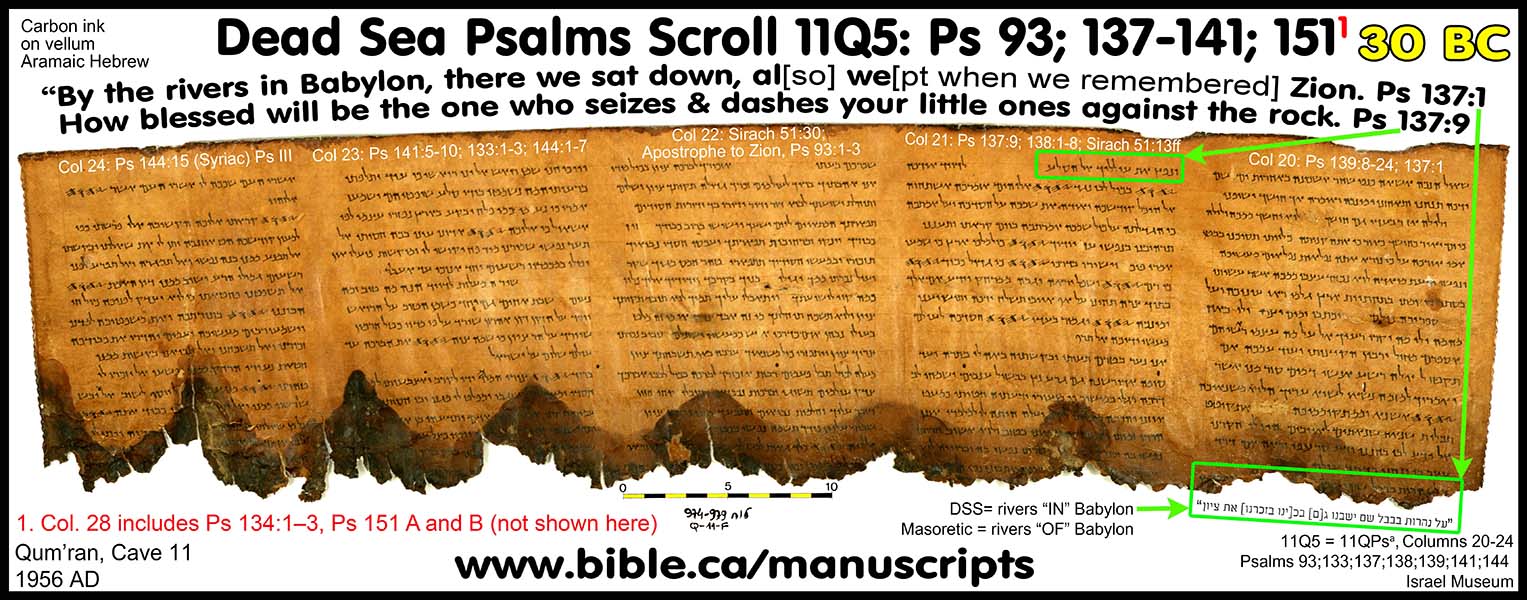
|
|
VIII. Chronological Outline of Zedekiah's diary of events: 599-586 BC:
HEBREW REGNAL NEW YEAR: Note about new years at the time of Zedekiah:
1. Hebrew new year began on Tishri which corresponds to September/October.
2. Babylonian new year began on Nisan which corresponds to March/April.
3. Today our new year begins on January 1.
- Chronological Bible reading during [Tishri] September 598-August 597 BC:
a. 597 BC: Jeremiah Chapters 7-20, 24
2. Messianic text: Jeremiah 7:11-14 = Matt 21:13; Mark 11:17; Luke 19:46
a. "“Has this house, which is called by My name, become a den of robbers in your sight? Behold, I, even I, have seen it,” declares the Lord. “But go now to My place which was in Shiloh, where I made My name dwell at the first, and see what I did to it because of the wickedness of My people Israel. “And now, because you have done all these things,” declares the Lord, “and I spoke to you, rising up early and speaking, but you did not hear, and I called you but you did not answer, therefore, I will do to the house which is called by My name, in which you trust, and to the place which I gave you and your fathers, as I did to Shiloh." (Jeremiah 7:11–14)
b. "And Jesus entered the temple and drove out all those who were buying and selling in the temple, and overturned the tables of the money changers and the seats of those who were selling doves. And He said to them, “It is written, ‘My house shall be called a house of prayer’; but you are making it a robbers’ den.”" (Matthew 21:12–13)
c. COMMENT: Jeremiah said Jerusalem will be destroyed like Shiloh and Jesus said he would destroy the Herodian temple quoting Jeremiah! Defiled temple: The idolatry referenced by Jeremiah corresponds to the robber’s den reference by Jesus. Then Titus accuses the Jews in AD 70 of temple robbing! Jeremiah’s said this at the beginning of the reign of Zedekiah and Jesus at the beginning of His ministry. Notice that on 5th June AD 70 (Tuesday) that the Abomination of Desolation was fulfilled in John of Gischala “the beasts” who desecrates the Jerusalem Temple: “But as for John, when he could no longer plunder the people, be betook himself to sacrilege, and melted down many of the sacred utensils, which had been given to the temple; as also many of those vessels which were necessary for such as ministered about holy things, the caldrons, the dishes, and the tables; nay, he did not abstain from those pouring-vessels that were sent them by Augustus and his wife; (563) for the Roman emperors did ever both honor and adorn this temple; whereas this man, who was a Jew, seized upon what were the donations of foreigners” (Josephus Wars 5:562-563) “there were none of the Roman soldiers who did not look with a sacred horror upon the holy house, and adored it, and wished that the robbers would repent before their miseries became incurable”(Josephus Wars 6:123).
d. Triple synchronism: between Jeremiah, Jesus, Josephus: Shiloh, Jerusalem 587 BC, AD 30 and AD 70 “robber’s den”.
3. Messianic text: Jeremiah 11:18–20:
a. Jeremiah was antitypical of Jesus Christ in an echo of Isa 53:
b. "Moreover, the Lord made it known to me and I knew it; Then You showed me their deeds. But I was like a gentle lamb led to the slaughter; And I did not know that they had devised plots against me, saying, “Let us destroy the tree with its fruit, And let us cut him off from the land of the living, That his name be remembered no more.” But, O Lord of hosts, who judges righteously, Who tries the feelings and the heart, Let me see Your vengeance on them, For to You have I committed my cause." (Jeremiah 11:18–20)
4. Notable quotables: 598/597 BC
a. Jerusalem tombs will be looted for valuables: Jeremiah 8:1-2
b. “Even the stork in the sky Knows her seasons; And the turtledove and the swift and the thrush Observe the time of their migration; But My people do not know The ordinance of the Lord." (Jeremiah 8:7)
c. "Thus says the LORD, “Let not a wise man boast of his wisdom, and let not the mighty man boast of his might, let not a rich man boast of his riches; but let him who boasts boast of this, that he understands and knows Me, that I am the LORD who exercises lovingkindness, justice and righteousness on earth; for I delight in these things,” declares the LORD." (Jeremiah 9:23–24)
d. "I know, O LORD, that a man’s way is not in himself, Nor is it in a man who walks to direct his steps. Correct me, O LORD, but with justice; Not with Your anger, or You will bring me to nothing." (Jeremiah 10:23–24)
e. "“For your gods are as many as your cities, O Judah; and as many as the streets of Jerusalem are the altars you have set up to the shameful thing, altars to burn incense to Baal. “Therefore do not pray for this people, nor lift up a cry or prayer for them; for I will not listen when they call to Me because of their disaster." (Jeremiah 11:13–14)
f. "Then the LORD said to me, “The prophets are prophesying falsehood in My name. I have neither sent them nor commanded them nor spoken to them; they are prophesying to you a false vision, divination, futility and the deception of their own minds." (Jeremiah 14:14)
g. "Then the LORD said to me, “Even though Moses and Samuel were to stand before Me, My heart would not be with this people; send them away from My presence and let them go! “And it shall be that when they say to you, ‘Where should we go?’ then you are to tell them, ‘Thus says the LORD: “Those destined for death, to death; And those destined for the sword, to the sword; And those destined for famine, to famine; And those destined for captivity, to captivity.” ’ “I will appoint over them four kinds of doom,” declares the LORD: “the sword to slay, the dogs to drag off, and the birds of the sky and the beasts of the earth to devour and destroy." (Jeremiah 15:1–3)
h. "“Then I will make you to this people A fortified wall of bronze; And though they fight against you, They will not prevail over you; For I am with you to save you And deliver you,” declares the LORD. “So I will deliver you from the hand of the wicked, And I will redeem you from the grasp of the violent.”" (Jeremiah 15:20–21)
i. "“The heart is more deceitful than all else And is desperately sick; Who can understand it? “I, the Lord, search the heart, I test the mind, Even to give to each man according to his ways, According to the results of his deeds." (Jeremiah 17:9–10)
j. "Then they said, “Come and let us devise plans against Jeremiah. Surely the law is not going to be lost to the priest, nor counsel to the sage, nor the divine word to the prophet! Come on and let us strike at him with our tongue, and let us give no heed to any of his words.” Do give heed to me, O LORD, And listen to what my opponents are saying! Should good be repaid with evil? For they have dug a pit for me. Remember how I stood before You To speak good on their behalf, So as to turn away Your wrath from them." (Jeremiah 18:18–20)
k. "O Lord, You have deceived me and I was deceived; You have overcome me and prevailed. I have become a laughingstock all day long; Everyone mocks me. For each time I speak, I cry aloud; I proclaim violence and destruction, Because for me the word of the Lord has resulted In reproach and derision all day long. But if I say, “I will not remember Him Or speak anymore in His name,” Then in my heart it becomes like a burning fire Shut up in my bones; And I am weary of holding it in, And I cannot endure it." (Jeremiah 20:7–9)
l.
|
Nov 598- Saturday 16 March 597 |
Nebuchadnezzar's 8th campaign against Jerusalem. 8th year of Nebuchadnezzar |
1. Babylonian Chronicles cuneiform tablet reverse, line 11'-13' (7th year of Nebuchadnezzar): Babylonian Chronicles cuneiform tablet reverse, line 11'-13' (7th year of Nebuchadnezzar): "In the seventh year [Year 8 using Jeremiah's non-accession reckoning], the month of Kislîmu [November], the king of Akkad mustered his troops, marched to the Hatti-land, [8th Campaign Nov 598 -Feb 597] and besieged the city of Judah [Jerusalem] and on the second day of the month of Addaru [16 March 597] he seized the city and captured the king [Jehoiakim and Jeconiah]. He appointed there a king of his own choice [Zedekiah], received its heavy tribute and sent to Babylon."
2. Dates:
a. 8th year of Nebuchadnezzar (Babylonian Regnal new year starts 6 months earlier in Nisan)
b. 12th year of Jehoiakim ends 9 Dec 698 BC (Using non-accession reckoning of Jeremiah)
c. 11th year of Jehoiakim ends 9 Dec 698 BC (Using accession reckoning of 2 Kings and Chronicles)
d. 1st year of Jeconiah end Saturday 16 March 597 BC (agrees with Babylonian Chronicles cuneiform tablet reverse, line 11'-13')
e. 1st year of Zedekiah beings 16 March 597 BC (non-accession reckoning of 2 Kings and Chronicles)
e. Year 9 of 70 year Babylonian Captivity that ends 536 BC
3. Nebuchadnezzar attacks on the Sabbath day: 16 March 597 BC (agrees with Babylonian Chronicles cuneiform tablet reverse, line 11'-13')
4. Jehoiakim is captured and deported to Babylon in bronze chains. The people appoint his son Jeconiah at age 8 with his mother (Queen mother, and wife to Jehoiakim). Zedekiah (Josiah's son) is appointed king of Judah by Nebuchadnezzar.
|
Saturday 9 Dec 598 |
Jehoiakim is captured and deported to Babylon in bronze chains. People appoint Jeconiah as king Ezekiel and 3023 Jews deported: Jer 52:28 2 Chro 36:6-8; 2 Ki 24:12; Jer 22:13-23 (Jer 22 spoken in 587 BC) |
- 2 Chro 36:6-8; 2 Ki 24:12; Jeremiah 22:13-23
- "Nebuchadnezzar king of Babylon came up against him and bound him with bronze chains to take him to Babylon. Nebuchadnezzar also brought some of the articles of the house of the Lord to Babylon and put them in his temple at Babylon. Now the rest of the acts of Jehoiakim and the abominations which he did, and what was found against him, behold, they are written in the Book of the Kings of Israel and Judah. And Jehoiachin his son became king in his place." (2 Chronicles 36:6-8)
- "Jehoiachin the king of Judah went out to the king of Babylon, he and his mother and his servants and his captains and his officials. So the king of Babylon took him captive in the eighth year of his reign." (2 Kings 24:12)
- Jeremiah's condemnation of Jehoiakim spoken to Zedekiah and recorded in 587 BC looking back in history: “Woe to him who builds his house without righteousness And his upper rooms without justice, Who uses his neighbor’s services without pay And does not give him his wages, Who says, ‘I will build myself a roomy house With spacious upper rooms, And cut out its windows, Paneling it with cedar and painting it bright red.’ “Do you become a king because you are competing in cedar? Did not your father eat and drink And do justice and righteousness? Then it was well with him. “He pled the cause of the afflicted and needy; Then it was well. Is not that what it means to know Me?” Declares the Lord. “But your eyes and your heart Are intent only upon your own dishonest gain, And on shedding innocent blood And on practicing oppression and extortion.” Therefore thus says the Lord in regard to Jehoiakim the son of Josiah, king of Judah, “They will not lament for him: ‘Alas, my brother!’ or, ‘Alas, sister!’ They will not lament for him: ‘Alas for the master!’ or, ‘Alas for his splendor!’ “He will be buried with a donkey’s burial, Dragged off and thrown out beyond the gates of Jerusalem. “Go up to Lebanon and cry out, And lift up your voice in Bashan; Cry out also from Abarim, For all your lovers have been crushed. “I spoke to you in your prosperity; But you said, ‘I will not listen!’ This has been your practice from your youth, That you have not obeyed My voice. “The wind will sweep away all your shepherds, And your lovers will go into captivity; Then you will surely be ashamed and humiliated Because of all your wickedness. “You who dwell in Lebanon, Nested in the cedars, How you will groan when pangs come upon you, Pain like a woman in childbirth!" (Jeremiah 22:13-23, spoken in 587 BC)
- Nebuzaradan, Nebuchadnezzar’s army commander, deports 3023 Jews to Babylon: 598 BC
- "These are the people whom Nebuchadnezzar carried away into exile: in the seventh year 3,023 Jews;" (Jeremiah 52:28)
- Those who had already obeyed God and surrendered were the cream of the spiritual crop.
- The deportees were the borderline righteous God allowed to live.
- The wicked were killed.
- The people appoint his son Jeconiah at age 8 with his mother (Queen mother, and wife to Jehoiakim) and reigns for 3 months.
|
Saturday, 16 March 597 |
Jeconiah and Ezekiel surrender, Zedekiah is appointed king Jeconiah: End of Davidic dynasty (Coniah/Jehoiachin) 2 Kings 24:10-16; 2 Chro 36:9-10; Jer 13:18-27; 22:24-30 (spoken in 587 BC); 24:1; Matthew 1:11-12 3023 Jews surrender and are deported by Nebuzaradan: Jer 52:29 Ezekiel (age 26) the prophet surrenders and is taken to Babylon. |
- Jeconiah was king for 3 months and 10 days ending on Saturday, 16 March 597
- Again, Nebuchadnezzar attacks and defeats Jerusalem on the Sabbath.
- Pompey attacked and defeated Jerusalem on the Sabbath (day of atonement) in 63 BC.
- Titus attacked and defeats Jerusalem on the Sabbath in AD 70.
- “But pray that your flight will not be in the winter, or on a Sabbath. “For then there will be a great tribulation, such as has not occurred since the beginning of the world until now, nor ever will." (Matthew 24:20-21)
3. Ezekiel a priest, age 30 surrenders with Jeconiah.
a. Ezekiel will begin his work in Ezek 1:1 on his 30th birthday: 31 July 593
b. Priests could not begin service until they turned 30 years old.
c. Ezekiel may have been in line to be high priest.
4. In obedience to God and Jeremiah, 8 year old Jeconiah and his mother (wife of the now deported Jehoiakim) walk out of Jerusalem and surrender to Nebuchadnezzar and are deported to Babylon.
a. Jeconiah is the only king to surrender in obedience to God.
b. Jeconiah is the only king to live a full life in Babylon after a period of jail.
c. Had Jeconiah not surrendered he would likely have died much earlier.
1. Four Sign Acts in 597 BC: See outline on 32 Sign Acts of the Bible
a. Sign Act in 597 BC (Jer 13:1-11) Jeremiah buys, wears and buries, by the River Perat (Euphrates?), a waist sash to illustrate the people’s initial closeness to God and their subsequent deterioration when it is destroyed when he retrieves it after time.
b. Sign Act in 597 BC (Jer 16:1-9) Jeremiah does not marry or attend funerals or feasts, representing the people’s future decimation, such that they would be devoid of family members and occasions of ritual mourning and festivity.
c.
Sign Act in 597 BC (Jer 19:1-13)
Jeremiah shatters an earthenware jar, demonstrating that God will shatter
Jerusalem.

5. Jeremiah and a Babylonian tablet both record that in 561 BC, Evil-merodack (Nebuchadnezzar's son) frees Jeconiah from prison and issues him food rations.
a. "Now it came about in the thirty-seventh year of the exile of Jehoiachin king of Judah, in the twelfth month, on the twenty-fifth of the month, that Evil-merodach king of Babylon, in the first year of his reign, showed favor to Jehoiachin king of Judah and brought him out of prison. Then he spoke kindly to him and set his throne above the thrones of the kings who were with him in Babylon. So Jehoiachin changed his prison clothes, and had his meals in the king’s presence regularly all the days of his life. For his allowance, a regular allowance was given him by the king of Babylon, a daily portion all the days of his life until the day of his death." (Jeremiah 52:31-34, 2 Kings 25:27-30)
b. Here is the Babylonian Cuneiform tablet that directly confirms the Bible story.
c.
What we read in the book, we find in
the ground!
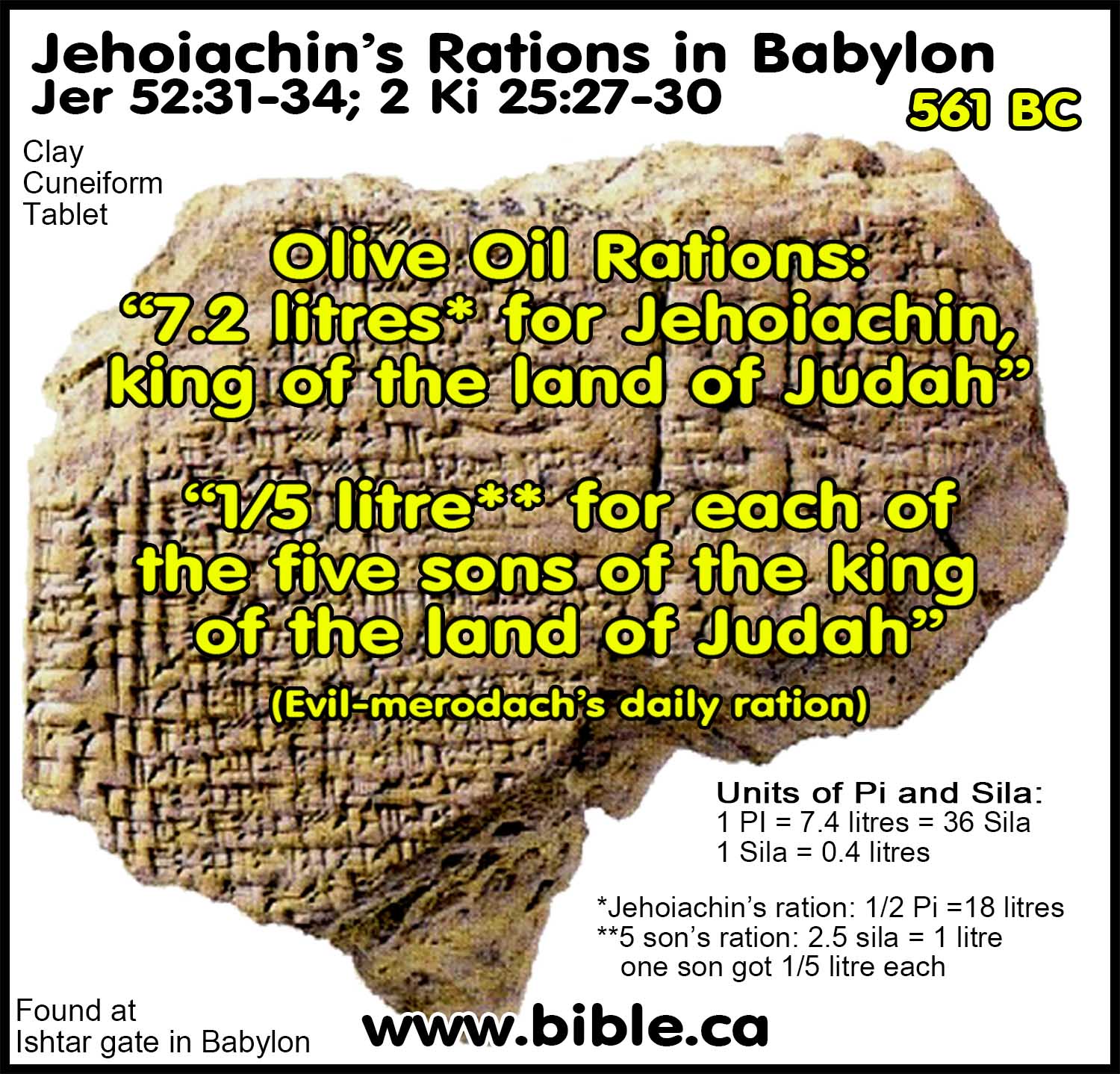
6. Nebuchadnezzar appoints Zedekiah as Israel's last vassal king who will reign for 10 years. (Jehoiakim also reigned for 10 years)
7. On Saturday March 16, 597 BC Nebuchadnezzar deposes Jeconiah
(Jehoiachin) after three months deports him to Babylon. Zedekiah, Josiah's son
and Jehoiakim's younger brother, becomes king at age 21. Jeconiah/Jehoiachin is
the end of the line of the Davidic dynasty. FULL
OUTLINE
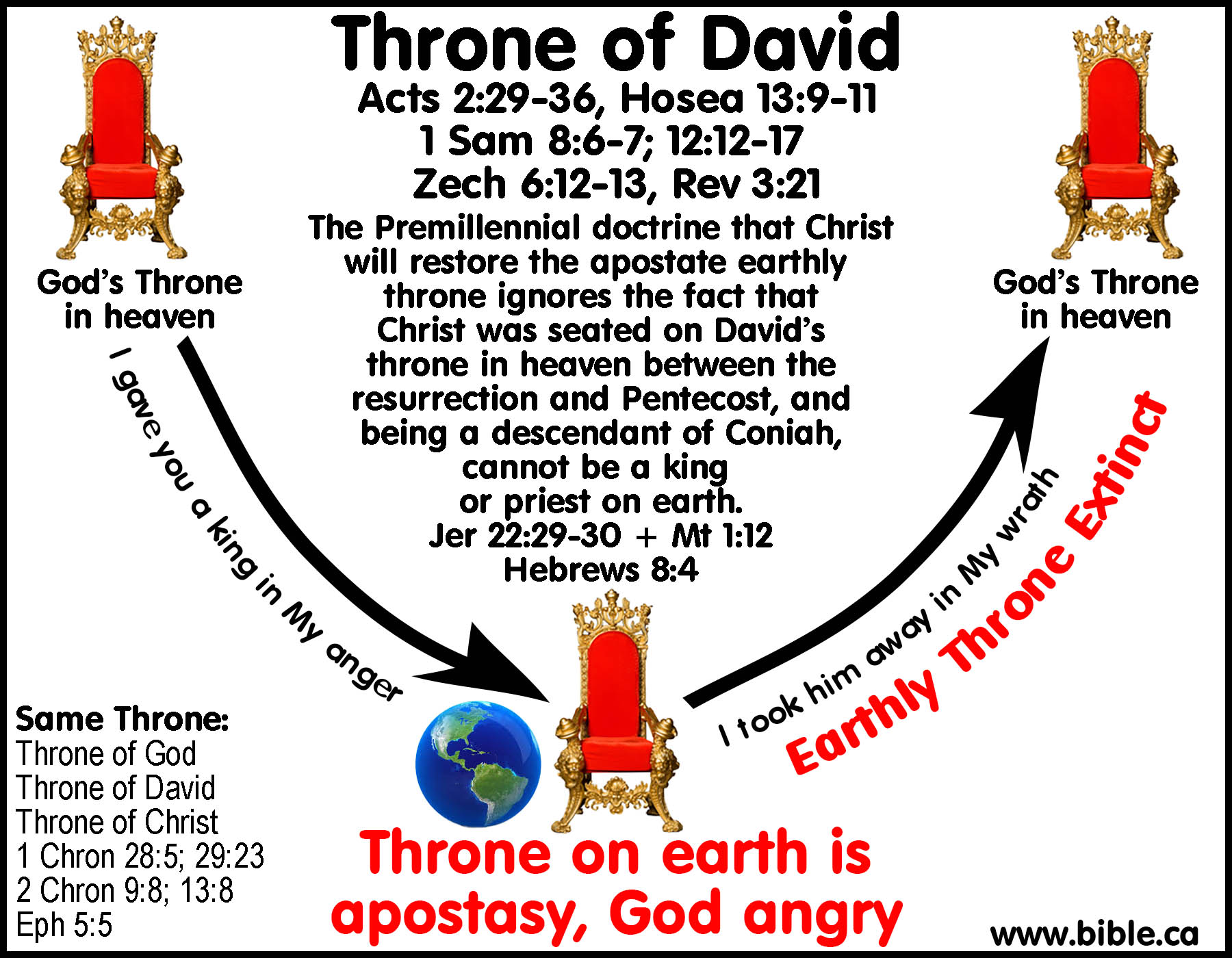
a. Most notable is the proclamation that no descendant of Jeconiah will ever rule as king in Judea ever again in Jer 22:24-30. This alone utterly refutes dispensational/premillennial theology which wrongly teaches that Jesus Christ will rule as king in Jerusalem for 1000 years at some future time. The problem is that Jesus is a direct descendant of Jeconiah: Mt 1:11-12 which means Jesus can never be kin on earth ever again. Of course Jesus was appointed king of the church/kingdom at the ascension and founded His new spiritual kingdom on the day of Pentecost.
- Spoken in 587 BC of Jeconiah: “As I live,” declares the Lord, “even though Coniah the son of Jehoiakim king of Judah were a signet ring on My right hand, yet I would pull you off; and I will give you over into the hand of those who are seeking your life, yes, into the hand of those whom you dread, even into the hand of Nebuchadnezzar king of Babylon and into the hand of the Chaldeans. “I will hurl you (Jeconiah) and your mother (wife of Jehoiakim) who bore you into another country where you were not born, and there you will die. “But as for the land to which they desire to return, they will not return to it. “Is this man Coniah a despised, shattered jar? Or is he an undesirable vessel? Why have he and his descendants been hurled out And cast into a land that they had not known? “O land, land, land, Hear the word of the Lord! “Thus says the Lord, ‘Write this man down childless, A man who will not prosper in his days; For no man of his descendants will prosper Sitting on the throne of David Or ruling again in Judah.’ ”" (Jeremiah 22:24-30)
- View FULL OUTLINE on how Jesus was seated on the throne of David in heaven on the day of Pentecost.
8. According to the Babylonian Chronicle cuneiform tablet, Jerusalem finally fell on 2 Adar (Saturday 16 March) 597 BC which was Nebuchadnezzar’s seventh year (8th using Jeremiah's non-accession counting). He takes some of the vessels from Solomon's temple and puts them into his pagan temple in Babylon. Jehoiakim is deposed to Babylon in bronze chains. Jehoiakim's 8 year old son Jehoiachin (Jeconiah) becomes king.
9. Pedaiah son of the king: Detailed outline
|
March 597 BC |
Babylon repels Egypt from Judea Jer 47:1; 2 Kings 24:7 |
1. Neco II loses control of Gaza which he conquered in 604. (see Jer 47:1).
2. "The king of Egypt did not come out of his land again, for the king of Babylon had taken all that belonged to the king of Egypt from the brook of Egypt to the river Euphrates." (2 Kings 24:7)
3. Whereas Nico II had been sent on a divine mission by God himself to defeat Nebuchadnezzar in 609 BC in the Battle at Carchemish, now he was forever in a position of submission to Nebuchadnezzar, God's new servant.
|
597 BC |
Jeremiah's Great oration: Jeremiah chapters 7-20, 24 Arad Ostraca #40, #24 |
1. Jeremiah chapters 7-20, 24 is spoken shortly after Zedekiah becomes king
2. Three times God told Jeremiah NOT to pray to him about Judah:
a. 597 BC: STOP PRAYING! "“As for you, do not pray for this people, and do not lift up cry or prayer for them, and do not intercede with Me; for I do not hear you. “Do you not see what they are doing in the cities of Judah and in the streets of Jerusalem? “The children gather wood, and the fathers kindle the fire, and the women knead dough to make cakes for the queen of heaven; and they pour out drink offerings to other gods in order to spite Me." (Jeremiah 7:16-18, 597 BC)
b. 597 BC: STOP PRAYING!"For your gods are as many as your cities, O Judah; and as many as the streets of Jerusalem are the altars you have set up to the shameful thing, altars to burn incense to Baal. “Therefore do not pray for this people, nor lift up a cry or prayer for them; for I will not listen when they call to Me because of their disaster." (Jeremiah 11:13-14, 597 BC)
c. 597 BC: STOP PRAYING!"So the Lord said to me, “Do not pray for the welfare of this people. “When they fast, I am not going to listen to their cry; and when they offer burnt offering and grain offering, I am not going to accept them. Rather I am going to make an end of them by the sword, famine and pestilence.”" (Jeremiah 14:11-12, 597 BC)
3.
The Edomite threat and a collection of ostraca from the
Biblical city of Arad were found that date to 597 BC:
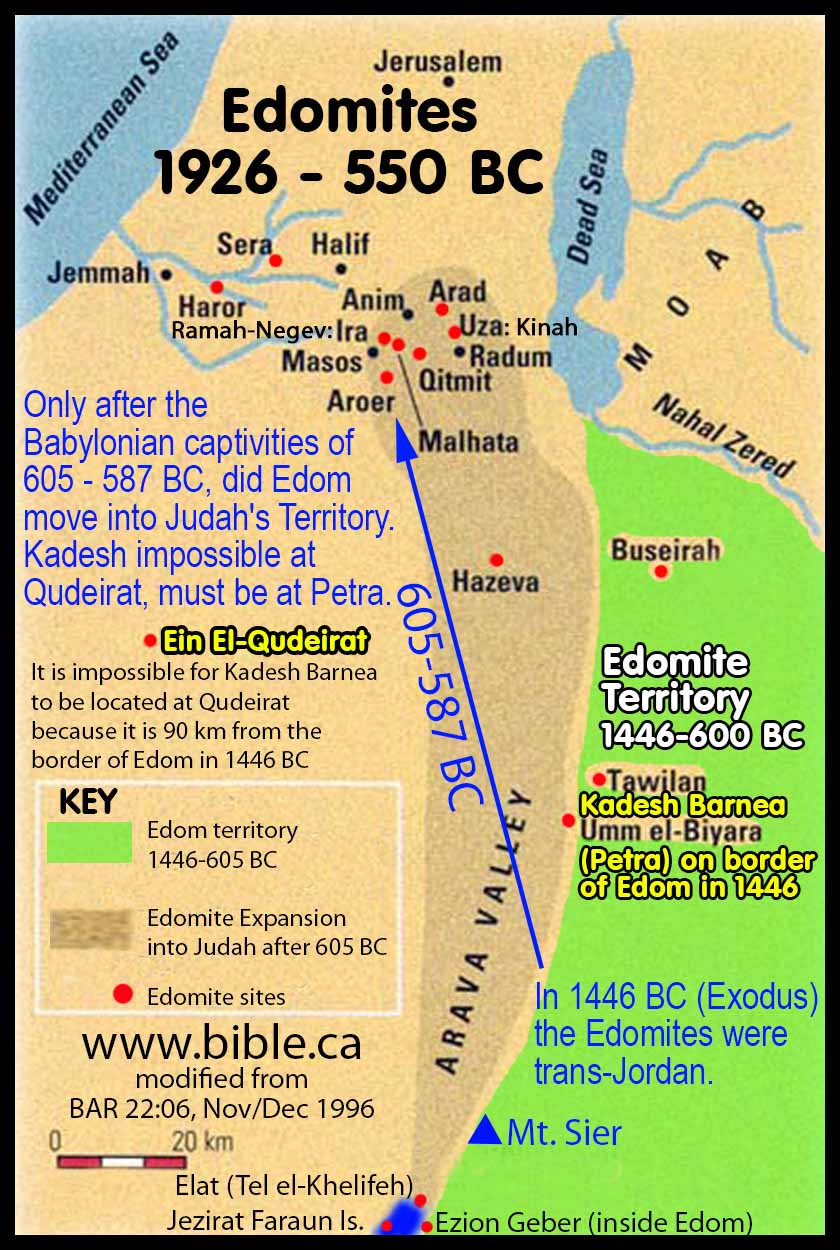
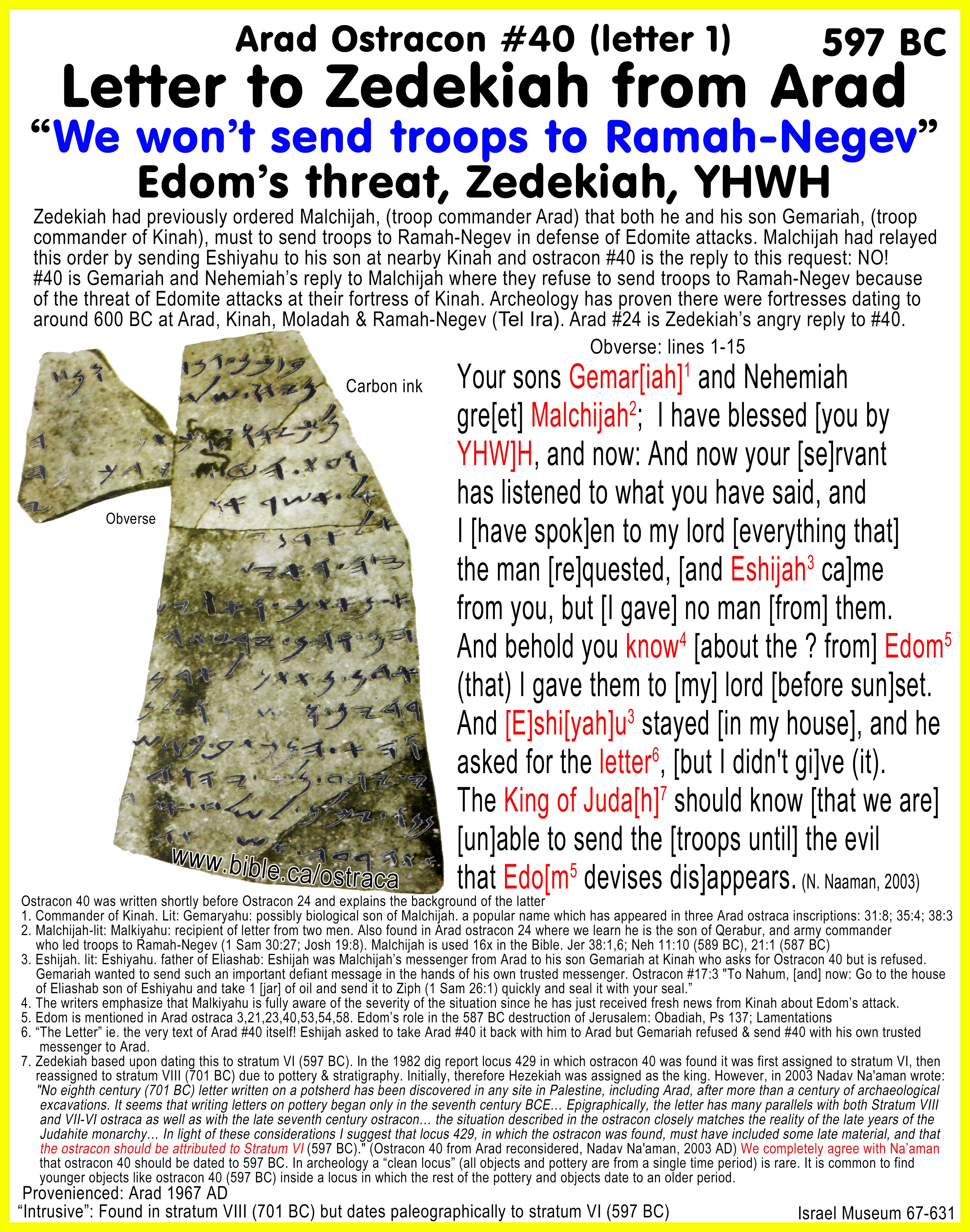
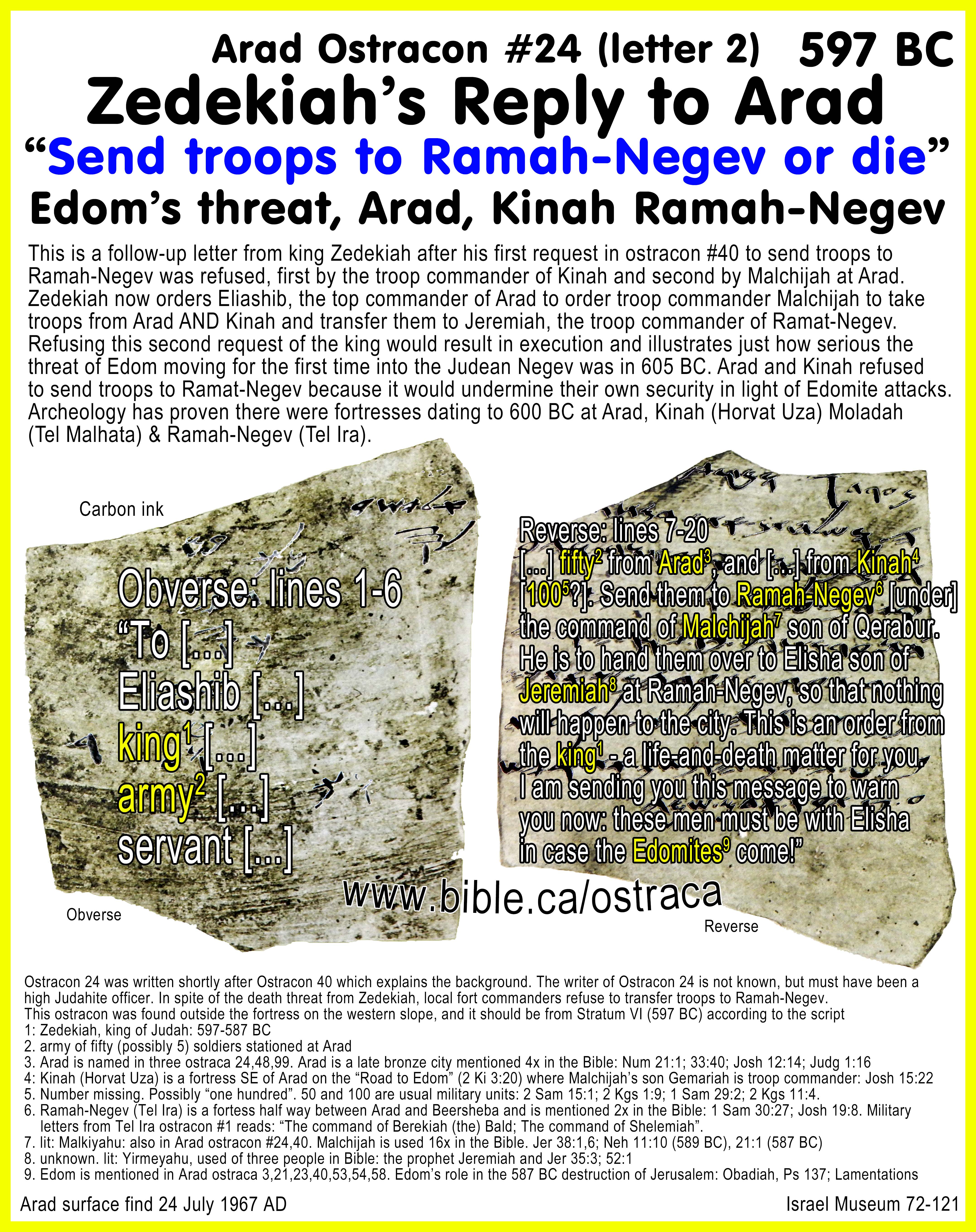
a. In 605 BC, Nebuchadnezzar attacked Judea and this is the beginning, for the first time in history, the encroachment of Edom from their Transjordan lands into the Judean Negev. Edom's traditional territory was Transjordan in modern Jordan from the time of the exodus down to 605 BC.
b. Two ostraca in particular tell an amazing story of how Edom had begun attacking the land of Judah: Arad Ostracon #40, Arad Ostracon #24
c. "At age 30, Esau moves from Judah to Seir, conquers the Horites in 1926 BC and begins to occupy their historic Transjordan territory east of the Arabah valley in the highlands of modern Jordan. During the time of the Exodus 1446 BC, Edom's territory ran beside Kadesh Barnea at Nabatean Petra from the gulf of Aqaba north to the Wadi Zered at the south end of the Salt Sea. After continuously occupying their historic Transjordan lands for 1321 years, they began to move west into the Judean Negev, for the first time, after Nebuchadnezzar's first attack on Jerusalem in 605 BC. By 597 BC the Edomite Threat became very serious when one of the four Negev Judean fortresses, Ramah-Negev, was about to be captured by the Edomites. Zedekiah issues orders to Malchijah, the troop commander at the Arad fortress, to send troops from Arad and the nearby Kinah fortress, to the fortress at Ramah-Negev to secure its safety and defense. Malchijah relays the Zedekiah's orders by sending Eshijah from Arad to his son Gemariah, the commander of the nearby fortress at Kinah. Arad Ostracon #40 (Arad Ostracon #40 Letter to Zedekiah: "We won't send troops" 597 BC) is a letter written on a broken pottery sherd from Gemariah to his father Malchijah at Arad that records the message that defies both his father Malchijah and King Zedekiah: "No, we will not send any of our troops to Ramah-Negev as directed by the king." The reason was because moving the troops out of Kinah to nearby Ramah-Negev would seriously endanger the security of Kinah itself against the Edomites! There were simply not enough troops to secure both Kinah AND Ramah-Negev. Eshijah, who had been sent by Malchijah from Arad to Kinah with the order to supply troops, asks for the very letter written on Arad ostraca #24 (Arad Ostracon #24 Letter from Zedekiah: "Send troops or be executed" 597 BC) but Gemariah refuses to give it to him and sends Ostracon #24 back to Arad with one of his own trusted men (unknown identity). When Malchijah got this message (Arad Ostracon #24 Letter from Zedekiah: "Send troops or be executed" 597 BC) from his son from Kinah, he apparently agreed with the danger Kinah would face if Zedekiah's order to move troops was obeyed. Malchijah wrote king Zedekiah informing him that neither Kinah or Arad would be sending troops to Ramah-Negev. Malchijah's defiant reply angered Zedekiah. King Zedekiah recorded his threatening response in a follow-up letter on another pottery sherd to Eliashib, the kings executive agent at the Arad fortress on Arad ostraca #24 (Arad Ostracon #24 Letter from Zedekiah: "Send troops or be executed" 597 BC). Zedekiah's follow-up letter to Eliashib on Arad ostraca #24 was simple: Send 50 soldiers from Arad and 100 from Kinah under the command of Malchijah from Arad, and deliver them to the command of Elisha, commander of the Ramah-Negev fortress that is under Edomite attack. In the end, we know from archeology, that all four fortresses were lost to the Edomites by the time Nebuchadnezzar makes his third and final attack on Jerusalem in 587 BC when Solomon's temple is destroyed. The Edomites even assisted in destroying the city and looted even the Temple itself. During the final 587 BC Babylonian attack on Judah many Jews fled for their lives and were captured and killed by the Edomites at the crossroads near the Arad, Kinah, Ramah Negev and Moladah fortresses. "To Edom: Do not stand at the fork of the road, to cut down their fugitives; And do not imprison their survivors In the day of their distress." (Obadiah 10-14) Edom was condemned by God for its role in the destruction of Judah, Jerusalem and Solomon's temple in 587 BC and became an extinct nation by the time Judah returned from captivity in 536 BC. “To Edom: Like the overthrow of Sodom and Gomorrah with its neighbors,” says the Lord, “no one will live there, nor will a son of man reside in it." (Jeremiah 49:16-18)" (Steve Rudd, 2015 AD)
- Chronological Bible reading during [Tishri] September 598-August 597 BC:
- none
|
Dec 597 - Feb 596 |
Nebuchadnezzar's 9th campaign: Carchemish 9th year of Nebuchadnezzar |
- Babylonian Chronicles cuneiform tablet reverse, line 14'-15' (8th year of Nebuchadnezzar): "In the eight year [Year 9 using Jeremiah's non-accession reckoning], the month of Tebetu [Dec/January] the king of Akkad marched [9th Campaign Dec 597 -Feb 596] to the Hatti-land as far as Karchemiš [....] in the month of Šabatu [Jan/Feb] the king returned to his own land."
- 9th year of Nebuchadnezzar; 2nd year of Zedekiah; 10th year of captivity
- Chronological Bible reading during [Tishri] September 596-August 595 BC:
- Daniel 3:2: Spring 595 BC: 90 foot Statue completed: Nebuchadnezzar sends a message to all vassal heads of state, including Zedekiah, to attend the formal dedication service of the 90 foot statue.
|
Nov 596 - Feb 595 |
Nebuchadnezzar's 10th campaign along Tigris river against the king of Aram 10th year of Nebuchadnezzar |
- Babylonian Chronicles cuneiform tablet reverse, line 16'-20' (9th year of Nebuchadnezzar): "In the ninth year [Year 10 using Jeremiah's non-accession reckoning], the month of [...] the king of Akkad and his troops marched [10th Campaign Nov 596 -Feb 595] along the bank of the Tigris [...] the king of Elam [...] the king of Akkad [...] which is on the bank of the Tigris he pitched his camp. While there was still a distance of one day's march between them, the king of Elam was afraid and, panic falling on him, he returned to his own land."
- 10th year of Nebuchadnezzar; 3nd year of Zedekiah; 11th year of captivity
- Chronological Bible reading during [Tishri] September 595-August 594 BC:
- Jeremiah chapters 27-31; 51:59-64
- There are 7 years between Dan 3:1 and Dan 3:2
- In the previous year (Spring 595 BC) Daniel 3:2 records that the 90 foot Statue completed and Nebuchadnezzar sends a message to all vassal heads of state, including Zedekiah, to attend the formal dedication service of the 90 foot statue.
- Oct 595 BC: Zedekiah leaves for Babylon with Seraiah to attend dedication ceremony of 90 foot statue. Jeremiah 51:59-64
- Spring 594 BC: Daniel 3:8-30 All vassal heads of state, including Zedekiah, attend 90 foot statue dedication. Zedekiah, as head of state, was in prime location close to the front and he did bow down it it or else he would have been killed on the spot. Shadrach, Meshach, Abed-nego refuse to bow down and are thrown into the furnace of fire. God brings all heads of state, including Zedekiah to the furnace of fire to witness the miracle of God in saving Shadrach, Meshach, Abed-nego from death. Zedekiah, who had bowed to the statue from the front row of the dedication ceremony, is humiliated when he is rebuked by the pagan Nebuchadnezzar to worship YHWH as Shadrach, Meshach and Abed-nego stand nearby.
- Messianic prophecies:
a. Note: Israel never had another king until Jesus Christ but functioned as vassal governments under governerships till AD 66. "‘It shall come about on that day,’ declares the Lord of hosts, ‘that I will break his yoke from off their neck and will tear off their bonds; and strangers will no longer make them their slaves. ‘But they shall serve the Lord their God and David their king, whom I will raise up for them." (Jeremiah 30:8–9)
b. Note: This echoes Deut 18:18: "“Thus says the Lord, ‘Behold, I will restore the fortunes of the tents of Jacob And have compassion on his dwelling places; And the city will be rebuilt on its ruin, And the palace will stand on its rightful place. ‘From them will proceed thanksgiving And the voice of those who celebrate; And I will multiply them and they will not be diminished; I will also honor them and they will not be insignificant. ‘Their children also will be as formerly, And their congregation shall be established before Me; And I will punish all their oppressors. ‘Their leader shall be one of them, And their ruler shall come forth from their midst; And I will bring him near and he shall approach Me; For who would dare to risk his life to approach Me?’ declares the Lord. ‘You shall be My people, And I will be your God.’ ” Behold, the tempest of the Lord! Wrath has gone forth, A sweeping tempest; It will burst on the head of the wicked. The fierce anger of the Lord will not turn back Until He has performed and until He has accomplished The intent of His heart; In the latter days you will understand this." (Jeremiah 30:18–24)
c. Note: see discussion below in 587 BC: "Thus says the Lord, “A voice is heard in Ramah, Lamentation and bitter weeping. Rachel is weeping for her children; She refuses to be comforted for her children, Because they are no more.”" (Jeremiah 31:15)
- Notable quotables: 595/594 BC
- "“But the nation which will bring its neck under the yoke of the king of Babylon and serve him, I will let remain on its land,” declares the LORD, “and they will till it and dwell in it.” ’ ” I spoke words like all these to Zedekiah king of Judah, saying, “Bring your necks under the yoke of the king of Babylon and serve him and his people, and live! “Why will you die, you and your people, by the sword, famine and pestilence, as the LORD has spoken to that nation which will not serve the king of Babylon?" (Jeremiah 27:11–13)
b. "“For thus says the Lord of hosts concerning the pillars, concerning the sea, concerning the stands and concerning the rest of the vessels that are left in this city, which Nebuchadnezzar king of Babylon did not take when he carried into exile Jeconiah the son of Jehoiakim, king of Judah, from Jerusalem to Babylon, and all the nobles of Judah and Jerusalem. “Yes, thus says the Lord of hosts, the God of Israel, concerning the vessels that are left in the house of the Lord and in the house of the king of Judah and in Jerusalem, ‘They will be carried to Babylon and they will be there until the day I visit them,’ declares the Lord. ‘Then I will bring them back and restore them to this place.’ ”" (Jeremiah 27:19–22)
- "and the prophet Jeremiah said, “Amen! May the LORD do so; may the LORD confirm your words which you have prophesied to bring back the vessels of the LORD’S house and all the exiles, from Babylon to this place." (Jeremiah 28:6)
- "“Thus says the LORD of hosts, the God of Israel, to all the exiles whom I have sent into exile from Jerusalem to Babylon, ‘Build houses and live in them; and plant gardens and eat their produce. ‘Take wives and become the fathers of sons and daughters, and take wives for your sons and give your daughters to husbands, that they may bear sons and daughters; and multiply there and do not decrease. ‘Seek the welfare of the city where I have sent you into exile, and pray to the LORD on its behalf; for in its welfare you will have welfare.’" (Jeremiah 29:4–7)
e. Note: Like the prodigal son, Ephraim and Dan were responsible for the downfall of Israel through Idolatry. However the grace of God expired and neither are listed in the tribes of Revelation 7:4-8. Ephraim became the Samaritans and Jesus showed grace in John 4 and the woman at the well. So Salvation came to Ephraim through Christ. "“Is Ephraim My dear son? Is he a delightful child? Indeed, as often as I have spoken against him, I certainly still remember him; Therefore My heart yearns for him; I will surely have mercy on him,” declares the Lord." (Jeremiah 31:20)
- Note: This was fulfilled when Christ nailed the law of Moses including the 10 commandments to the cross: Col 2:14-17. Heb 8:6-13: "“Behold, days are coming,” declares the LORD, “when I will make a new covenant with the house of Israel and with the house of Judah," (Jeremiah 31:31)
- FOUR Letters: 595t-Aug 594 BC was “The Year of the Letters” written between Jeremiah in Jerusalem and the exiles in Babylon in the Jewish city of Al-Yahudah.
- See also the Arad Ostraca correspondence above where Zedekiah writes letters on pottery sherds to the fortress at Arad.
- Letter 1: Jeremiah
chapters 50-51 in October 595 BC:
Jeremiah writes a scroll, two chapters long, in condemnation of Babylon
for destroying Jerusalem. Jeremiah sent the scroll with Seraiah
the son of Neriah (whose Bulla we have discovered: Details)
to Babylon along with Zedekiah when he was ordered by Nebuchadnezzar to
attend the statue dedication referenced in Daniel 3:2. The two chapter
diatribe against Babylon was read beside the Euphrates river then thrown
into the water.
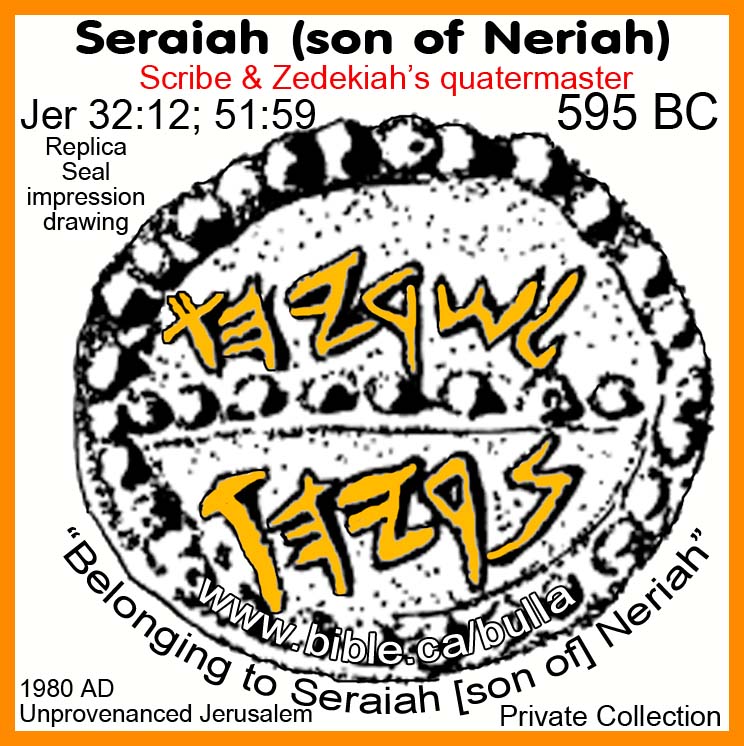
- Letter 2: Jer 29:1-23 in August 594 BC: Jeremiah writes a letter to exiles and says that Ahab the son of Kolaiah and concerning Zedekiah the son of Maaseiah will be thrown into the furnace of fire for adultery and false prophecy.
- Letter 3: Jer 29:24-28 in August 594 BC: Shemaiah the Nehelamite sends a letter from Al-Yahudah to Jerusalem that Jeremiah should be imprisoned: Later Jeremiah would indeed be imprisoned!
- Letter 4: Jer 29:29-32 September 594 BC: Jeremiah responds to Shemaiah (Letter 2) and writes to exiles that he will die.
|
595 BC |
Pharaoh Nico II dies and Psammetichus II (Psamtik II) becomes Pharaoh (595-589 BC) 4th year of Zedekiah; 11th year of Nebuchadnezzar |
1. We know this from sources outside the Bible.
2. See Pharaohs of the Babylonian captivity.
|
Oct 595 |
Zedekiah and Seraiah begin travel to Babylon for the dedication ceremony of the 90 foot statue of Nebuchadnezzar 4th year of Zedekiah; 11th year of Nebuchadnezzar Dan 3:2; Jeremiah 51:59-64 |
- Dan 3:2 records the command of Nebuchadnezzar that went out to the world to come to the idol dedication service in Dura province of Babylon.
- There are 7 years between Dan 3:1 and Dan 3:2
- "Nebuchadnezzar the king made an image of gold, the height of which was sixty cubits and its width six cubits; he set it up on the plain of Dura in the province of Babylon. Then Nebuchadnezzar the king sent word to assemble the satraps, the prefects and the governors, the counselors, the treasurers, the judges, the magistrates and all the rulers of the provinces to come to the dedication of the image that Nebuchadnezzar the king had set up." (Daniel 3:1-2)
2. In October 595 BC Zedekiah and Seraiah his quartermaster, leave Jerusalem to make the trip to Babylon for the dedication of the golden image of Nebuchadnezzar in the plain of Dura outside of Babylon.
3. Jeremiah had given Seraiah a scroll to drop in the Euphrates river that condemns Babylon.
a. This ceremony recorded in Jer 51:59-64 has Zedekiah and Seraiah travelling together.
- "The message which Jeremiah the prophet commanded Seraiah the son of Neriah, the grandson of Mahseiah, when he went with Zedekiah the king of Judah to Babylon in the fourth year of his reign. (Now Seraiah was quartermaster.) So Jeremiah wrote in a single scroll all the calamity which would come upon Babylon, that is, all these words which have been written concerning Babylon. Then Jeremiah said to Seraiah, “As soon as you come to Babylon, then see that you read all these words aloud, and say, ‘You, O Lord, have promised concerning this place to cut it off, so that there will be nothing dwelling in it, whether man or beast, but it will be a perpetual desolation.’ “And as soon as you finish reading this scroll, you will tie a stone to it and throw it into the middle of the Euphrates, and say, ‘Just so shall Babylon sink down and not rise again because of the calamity that I am going to bring upon her; and they will become exhausted.’ ” Thus far are the words of Jeremiah." (Jeremiah 51:59-64)
a. Notice the rebellion and insurrection that breaks out in Babylon at the same time of Jeremiah's condemnation of Babylon in the scroll.
b. This may have given Zedekiah a mixed message from Jeremiah who had ordered Zedekiah to submit to Nebuchadnezzar.
c. After Zedekiah returns home from the dedication ceremony, he rebels against Nebuchadnezzar in the summer of 595 BC.
d. The phrase, Thus far are the words of Jeremiah." (Jeremiah 51:64) refer to Jeremiah's words ON THE SCROLL, not a non-inspired addition by someone long after Jeremiah was dead who also added all of Jeremiah chapter 52 as well. (or so goes the Bible trasher's theory) The fact that Jeremiah 52:31-34 is synoptic with 2 Kings 25:27-30, proves Jeremiah wrote first and second Kings AND Jeremiah in 561 BC.
4. Seraiah son of Neriah was part of the scribal family and was the brother to Baruch, Jeremiah's scribe who wrote the scroll that Jehoiakim burned in 605 BC.
a.
Seal of Seraiah son of Neriah: Outline
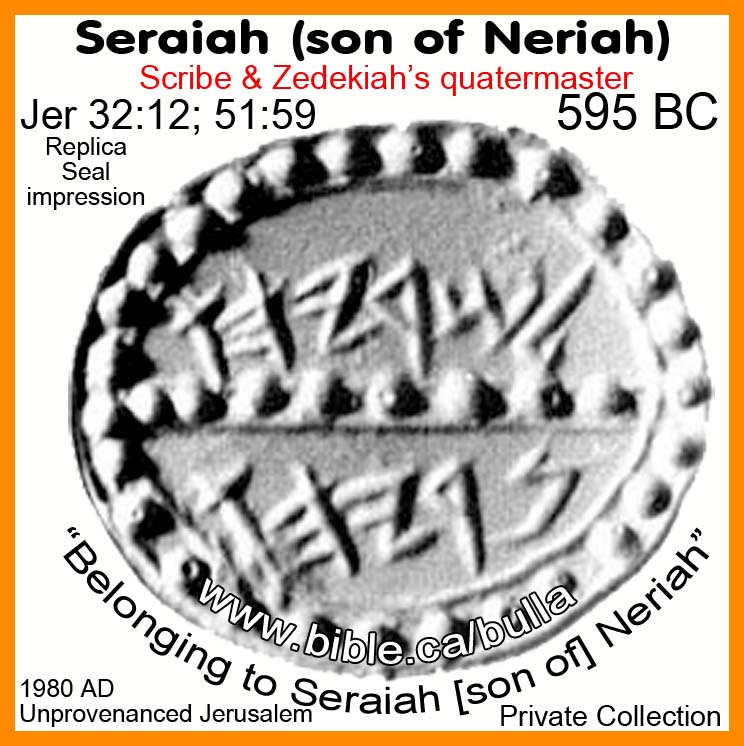
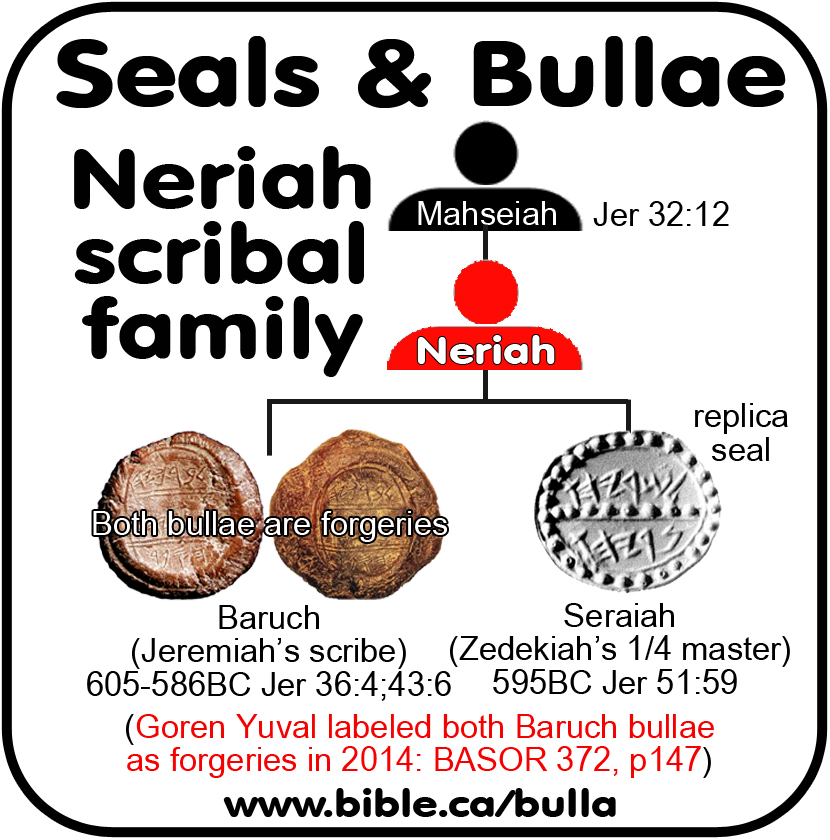
|
Nov 595 - Jan 594 |
Rebellion and insurrection squashed in Babylon 11th year of Nebuchadnezzar |
- Babylonian Chronicles cuneiform tablet reverse, line 21'-22' (10th year of Nebuchadnezzar) : "In the tenth year [Year 11 using Jeremiah's non-accession reckoning] the king of Akkad was in his own land; from the month of Kislîmu [Nov/Dec] to the month of Tebetu [Dec/Jan] there was rebellion in Akkad [Babylon]. [Rebellion: Nov 595 -Jan 594] With arms he slew many of his own army. His own hand captured his enemy.
- 11th year of Nebuchadnezzar; 4nd year of Zedekiah; 12th year of captivity
- What caused this rebellion is uncertain:
- In 979 BC David's experienced rebellion at the hands of Absalom when he was over-occupied with building the Temple while neglecting the day to day needs of his people. Preachers can lose their family if they neglect their families to build the church. Perhaps Nebuchadnezzar was obsessively occupied in building his 90 foot statue FOR HIMSELF while common people were ignored in their needs.
- Perhaps the rebellion was a "warning shot over the bow" that Nebuchadnezzar was building the pagan idol statue at all.
- The scroll of Jeremiah that Seraiah read in the presence of Zedekiah at the Euphrates river may have contributed to the rebellion of Zedekiah. (Jeremiah 51:59-64)
|
Jan 594 - March 594 |
Nebuchadnezzar's 11th campaign 11th year of Nebuchadnezzar |
- With the civil war or coup under control he immediately launches his 11th campaign!
- Babylonian Chronicles cuneiform tablet reverse, line 23'-24' (10th year of Nebuchadnezzar): "In the month of [...] he marched [11th Campaign Jan-March 594] to the Hatti-land, where kings and [...]-officials came before him and he received their heavy tribute and then returned to Babylon."
- 11th year of Nebuchadnezzar; 4th year of Zedekiah; 12th year of captivity
- As soon as Nebuchadnezzar returns from his 11th campaign, he has his dedication ceremony
|
April 594 |
The dedication ceremony of the 90 foot statue of Nebuchadnezzar. 4th year of Zedekiah; 11th year of Nebuchadnezzar Dan 3 |
1. There are 7 years between Dan 3:1 and Dan 3:2
2. In spring of 594 BC, Nebuchadnezzar dedicates his golden image ceremony and everyone must bow down when the musical instruments start playing.
a. Zedekiah would have been in the front row with the other heads of state under Nebuchadnezzar's control.
b. Zedekiah bows down from the "front row", a few feet from the 90 foot statue. Heads of state would surely be close to the "front" of the ceremony.
c. We can be certain that Zedekiah bowed down to worship the statue because of the rage Nebuchadnezzar displayed when Shadrach, Meshach, Abed-nego refuse to bow down!
3. Meanwhile, some distance away in the local town, Shadrach, Meshach, Abed-nego refuse to bow down which triggers Nebuchadnezzar’s rage.
a. After the dedication ceremony, Nebuchadnezzar learns that Shadrach, Meshach, Abed-nego refuse to bow and travels into town in a fit of rage.
b. Shadrach, Meshach, Abed-nego are thrown into the “lake of fire”.
c. Nebuchadnezzar saw the angel who saved Shadrach, Meshach, Abed-nego from death in the furnace he knew that YHWH was the true God.
4. Nebuchadnezzar is stunned that Shadrach, Meshach, Abed-nego survived the fire and calls for all the same heads of state who were just in attendance at the statue dedication service.
a. "The satraps, the prefects, the governors [Zedekiah would certainly be there] and the king’s high officials gathered around and saw in regard to these men that the fire had no effect on the bodies of these men nor was the hair of their head singed, nor were their trousers damaged, nor had the smell of fire even come upon them." (Daniel 3:27)
b. It is important to note, that Nebuchadnezzar brought Zedekiah, along with the other world leaders, to witness first-hand the miracle and meet in person, the Hebrews, Shadrach, Meshach, Abed-nego.
c. Zedekiah, the king of the Hebrews who just bowed to the idol statue now stands beside the furnace and looks face to face at his fellow Hebrews, Shadrach, Meshach, Abed-nego.
d. Zedekiah likely shook the hands or hugged or kissed Shadrach, Meshach, Abed-nego after God saved them.
e. Nebuchadnezzar proclaimed faith in YHWH to Zedekiah and the other world leaders who just bowed down to the idol statue a few hours earlier: "Nebuchadnezzar responded and said, “Blessed be the God of Shadrach, Meshach and Abed-nego, who has sent His angel and delivered His servants who put their trust in Him, violating the king’s command, and yielded up their bodies so as not to serve or worship any god except their own God. “Therefore I make a decree that any people, nation or tongue that speaks anything offensive against the God of Shadrach, Meshach and Abed-nego shall be torn limb from limb and their houses reduced to a rubbish heap, inasmuch as there is no other god who is able to deliver in this way.”" (Daniel 3:28-29)
f. It must have been humiliating for Zedekiah to be rebuked by a pagan king to worship the very God whose throne he sat upon in Jerusalem.
5. Zedekiah vs. Nebuchadnezzar:
a. Both Zedekiah and Nebuchadnezzar were pagan idol worshippers.
b. Zedekiah sat on the throne of YHWH: "Then Solomon sat on the throne of the Lord as king instead of David his father; and he prospered, and all Israel obeyed him." (1 Chronicles 29:23)
c. It is very sad that Zedekiah who sat on the very throne of Yaweh DID NOT BELIEVE IN YAWEH.
d. It is shocking that the king of Israel who bowed down to Nebuchadnezzar's golden pagan god image had to learn from a pagan king that you should not worship idols but God (YHWH) alone!
e. Nebuchadnezzar's rebuke to Zedekiah, the king of the land of YHWH, in the presence of three Hebrews who had surrendered as Jeremiah commanded in 905 BC, must have been a stinging and humiliating experience.
|
June - Aug 594 |
Zedekiah returns home from dedication ceremony and rebels against Nebuchadnezzar. |
1. Zedekiah rebelled against Nebuchadnezzar in July/August of 594 BC for these five reasons:
a. Jeremiah's scroll that Seraiah threw into the Euphrates condemning Babylon: Jeremiah 51:59-64
b. The insurrection he witnessed first-hand in Babylon when he arrived which Nebuchadnezzar squashed. (cf. Babylonian Chronicles cuneiform tablet reverse, line 21'-22', 10th year of Nebuchadnezzar)
c. The miracle of Shadrach, Meshach, Abed-nego under the protection of YHWH probably impressed Zedekiah to think God would protect him. (Dan 3)
d. The rebuke of Nebuchadnezzar for not trusting YHWH. In his mind, rebelling might have been seen as obedience to YHWH, in spite of the fact he was ordered to surrender many times. (Dan 3)
e. The Sign Act in Av 594 BC (summer) (Jer 27/28) where Jeremiah is uses a yolk to inform Zedekiah he will be a slave to Nebuchadnezzar but the false prophet Hananiah smashes the yolk in front of Jeremiah and the king as a sign Zedekiah will “break the yolk” of Babylon.
2. In July 594 BC Zedekiah arrived home in Jerusalem from the Babylon statue dedication of Daniel 3
a. False prophets are executed or cursed in both Jerusalem and Al-Yahudah in Babylon.
b. This is a critical time for the survival of Jerusalem
3.
Sign Act in Av 594 BC (August) (Jer
27/28) Jeremiah vs. Hananiah the false prophet

a. A spectacular show down between Jeremiah and Hananiah the false prophet erupts in the kings palace: Jer 27-28
i. This showdown was every bit as spectacular as the one on Mt. Carmel where Elijah challenges the 850 false prophets of Baal.
b. Jeremiah is told by God to make a wooden yolk and wear it on his neck as an warning allegory to Edom, Moab, Ammon, Tire, Sidon and Zedekiah in Jerusalem that they MUST SERVE Nebuchadnezzar.
i. Jeremiah wears a yoke to advise Judah to continue its submission to Babylon.
ii. "In the beginning of the reign of Zedekiah the son of Josiah, king of Judah, this word came to Jeremiah from the Lord, saying— thus says the Lord to me—“Make for yourself bonds and yokes and put them on your neck, and send word to the king of Edom, to the king of Moab, to the king of the sons of Ammon, to the king of Tyre and to the king of Sidon by the messengers who come to Jerusalem to Zedekiah king of Judah." (Jeremiah 27:1-3)
iii. "I spoke words like all these to Zedekiah king of Judah, saying, “Bring your necks under the yoke of the king of Babylon and serve him and his people, and live!" (Jeremiah 27:12)
c. In response, Hananiah the false prophet breaks the yoke to symbolize the divine breaking of the Babylonians’ rule.
i. Hananiah says: "‘Within two years I am going to bring back to this place all the vessels of the Lord’s house, which Nebuchadnezzar king of Babylon took away from this place and carried to Babylon. ‘I am also going to bring back to this place Jeconiah the son of Jehoiakim, king of Judah, and all the exiles of Judah who went to Babylon,’ declares the Lord, ‘for I will break the yoke of the king of Babylon.’ ”" (Jeremiah 28:3-4)
ii. Hananiah takes the wooden yolk of Jeremiah, smashes it on the floor in front of king Zedekiah and prophecies falsely that in two years God will smash the yolk of Babylon from the neck of the nations and all the temple vessels will be returned to Jerusalem.
iii. "Then Hananiah the prophet took the yoke from the neck of Jeremiah the prophet and broke it. Hananiah spoke in the presence of all the people, saying, “Thus says the Lord, ‘Even so will I break within two full years the yoke of Nebuchadnezzar king of Babylon from the neck of all the nations.’ ” Then the prophet Jeremiah went his way. The word of the Lord came to Jeremiah after Hananiah the prophet had broken the yoke from off the neck of the prophet Jeremiah, saying, “Go and speak to Hananiah, saying, ‘Thus says the Lord, “You have broken the yokes of wood, but you have made instead of them yokes of iron.” ‘For thus says the Lord of hosts, the God of Israel, “I have put a yoke of iron on the neck of all these nations, that they may serve Nebuchadnezzar king of Babylon; and they will serve him. And I have also given him the beasts of the field.” ’ ” Then Jeremiah the prophet said to Hananiah the prophet, “Listen now, Hananiah, the Lord has not sent you, and you have made this people trust in a lie. “Therefore thus says the Lord, ‘Behold, I am about to remove you from the face of the earth. This year you are going to die, because you have counseled rebellion against the Lord.’ ” So Hananiah the prophet died in the same year in the seventh month." (Jeremiah 28:10-17)
d. Jeremiah says that Hananiah will die for his false prophecy and now the yolk which Zedekiah will wear when he is deported to Babylon will be bronze not wood.
- Jeremiah goes home and get revelation from God, then returns and says: "Then Jeremiah the prophet said to Hananiah the prophet, “Listen now, Hananiah, the Lord has not sent you, and you have made this people trust in a lie. “Therefore thus says the Lord, ‘Behold, I am about to remove you from the face of the earth. This year you are going to die, because you have counseled rebellion against the Lord.’ ” (Jeremiah 28:15-16)
- So Hananiah the prophet died in the same year in the seventh month." (Jeremiah 28:17)
- In September 594 BC Hananiah dies two months after Jeremiah condemned him to death.
- Seal of Hananiah son of Azariah
4. The three letters of Aug 594 BC:
- Letter 1: Jer 29:1-23 in August 594 BC: Jeremiah writes a letter to exiles and says that Ahab the son of Kolaiah and concerning Zedekiah the son of Maaseiah will be thrown into the furnace of fire for adultery and false prophecy.
- “Jeremiah received information that false prophets in Babylon were telling the exiles they would return home soon. The exiles made little or no effort, therefore, to adjust to their new surroundings for a long stay. Disturbed by their unrealistic attitude, Jeremiah sent a letter, exhorting them to settle down, build homes, and plant gardens; for he knew they would be in Babylon many years” (New American Commentary: Jeremiah, Lamentations, Jer 29:1, 1993 AD)
- Zedekiah ben Maaseiah was the brother of the acting high priest in Jerusalem: Zephaniah the son of Maaseiah Jer 29:25
- Ahab ben Kolaiah and Zedekiah ben Maaseiah are listed as historic false prophets in Dead Sea Scroll 4Q339. “The [fa]lse prophets who arose in [Israel:] Balaam [son of] Beor, [the] old man from Bethel, [Zede]kiah son of Ke[na]anah, [Aha]b son of K[ola]iah, [Zede]kiah son of Ma[a]seiah, [Shemaiah the Ne]helamite, [Hananiah son of Azz]ur, [the prophet from Gib]eon” (DSS 4Q339)
- Death by burning: Gen 38:24; Lev 20:14; 21:9; Josh 7:15, 25; Judg 14:15; 1 Kgs 13:2; Dan 3. The Code of Hammurabi: Laws 25, 110, 157; 2 Maccabees 7.
- Letter 2: Jer 29:24-28 in August 594 BC: Shemaiah the Nehelamite sends a letter from Al-Yahudah to Jerusalem that Jeremiah should be imprisoned: Later Jeremiah would indeed be imprisoned!
- Letter 3: Jer 29:29-32 September 594 BC: Jeremiah responds to Shemaiah (Letter 2) and writes to exiles that he will die.
- In spite of all this, Zedekiah make a firm decision to rebel against Nebuchadnezzar.
a. Zedekiah listened to a false prophet who told him what he wanted to hear, instead of Jeremiah who told him the truth.
b. Zedekiah was the last hope of Israel and time is short.
c. Jerusalem will be destroyed and he will die in Babylon.
6. At first, Zedekiah thinks he is in the clear because Nebuchadnezzar is pre-occupied with other matters from 594-589 BC.
a. Nubuchadnezzar will attack Jerusalem in 5 years (589 BC) and after a 2 year siege, Solomon’s temple will burn on the Monday 28th August 587 BC (10th Av).
b. Zedekiah will die in 7 years when he is first blinded at Riblah then executed in Babylon.
|
Aug (Av) 594 BC |
Summary of Jeremiah 27-31 Jer 27: The whole world must serve Nebuchadnezzar. Jer 28: Hananiah the false prophet dies. (We have his seal) Jer 29: Jeremiah sends letter to Nebuchadnezzar who would approve the message to be delivered to the exiles: The blessings of Jerusalem have been transferred to Babylon and the curses of Babylon have been transferred to Jerusalem. When Jews are blessed, Babylon is blessed and vice versa. Jer 30: Promises of physical restoration in 536 BC Jer 31: Abolition of Old covenant (Law of Moses/Ten Commandments) and Messianic spiritual restoration in the church in 33 AD under the New Covenant (Law of Christ) 4th year of Zedekiah; 11th year of Nebuchadnezzar |
1. Jeremiah chapters 27-31 date to August 594 BC and provide instructions and prophecies about the Jews who were in exile after Zedekiah returned from the Statue dedication of Nebuchadnezzar.
a. Jer 27: The whole world must serve Nebuchadnezzar
b. Jer 28: Seal of Hananiah (false prophet) son of Azariah Outline. Hananiah dies two months later.
c. Jer 29:1 The blessing of Jerusalem is transferred to Babylon: Jeremiah sends a letter to the exiles in Babylon with these instructions: "‘Build houses and live in them; and plant gardens and eat their produce. ‘Take wives and become the fathers of sons and daughters, and take wives for your sons and give your daughters to husbands, that they may bear sons and daughters; and multiply there and do not decrease. ‘Seek the welfare of the city where I have sent you into exile, and pray to the Lord on its behalf; for in its welfare you will have welfare.’" (Jeremiah 29:5-7) "The exile will be long; build houses and live in them and plant gardens and eat their produce." (Jeremiah 29:28), "Shemaiah the Nehelamite … will not see the good that I am about to do to My people [in Babylon]" (Jeremiah 29:32)
d. Jer 29:8 False prophets had risen among the exiles in Babylon. Ezekiel will begin his ministry two years later in 31 July 593. Ezekiel would have had firsthand experience with these false prophets.
e. Jer 29:18: The curse of Babylon is transferred to Jerusalem: "‘I will pursue them with the sword, with famine and with pestilence; and I will make them a terror to all the kingdoms of the earth, to be a curse and a horror and a hissing, and a reproach among all the nations where I have driven them," (Jeremiah 29:18)
f. Jer 29:24-32: False prophet Shemaiah writes a letter from Al-Yahudaia in Babylon to Zephaniah the son of Maaseiah that Jeremiah should be thrown in Jail. Eight years later in 588 BC, Jeremiah will indeed be jailed: Jer 32. On two occasions, King Zedekiah sends Zephaniah ("second priest" Jer 52:24) to Jeremiah: Jer 21:1; 37:3 and was deported in 587 B.C. and executed at Riblah: Jer 52:24-27; 2 K. 25:18-21.
g. Jer 30 is a promise of physical restoration back to the land of Canaan.
h. Jer 31 (the entire chapter) is a messianic prophecy of Christ.
i. The 12 tribes will be untied in the church: "At that time,” declares the Lord, “I will be the God of all the families of Israel, and they shall be My people.”
ii. King Herod will try to kill the king of the Jews, the Messiah by slaughtering all the children 2 and under in 1 BC: "Thus says the Lord, “A voice is heard in Ramah, Lamentation and bitter weeping. Rachel is weeping for her children; She refuses to be comforted for her children, Because they are no more.”" (Jeremiah 31:15) It is interesting that Jeremiah, the weeping prophet was jailed in Ramah while Jerusalem was burned and the temple of Solomon was destroyed: "The word which came to Jeremiah from the Lord after Nebuzaradan captain of the bodyguard had released him from Ramah, when he had taken him bound in chains among all the exiles of Jerusalem and Judah who were being exiled to Babylon." (Jeremiah 40:1)
iii. The Ten Commandments (Old covenant, Law of Moses) will be abolished (nailed to the cross: Col 2:14) and the New Covenant (Law of Christ) will establish the Church of Christ: “Behold, days are coming,” declares the Lord, “when I will make a new covenant with the house of Israel and with the house of Judah, not like the covenant which I made with their fathers in the day I took them by the hand to bring them out of the land of Egypt, My covenant which they broke, although I was a husband to them,” declares the Lord." (Jeremiah 31:31-32) "When He said, “A new covenant,” He has made the first obsolete. But whatever is becoming obsolete and growing old is ready to disappear." (Hebrews 8:13) "Why the Law then? It was added because of transgressions, having been ordained through angels by the agency of a mediator, until the seed (Jesus Christ) would come to whom the promise had been made." (Galatians 3:19)
2. Dating Revelation to AD 66: The blessings of Jerusalem have been transferred to Babylon and the curses of Babylon have been transferred to Jerusalem. This is exactly what we find in the book of Revelation:
a. Every time you read BABYLON, EGYPT, SODOM, THE HARLOT in Revelation, it is actually the city of Jerusalem.
b. The antitype for this exchange in Revelation is found in the deportation and destruction of Jerusalem in 605, 597, 587 BC.
c. Those who surrendered to Nebuchadnezzar in 605 BC were the cream of the spiritual crop, who got FIRST PICK of the land assigned to them by Nebuchadnezzar.
d. See the Bible Only Revelation Commentary by Steven Rudd
A. Ezekiel Chronological Bible reading during [Tishri] September 594-August 593 BC:
1. Ezekiel starts preaching where the Babylonian Tablets end so we have an amazing continuity of information.
2. Ezekiel decodes the book of Revelation
a. Ezekiel is one of the two witnesses of Revelation
b. The visions of Ezekiel 1-3 correspond with the visions of John in Revelation 4-5
3. Ezekiel turns 30 and begins to preach on 31 July 593 BC
4. Monday 31 July 593 (5 Tammuz) Ezek 1:1-3:15: Ezekiel’s first vision of the “glory of Yahweh”
a. 1:1 “In the 13th year in the fourth month on the fifth day”
b. 1:2 “In the fifth month, of the fifth year of King Jehoiachin’s exile”
c. 30 years = 623 BC
i. Book of the law found
ii. Year Ezekiel was born: now age 30 and can serve as a priest
iii. Year 30 of 49 year jubilee cycle.
5. Sunday 6 Aug 593 (11 Tammuz) Ezek 3:16-5:17: Ezekiel’s official call as a “watchman” for the “house of Israel”
B. 593 BC: Ezekiel Decodes Revelation:
|
593 BC: Ezekiel Decodes Revelation Chapter by Chapter topical/chronological correspondence between Revelation & Ezekiel |
||
|
Ezekiel |
Revelation |
Topic |
|
Ezekiel 2-3 on July 593 BC |
Prophets Commissioned: Ezekiel and John |
|
|
Ezekiel 1 on July 593 BC |
Scene of God’s Throne |
|
|
Ezekiel 4-5 on Aug 593 BC |
1st 2nd 3rd 4th Seals: 4 horses of War |
|
|
Ezekiel 2 on July 593 BC Ezekiel 40-48 on Oct 574 BC Ezekiel 16 on Sept 592 BC Ezekiel 23 on Aug 591 BC Zech 4 Josephus |
Two Witnesses: Ezekiel & Jesus ben Ananus |
|
C. Notable quotables: 594/593 BC
1. Note: The four cherubim are empowering Nebuchadnezzar to destroy Jerusalem. This is echoed in the book of Revelation exactly except the destroying army is Rome. "As I looked, behold, a storm wind was coming from the north, a great cloud with fire flashing forth continually and a bright light around it, and in its midst something like glowing metal in the midst of the fire. Within it there were figures resembling four living beings. And this was their appearance: they had human form. Each of them had four faces and four wings." (Ezekiel 1:4–6)
2. Note: Jews were forced to eat unkosher food during their time is Babylon as punishment and reminder they were an unclean people: "Then the LORD said, “Thus will the sons of Israel eat their bread unclean among the nations where I will banish them.”" (Ezekiel 4:13)
|
Nov 594 |
Nebuchadnezzar's 12th campaign to Hatti-land (Syria, Judah) 12th year of Nebuchadnezzar |
- Babylonian Chronicles cuneiform tablet reverse, line 25' (11th year of Nebuchadnezzar): "In the eleventh year [Year 12 using Jeremiah's non-accession reckoning] in the month of Kislîmu [Nov/Dec], the king of Akkad mustered his troops and marched to the Hatti-land. [12th Campaign Nov 594-Feb 593]"
2. 12th year of Nebuchadnezzar; 5th year of Zedekiah; 13th year of captivity
3. This is the end of the record for the Babylonian Chronicles.
4. Ezekiel starts preaching where the Babylonian Tablets end so we have an amazing continuity of information.
|
Summer 593 BC |
Zedekiah firmly rebels against Nebuchadnezzar Nebuchadnezzar had Zedekiah swore and oath to YHWH to obey him. Zedekiah |
Significance of the year 593 BC and the book of Revelation
1. See the Bible Only Revelation Commentary by Steven Rudd
2. Zedekiah’s rebellion:
a. Nebuchadnezzar had Zedekiah swore an oath to YHWH to obey him in 598 BC.
b. Zedekiah rebelled in his heart in 595 BC when he returned from the statue dedication in Babylon (Dan 3)
c. Zedekiah rebelled in his actions in his allegiance with Egypt in 593 BC in the Nubian military campaign.
3. Synchronism between Zedekiah’s rebellion and the first Jewish war of AD 66-70.
a. Ezekiel and Apostle John begin preaching destruction to Jerusalem:
i. Ezekiel began proclaiming destruction to Jerusalem the year Zedekiah rebelled in 593 BC
ii. Apostle John began proclaiming destruction to Jerusalem year one of the Jewish war in AD 66 when we wrote the book of Revelation.
b. Rebelling against God’s anointed and chosen servants: Babylon and Rome
i. In 587 BC Nebuchadnezzar was God’s servant to destroy Jerusalem who the Jews rebelled against.
ii. In AD 70 Titus was God’s chosen servant to destroy Jerusalem who the Jews rebelled against,
c. Rebellion followed by 3.5 years of false peace:
i. Zedekiah rebelled in July 593 BC until Nebuchadnezzar’s troops arrived in January 589 BC.
ii. The zealots rebelled and liberated Jerusalem in November AD 66 for 3.5 years until Titus’s troops arrived in January of AD 70.
iii. Notice it is almost the exact same period of time.
d. False sense of security:
i. Zedekiah’s rebellion seen as victory by unfaithful and certain destruction by faithful remnant Jews who listened to Jeremiah..
ii. The zealot’s rebellion in AD 66 was seen as a victory by the non-Christian Jews but an omen of destruction and signal to flee the city by the Christians as per Jesus’ instructions in Luke 21:20.
e. Jerusalem was destroyed on the same day of the year: 10 AV
i. Monday 28th August 587 BC (10th Av).
ii. 6th August AD 70 (10 Av).
f. Execution after rebellion:
i. Zedekiah will died 6 years after 593 BC when he is first blinded at Riblah then executed in Babylon in 587 BC.
ii.
Simon and John of Gischala were paraded in
Rome and is likely depicted on the Titus Arch in Rome. John received lifetime
prison and Simon was executed.
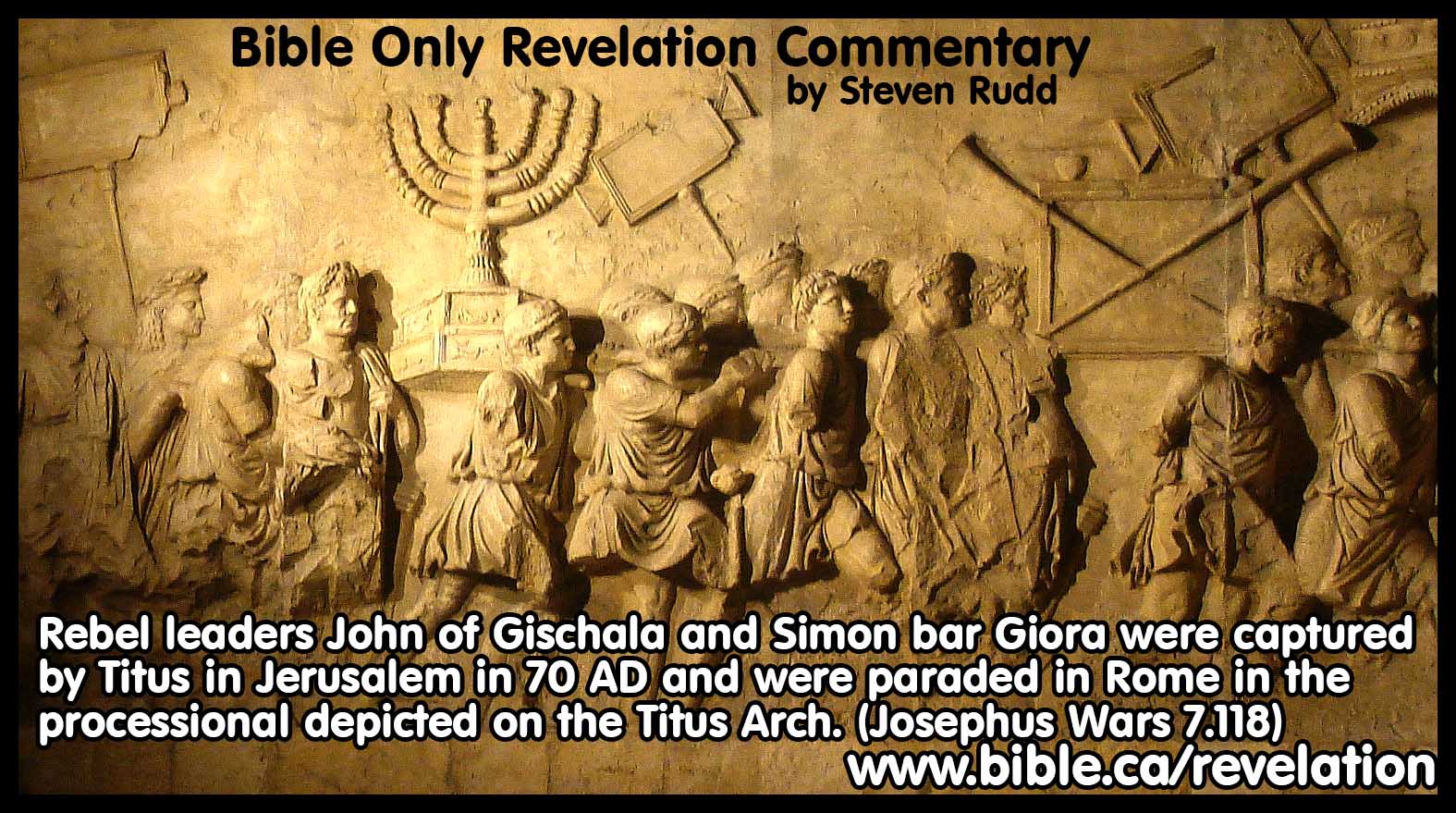
1. “As for John, he wanted food, together with his brethren, in these caverns, and begged that the Romans would now give him their right hand for his security, which he had often proudly rejected before; but for Simon, he struggled hard with the distress he was in, till he was forced to surrender himself, as we shall relate hereafter; (434) so he was reserved for the triumph, and to be then slain: as was John condemned to perpetual imprisonment; and now the Romans set fire to the extreme parts of the city, and burnt them down, and entirely demolished its walls” (Josephus Wars 6.433-434)
2. Josephus, the official “war recorder” for Titus and fellow former rebel leader records, “as for the leaders of the captives, Simon and John, with the other seven hundred men, whom Titus had selected out of the rest as being eminently tall and handsome of body, he gave order that they should be soon carried to Italy, resolving to display them in his triumph.” (Josephus Wars of the Jews 7.118)
|
31 July 593 BC (5th Tammuz 593 BC) |
Ezekiel turns 30 years old and starts prophesying Ezekiel’s first vision of the “glory of Yahweh” Ezek 1:1-3:15 (5th Tammuz 593 BC) |
1. Double chronological marker: 31 July 593
a. 1:1 “In the 13th year in the fourth month on the fifth day”
b. 1:2 “In the fifth month, of the fifth year of King Jehoiachin’s exile”
2. This 30 years calculates back to 623 BC
a. 623 BC was the year the Book of the law found by Hilkiah the High priest under Josiah in the Temple
b. 623 BC was the year Ezekiel was born: now age 30 and can serve as a priest
c. 623 BC was a Jubilee year making 593 BC "year 30" of the 49 year jubilee cycle.
3. "I was by the river Chebar among the exiles, the heavens were opened and I saw visions of God"
a. Here is one of the clay tablets that document
the Jewish exiles living in the very city where Ezekiel was preaching in that
was “by the river Chebar”:
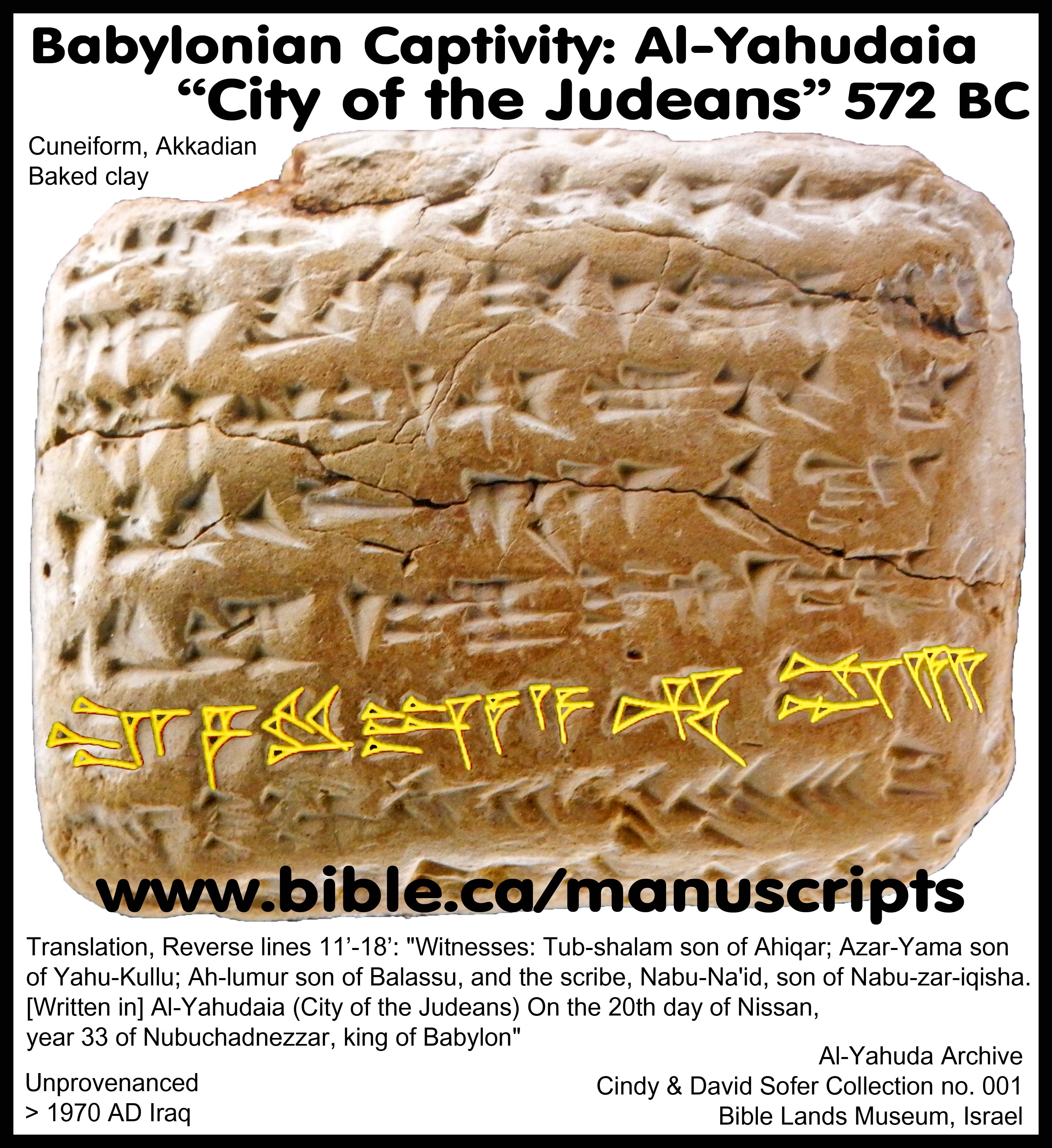
|
6 Aug 593 BC (11th Tammuz 593 BC) |
Ezekiel’s official call as a “watchman” for the “house of Israel” Ezek 3:16-5:17 (11th Tammuz 593 BC) |
1. Read: Ezek 3:16-5:17 which was delivered on 11th Tammuz 593 BC
a. Ezek 3-5 are sign acts depicting Jerusalem’s destruction
2. "“Son of man, I have appointed you a watchman to the house of Israel; whenever you hear a word from My mouth, warn them from Me. “When I say to the wicked, ‘You will surely die,’ and you do not warn him or speak out to warn the wicked from his wicked way that he may live, that wicked man shall die in his iniquity, but his blood I will require at your hand. “Yet if you have warned the wicked and he does not turn from his wickedness or from his wicked way, he shall die in his iniquity; but you have delivered yourself. “Again, when a righteous man turns away from his righteousness and commits iniquity, and I place an obstacle before him, he will die; since you have not warned him, he shall die in his sin, and his righteous deeds which he has done shall not be remembered; but his blood I will require at your hand. “However, if you have warned the righteous man that the righteous should not sin and he does not sin, he shall surely live because he took warning; and you have delivered yourself.” The hand of the Lord was on me there, and He said to me, “Get up, go out to the plain, and there I will speak to you.”" (Ezekiel 3:17–22)
3. Included in this section are 5 of Ezekiel’s sign acts. (see below)
|
Summer 593 BC |
Ezekiel’s Five Sign Acts in 593 BC Ezekiel 3-5 |
Five Sign Acts in 593. See outline on 32 Sign Acts of the Bible
1. Sign Act in 593 BC (Ezek 3:24-27) Ezekiel remains speechless from the time of his calling as a prophet until he receives the news that Jerusalem has fallen.
2.
Sign Act in 593 BC: (Ezek 4:1-3) Ezekiel drawing Jerusalem on a brick and
mimicking the future time when Nebuchadnezzar lays siege to the city. He
inscribes “Jerusalem” on the brick. He lays siege to the city, sets an iron
griddle next to it, and sets his face against the griddle. Here is an unrelated
brick from Esagila and Ezida in Babylon that was stamped with Nebuchadnezzar’s
inscription. It is interesting that many of these bricks have been excavated
and they were made in the millions. This means they were common and well known
at the time of Zedekiah. Ezekiel who was living in Babylon at the time did a
kind of imitation inscription. In place of the common Nebuchadnezzar
inscription, was Ezekiel’s drawing of Jerusalem, which would be destroyed by
Nebuchadnezzar!

3. Sign Act in 593 BC: (Ezek 4:4-6) Ezekiel lying on his side for 390 days and then on his right side for forty days to symbolize the him bearing of the people’s sins.
4. Sign Act in 593 BC: (Ezek 4:9-17) Ezekiel eats rationed portions of food and water to represent the scarcity of food during the siege; he bakes his bread on dung to symbolize the unclean food of the exile.
5. Sign Act in 593 BC: (Ezek 5:1-4) Ezekiel cuts his hair, divides it into three portions, and then, to show the threefold fate of the inhabitants of Jerusalem, burns one third upon the model siege, chops up another third with his sword, and scatters the last third to the wind and chases after it with the sword.
|
593 BC |
Psamtik II (Psammetichus II) defeats Nubia with help of Zedekiah Ezekiel 17:15 was written in 592 BC |
We have three archeological proofs Psammetichus II defeats Nubia with help of Zedekiah that confirm Ezek 17:15 (592 BC).
1. Nubian Victory Stele (593 BC) This stele dates to 593 BC documents the Nubian campaign of Psamtik II and directly supports where Ezekiel 17:15 says King Zedekiah sent troops, horses and envoys to help Pharaoh Psamtik II in 593 BC.
a. "Nubian rule of Egypt had collapsed under the onslaught of the Assyrians. In the wake of that collapse relations between Nubia and Egypt had been peaceful. In rebuilding a strong unified state, the Twenty-sixth (Saite) Dynasty had at first viewed its Asiatic neighbors in the east, and not Nubia in the south, as the potential source of trouble. Now, perhaps following a Nubian move, Psamtik II not only went to war but undertook to wipe out the memory of the Nubian kings who had ruled Egypt. The time when Egypt could dominate Nubia had long passed, and the campaign did not change the fact that Nubia had become a strong independent kingdom with the capability of invading Egypt. In any event, Psamtik’s erasures of Nubian royal names and his prideful victory stela may be seen as the somewhat delayed Egyptian reaction to the period of Nubian domination. " (Ancient Egyptian Literature, Volume III: The Late Period, Miriam Lichtheim, Page 84, 1980 AD)
|
Nubian Victory Stele (593 BC) |
|
|
"Psamtik ever-living; valiant king, traversing two islands [Elephantine], your majesty sent troops to Nubia, it was misery for the rebels. Not one bound pair escaped of the 4,200 captives. A successful deed!” (Steve Rudd Adapted from Lichtheim)
Detailed outine: Nubian Victory Stele |
|
2. The Letter of Aristeas (150 BC)
a. Letter of Aristeas documents the 593 BC Campaign (written in 150 BC)
b. Letter of Aristeas is a Pseudepigrapha purporting to be Greek Court-official 278-270 BC.
c. It was actually written by an Alexandrian Jew in 150 BC, claiming to be written by Egyptian courtier in the reign of Ptolemy Philadelphus II (285-257 BC) during the lifetime of Queen Arsinoe (278-270 BC). It is the earliest reference to the Septuagint (LXX) and documents Ezekiel 17:15 where king Zedekiah sends troops in 593 BC to Psammetichus II (Psamtik II), king of Egypt 595-589 BC.
d. "The Epistle claims to be a contemporary record, written with the personal knowledge of an eye-witness, by Aristeas, an officer at the court of Ptolemy Philadelphus (285–247 b.c.), to his brother Philocrates, giving an account of the circumstances which led up to the composition of the LXX version of the Jewish law. The events with which it deals are supposed to take place during the lifetime of Queen Arsinoe (§ 41). As Arsinoe became Queen about 278 b.c. and died in 270 b.c., these dates provide us with the time limits within which the story must be placed. If the allusion to the royal children in § 41 is not an anachronism, but contains a reference to the fact that Arsinoe, finding herself childless, adopted the offspring of her predecessor, the date must be fixed towards the end of this period. The writer strives to give us the impression that the Epistle was composed almost immediately after the occurrence of the events which it records. This claim, however, cannot be sustained. There are many reasons which make it quite certain that the Epistle could not have been written by a Greek Court-official in the time of Ptolemy Philadelphus." (Pseudepigrapha of the Old Testament, Letter of Aristeas, R. H. Charles, Volume 2, p 83, 1913 AD)
|
Letter of Aristeas (150 BC) |
|
|
"The number of those whom he transported from the country of the Jews to Egypt amounted to no less than a hundred thousand. Of these he armed thirty thousand picked men and settled them in garrisons in the country districts. (And even before this time large numbers of Jews had come into Egypt with the Persian, and in an earlier period still [593 BC] others had been sent to Egypt to help Psammetichus II in his campaign against the king of the Ethiopians. But these were nothing like so numerous as the captives whom Ptolemy the son of Lagus transported.)" (Letter of Aristeas 12-13, Pseudepigrapha of Greek Court-official 278-270 BC. Actual: Written by Jew in 150 BC) |
|
3. Demotic Papyri: 414 BC: In 592 BC, one year after Psamtik II defeats Nubia in 593 BC, he makes a “triumphal visit” to Zedekiah in the "land of Khor" (Judea, Philistia and Syria) as recorded in the Demotic Papyri: 414 BC. (see below)
A. Ezekiel Chronological Bible reading during [Tishri] September 593-592 BC:
1. 592 BC (between Tammuz 593 and Elul 592): Ezek 6-7: Total destruction predicted for Judea
2. Monday 17 Sept 592 (5 Elul): Ezek 8-19: Ezekiel is translated to Jerusalem for the first temple vision
a. It is interesting that Ezekiel’s temple vision coincides with Zedekiah’s hosting the triumphal tour of Egyptian king, Psamtik II.
b. Once again Zedekiah wrongly thinks all is well for Judah and Jerusalem, when in fact it is delusion.
c. This same kind of delusion accompanied the Jews in Jerusalem at the begging of the first Jewish was in AD 66.
d. Ezekiel performs 2 sign acts this year.
B. 592 BC: Ezekiel Decodes Revelation:
|
592 BC: Ezekiel Decodes Revelation Chapter by Chapter topical/chronological correspondence between Revelation & Ezekiel |
||
|
Ezekiel |
Revelation |
Topic |
|
Ezekiel 6 on 592 BC |
5th Seal: Martyrs beneath Altar |
|
|
Ezekiel 7-8 on 592 BC |
6th Seal: Avenging Terror upon Jerusalem |
|
|
Ezekiel 9 on Sept 592 BC |
Christians marked on forehead with Seal of God |
|
|
Ezekiel 10:1-2 on Sept 592 BC |
7th Seal: Grace withdrawn, Destruction Decreed |
|
|
Ezekiel 10-12 on Sept 592 BC |
1st 2nd 3rd 4th Trumpets against Jerusalem |
|
|
Ezekiel 14:19-22 on 592 BC Jeremiah 25:15-18 on 587 BC |
144,000, Wine Cup of Wrath prepared |
|
|
Ezekiel 13 on Sept 592 BC Ezekiel 23 on Aug 591 BC Ezekiel 24 in 589 BC |
7 Bowls of Wrath |
|
|
Ezekiel 16, 23 on Sept 592 BC |
Jerusalem the Great Harlot Rides on Rome |
|
C. Messianic passages:
1. Ezekiel 11:19:
a. This verse was fulfilled twice: first in the return from Babylon in 536 BC and second in the church.
b. "And I will give them one heart, and put a new spirit within them. And I will take the heart of stone out of their flesh and give them a heart of flesh, that they may walk in My statutes and keep My ordinances and do them. Then they will be My people, and I shall be their God." (Ezekiel 11:19–20)
c. "You are our letter, written in our hearts, known and read by all men; being manifested that you are a letter of Christ, cared for by us, written not with ink but with the Spirit of the living God, not on tablets of stone but on tablets of human hearts." (2 Corinthians 3:2–3)
2. Ezekiel 17:22–24: Jesus was that tender shoot also referenced in Isa 53 echoing the parable of the mustard seed
a. "Thus says the Lord God, “I will also take a sprig from the lofty top of the cedar and set it out; I will pluck from the topmost of its young twigs a tender one and I will plant it on a high and lofty mountain. “On the high mountain of Israel I will plant it, that it may bring forth boughs and bear fruit and become a stately cedar. And birds of every kind will nest under it; they will nest in the shade of its branches. “All the trees of the field will know that I am the Lord; I bring down the high tree, exalt the low tree, dry up the green tree and make the dry tree flourish. I am the Lord; I have spoken, and I will perform it.”" (Ezekiel 17:22–24)
b. "Who has believed our message? And to whom has the arm of the Lord been revealed? For He grew up before Him like a tender shoot, And like a root out of parched ground; He has no stately form or majesty That we should look upon Him, Nor appearance that we should be attracted to Him." (Isaiah 53:1–2)
c. "He presented another parable to them, saying, “The kingdom of heaven is like a mustard seed, which a man took and sowed in his field; and this is smaller than all other seeds, but when it is full grown, it is larger than the garden plants and becomes a tree, so that the birds of the air come and nest in its branches.”" (Matthew 13:31–32)
D. Notable quotables: 593/592 BC
1. “Then those of you who escape will remember Me among the nations to which they will be carried captive, how I have been hurt by their adulterous hearts which turned away from Me, and by their eyes which played the harlot after their idols; and they will loathe themselves in their own sight for the evils which they have committed, for all their abominations." (Ezekiel 6:9)
2. Note: The pagan Jews were killed beside their pagan altars of their pagan gods, from whom they prayed to for protection in vain: "“He who is far off will die by the plague, and he who is near will fall by the sword, and he who remains and is besieged will die by the famine. Thus will I spend My wrath on them. “Then you will know that I am the Lord, when their slain are among their idols around their altars, on every high hill, on all the tops of the mountains, under every green tree and under every leafy oak—the places where they offered soothing aroma to all their idols." (Ezekiel 6:12–13)
3. Note: God will one day allow “post-Christian” Europe, USA and Canada to be conquered by the Muslims as a one world califate. He did that countless times in the past, as we see Jerusalem being conquered by pagan Babylonians. Yes one day the Eiffel Tower and the Statue of liberty will be a mosque because Christians failed to take their children to church every Sunday: "‘They transformed the beauty of His ornaments into pride, and they made the images of their abominations and their detestable things with it; therefore I will make it an abhorrent thing to them. ‘I will give it into the hands of the foreigners as plunder and to the wicked of the earth as spoil, and they will profane it." (Ezekiel 7:20–21)
4. Note: Ezekiel and Josephus record that dead bodies defiled the temple in 587 BC/AD 70 before Nebuchadnezzar/Titus burned it to the ground:
a. "And He said to them, “Defile the temple and fill the courts with the slain. Go out!” Thus they went out and struck down the people in the city." (Ezekiel 9:7)
b. Josephus describes the three way battle of the civil war and echoes the words of Jesus, “Where the [dead] body is, there also the vultures will be gathered.” Lk 17:37
c. “for those darts that were thrown by the engines (Roman Scorpions) came with that force, that they went all over the buildings, and reached as far as the altar, and the temple itself, and fell upon the priests, and those that were about the sacred offices; (17) insomuch that in any persons who came thither with great zeal from the ends of the earth, to offer sacrifices at this celebrated place, which was esteemed holy by all mankind, fell down before their own sacrifices themselves, and sprinkled that altar which was venerable among all men, both Greeks and Barbarians, with their own blood; (18) till the dead bodies of strangers were mingled together with those of their own country, and those of profane persons with those of the priests, and the blood of all sorts of dead carcases stood in lakes in the holy courts themselves. (19) And now, “O most wretched city, what misery so great as this didst thou suffer from the Romans, when they came to purify thee from thy internecine hatred! For thou couldst be no longer a place fit for God, nor couldst thou longer continue in being, after thou hadst been a sepulchre for the bodies of thine own people, and hadst made the holy house itself a burying-place in this civil war of thine! Yet mayest thou again grow better, if perchance thou wilt hereafter appease the anger of that God who is the author of thy destruction.” (20) But I must restrain myself from these passions by the rules of history, since this is not a proper time for domestic lamentations, but for historical narrations; I therefore return to the operations that follow in this sedition.” (Josephus Wars of the Jews 5.16-20)
d. “Now Titus was deeply affected with this state of things, and reproached John and his party, and said to them, “Have not you, vile wretches that you are, by our permission, put up this partition-wall before your sanctuary? (125) Have not you been allowed to put up the pillars thereto belonging at due distances, and on it to engrave in Greek, and in your own letters, this prohibition, that no foreigner should go beyond that wall? (126) Have not we given you leave to kill such as go beyond it, though he were a Roman? And what do you do now, you pernicious villains? Why do you trample upon dead bodies in this temple? And why do you pollute this holy house with the blood both of foreigners and Jews themselves? (127) I appeal to the gods of my own country, and to every god that ever had any regard to this place (for I do not suppose it to be now regarded by any of them); I also appeal to my own army, and to those Jews that are now with me, and even to you yourselves, that I do not force you to defile this your sanctuary; (128) and if you will but change the place whereon you will fight, no Roman shall either come near your sanctuary, or offer any affront to it; nay, I will endeavor to preserve you your holy house, whether you will or not.” (Josephus Wars 6:124-128)
5. "“Son of man, prophesy against the prophets of Israel who prophesy, and say to those who prophesy from their own inspiration, ‘Listen to the word of the Lord! ‘Thus says the Lord God, “Woe to the foolish prophets who are following their own spirit and have seen nothing." (Ezekiel 13:2–3)
6. "“Son of man, if a country sins against Me by committing unfaithfulness, and I stretch out My hand against it, destroy its supply of bread, send famine against it and cut off from it both man and beast, even though these three men, Noah, Daniel and Job were in its midst, by their own righteousness they could only deliver themselves,” declares the Lord God." (Ezekiel 14:13–14)
7. Note: Four seals of Revelation 6:1-8 = Ezek 14:21 = 4 horses: Jer 6:23; Ezek 26:7; 38:4,15; Zech 6:1-6
a. "For thus says the Lord God, “How much more when I send My four severe judgments against Jerusalem: sword, famine, wild beasts and plague to cut off man and beast from it!" (Ezekiel 14:21)
8. Note: Jerusalem before David was pagan: "and say, ‘Thus says the Lord GOD to Jerusalem, “Your origin and your birth are from the land of the Canaanite, your father was an Amorite and your mother a Hittite." (Ezekiel 16:3)
9. Note: Israel is God’s harlot wife: "“How languishing is your heart,” declares the Lord GOD, “while you do all these things, the actions of a bold-faced harlot. “When you built your shrine at the beginning of every street and made your high place in every square, in disdaining money, you were not like a harlot. “You adulteress wife, who takes strangers instead of her husband! “Men give gifts to all harlots, but you give your gifts to all your lovers to bribe them to come to you from every direction for your harlotries. “Thus you are different from those women in your harlotries, in that no one plays the harlot as you do, because you give money and no money is given you; thus you are different.”" (Ezekiel 16:30–34)
10. Note: An amazing passage that outlines the moral code: "“But if a man is righteous and practices justice and righteousness, and does not eat at the mountain shrines or lift up his eyes to the idols of the house of Israel, or defile his neighbor’s wife or approach a woman during her menstrual period— if a man does not oppress anyone, but restores to the debtor his pledge, does not commit robbery, but gives his bread to the hungry and covers the naked with clothing, if he does not lend money on interest or take increase, if he keeps his hand from iniquity and executes true justice between man and man, if he walks in My statutes and My ordinances so as to deal faithfully—he is righteous and will surely live,” declares the Lord God." (Ezekiel 18:5–9)
11. Note: Calvinism’s first tenant “T” total hereditary depravity is refuted by this one verse alone: "“The person who sins will die. The son will not bear the punishment for the father’s iniquity, nor will the father bear the punishment for the son’s iniquity; the righteousness of the righteous will be upon himself, and the wickedness of the wicked will be upon himself." (Ezekiel 18:20)
12. Note: God’s divine grace is unspeakable: "“But the house of Israel says, ‘The way of the Lord is not right.’ Are My ways not right, O house of Israel? Is it not your ways that are not right? “Therefore I will judge you, O house of Israel, each according to his conduct,” declares the Lord GOD. “Repent and turn away from all your transgressions, so that iniquity may not become a stumbling block to you. “Cast away from you all your transgressions which you have committed and make yourselves a new heart and a new spirit! For why will you die, O house of Israel? “For I have no pleasure in the death of anyone who dies,” declares the Lord GOD. “Therefore, repent and live.”" (Ezekiel 18:29–32)
13. Note: The two cubs of Ezek 19 are Jehoahaz and Jehoiachin.
a. "‘Then nations heard about him; He was captured in their pit, And they brought him with hooks To the land of Egypt." (Ezekiel 19:4)
i. "Pharaoh Neco made Eliakim the son of Josiah king in the place of Josiah his father, and changed his name to Jehoiakim. But he took Jehoahaz away and brought him to Egypt, and he died there." (2 Kings 23:34)
b. "‘They put him in a cage with hooks And brought him to the king of Babylon; They brought him in hunting nets So that his voice would be heard no more On the mountains of Israel." (Ezekiel 19:9)
i. "So he led Jehoiachin away into exile to Babylon; also the king’s mother and the king’s wives and his officials and the leading men of the land, he led away into exile from Jerusalem to Babylon." (2 Kings 24:15)
|
Spring 592 BC |
Temple will be destroyed: Ezek 6-7 |
1. Ezek 6-7:
a. The destruction of Judea and the temple are proclaimed.
2. Dating Ezek 6-7: 592 BC (between Tammuz 593 and Elul 592):
a. “Andy Steinman said, “The way I figured it was this: Except for Ezek 29:17-30:19, Ezekiel’s prophecies appear to have been arranged chronologically. That would imply that Ezek 6-7 fall somewhere between 3:16-5:17 (11 Tammuz 593) and 8:1 (5 Elul 592). Given the content of Ezek 6-7, later in Ezekiel’s 430 days seems more likely to me, so I think 592 is most likely.” (Rodger Young, 2017 AD)
|
17 Sept 592 BC (5 Elul) |
Ezekiel is translated to Jerusalem for the first temple vision: Ezek 8-19 |
1. Zedekiah rebels against Babylon: Ezek 17:15; 2 Kgs 24:20
2. Edom condemned: Ezekiel 16:55-59
|
592 BC |
2 Sign Acts in 592 BC Ezek 8-19 |
1. Sign Act in 592 BC: (Ezek 12:1-16)
a. Ezekiel mimicking going into exile. Ezekiel prepares a bag, digs a hole in the wall of his house, places the bag upon his shoulder, exits through the hole with his eyes covered, and departs from the city to represent the people of Jerusalem going off into exile.
b. "Then the word of the Lord came to me, saying, “Son of man, you live in the midst of the rebellious house, who have eyes to see but do not see, ears to hear but do not hear; for they are a rebellious house. “Therefore, son of man, prepare for yourself baggage for exile and go into exile by day in their sight; even go into exile from your place to another place in their sight. Perhaps they will understand though they are a rebellious house. “Bring your baggage out by day in their sight, as baggage for exile. Then you will go out at evening in their sight, as those going into exile. “Dig a hole through the wall in their sight and go out through it. “Load the baggage on your shoulder in their sight and carry it out in the dark. You shall cover your face so that you cannot see the land, for I have set you as a sign to the house of Israel.” I did so, as I had been commanded. By day I brought out my baggage like the baggage of an exile. Then in the evening I dug through the wall with my hands; I went out in the dark and carried the baggage on my shoulder in their sight. In the morning the word of the Lord came to me, saying, “Son of man, has not the house of Israel, the rebellious house, said to you, ‘What are you doing?’ “Say to them, ‘Thus says the Lord God, “This burden concerns the prince in Jerusalem as well as all the house of Israel who are in it.” ’ “Say, ‘I am a sign to you. As I have done, so it will be done to them; they will go into exile, into captivity.’ “The prince who is among them will load his baggage on his shoulder in the dark and go out. They will dig a hole through the wall to bring it out. He will cover his face so that he can not see the land with his eyes. “I will also spread My net over him, and he will be caught in My snare. And I will bring him to Babylon in the land of the Chaldeans; yet he will not see it, though he will die there. “I will scatter to every wind all who are around him, his helpers and all his troops; and I will draw out a sword after them. “So they will know that I am the Lord when I scatter them among the nations and spread them among the countries. “But I will spare a few of them from the sword, the famine and the pestilence that they may tell all their abominations among the nations where they go, and may know that I am the Lord.”" (Ezekiel 12:1-16)
2. Sign Act in 592 BC: (Ezek 12:17-20)
a. Ezekiel eats and drinks with trembling to show the Jerusalemites’ emotional distress during the Babylonian invasion.
b. "Moreover, the word of the LORD came to me saying, “Son of man, eat your bread with trembling and drink your water with quivering and anxiety. “Then say to the people of the land, ‘Thus says the Lord GOD concerning the inhabitants of Jerusalem in the land of Israel, “They will eat their bread with anxiety and drink their water with horror, because their land will be stripped of its fullness on account of the violence of all who live in it. “The inhabited cities will be laid waste and the land will be a desolation. So you will know that I am the LORD.” ’ ”" (Ezekiel 12:17-20)
|
17 Sept 592 BC |
Psamtik II makes triumphal visit to Judea and Zedekiah Ezekiel 17 & Archeological sources |
A. Psamtik II was one of two eagles of Ezekiel 17 in 592 BC
1. Ezekiel 17 was prophesied on 17 Sept 592 BC. It is amazing that while Psamtik II is visiting Zedekiah or soon after he returned to Egypt, that Ezekiel prophecy against him on 17 Sept 592!
a. "But he [Zedekiah] rebelled against him [Nebuchadnezzar] by sending his envoys to Egypt [Psamtik II] that they might give him horses and many troops. Will he succeed? Will he who does such things escape? Can he indeed break the covenant [oath Zedekiah swore to Nebuchadnezzar in the name of YHWH] and escape?" (Ezekiel 17:15)
b. The first eagle is Nebuchadnezzar: "Now the word of the Lord came to me saying, “Son of man, propound a riddle and speak a parable to the house of Israel, saying, ‘Thus says the Lord God, “A great eagle [Nebuchadnezzar] with great wings, long pinions and a full plumage of many colors came to Lebanon and took away the top of the cedar. “He plucked off the topmost of its young twigs and brought it to a land of merchants; he set it in a city of traders. “He also took some of the seed of the land and planted it in fertile soil. He placed it beside abundant waters; he set it like a willow. “Then it sprouted and became a low, spreading vine with its branches turned toward him, but its roots remained under it. So it became a vine and yielded shoots and sent out branches." (Ezekiel 17:1-6)
c. The second eagle is Psamtik II: “But there was another great eagle [Psamtik II] with great wings and much plumage; and behold, this vine bent its roots toward him and sent out its branches toward him from the beds where it was planted, that he might water it. “It was planted in good soil beside abundant waters, that it might yield branches and bear fruit and become a splendid vine.” ’ “Say, ‘Thus says the Lord God, “Will it thrive? Will he not pull up its roots and cut off its fruit, so that it withers—so that all its sprouting leaves wither? And neither by great strength nor by many people can it be raised from its roots again. “Behold, though it is planted, will it thrive? Will it not completely wither as soon as the east wind strikes it—wither on the beds where it grew?" (Ezekiel 17:7-10)
d. Condemnation of Zedekiah: The interpretation of the two eagles: "Moreover, the word of the Lord came to me, saying, “Say now to the rebellious house, ‘Do you not know what these things mean?’ Say, ‘Behold, the king of Babylon came to Jerusalem, took its king and princes and brought them to him in Babylon. ‘He took one of the royal family and made a covenant with him, putting him under oath. He also took away the mighty of the land, that the kingdom might be in subjection, not exalting itself, but keeping his covenant that it might continue. ‘But he [Zedekiah] rebelled against him [Nebuchadnezzar] by sending his envoys to Egypt [Psamtik II] that they might give him horses and many troops. Will he succeed? Will he who does such things escape? Can he indeed break the covenant and escape? ‘As I live,’ declares the Lord God, ‘Surely in the country of the king who put him on the throne, whose oath he despised and whose covenant he broke, in Babylon he shall die. ‘Pharaoh with his mighty army and great company will not help him in the war, when they cast up ramps and build siege walls to cut off many lives. ‘Now he despised the oath by breaking the covenant, and behold, he pledged his allegiance, yet did all these things; he shall not escape.’” Therefore, thus says the Lord God, “As I live, surely My oath which he despised and My covenant which he broke, I will inflict on his head. “I will spread My net over him, and he will be caught in My snare. Then I will bring him to Babylon and enter into judgment with him there regarding the unfaithful act which he has committed against Me. “All the choice men in all his troops will fall by the sword, and the survivors will be scattered to every wind; and you will know that I, the Lord, have spoken.” Thus says the Lord God, “I will also take a sprig from the lofty top of the cedar and set it out; I will pluck from the topmost of its young twigs a tender one and I will plant it on a high and lofty mountain. “On the high mountain of Israel I will plant it, that it may bring forth boughs and bear fruit and become a stately cedar. And birds of every kind will nest under it; they will nest in the shade of its branches. “All the trees of the field will know that I am the Lord; I bring down the high tree, exalt the low tree, dry up the green tree and make the dry tree flourish. I am the Lord; I have spoken, and I will perform it.”" (Ezekiel 17:11-24)
2. Comments:
a. "The eagle is a popular figure in the prophets as well as in the apocalyptic writings. In Ezekiel’s allegory of the eagles (Ezek. 17:1–21) a great eagle represents the Babylonian Nebuchadnezzar, and another eagle stands for the Egyptian pharaoh Psammetichus II." (Eerdmans Bible Dictionary, Eagle, 1975 AD)
b. "Significantly, the change in Zedekiah’s disposition toward Nebuchadrezzar appears to have coincided with the accession of Psammetichus II 595–589) to the throne of Egypt. A papyrus [Demotic Papyri, 414 BC] from El Hibeh refers to a visit by the pharaoh to Syria-Palestine in his fourth year, ostensibly as a religious pilgrimage to Byblos. But such royal visits usually also have political undertones, especially since these states had revolted against Babylon as recently as three years previously. In an early second-century B.C. letter to Philocrates, Aristeas [Letter of Aristeas, 12-13, 150 BC] recalls that under Psammetichus, Jews had assisted the Egyptians in their conflicts with the Ethiopians (Ep. Aristeas 13). It is not clear whether Psammetichus II encouraged Zedekiah to revolt again in 588. During the ensuing siege of Jerusalem, the Judeans looked to Psammetichus II’s successor, Apries/Hophra 589–570), for aid (cf. Jer. 37:5–7), but in vain. Egypt stood by and watched the razing of its former ally’s capital without taking up arms in its defense. This brief survey of events leading up to the siege of Jerusalem demonstrates that Zedekiah’s pro-Egyptian policy was not a last-minute strategy of desperation. He had been casting his eyes southward for several years." (NICOT, Ezekiel 17:14-15)
c. "The allegory in Ezekiel 17:1–10 presupposes the conspiracy of Judah with Egypt and Zedekiah’s defection from Babylonian overlordship implicit in it. Greenberg has put together the accounts which appear to support an intervention of Psammetichus II (594–588) in Palestine. The Babylonian reaction, according to Ezek 17:1–9, has still not taken place. So we are led to the time before the beginning of the siege of Jerusalem (cf. 24:1f*)." (Hermeneia, Ezekiel 17:1–24, 1979 AD)
d. "Although Ezekiel’s original audience would have immediately understood the allegory, God nevertheless provides an oracular interpretation of it. The first eagle is Nebuchadnezzar, who deported the Israelite king Jehoiachin and Ezekiel’s fellow exiles to Babylon in 597 b.c. Nebuchadnezzar then placed the Davidide Zedekiah on the throne in Jerusalem and made a treaty with him, thus providing all the conditions necessary for political stability in the land. However, Zedekiah rebelled and sought military support for his revolt against the Egyptian pharaoh Psammetichus II, the second eagle of the allegory. Ezekiel, like Jeremiah (Jer. 27:4-15), considered this move not only a political blunder but also a violation of God’s will. Therefore the judgment will take place on two levels. On the human level, Nebuchadnezzar will besiege Jerusalem and deport Zedekiah to Babylon, where he will die. On the divine level, God will trap Zedekiah and judge him by taking him to Babylon, destroying his army in the process (Ezek. 11:11-21). The interpretation of the allegory is straightforward and, for the most part, does not appear to have been crafted after the fall of Jerusalem. In fact Nebuchadnezzar was not able to capture Jerusalem easily (cf. v. 9)." (Harper’s Bible Commentary, Ezekiel 17:11, 1988 AD)
e. "Ezekiel depicts the same event with the eagle to be understood allegorically. The eagle’s carrying off the top shoot of a tree (17:3–4a) represents King Nebuchadrezzar, who removes the Davidic house and King Jehoiachin and exiles the ruling elite to Babylon. In 17:7, Ezekiel uses the image of the eagle for another king, “another great eagle with great wings and much plumage.” This eagle is the Egyptian king, Psammetichus II, who tries to extend his power by inciting Zedekiah to rebel against Babylon. But both eagles, Nebuchadrezzar and Psammetichus II, come to nought in God’s purposes (17:22–24). Working in a similar paradigm of imperial powers as agents of God’s judgment who will in turn be judged by God, various prophets also use the image of the eagle to depict aspects of these empires: their power, leaders,31 and impact. In these ten passages, the eagle either depicts an imperial power (Assyria, Babylon, Egypt), or represents an aspect of imperial power. Further, God emerges in Ezek 17:22–24 (cf. 17:3–4) as a supereagle who, after using an imperial power to inflict punishment, now punishes the imperial power and saves the people from Babylon. Six passages explicitly use the eagle to depict God’s salvation from imperial tyrants. God saves from Egypt: “You have seen what I did to the Egyptians, and how I bore you on eagles’ wings and brought you to myself” (Exod 19:4; cf. Deut 32:10–11). God also saves from Babylon (Isa 40:31) and from Moab, which exploits Babylon’s presence to threaten Judah (Jer 30:10, 16 LXX = 49:16, 22). In “out-eagling” these imperial powers, God soars even “among the stars” to destroy Edom (Obad 1:4)." (Journal of Biblical Literature, Volume 122, p 473, 2003 AD)
B. Archeological sources: Demotic Papryi
1. Psammetichus II (Psamtik II)
a. Psamtik II makes a “triumphal visit” to Phoenicia-Palestine after defeating Nubia in 593 BC.
b. Psamtik II visits Zedekiah in the "land of Khor" (Judea, Philistia and Syria) as recorded in the Demotic Papyri: 414 BC.
c. "There is evidence for military cooperation between Egypt and Judah in 593, and the following year Psammetichus II organized a triumphal visit to Palestine (Greenberg Ezekiel 1–20 AB, 13)." (ABD, Zedekiah)
d. "In 591 [Actually 592 BC] Psammetichus II (595-589) made a trip through Ḫurru (Judea, Phoenicia, Syria), which may have had as its purpose the inciting of further rebellion in Palestine [against Nebuchadnezzar]." (ABC, Volume 4, Page 1043)
2. Demotic Papyri: 414 BC:
|
Demotic Papyri (414 BC) |
|
|
“In 4th year [592 BC] of Psamtik Nefrebre Pharaoh is going to the land of Khor [Judea, Philistia, Syria] Let a priest come with the bouquet of Amon to go to the land of Khor with Pharaoh” (Catalogue of the Demotic Papyri in the John Rylands library, F. Griffith, Francis Llewellyn, Papyrus IX, Column 15, lines 17-19, 1909 AD) |
|
A. Ezekiel Chronological Bible reading during [Tishri] September 592-591 BC:
1. Wednesday 14 Aug 591 (10 Av): Ezek 20-23: Ezekiel has a visit from the “elders” of the people in exile
2. Ezekiel performs three sign acts of Ezekiel in 591 BC
B. Notable quotables: 592/591 BC
1. Note: Canaan flowed with milk and honey… the glory of all the lands: "on that day I swore to them, to bring them out from the land of Egypt into a land that I had selected for them, flowing with milk and honey, which is the glory of all lands." (Ezekiel 20:6)
2. Note: Israel worshipped wood and stone, instead of the one true God: "“What comes into your mind will not come about, when you say: ‘We will be like the nations, like the tribes of the lands, serving wood and stone.’" (Ezekiel 20:32)
3. "“As I live,” declares the Lord God, “surely with a mighty hand and with an outstretched arm and with wrath poured out, I shall be king over you. “I will bring you out from the peoples and gather you from the lands where you are scattered, with a mighty hand and with an outstretched arm and with wrath poured out; and I will bring you into the wilderness of the peoples, and there I will enter into judgment with you face to face. “As I entered into judgment with your fathers in the wilderness of the land of Egypt, so I will enter into judgment with you,” declares the Lord God. “I will make you pass under the rod, and I will bring you into the bond of the covenant; and I will purge from you the rebels and those who transgress against Me; I will bring them out of the land where they sojourn, but they will not enter the land of Israel. Thus you will know that I am the Lord." (Ezekiel 20:33–38)
4. Note: Israel todays is a barren wasteland devoid of 99% of its topsoil in the hill country and the negev.
a. "“Son of man, set your face toward Teman, and speak out against the south and prophesy against the forest land of the Negev, and say to the forest of the Negev, ‘Hear the word of the Lord: thus says the Lord God, “Behold, I am about to kindle a fire in you, and it will consume every green tree in you, as well as every dry tree; the blazing flame will not be quenched and the whole surface from south to north will be burned by it." (Ezekiel 20:46–47)
b. However we know that Absalom’s hair was caught in a forest east of the Jordan
c. David hid is thick forests near Keilah and Hebron
d. And the Negev, now a volcanic wasteland, was a thick forest
5. Note: Nebuchadnezzar used ancient methods of casting lots to chose between conquering Rabbah or Jerusalem and God brought about the result of Jerusalem: "“You shall mark a way for the sword to come to Rabbah of the sons of Ammon, and to Judah into fortified Jerusalem. “For the king of Babylon stands at the parting of the way, at the head of the two ways, to use divination; he shakes the arrows, he consults the household idols, he looks at the liver. “Into his right hand came the divination, ‘Jerusalem,’ to set battering rams, to open the mouth for slaughter, to lift up the voice with a battle cry, to set battering rams against the gates, to cast up ramps, to build a siege wall." (Ezekiel 21:20–22)
6. "“I searched for a man among them who would build up the wall and stand in the gap before Me for the land, so that I would not destroy it; but I found no one." (Ezekiel 22:30)
|
14 Aug 591 |
Ezekiel has a visit from the “elders” of the people in exile Ezek 20-23 |
Three sign acts of Ezekiel in 591 BC:
1. Sign Act in 591 BC: (Ezek 21:6-7)
a. Ezekiel groans to demonstrate the people’s response to the news of God’s impending judgment.
b. "“As for you, son of man, groan with breaking heart and bitter grief, groan in their sight. “And when they say to you, ‘Why do you groan?’ you shall say, ‘Because of the news that is coming; and every heart will melt, all hands will be feeble, every spirit will faint and all knees will be weak as water. Behold, it comes and it will happen,’ declares the Lord GOD.”" (Ezekiel 21:6-7)
2. Sign Act in 591 BC: (Ezek 21:8-17)
a. Ezekiel cries out and strikes his thigh to depict the people’s gestures of grief. Later, he claps his hands to show the divine indignation toward the people.
b. "Again the word of the Lord came to me, saying, “Son of man, prophesy and say, ‘Thus says the Lord.’ Say, ‘A sword, a sword sharpened And also polished! ‘Sharpened to make a slaughter, Polished to flash like lightning!’ Or shall we rejoice, the rod of My son despising every tree? “It is given to be polished, that it may be handled; the sword is sharpened and polished, to give it into the hand of the slayer. “Cry out and wail, son of man; for it is against My people, it is against all the officials of Israel. They are delivered over to the sword with My people, therefore strike your thigh. “For there is a testing; and what if even the rod which despises will be no more?” declares the Lord God. “You therefore, son of man, prophesy and clap your hands together; and let the sword be doubled the third time, the sword for the slain. It is the sword for the great one slain, which surrounds them, that their hearts may melt, and many fall at all their gates. I have given the glittering sword. Ah! It is made for striking like lightning, it is wrapped up in readiness for slaughter. “Show yourself sharp, go to the right; set yourself; go to the left, wherever your edge is appointed. “I will also clap My hands together, and I will appease My wrath; I, the Lord, have spoken.”" (Ezekiel 21:8-17)
3. Sign Act in 591 BC: (Ezek 21:18-23)
a. Ezekiel sets up a signpost to show the ways the king of Babylon might take in his march against the west.
b. "The word of the Lord came to me saying, “As for you, son of man, make two ways for the sword of the king of Babylon to come; both of them will go out of one land. And make a signpost; make it at the head of the way to the city. “You shall mark a way for the sword to come to Rabbah of the sons of Ammon, and to Judah into fortified Jerusalem. “For the king of Babylon stands at the parting of the way, at the head of the two ways, to use divination; he shakes the arrows, he consults the household idols, he looks at the liver. “Into his right hand came the divination, ‘Jerusalem,’ to set battering rams, to open the mouth for slaughter, to lift up the voice with a battle cry, to set battering rams against the gates, to cast up ramps, to build a siege wall. “And it will be to them like a false divination in their eyes; they have sworn solemn oaths. But he brings iniquity to remembrance, that they may be seized." (Ezekiel 21:18-23)
Note: No events recorded in the Bible from this year. It’s the calm before the storm!
A. Chronological Bible reading during [Tishri] September 590-589 BC:
1. Tuesday 27 January 589 BC (10th Tebeth): Ezek 24-25
2. 2 Ki 25
3. Jeremiah 37-39
B. 589 BC: Ezekiel Decodes Revelation:
|
589 BC: Ezekiel Decodes Revelation Chapter by Chapter topical/chronological correspondence between Revelation & Ezekiel |
||
|
Ezekiel |
Revelation |
Topic |
|
Ezekiel 24 on 589 BC |
7 Bowls to avenge Christians in Heaven |
|
|
Ezekiel 24 on 589 BC |
6th Trumpet/2nd Woe: Armies of Titus arrive |
|
C. Notable quotables: 590/589 BC
1. Note: Tuesday 27 January 589 BC: "And the word of the Lord came to me in the ninth year, in the tenth month, on the tenth of the month, saying, “Son of man, write the name of the day, this very day. The king of Babylon has laid siege to Jerusalem this very day." (Ezekiel 24:1–2)
2. Note: Ezekiel, as one of the two witnesses of Revelation 11 was mute for 42 months like Jesus ben Ananus. The death of Ezekiel’s wife ended his muteness at the end of the 42 months. For Jesus ben Ananus, he himself died at the end of the 42 months. "‘On that day your mouth will be opened to him who escaped, and you will speak and be mute no longer. Thus you will be a sign to them, and they will know that I am the Lord.’ ”" (Ezekiel 24:27)
a. Ezekiel and Jesus ben Ananus: Both were “mute prophets” for 42 months from liberation to siege
b. Ezekiel’s total mute time: is 6.5 yrs: 6th Aug 593 (Ezek 3:24-27) to 19th Jan 586 BC (Ezek 33:21-22)
c. Ezekiel’s 42 mos begin: 6 August 593 BC (Ezek 3:24-27) Jerusalem liberated
d. Ezekiel’s 42 mos end: Nebuchadnezzar’s armies arrive on 27th Jan 589 BC (Ezek 24:25-27)
e. Jesus total mute time: 7 years 5 months from Sukkot AD 62 till 7th March AD 70. (Josephus Wars 6:300-309)
f. Jesus’ 42 months begin: Monday 15th Sept AD 66, Jerusalem Liberated
g. Jesus’ 42 months end: Stoned by Jews: 7th March AD 70, Titus’ armies arrived
3. Note: When Egypt attack Babylon to defend Jerusalem, Nebuchadnezzar lifts the siege, giving false hope to Zedekiah: "Meanwhile, Pharaoh’s army had set out from Egypt; and when the Chaldeans who had been besieging Jerusalem heard the report about them, they lifted the siege from Jerusalem." (Jeremiah 37:5)
4. Note: God fought many battles: "‘For even if you had defeated the entire army of Chaldeans who were fighting against you, and there were only wounded men left among them, each man in his tent, they would rise up and burn this city with fire.’ ”" (Jeremiah 37:10)
a. Gideon: "When they blew 300 trumpets, the LORD set the sword of one against another even throughout the whole army; and the army fled as far as Beth-shittah toward Zererah, as far as the edge of Abel-meholah, by Tabbath." (Judges 7:22)
b. David: “It shall be, when you hear the sound of marching in the tops of the balsam trees, then you shall act promptly, for then the Lord will have gone out before you to strike the army of the Philistines.” (2 Samuel 5:24)
c. Elisha and the 4 Lepers: "For the Lord had caused the army of the Arameans to hear a sound of chariots and a sound of horses, even the sound of a great army, so that they said to one another, “Behold, the king of Israel has hired against us the kings of the Hittites and the kings of the Egyptians, to come upon us.” Therefore they arose and fled in the twilight, and left their tents and their horses and their donkeys, even the camp just as it was, and fled for their life." (2 Kings 7:6–7)
d. Hezekiah: "Then it happened that night that the angel of the LORD went out and struck 185,000 in the camp of the Assyrians; and when men rose early in the morning, behold, all of them were dead." (2 Kings 19:35)
5. Note: Jeremiah is thrown into prison when the Babylonian army withdraws. Notice he was thought to be defecting to the Babylonians, as he had instructed many others to do. The scene where the king asks Jeremiah if there is a message from God, he replies: “THERE IS!!! Your going to die!” Very John the Baptist-like.
a. "While he was at the Gate of Benjamin, a captain of the guard whose name was Irijah, the son of Shelemiah the son of Hananiah was there; and he arrested Jeremiah the prophet, saying, “You are going over to the Chaldeans!” But Jeremiah said, “A lie! I am not going over to the Chaldeans”; yet he would not listen to him. So Irijah arrested Jeremiah and brought him to the officials. Then the officials were angry at Jeremiah and beat him, and they put him in jail in the house of Jonathan the scribe, which they had made into the prison. For Jeremiah had come into the dungeon, that is, the vaulted cell; and Jeremiah stayed there many days. Now King Zedekiah sent and took him out; and in his palace the king secretly asked him and said, “Is there a word from the LORD?” And Jeremiah said, “There is!” Then he said, “You will be given into the hand of the king of Babylon!”" (Jeremiah 37:13–17)
6. Note: Key verse to understand the fact that Jeremiah’s message was to “come out from among them… leave it all behind… and surrender to the Babylonians.”: “Thus says the LORD, ‘He who stays in this city will die by the sword and by famine and by pestilence, but he who goes out to the Chaldeans will live and have his own life as booty and stay alive.’" (Jeremiah 38:2)
7. Note: Jeremiah pleads with Zedekiah to surrender. Zedekiah is afraid that those who surrendered before him in Babylon will kill him: "Then Jeremiah said to Zedekiah, “Thus says the LORD God of hosts, the God of Israel, ‘If you will indeed go out to the officers of the king of Babylon, then you will live, this city will not be burned with fire, and you and your household will survive. ‘But if you will not go out to the officers of the king of Babylon, then this city will be given over to the hand of the Chaldeans; and they will burn it with fire, and you yourself will not escape from their hand.’ ” Then King Zedekiah said to Jeremiah, “I dread the Jews who have gone over to the Chaldeans, for they may give me over into their hand and they will abuse me.”" (Jeremiah 38:17–19)
8. Jeremiah is thrown into a vaulted jail, then taken out to the kings court, then thrown into a waterless muddy-bottomed cistern, the he stayed in the court of the guardhouse under house arrest until the city was captured and he was set free by Nebuzaradan at Ramah.
a. Cisterns need to be cleaned or they accumulate mud like the one Jeremiah was thrown into.
b. In 2013, the author was square supervisor at Kh. Maqatir for CAV2 where a 50 cm layer of water laid mud (waist deep) was excavated which dated to AD 69.
c. It was 5 meters in diameter and 5 meters deep, with a cone shape up the surface with a 75 cm circular opening.
d. Just as ropes were used to excavate this cistern pail by pail, so too Jeremiah was lowered down and raised up by ropes.
e.
In this mud layer was embedded with hundreds of pottery sherds.
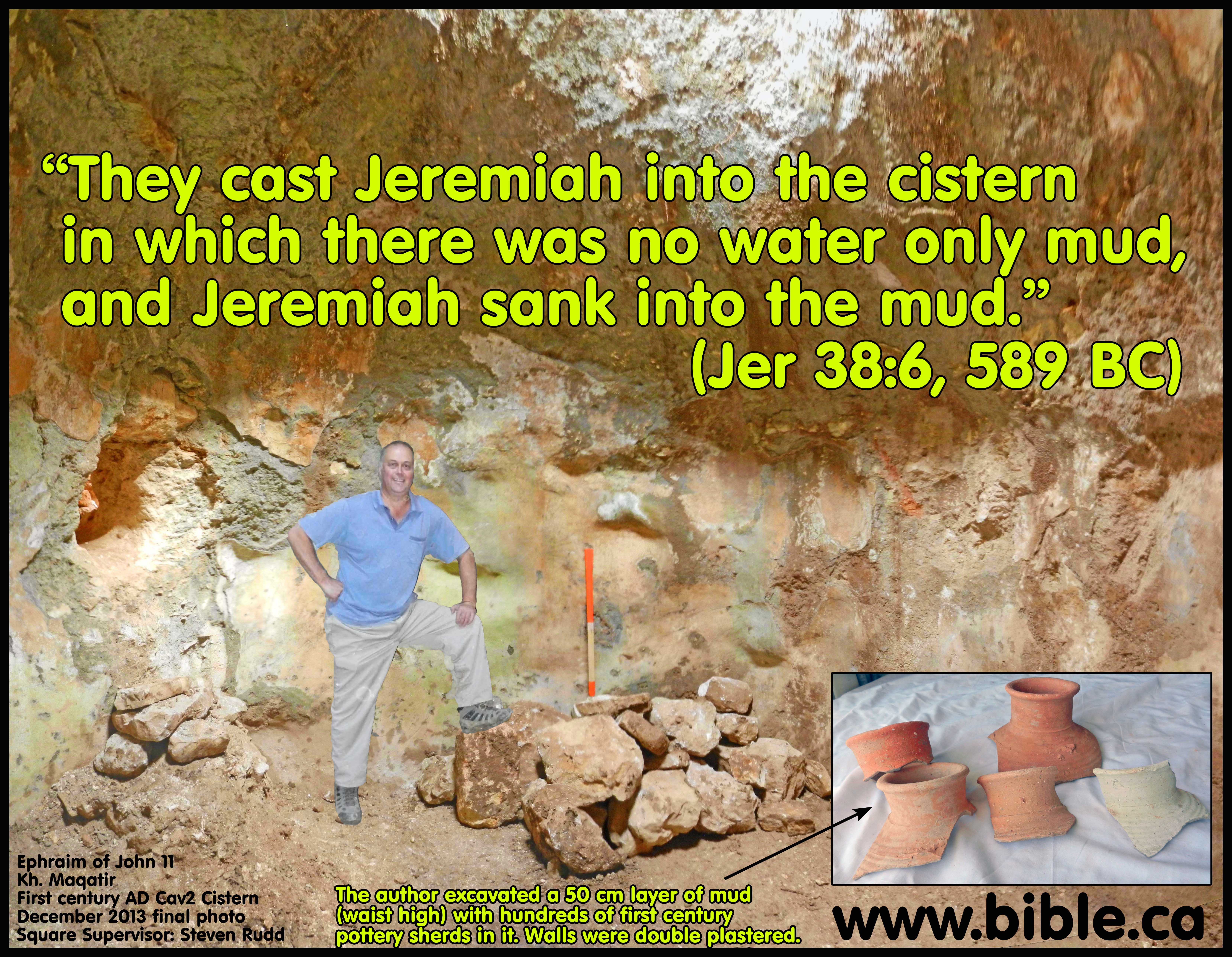
9. Conversion of Ebed-melech, the Ethiopian Eunuch, who by faith, saved Jeremiah from the cistern (see Jeremiah 38:7)
a. "Now the word of the LORD had come to Jeremiah while he was confined in the court of the guardhouse, saying, “Go and speak to Ebed-melech the Ethiopian, saying, ‘Thus says the LORD of hosts, the God of Israel, “Behold, I am about to bring My words on this city for disaster and not for prosperity; and they will take place before you on that day. “But I will deliver you on that day,” declares the LORD, “and you will not be given into the hand of the men whom you dread. “For I will certainly rescue you, and you will not fall by the sword; but you will have your own life as booty, because you have trusted in Me,” declares the LORD.’ ”" (Jeremiah 39:15-18)
b. This story echoes:
i. the truth seeking of the first century Ethiopian Eunuch in Acts 8
ii. the bravery of Rahab the harlot who hid the spies and became the mother-in-law of Ruth.
iii. the boldness of Joseph of Arimathea who petitioned Pilot for the body of Jesus.
|
Tuesday 27 January 589 BC (10th Tebeth) |
Nebuchadnezzar's Third/final attack and siege of Jerusalem begins Ezekiel condemns Edom Ezek 24-25; 2 Ki 25:1; Jer 39 |
1. On Tuesday 27 January 589 BC (10th Tebeth) Nebuchadnezzar begins his attack on Jerusalem: Ezek 24:1-2; 2 Ki 25:1
- "And the word of the Lord came to me in the ninth year, in the tenth month, on the tenth of the month, saying, “Son of man, write the name of the day, this very day. The king of Babylon has laid siege to Jerusalem this very day." (Ezekiel 24:1-2)
- "Now in the ninth year of his reign, on the tenth day of the tenth month, Nebuchadnezzar king of Babylon came, he and all his army, against Jerusalem, camped against it and built a siege wall all around it." (2 Kings 25:1)
c. "Now when Jerusalem was captured in the ninth year of Zedekiah king of Judah, in the tenth month, Nebuchadnezzar king of Babylon and all his army came to Jerusalem and laid siege to it;" (Jeremiah 39:1)
2. Sign Acts in 589 BC:
a. Sign Act in 589 BC: (Ezek 24:15-18, 24) Ezekiel not mourning his wife’s death. Ezekiel refrains from weeping or performing the normal mourning rituals at his wife’s death to illustrate how the people should respond to the news of the fall of Jerusalem.
b. Sign Act in 589 BC (Ezek 24:25-27) Ezekiel it told he will continue to be mute for a few more years. "‘As for you, son of man, will it not be on the day when I take from them their stronghold, the joy of their pride, the desire of their eyes and their heart’s delight, their sons and their daughters, that on that day he who escapes will come to you with information for your ears? ‘On that day your mouth will be opened to him who escaped, and you will speak and be mute no longer. Thus you will be a sign to them, and they will know that I am the LORD.’ ”" (Ezekiel 24:25-27)
|
589 BC |
Three times Zedekiah seeks the advice of Jeremiah while Jerusalem is under attack: Jer 37:1-10, 16-21; 38:14-28 |
1. Three times Zedekiah seeks the advice of Jeremiah while Jerusalem is under attack: Jer 37:1-10, 16-21; 38:14-28 Three times Zedekiah rejected Jeremiah’s advice. Nebuchadnezzar was attacking Jerusalem and laying the two year siege, Zedekiah sought the advice of Jeremiah three times in 589 BC. Each time Zedekiah rejected Jeremiah's advice to surrender to Nebuchadnezzar.
a. 589 BC: "Now Zedekiah the son of Josiah whom Nebuchadnezzar king of Babylon had made king in the land of Judah, reigned as king in place of Coniah the son of Jehoiakim. But neither he nor his servants nor the people of the land listened to the words of the LORD which He spoke through Jeremiah the prophet. Yet King Zedekiah sent Jehucal the son of Shelemiah, and Zephaniah the son of Maaseiah, the priest, to Jeremiah the prophet, saying, “Please pray to the LORD our God on our behalf.” Now Jeremiah was still coming in and going out among the people, for they had not yet put him in the prison. Meanwhile, Pharaoh’s army had set out from Egypt; and when the Chaldeans who had been besieging Jerusalem heard the report about them, they lifted the siege from Jerusalem. Then the word of the LORD came to Jeremiah the prophet, saying, “Thus says the LORD God of Israel, ‘Thus you are to say to the king of Judah, who sent you to Me to inquire of Me: “Behold, Pharaoh’s army which has come out for your assistance is going to return to its own land of Egypt. “The Chaldeans will also return and fight against this city, and they will capture it and burn it with fire.” ’ “Thus says the LORD, ‘Do not deceive yourselves, saying, “The Chaldeans will surely go away from us,” for they will not go. ‘For even if you had defeated the entire army of Chaldeans who were fighting against you, and there were only wounded men left among them, each man in his tent, they would rise up and burn this city with fire.’ ” Now it happened when the army of the Chaldeans had lifted the siege from Jerusalem because of Pharaoh’s army, that Jeremiah went out from Jerusalem to go to the land of Benjamin in order to take possession of some property there among the people. While he was at the Gate of Benjamin, a captain of the guard whose name was Irijah, the son of Shelemiah the son of Hananiah was there; and he arrested Jeremiah the prophet, saying, “You are going over to the Chaldeans!” But Jeremiah said, “A lie! I am not going over to the Chaldeans”; yet he would not listen to him. So Irijah arrested Jeremiah and brought him to the officials. Then the officials were angry at Jeremiah and beat him, and they put him in jail in the house of Jonathan the scribe, which they had made into the prison. For Jeremiah had come into the dungeon, that is, the vaulted cell; and Jeremiah stayed there many days”" (Jeremiah 37:1-10)
b. 589 BC: "For Jeremiah had come into the dungeon, that is, the vaulted cell; and Jeremiah stayed there many days. Now King Zedekiah sent and took him out; and in his palace the king secretly asked him and said, “Is there a word from the LORD?” And Jeremiah said, “There is!” Then he said, “You will be given into the hand of the king of Babylon!” Moreover Jeremiah said to King Zedekiah, “In what way have I sinned against you, or against your servants, or against this people, that you have put me in prison? “Where then are your prophets who prophesied to you, saying, ‘The king of Babylon will not come against you or against this land’? “But now, please listen, O my lord the king; please let my petition come before you and do not make me return to the house of Jonathan the scribe, that I may not die there.” Then King Zedekiah gave commandment, and they committed Jeremiah to the court of the guardhouse and gave him a loaf of bread daily from the bakers’ street, until all the bread in the city was gone. So Jeremiah remained in the court of the guardhouse." (Jeremiah 37:16-21)
c. 589 BC: "Then King Zedekiah sent and had Jeremiah the prophet brought to him at the third entrance that is in the house of the LORD; and the king said to Jeremiah, “I am going to ask you something; do not hide anything from me.” Then Jeremiah said to Zedekiah, “If I tell you, will you not certainly put me to death? Besides, if I give you advice, you will not listen to me.” But King Zedekiah swore to Jeremiah in secret saying, “As the LORD lives, who made this life for us, surely I will not put you to death nor will I give you over to the hand of these men who are seeking your life.” Then Jeremiah said to Zedekiah, “Thus says the LORD God of hosts, the God of Israel, ‘If you will indeed go out to the officers of the king of Babylon, then you will live, this city will not be burned with fire, and you and your household will survive. ‘But if you will not go out to the officers of the king of Babylon, then this city will be given over to the hand of the Chaldeans; and they will burn it with fire, and you yourself will not escape from their hand.’ ” Then King Zedekiah said to Jeremiah, “I dread the Jews who have gone over to the Chaldeans, for they may give me over into their hand and they will abuse me.” But Jeremiah said, “They will not give you over. Please obey the LORD in what I am saying to you, that it may go well with you and you may live. “But if you keep refusing to go out, this is the word which the LORD has shown me: ‘Then behold, all of the women who have been left in the palace of the king of Judah are going to be brought out to the officers of the king of Babylon; and those women will say, “Your close friends Have misled and overpowered you; While your feet were sunk in the mire, They turned back.” ‘They will also bring out all your wives and your sons to the Chaldeans, and you yourself will not escape from their hand, but will be seized by the hand of the king of Babylon, and this city will be burned with fire.’ ” Then Zedekiah said to Jeremiah, “Let no man know about these words and you will not die. “But if the officials hear that I have talked with you and come to you and say to you, ‘Tell us now what you said to the king and what the king said to you; do not hide it from us and we will not put you to death,’ then you are to say to them, ‘I was presenting my petition before the king, not to make me return to the house of Jonathan to die there.’ ” Then all the officials came to Jeremiah and questioned him. So he reported to them in accordance with all these words which the king had commanded; and they ceased speaking with him, since the conversation had not been overheard. So Jeremiah stayed in the court of the guardhouse until the day that Jerusalem was captured." (Jeremiah 38:14-28)
2. Ostraca connected with Jeremiah 38:1; 37:3:
a. "Now Shephatiah the son of Mattan, and Gedaliah the son of Pashhur, and Jucal the son of Shelemiah, and Pashhur the son of Malchijah heard the words that Jeremiah was speaking to all the people, saying," (Jeremiah 38:1)
b. "Yet King Zedekiah sent Jehucal the son of Shelemiah, and Zephaniah the son of Maaseiah, the priest, to Jeremiah the prophet, saying, “Please pray to the Lord our God on our behalf.”" (Jeremiah 37:3)
c. Lachish Ostracon #9: Shelemiah “Jucal son of Shelemiah”
d. Lachish Ostracon #6: YHWH, you are weakening the hands of the people
e. Bulla of Jucal son of Shelemiah
f.
Lachish
Ostracon #2: YHWH
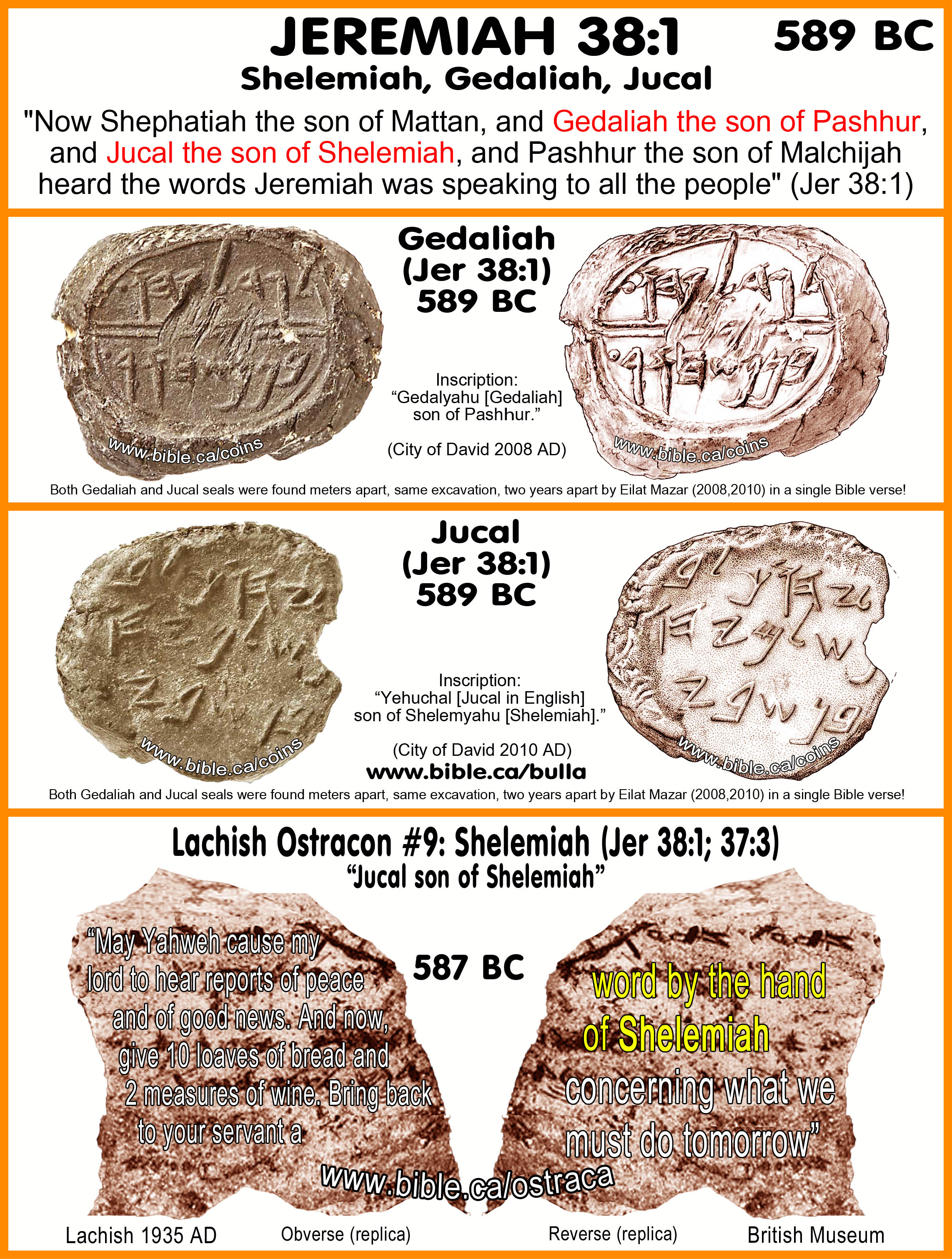
3. Bulla connected with Jeremiah 38:1; 37:3
|
Seal/Bulla |
Person mentioned in the Bible: |
|
Bulla of Gedaliah son of Immer Jer 20:1; 38:1 |
|
|
Seal of Shelemiah son of Shema Jer 38:1 |
|
|
Bulla of Jucal son of Shelemyahu son of Shovi Jer 37:3; 38:1 |
|
|
Bulla of Gedaliah son of Pashhur Jer 38:1 |
|
|
Seal of Malchijah son of king Jer 38:6 |
A. Chronological Bible reading during [Tishri] September 589-588 BC:
1. 17 January 588 (12 Tebeth) Ezek 29:1-16: FIRST prophecy against Egypt
2. The book of Joel written during the two year siege
3. Summer 588 BC: Jeremiah 32: Sign Act: Jeremiah buys a field in Anathoth from prison
B. Messianic prophecy:
1. Prophecy of the church on Pentecost: "“It will come about after this That I will pour out My Spirit on all mankind; And your sons and daughters will prophesy, Your old men will dream dreams, Your young men will see visions." (Joel 2:28)
C. Notable quotables: 589/588 BC
1. Newly appointed Pharaoh Hophra (after his father Psamtik II died) would also die because Egypt was a weak and false confidence of Judah and Zedekiah:
a. "“Son of man, set your face against Pharaoh king of Egypt and prophesy against him and against all Egypt." (Ezekiel 29:2)
b. "“Then all the inhabitants of Egypt will know that I am the Lord, Because they have been only a staff made of reed to the house of Israel." (Ezekiel 29:6)
c. "And it will never again be the confidence of the house of Israel, bringing to mind the iniquity of their having turned to Egypt. Then they will know that I am the Lord God." (Ezekiel 29:16)
2. "“Behold, I am the Lord, the God of all flesh; is anything too difficult for Me?”" (Jeremiah 32:27)
3. "Indeed this city has been to Me a provocation of My anger and My wrath from the day that they built it, even to this day, so that it should be removed from before My face, because of all the evil of the sons of Israel and the sons of Judah which they have done to provoke Me to anger—they, their kings, their leaders, their priests, their prophets, the men of Judah and the inhabitants of Jerusalem." (Jeremiah 32:31–32)
|
Fall 589 BC |
Psamtik II dies according to prophecy Pharaoh Hophra (Apries) 589-570 BC becomes king in his place Ezekiel 17:7-10; 29:1-16, Herodotus (425 BC), Demotic Papyri (414 BC) |
A. 589 BC: Psamtik II finally dies after withering away on a sick bed fulfilling the prophecy of Ezekiel
1. "Will it [eagle, Psamtik II, Egypt] thrive? Will he not pull up its roots and cut off its fruit, so that it withers—so that all its sprouting leaves wither? And neither by great strength nor by many people can it be raised from its roots again. “Behold, though it is planted, will it thrive? Will it not completely wither as soon as the east wind strikes it—wither on the beds where it grew?" (Ezekiel 17:7-10)
2. Fulfilling Ezekiel 17:7-10 Psamtik II gets sick and is bedridden until he finally dies.
3. Hophra, the son of Psamtik II was likely co-regent or already functioning as king while his bed lay bedridden.
B. Two Archeological confirmations of the Ezekiel 17:7-10 prophecy:
1. Herodotus: "Psammis [Psammetichus II] reigned over Egypt for only six years; he invaded Ethiopia, and immediately thereafter died, and Apries the son of Psammis reigned in his place." (Herodotus, Hist. 2.160.1, 425 BC)
2. Demotic Papyri: 414 BC:
|
Demotic Papyri (414 BC) |
|
|
“Destruction! Pharaoh is sick Pharaoh can’t come out. Pharaoh Psammetk Nefrebre has died” (Catalogue of the Demotic Papyri in the John Rylands library, F. Griffith, Francis Llewellyn, Papyrus IX, Column 16, lines 8-9, 14, 1909 AD) |
|
|
Fall 589 BC |
Pharaoh Hophra (Apries) 589-570 BC becomes king in his place Jeremiah 44:30; Jeremiah 37:5 |
1. Pharaoh Psammetichus II (Psamtik II) II dies shortly after he sends his army to defend Jerusalem (Jeremiah 37:5-7).
a. Hophra was the crown prince like Nebuchadnezzar in 605 BC and Titus in AD 70, all of whom were recalled back to Egypt, Babylon, Rome, to claim the throne and become king.
b. Pharaoh Psammetichus II (Psamtik II) II sends his son Hophra to lead the Egyptian army to defend Jerusalem (Jeremiah 37:5-7).
c. Psamtik II is bedridden and dies in Egypt, while his son Hophra fights in Judea against Babylon.
a.
Pharaoh Hophra (Apries) 589-570 BC, succeeds his father Psamtik II who
dies
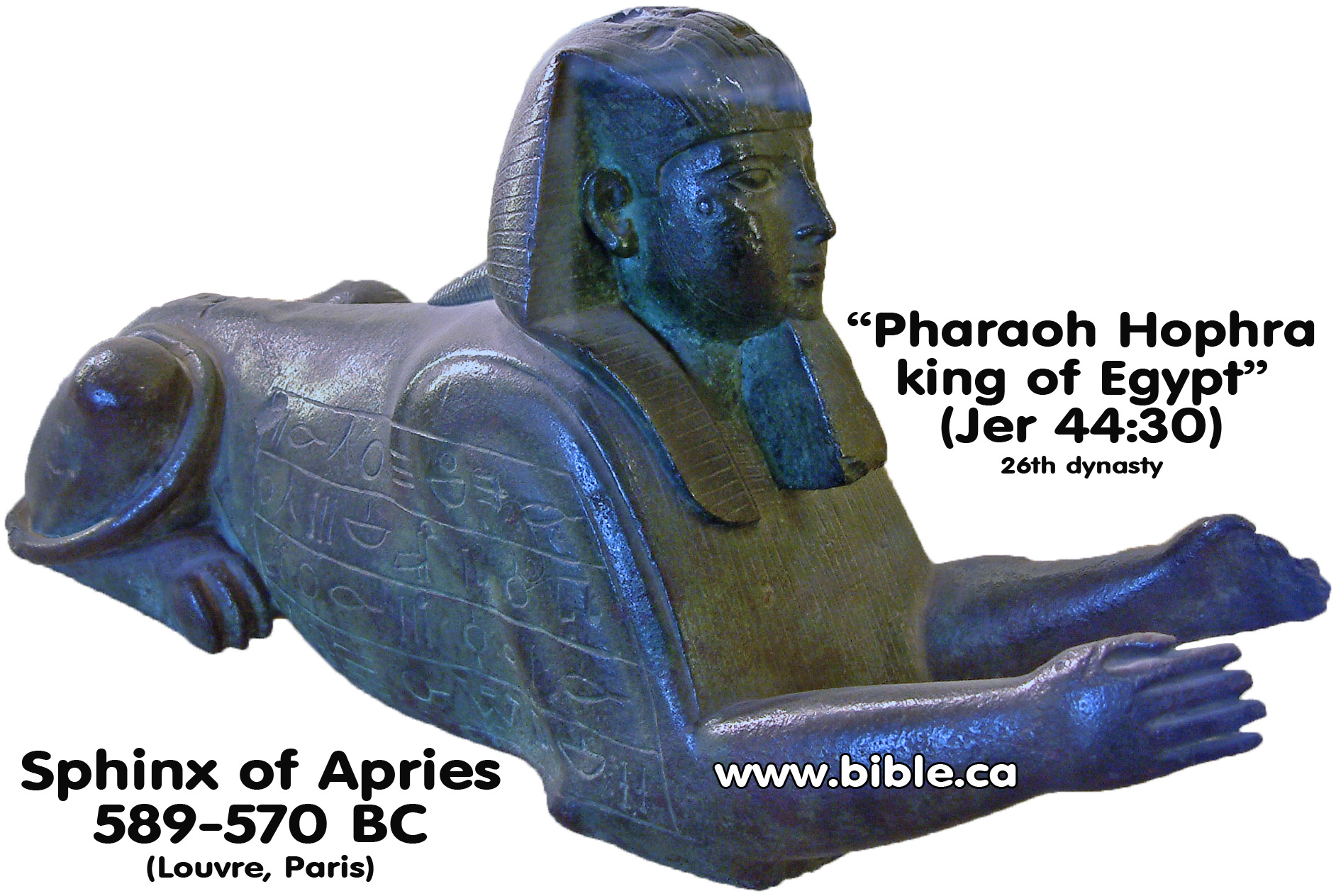
a. After the Jerusalem temple is burned, God prophesied against Hophra: "“Thus says the Lord, ‘Behold, I am going to give over Pharaoh Hophra king of Egypt to the hand of his enemies, to the hand of those who seek his life, just as I gave over Zedekiah king of Judah to the hand of Nebuchadnezzar king of Babylon, who was his enemy and was seeking his life.’ ”" (Jeremiah 44:30)
3. Archeology of Hophra:
|
Archeology of Hophra: · A stele records defeat of Apries by his successor pharaoh Amoses II (Amasis) in the Cairo Museum · A stele depicts Hophra making offering to gods. · His palace has been found at Memphis · A vase has a painting of Apries’ head and name in hieroglyphics
|
|
Monday 17th Jan 588 BC (12 Tebeth) |
First prophecy against Egypt (Hophra) Ezek 29:1-16 |
1. Prophecy:
a. "In the tenth year, in the tenth month, on the twelfth of the month, the word of the Lord came to me saying, “Son of man, set your face against Pharaoh king of Egypt and prophesy against him and against all Egypt." (Ezekiel 29:1-2)
b. "“So I will make the land of Egypt a desolation in the midst of desolated lands. And her cities, in the midst of cities that are laid waste, will be desolate forty years; and I will scatter the Egyptians among the nations and disperse them among the lands.” ‘For thus says the Lord God, “At the end of forty years I will gather the Egyptians from the peoples among whom they were scattered. “I will turn the fortunes of Egypt and make them return to the land of Pathros, to the land of their origin, and there they will be a lowly kingdom. “It will be the lowest of the kingdoms, and it will never again lift itself up above the nations. And I will make them so small that they will not rule over the nations. “And it will never again be the confidence of the house of Israel, bringing to mind the iniquity of their having turned to Egypt. Then they will know that I am the Lord God.”" (Ezekiel 29:12-16)
|
Summer 588 BC |
Book of Joel Messianic hope at a time of darkness and destruction |
|
Outline of Joel: Date: 588 BC During the 2 year siege of Nebuchadnezzar on Jerusalem Theme: The Messiah will replace Solomon’s physical Temple. It is exactly 1000 years from the founding of the temple to the church (966 BC – AD 33 = 1000 years) Joel 1: Jerusalem temple will be destroyed: v9,13-14,16; 2:17 Joel 2:1-17: Day of the Lord (destruction/Judgement) coming to Jerusalem and temple. Babylon is “God’s army” v11, 20. Joel 2:18-27: Physical restoration after 70 year captivity in 536 BC. Joel 2:27-32: Salvation in the messiah and the church on Pentecost AD 33: Acts 2:17ff Joel 3:1-21: A mix of messianic and physical restoration. Nations who assisted Babylon in the destruction of Judah in 605-587 BC will be judged: 1. Tyre and Sidon for selling Hebrews as slaves and putting Judean gold in their pagan temples 2. Egypt 3. Edom who were violent toward their brother Judah and burned Solomon’s temple. |
|
Summer 588 BC |
Jeremiah from Jail predicts certain defeat to Zedekiah Jeremiah 32 |
a. "The word that came to Jeremiah from the Lord in the tenth year of Zedekiah king of Judah, which was the eighteenth year of Nebuchadnezzar. Now at that time the army of the king of Babylon was besieging Jerusalem, and Jeremiah the prophet was shut up in the court of the guard, which was in the house of the king of Judah, because Zedekiah king of Judah had shut him up, saying, “Why do you prophesy, saying, ‘Thus says the Lord, “Behold, I am about to give this city into the hand of the king of Babylon, and he will take it; and Zedekiah king of Judah will not escape out of the hand of the Chaldeans, but he will surely be given into the hand of the king of Babylon, and he will speak with him face to face and see him eye to eye; and he will take Zedekiah to Babylon, and he will be there until I visit [ie. kill] him,” declares the Lord. “If you fight against the Chaldeans, you will not succeed” ’?”" (Jeremiah 32:1-5)
|
Summer 588 BC |
Jeremiah buys a field in Anathoth from prison Jeremiah 32 |
1. Sign Act in 588 BC (Jer 32:6-15) Jeremiah purchases a parcel of land to signify that, in the future, fields would once again be bought and sold by the Judahites.
2. "And Jeremiah said, “The word of the Lord came to me, saying, ‘Behold, Hanamel the son of Shallum your uncle is coming to you, saying, “Buy for yourself my field which is at Anathoth, for you have the right of redemption to buy it.” ’ “Then Hanamel my uncle’s son came to me in the court of the guard according to the word of the Lord and said to me, ‘Buy my field, please, that is at Anathoth, which is in the land of Benjamin; for you have the right of possession and the redemption is yours; buy it for yourself.’ Then I knew that this was the word of the Lord. “I bought the field which was at Anathoth from Hanamel my uncle’s son, and I weighed out the silver for him, seventeen shekels of silver. “I signed and sealed the deed, and called in witnesses, and weighed out the silver on the scales. “Then I took the deeds of purchase, both the sealed copy containing the terms and conditions and the open copy; and I gave the deed of purchase to Baruch the son of Neriah, the son of Mahseiah, in the sight of Hanamel my uncle’s son and in the sight of the witnesses who signed the deed of purchase, before all the Jews who were sitting in the court of the guard. “And I commanded Baruch in their presence, saying, ‘Thus says the Lord of hosts, the God of Israel, “Take these deeds, this sealed deed of purchase and this open deed, and put them in an earthenware jar, that they may last a long time.” ‘For thus says the Lord of hosts, the God of Israel, “Houses and fields and vineyards will again be bought in this land.” ’" (Jeremiah 32:6-15)
a. See also: Creation of legal documents sealed with string and bulla.
b. Notice two copies were made, one that was sealed and placed in a vault and the second was located in room outside the vault for anyone to look inside.
c.
If anyone disputed the outside copy differed from the copy in the vault,
they would unseal the copy in the vault.

3.
Location of the Levitical city of Anathoth is at the archeological site
of Ras el-Kharrubeh
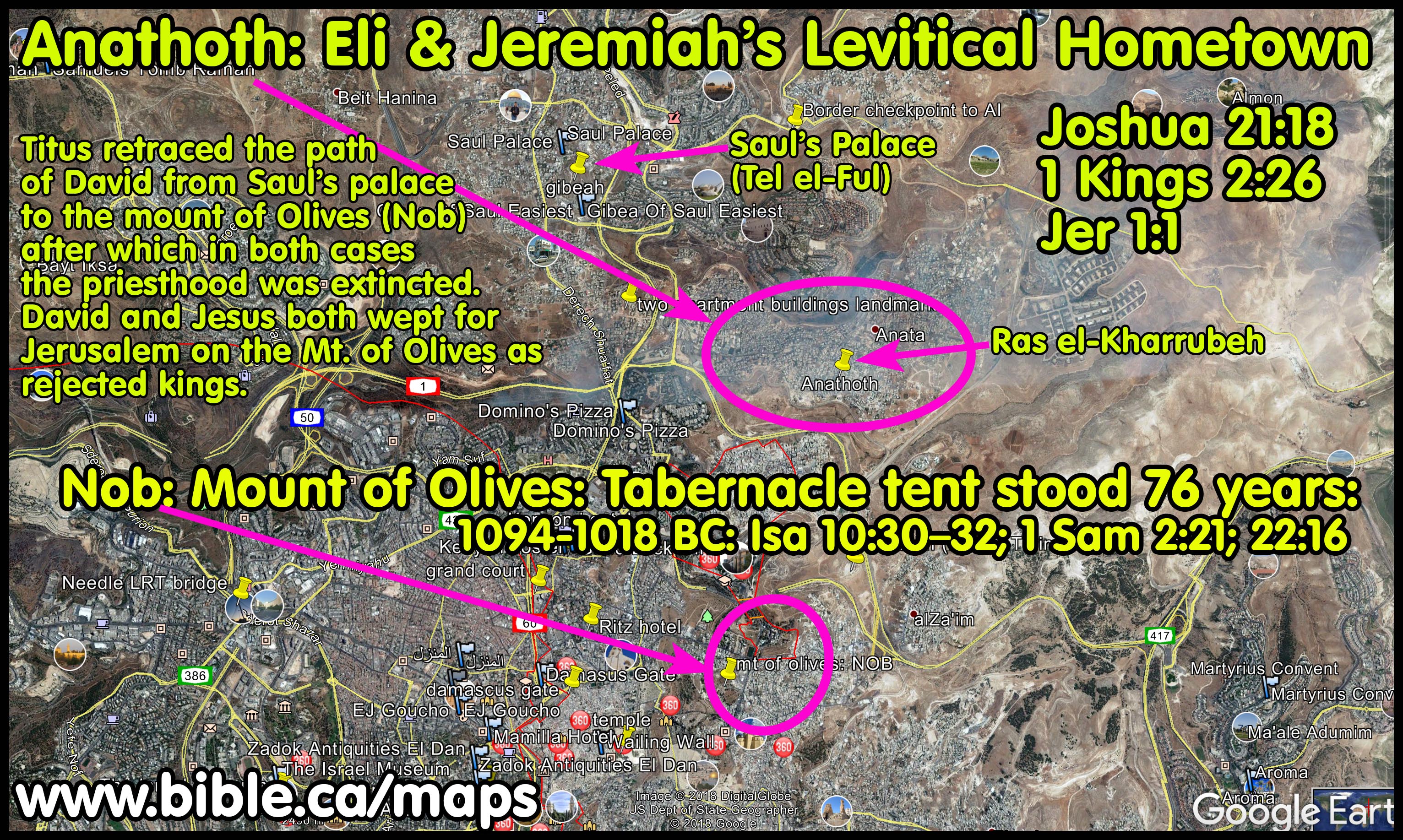
a. Anathoth is the Levitical home town of the Ithamar division of the priesthood that included Eli and Jeremiah. It is located at Ras el-Kharrubeh and can be found directly north of modern “French Hill” on the hill where highway 1 runs between the two hills. You can see Anathoth on the left side (north) of Highway 1 when you are travelling towards the Salt Sea (east) at the spot it makes a 90 degree turn south. The city of Nob was located at the Mount of Olives just 2.5 km south west of Anathoth. After the destruction of Shiloh, Nob is where the tabernacle tent had stood for 76 years from 1094 to 1018 BC.
i. David fled Saul from his palace at Gibeah (Tel el-Ful) to Nob (Mount of Olives) and ate the showbread then Saul slaughtered the priests shortly thereafter.
ii. It is also noteworthy that when Absalom usurped David and captured Jerusalem that David wept on the Mount of Olives. (2 Samuel 15:30) Jesus, the true and rightful King of Jerusalem, was usurped and arrested on the mount of Olives. Like David, Jesus also wept on the mount of Olives for Jerusalem as a rejected king and He proclaimed its destruction in Mt 24 and Luke 21:20.
iii. In Ezekiel 11:23 God also stands on the Mount of Olives in 587 BC when Jerusalem was destroyed by Nebuchadnezzar. In Zechariah 14:4 (written in 520 BC) God would destroy Jerusalem while standing on the Mount of Olives through Titus.
iv. Remarkably, Titus retraced David’s path from Saul’s palace (Gibeah of Saul, “Hill of Saul”, Josephus Wars 5.51) to the Mount of Olives on 7th March AD 70 (Josephus Wars 5.70) where he set up his troops and thereafter killed the priests and burned the temple on 6th August AD 70
b. Anathoth is first mentioned at the time of Joshua meaning we should find late bronze pottery:
i. "Anathoth with its pasture lands." (Joshua 21:18)
ii. Notice the location is associated with grazing fields for animals.
c. “Ras el-Kharrubeh is a hill 4.5 km NE of Jerusalem. A low valley and several small hills lie between Ras el-Khar-rubeh and the ridge which the Mount of Olives occupies. Wadi Farah with its steep, rocky sides is the nearest water supply to Ras el-Kharrubeh. Neither Ras el-Kharrubeh nor Anata lies on a major highway, but they are within 3 km of the main road from Jerusalem to Shechem and near the junction of the “Way of Beth Horons.” The early historians who identified biblical Anathoth all associated the site with Anata. Josephus (Ant 10 §114) identified Anathoth as the home of Jeremiah “which is twenty stades distant from Jerusalem.” Eusebius (Onomast. 26.27–29) placed Anathoth 3 miles N of Jerusalem in the tribe of Benjamin. Many pilgrims—including Burchard of Mt. Zion, Marino Santo, John Poloner, and Brother Felix—visited biblical Anathoth during the time of the Crusades. Following the Crusades, the site is not mentioned again until the last century, when E. Robinson also identified ancient Anathoth with Anata. The French geographer M. V. Guérin (1869: 76–79) was the first person to record a visit to Ras el-Kharrubeh. The most important archaeological work at Anata and Ras el-Kharrubeh was done over fifty years ago by E. P. Blair and A. Bergman (Biran). This work was initiated because Alt had earlier suggested that OT Anathoth was initially at Ras el-Kharrubeh but was moved to Anata after the exile. Blair was given the responsibility of conducting soundings at Anata. As he walked the surface, he was convinced there was not enough debris to indicate that an ancient settlement had occupied this site. His five probes supported that observation, yielding only Arabic, Byzantine, Hellenistic, and Roman deposits (Blair 1936). Because there were no pre-Hellenistic remains, Blair concluded that Alt’s views were correct. Biran’s survey at Ras el-Kharrubeh identified pottery from Iron I to Byzantine (Bergman 1936). Out of two probes a few sherds were found from the end of Iron I, some from Iron II, and a few more from the Persian-Hellenistic and Roman periods. Biran concluded that the site was occupied from about the 9th century to Byzantine times. The settlement reached its peak in Iron II (between 800 and 600 B.C.), although it continued to exist in Persian-Hellenistic times, finally coming to an end in the Byzantine period. As a result of the work done by Blair and Biran, the identification of Ras el-Kharrubeh with Anathoth is universally accepted among Israeli, European, and American archaeologists. There was no subsequent archaeological work at either Anata or Ras el-Kharrubeh until the Levitical City survey team visited the two sites in 1971. At Anata, all the sherds found were Arab and Byzantine (as Blair had observed), with the exception of one possible Iron II sherd. At Ras el-Kharrubeh there was an abundance of pottery dating from Iron II as well as Hellenistic, Roman, and Byzantine periods. The earliest sherd from Iron II was from the 9th century, and the 8th century had the most impressive amount. The Levitical City survey work at Ras-Kharrubeh and Anata supports the original claims of Alt (Peterson 1977: 409–26). At these two sites we have another example of an Iron Age/Persian city shifting locations during the Hellenistic and Roman periods. During the Iron Age the biblical city of Anathoth was located at Ras el-Kharrubeh, but during the Hellenistic-Roman periods it was relocated down the valley to the village that today bears its name.” (ABD, Anathoth)
A. Chronological Bible reading during [Tishri] September 588-587 BC:
1. 1st Tishri: Thursday, 29 Sept 588 BC: Jeremiah 34:8-22 Sabbatical year: Zedekiah releases slaves to appease God in the first day of the new year.
2. Oct 588- April 587 (Tishri 588 - Nisan 587 BC): Jeremiah 37:5-8; 44:30. Nebuchadnezzar withdraws troops in response to Zedekiah releasing slaves.
3. Jan 587: Jeremiah 34:11-18: Zedekiah recants and takes back all the slaves, God condemns, and orders Nebuchadnezzar back to Jerusalem to destroy it.
4. Saturday 29 April 587 (7 Nisan) Ezek 30:20-26: SECOND prophecy against Egypt
5. Wednesday 21 June 587 (1 Sivan) Ezek 31: THIRD prophecy against Pharaoh of Egypt
6. Sat. 29 July 587 BC (9 Tammuz):
a. Jeremiah 39:2-7; 52:5-11; 2 Kings 25:2-7; Ezek 33:21; 40:1; Josephus Ant. 10.135-141: Zedekiah captured, taken to Riblah, blinded, deported to Babylon
b. 2 Kings 25:22-26; Jeremiah 40:13-14: Gedaliah appointed Governor by Nebuchadnezzar (July - September 587 BC)
7 Monday 18 Sept 587 (1 Elul) Ezek 26-28:19 Prophecy against Tyre
8 587 BC: (before 10 Av) Jeremiah Chapters 21-23, Chapters 33-34: Jeremiah’s message to Zedekiah and Jerusalem
9 587 BC: Jeremiah 39:16-18, Chapter 22 (Historical narrative): Zedekiah captured, taken to Riblah, blinded, deported to Babylon and executed.
10 587 BC (before 10 Av): Jeremiah 39:19-40:16 Gedaliah appointed Governor
11 Monday 28th August 587 BC (10th Av) Jeremiah 52:12-13; 1 Esdras 4:45: Solomon’s temple burned and destroyed by Edomites and Babylonians
12. September 587 BC:
a. Jeremiah 39:11-14; 40:1-6: Jeremiah freed at Ramah
b. Jeremiah 41: Gedaliah assassinated
B. Messianic prophecy: None.
C. Notable quotables: 588/587 BC
1. Note: Type of the great judgement before God at the end of time and going to hell: "‘You will not escape from his hand, for you will surely be captured and delivered into his hand; and you will see the king of Babylon eye to eye, and he will speak with you face to face, and you will go to Babylon.’ ” ’" (Jeremiah 34:3)
2. Note: This verse is validated in Lachish ostraca #4 (see below): "when the army of the king of Babylon was fighting against Jerusalem and against all the remaining cities of Judah, that is, Lachish and Azekah, for they alone remained as fortified cities among the cities of Judah." (Jeremiah 34:7)
3. Note: This shows that 588 BC was a sabbatical year: "The word which came to Jeremiah from the Lord after King Zedekiah had made a covenant with all the people who were in Jerusalem to proclaim release to them:" (Jeremiah 34:8)
4. Note: this prophecy was literally fulfilled : "‘They will destroy the walls of Tyre and break down her towers; and I will scrape her debris from her and make her a bare rock. ‘She will be a place for the spreading of nets in the midst of the sea, for I have spoken,’ declares the Lord God, ‘and she will become spoil for the nations." (Ezekiel 26:4–5)
|
1st Tishri: Thursday, 29 Sept 588 BC |
Terrified Zedekiah releases slaves on Sabbatical year Jeremiah 34:8-22 |
1. Jeremiah had predicted certain destruction to Jerusalem and Zedekiah while Nebuchadnezzar is attaching the city:
a. "“Thus says the Lord God of Israel, ‘Go and speak to Zedekiah king of Judah and say to him: “Thus says the Lord, ‘Behold, I am giving this city into the hand of the king of Babylon, and he will burn it with fire. ‘You will not escape from his hand, for you will surely be captured and delivered into his hand; and you will see the king of Babylon eye to eye, and he will speak with you face to face, and you will go to Babylon.’ ” ’" (Jeremiah 34:2-3)
b. This ominous prophecy must have finally convinced Zedekiah he was in trouble and his only choice was to obey God.
2. A desperate Zedekiah decides to play the game of "balance scale salvation" and do some good so God will bless him.
c. Thursday, 29 Sept 588 BC, (a Sabbatical year: Deut 15) 1 Tishri 589/588, Zedekiah released all the slaves.
d. “If you buy a Hebrew slave, he shall serve for six years; but on the seventh he shall go out as a free man without payment." (Exodus 21:2)
e. "The word which came to Jeremiah from the LORD after King Zedekiah had made a covenant with all the people who were in Jerusalem to proclaim release to them: that each man should set free his male servant and each man his female servant, a Hebrew man or a Hebrew woman; so that no one should keep them, a Jew his brother, in bondage. And all the officials and all the people obeyed who had entered into the covenant that each man should set free his male servant and each man his female servant, so that no one should keep them any longer in bondage; they obeyed, and set them free. But afterward they turned around and took back the male servants and the female servants whom they had set free, and brought them into subjection for male servants and for female servants. Then the word of the LORD came to Jeremiah from the LORD, saying, “Thus says the LORD God of Israel, ‘I made a covenant with your forefathers in the day that I brought them out of the land of Egypt, from the house of bondage, saying, “At the end of seven years each of you shall set free his Hebrew brother who has been sold to you and has served you six years, you shall send him out free from you; but your forefathers did not obey Me or incline their ear to Me. “Although recently you had turned and done what is right in My sight, each man proclaiming release to his neighbor, and you had made a covenant before Me in the house which is called by My name. “Yet you turned and profaned My name, and each man took back his male servant and each man his female servant whom you had set free according to their desire, and you brought them into subjection to be your male servants and female servants.” ’" (Jeremiah 34:8-16)
f. This act of righteousness caused God to order Nebuchadnezzar to stop attacking the city.
g. However, to Zedekiah, he would put his trust in the Egyptian armies rather than the power of God.
|
Oct 588- April 587 (Tishri 588 - Nisan 587 BC) |
Nebuchadnezzar withdraws from Jerusalem to fight Hophra Hophra sends troops to Judea, but the withdraws: Jeremiah 37:5-8; 44:30 |
1. Nebuchadnezzar withdraws from attacking Jerusalem to attack the Egyptian Army but returns quickly when Hophra withdraws:
a. "Meanwhile, Pharaoh’s [Hophra] army had set out from Egypt; and when the Chaldeans who had been besieging Jerusalem heard the report about them, they lifted the siege from Jerusalem. Then the word of the Lord came to Jeremiah the prophet, saying, “Thus says the Lord God of Israel, ‘Thus you are to say to the king of Judah, who sent you to Me to inquire of Me: “Behold, Pharaoh’s army which has come out for your assistance is going to return to its own land of Egypt. “The Chaldeans will also return and fight against this city, and they will capture it and burn it with fire.” ’" (Jeremiah 37:5-8, 589 BC)
b. Although new Pharaoh Hophra had promised to continue his father’s policy of fighting for Zedekiah against Babylon, he withdrew JUST AS JEREMIAH HAS PROPHESIED.
2. The Babylonians stop the siege of Jerusalem they redirect their attack on Pharaoh's approaching army. (Ezek 29:1-16; 30:20-26; 31:1-18)
a. Hophra either returned to claim the throne after the death of his father or wisely calls the attack off. Hophra withdraws from defending Judea and returns to Egypt.
b. Nebuchadnezzar's withdrawal of sieging Jerusalem then returning to destroy the city is an anti-typical echo of when on Nov 10, AD 66, Roman Syrian Governor Cestius Gallus, withdraws his armies secretly to Antipatris and stops attacking Jerusalem, allowing the Christians to flee in obedience to Jesus in Luke 21:20.
c. The former provided the opportunity for Zedekiah to surrender Nebuchadnezzar, sparing the city and the later provided an opportunity for the Christians to escape the city from Titus. (Lk 21:20)
3. Quick summary of First Jewish War:
a. Jerusalem Passover, Monday 28th April AD 66 (Wars 2.280) The war started in the mind of Roman appointed governor of Judea, Florus on Passover, when the Jews complained bitterly about his treachery to Syrian governor Cestius.
b. 17th May AD 66: Florus travels immediately down to Caesarea and deliberately pollutes a Jewish synagogue on the Sabbath of. The uprising spreads to Jerusalem.
c. Tuesday 6th Aug 66 The war to Liberate Jerusalem begins on the festival of Xylophory on Tuesday 6th Aug 66 [15th Ab] It is nothing short of incredible that the beginning of the destruction of Jerusalem by fire was by Jews who used the wood donated during the festival of Xylophory for the Altar of Burnt offerings in the temple. Talk about creating their own “literal Holocaust” with the wood used for the Jewish temple Altar!
d. Jerusalem Liberated 15th September AD 66: Wars 2.433-440] Manahem surrounds Jerusalem with his armies fulfilling Lk 21:20. This is when the Christians fled Jerusalem.
e. Late September AD 66: Herod Agrippa II sends Syrian Governor Cestius and his Roman army to set up camp 6 miles outside Jerusalem to attempt to restore peace but the Jews attack and repel the Roman army. (Wars 2.516)
f. October AD 66: Agrippa sent two ambassadors named Phebus and Borceus to apologize to the Jews of the city in an effort to end the war. The Jews killed Phebus and wounded Borceus who escaped the city. (Wars 2.521)
g. Nov 3, AD 66 While the Jews in the city were in a state of disorganization, Syrian Governor Cestius Gallus sets up his army on mount Scopus, 1 km from the temple mount but did not attack for three full days to see if the deliberate pause in the fighting might cause the Jews to calm down and stop the war. (Wars 2.528)
h. About Nov 10, AD 66: Roman Syrian Governor Cestius Gallus, withdraws his armies secretly to Antipatris and stops attacking Jerusalem: The Romans begin attacking the city walls but Cestius devised a trick to secretly retreat his army to Antipatris. (Wars 2.551). The Jews took possession of many mechanical war machines like the Ballista (see below for photo), that the Roman’s left behind. (Wars 2.554).This was likely when most of the Christians fled the city. While the Jews would have felt safe, the Christians would have likely fled now.
i. December AD 66 Nero sends Vespasian to destroy Jerusalem: “So Nero esteemed these circumstances as favorable omens, and saw that Vespasian’s age gave him sure experience, and great skill, and that he had his sons as hostages for his fidelity to himself, and that the flourishing age they were in would make them fit instruments under their father’s prudence. Perhaps also there was some interposition of Providence, which was paving the way for Vespasian’s being himself emperor afterwards. (7) Upon the whole he sent this man to take upon him the command of the armies that were in Syria; but this not without great encomiums and flattering compellations, such as necessity required, and such as might mollify him into complaisance. (8) So Vespasian sent his son Titus from Achaia, where he had been with Nero, to Alexandria, to bring back with him from thence the fifth and tenth legions, while he himself, when he had passed over the Hellespont, came by land into Syria, where he gathered together, the Roman forces, with a considerable number of auxiliaries from the kings in that neighborhood.” (Josephus Wars 3.6-8)
j. Titus arrives to destroy Jerusalem: 7th March AD 70
k. 6th August AD 70: Temple burned.
4. “Thus says the Lord, ‘Behold, I am going to give over Pharaoh Hophra king of Egypt to the hand of his enemies, to the hand of those who seek his life, just as I gave over Zedekiah king of Judah to the hand of Nebuchadnezzar king of Babylon, who was his enemy and was seeking his life.’ ”" (Jeremiah 44:30)
|
Jan 587 |
Zedekiah recants and takes back all the slaves, God condemns, and orders Nebuchadnezzar back to Jerusalem to destroy it. Zedekiah took the slaves back so he will become a slave of Babylon! Jeremiah 34:11-18 |
1. "But afterward they turned around and took back the male servants and the female servants whom they had set free, and brought them into subjection for male servants and for female servants. Then the word of the Lord came to Jeremiah from the Lord, saying, “Thus says the Lord God of Israel, ‘I made a covenant with your forefathers in the day that I brought them out of the land of Egypt, from the house of bondage, saying, “At the end of seven years each of you shall set free his Hebrew brother who has been sold to you and has served you six years, you shall send him out free from you; but your forefathers did not obey Me or incline their ear to Me. “Although recently you had turned and done what is right in My sight, each man proclaiming release to his neighbor, and you had made a covenant before Me in the house which is called by My name. “Yet you turned and profaned My name, and each man took back his male servant and each man his female servant whom you had set free according to their desire, and you brought them into subjection to be your male servants and female servants.” ’ “Therefore thus says the Lord, ‘You have not obeyed Me in proclaiming release each man to his brother and each man to his neighbor. Behold, I am proclaiming a release to you,’ declares the Lord, ‘to the sword, to the pestilence and to the famine; and I will make you a terror to all the kingdoms of the earth." (Jeremiah 34:11-17)
2. Zedekiah recants on his vow and takes back all the released slaves:
a. When Zedekiah saw the Babylonians had withdrawn, he later recants and takes back the slaves in violation of his oaths.
b. Zedekiah wrongly put his trust in the Egyptian armies rather than the power of God.
c. A worthless fox hole repentance kind of gesture. (Jeremiah 34:6-22)
d. This is the last straw and God decides destruction and God orders Nebuchadnezzar to return to fight Jerusalem.
3. Because Zedekiah did not release the slave, God will “release” him to Nebuchadnezzar into slavery!
a. Jeremiah condemns them to slavery in Babylon:
b. Jeremiah uses and allegory about the slaves who were set free and then made slaves again against Judah.
c. Jeremiah's allegory is this: Just as Nebuchadnezzar had captured Jerusalem in 605 and 597 BC then set her free afterwards both times, now they are doomed to die slaves. All this because they had violated God's command to set their own slaves free.
d. This allegory is parabolic and reminds us of the way Jesus taught in the New Testament in parables.
4. God orders Nebuchadnezzar to return and attack Jerusalem:
a. "‘Zedekiah king of Judah and his officials I will give into the hand of their enemies and into the hand of those who seek their life, and into the hand of the army of the king of Babylon which has gone away from you. ‘Behold, I am going to command,’ declares the Lord, ‘and I will bring them back to this city; and they will fight against it and take it and burn it with fire; and I will make the cities of Judah a desolation without inhabitant.’ ”" (Jeremiah 34:21-22)
|
Feb 587 BC |
“Is not that what it means to know Me?” (Jer 22:16) Jeremiah condemns Zedekiah for moral crimes and greed |
1. Before 10 Av: Jeremiah chapters 21-23,33-34; 39:16-18; Historical narrative: Jeremiah 22
2. "“Woe to him who builds his house without righteousness And his upper rooms without justice, Who uses his neighbor’s services without pay And does not give him his wages, Who says, ‘I will build myself a roomy house With spacious upper rooms, And cut out its windows, Paneling it with cedar and painting it bright red.’ “Do you become a king because you are competing in cedar? Did not your father eat and drink And do justice and righteousness? Then it was well with him. “He pled the cause of the afflicted and needy; Then it was well. Is not that what it means to know Me?” Declares the Lord. “But your eyes and your heart Are intent only upon your own dishonest gain, And on shedding innocent blood And on practicing oppression and extortion.”" (Jeremiah 22:13-17)
|
587 BC |
Jeremiah’s message to Zedekiah and Jerusalem Jeremiah Chapters 21-23, Chapters 33-34 |
|
Spring 587 BC |
Zedekiah condemned while Nebuchadnezzar attacks cities of Judah Jeremiah 34:6-7 |
1. Again, Jeremiah predicts certain defeat to Zedekiah:
a. "The word which came to Jeremiah from the Lord, when Nebuchadnezzar king of Babylon and all his army, with all the kingdoms of the earth that were under his dominion and all the peoples, were fighting against Jerusalem and against all its cities, saying, “Thus says the Lord God of Israel, ‘Go and speak to Zedekiah king of Judah and say to him: “Thus says the Lord, ‘Behold, I am giving this city into the hand of the king of Babylon, and he will burn it with fire. ‘You will not escape from his hand, for you will surely be captured and delivered into his hand; and you will see the king of Babylon eye to eye, and he will speak with you face to face, and you will go to Babylon.’ ” ’" (Jeremiah 34:1-3)
2. Jeremiah says that if Zedekiah obeys God, he will not die, but live in peace:
a. "“Yet hear the word of the Lord, O Zedekiah king of Judah! Thus says the Lord concerning you, ‘You will not die by the sword. ‘You will die in peace; and as spices were burned for your fathers, the former kings who were before you, so they will burn spices for you; and they will lament for you, “Alas, lord!” ’ For I have spoken the word,” declares the Lord." (Jeremiah 34:4-5)
3. The bible says that the three remaining fortified cities of Judah were attacked: Jerusalem, Lachish, Azekah:
a. "Then Jeremiah the prophet spoke all these words to Zedekiah king of Judah in Jerusalem when the army of the king of Babylon was fighting against Jerusalem and against all the remaining cities of Judah, that is, Lachish and Azekah, for they alone remained as fortified cities among the cities of Judah." (Jeremiah 34:6-7)
3. The Lachish Ostraca directly confirm the Bible story.
a. Lachish Ostracon #16: “the prophet” Jeremiah, Uriah, Hananiah
b. Lachish
Ostracon #4:YHWH, Fire Signals of Azekah, Jer 34:6-7; 6:1
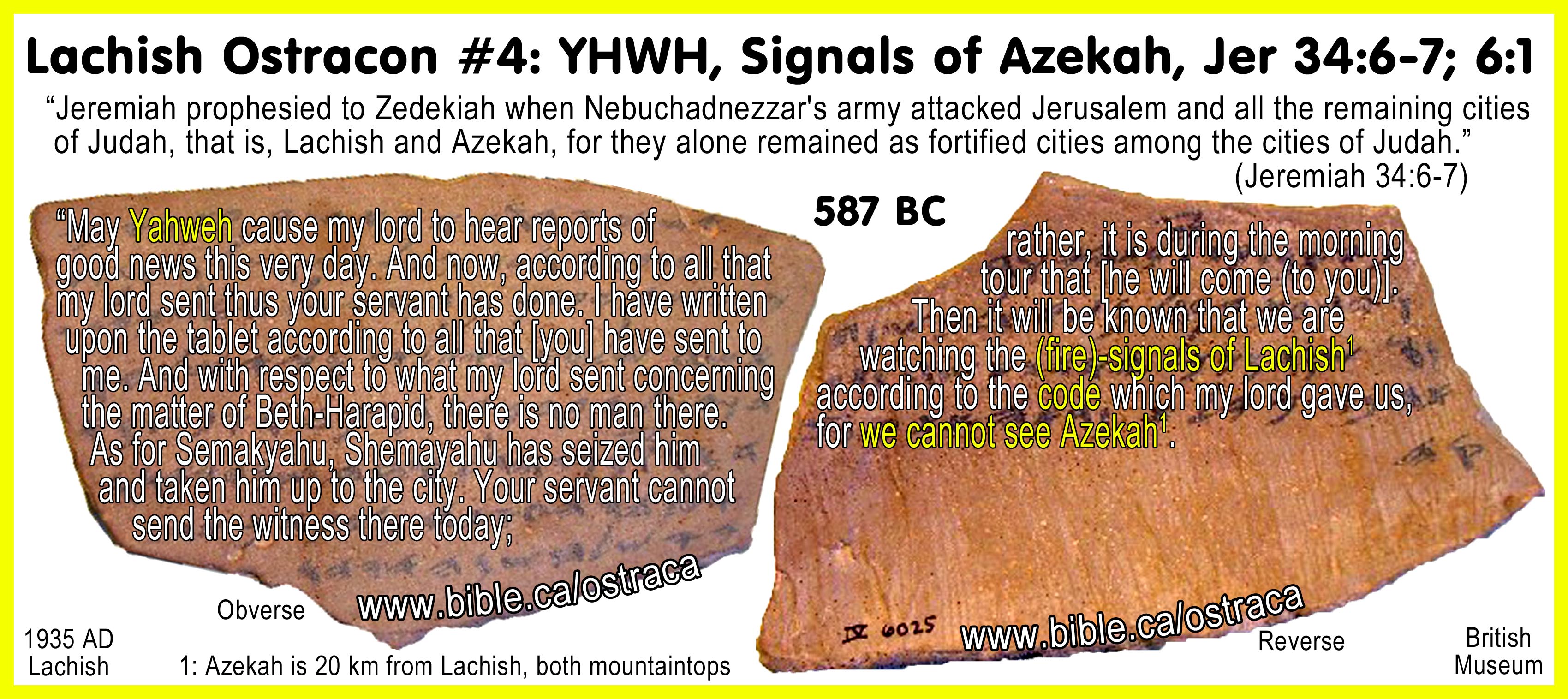
4. Fire signals were used on the tops of mountains in southern Judah at Azekah, Lachish etc.
a. The bible confirms that fire signals were used for communication at the same time:
b. "Flee for safety, O children of Benjamin, from the midst of Jerusalem! Blow the trumpet in Tekoa, and raise a [fire] signal on Beth-haccherem; for evil looms out of the north, and great destruction." (Jeremiah 6:1)
|
Sat 29 April 587 BC (7 Nisan) |
Nebuchadnezzar defeats Egypt (Hophra) Resumes attack on Jerusalem Jer 34:21-22; Ezek 30:20-21 |
1. Hophra is defeated and withdraws fulfilling the prophecy:
a. "Meanwhile, Pharaoh’s [Hophra] army had set out from Egypt; and when the Chaldeans who had been besieging Jerusalem heard the report about them, they lifted the siege from Jerusalem. Then the word of the Lord came to Jeremiah the prophet, saying, “Thus says the Lord God of Israel, ‘Thus you are to say to the king of Judah, who sent you to Me to inquire of Me: “Behold, Pharaoh’s army which has come out for your assistance is going to return to its own land of Egypt. “The Chaldeans will also return and fight against this city, and they will capture it and burn it with fire.” ’" (Jeremiah 37:5-8, 589 BC)
b. "In the eleventh year, in the first month, on the seventh of the month [Nisan], the word of the Lord came to me saying, “Son of man, I have broken the arm of Pharaoh king of Egypt; and, behold, it has not been bound up for healing or wrapped with a bandage, that it may be strong to hold the sword." (Ezekiel 30:20-21)
c. "‘Zedekiah king of Judah and his officials I will give into the hand of their enemies [Egypt] and into the hand of those who seek their life [Babylon], and into the hand of the army of the king of Babylon which has gone away [withdrawn] from you. ‘Behold, I am going to command,’ declares the Lord, ‘and I will bring them back to this city; and they will fight against it and take it and burn it with fire; and I will make the cities of Judah a desolation without inhabitant.’ ”" (Jeremiah 34:21-22)
2. Zedekiah is now defenseless and vulnerable but still doesn't surrender to Nebuchadnezzar.
|
Saturday Sat 29 April 587 BC (7th Nisan) |
SECOND prophecy against Egypt Ezek 30:20-26 |
1. "In the eleventh year, in the first month, on the seventh day of the month, the word of the Lord came to me: Mortal, I have broken the arm of Pharaoh king of Egypt; it has not been bound up for healing or wrapped with a bandage, so that it may become strong to wield the sword. Therefore thus says the Lord God: I am against Pharaoh king of Egypt, and will break his arms, both the strong arm and the one that was broken; and I will make the sword fall from his hand. I will scatter the Egyptians among the nations, and disperse them throughout the lands. I will strengthen the arms of the king of Babylon, and put my sword in his hand; but I will break the arms of Pharaoh, and he will groan before him with the groans of one mortally wounded. I will strengthen the arms of the king of Babylon, but the arms of Pharaoh shall fall. And they shall know that I am the Lord, when I put my sword into the hand of the king of Babylon. He shall stretch it out against the land of Egypt, and I will scatter the Egyptians among the nations and disperse them throughout the countries. Then they shall know that I am the Lord." (Ezekiel 30:20-26)
|
Wednesday 21 June 587 BC (1st Sivan) |
THIRD prophecy against Egypt Ezek 31 |
1. Prophecy:
a. "In the eleventh year, in the third month, on the first of the month, the word of the LORD came to me saying, “Son of man, say to Pharaoh king of Egypt and to his hordes, ‘Whom are you like in your greatness?" (Ezekiel 31:1-2)
b. "To which among the trees of Eden are you thus equal in glory and greatness? Yet you will be brought down with the trees of Eden to the earth beneath; you will lie in the midst of the uncircumcised, with those who were slain by the sword. So is Pharaoh and all his hordes!” ’ declares the Lord GOD.”" (Ezekiel 31:18)
|
Sat. 29 July 587 BC (9 Tammuz) |
Zedekiah captured, taken to Riblah, blinded, deported to Babylon Jeremiah 39:2-7; 52:5-11; 2 Kings 25:2-7; Ezek 33:21; 40:1; Josephus Ant. 10.135-141 |
1. Zedekiah the oath breaker: Zedekiah has sworn an oath to GOD to submit to Nebuchadnezzar which he broke:
c. What is incredible, is that the pagan Babylonian king made Zedekiah swear by the God of Israel!
d. When Zedekiah was captured, Nebuchadnezzar “passed judgement” on him: Here is how it probably went: “You swore and oath by the God of Judah, not my gods (Bel and Nebo) and you broke it.”
e. "He also rebelled against King Nebuchadnezzar who had made him swear allegiance by God. But he stiffened his neck and hardened his heart against turning to the Lord God of Israel." (2 Chronicles 36:13)
f. “Say now to the rebellious house, ‘Do you not know what these things mean?’ Say, ‘Behold, the king of Babylon came to Jerusalem, took its king and princes and brought them to him in Babylon. ‘He took one of the royal family and made a covenant with him, putting him under oath. He also took away the mighty of the land, that the kingdom might be in subjection, not exalting itself, but keeping his covenant that it might continue. ‘But he rebelled against him by sending his envoys to Egypt that they might give him horses and many troops. Will he succeed? Will he who does such things escape? Can he indeed break the covenant and escape? ‘As I live,’ declares the Lord God, ‘Surely in the country of the king who put him on the throne, whose oath he despised and whose covenant he broke, in Babylon he shall die." (Ezekiel 17:12-16)
2. Zedekiah fled the city THROUGH THE FORTIFIED SEWER CHANNEL to Jericho before the temple was burned but was captured:
a. "When Zedekiah the king of Judah and all the men of war saw them, they fled and went out of the city at night by way of the king’s garden through the gate between the two walls; and he went out toward the Arabah. But the army of the Chaldeans pursued them and overtook Zedekiah in the plains of Jericho; and they seized him and brought him up to Nebuchadnezzar king of Babylon at Riblah in the land of Hamath, and he passed sentence on him. Then the king of Babylon slew the sons of Zedekiah before his eyes at Riblah; the king of Babylon also slew all the nobles of Judah. He then blinded Zedekiah’s eyes and bound him in fetters of bronze to bring him to Babylon." (Jeremiah 39:4-7)
b. "So the city was under siege until the eleventh year of King Zedekiah. On the ninth day of the fourth month the famine was so severe in the city that there was no food for the people of the land. Then the city was broken into, and all the men of war fled and went forth from the city at night by way of the gate between the two walls which was by the king’s garden, though the Chaldeans were all around the city. And they went by way of the Arabah. But the army of the Chaldeans pursued the king and overtook Zedekiah in the plains of Jericho, and all his army was scattered from him. Then they captured the king and brought him up to the king of Babylon at Riblah in the land of Hamath, and he passed sentence on him. The king of Babylon slaughtered the sons of Zedekiah before his eyes, and he also slaughtered all the princes of Judah in Riblah. Then he blinded the eyes of Zedekiah; and the king of Babylon bound him with bronze fetters and brought him to Babylon and put him in prison until the day of his death." (Jeremiah 52:5-11)
c. "On the ninth day of the fourth month the famine was so severe in the city that there was no food for the people of the land. Then the city was broken into, and all the men of war fled by night by way of the gate between the two walls beside the king’s garden, though the Chaldeans were all around the city. And they went by way of the Arabah. But the army of the Chaldeans pursued the king and overtook him in the plains of Jericho and all his army was scattered from him. Then they captured the king and brought him to the king of Babylon at Riblah, and he passed sentence on him. They slaughtered the sons of Zedekiah before his eyes, then put out the eyes of Zedekiah and bound him with bronze fetters and brought him to Babylon." (2 Kings 25:3-7)
3. The symbolism of the fortified water sewage ditch: Beginning and ending of Davidic dynasty
a. The dynasty of David at Jerusalem began when the sewage ditch was used to gain access in 1003 BC and it ended when Zedekiah fled the city as its last king in 587 BC by escaping through a sewage water channel, possibly the same one David used to enter! (2 Samuel 5:6-9; Josephus Antiquities 10.135-141)
b. David conquered Jerusalem by having Joab scale the water sewage ditch in 1003 BC: "Now the king and his men went to Jerusalem against the Jebusites, the inhabitants of the land, and they said to David, “You shall not come in here, but the blind and lame will turn you away”; thinking, “David cannot enter here.” Nevertheless, David captured the stronghold of Zion, that is the city of David. David said on that day, “Whoever would strike the Jebusites, let him reach the lame and the blind, who are hated by David’s soul, through the water tunnel.” (Joab the son of Zeruiah went up first, so he became chief, 1 Chronicles 11:6) Therefore they say, “The blind or the lame shall not come into the house.” So David lived in the stronghold and called it the city of David. And David built all around from the Millo and inward." (2 Samuel 5:6-9)
c. Josephus gives an account: “Now the city was taken on the ninth day of the fourth month, in the eleventh year of the reign of Zedekiah. They were indeed only generals of the king of Babylon, to whom Nebuchadnezzar committed the care of the siege, for he abode himself in the city of Riblah. The names of these generals who ravaged and subdued Jerusalem, if anyone desire to know them, were these: Nergal Sharezer, Sangar Nebo, Rabsaris, Sarsechim, and Rabmag; (136) and when the city was taken about midnight, and the enemy’s generals were entered into the temple, and when Zedekiah was sensible of it, he took his wives and his children, and his captains and friends, and with them fled out of the city, through the fortified ditch, and through the desert; (137) and when certain of the deserters had informed the Babylonians of this, at break of day, they made haste to pursue after Zedekiah, and overtook him not far from Jericho, and encompassed him about. (Josephus Antiquities 10.135-147)
4. Zedekiah's Cave is an ancient archeological site near the Jerusalem temple mount that can be visited today just north of the Damascus Gate.
a. It is actually an ancient stone quarry used by Solomon and was the source of the rock used to built the Temple.
b. It
is misnamed Zedekiah’s cave because this was not how he escaped the city in 587
BC.
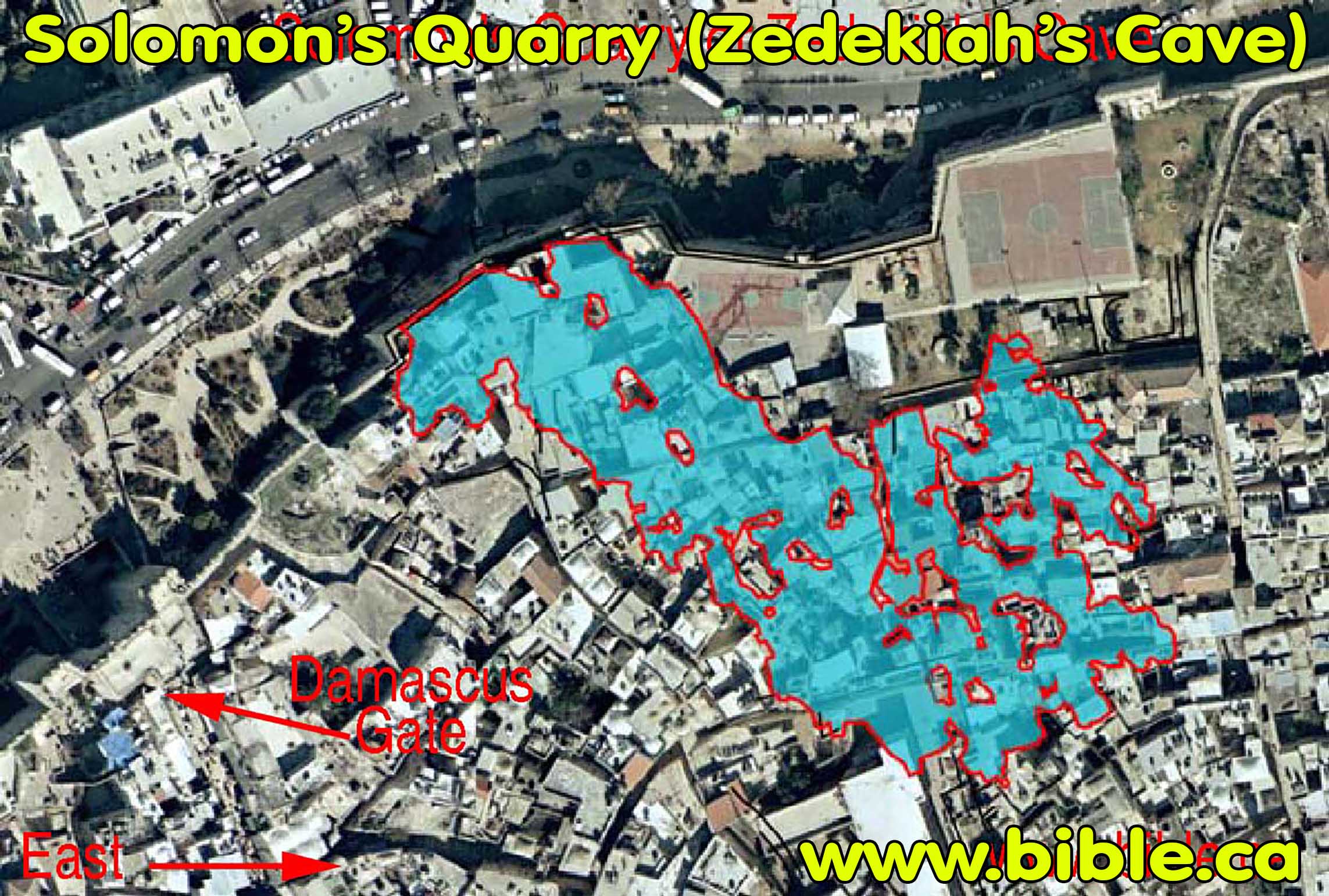
c. The cave falls 105 meters short of the temple mount: Although the cave cuts an almost direct line to the NW corner of the temple mount which is 335 meters from the entrance of the cave, no part of the cave is directly under the temple mount area, but falls 105 meters short. In other words, the closest point of the cave is still 105 meters away from the NW corner of the temple mount.
d. The
spring in the cave: The underground spring is due east of the
"Freemasons Hall" and is near the lowest point of the cave. Isotope
tracing has been used to determine that the water from this spring comes from
the same aquifer as the Gihon Spring in the city of David.
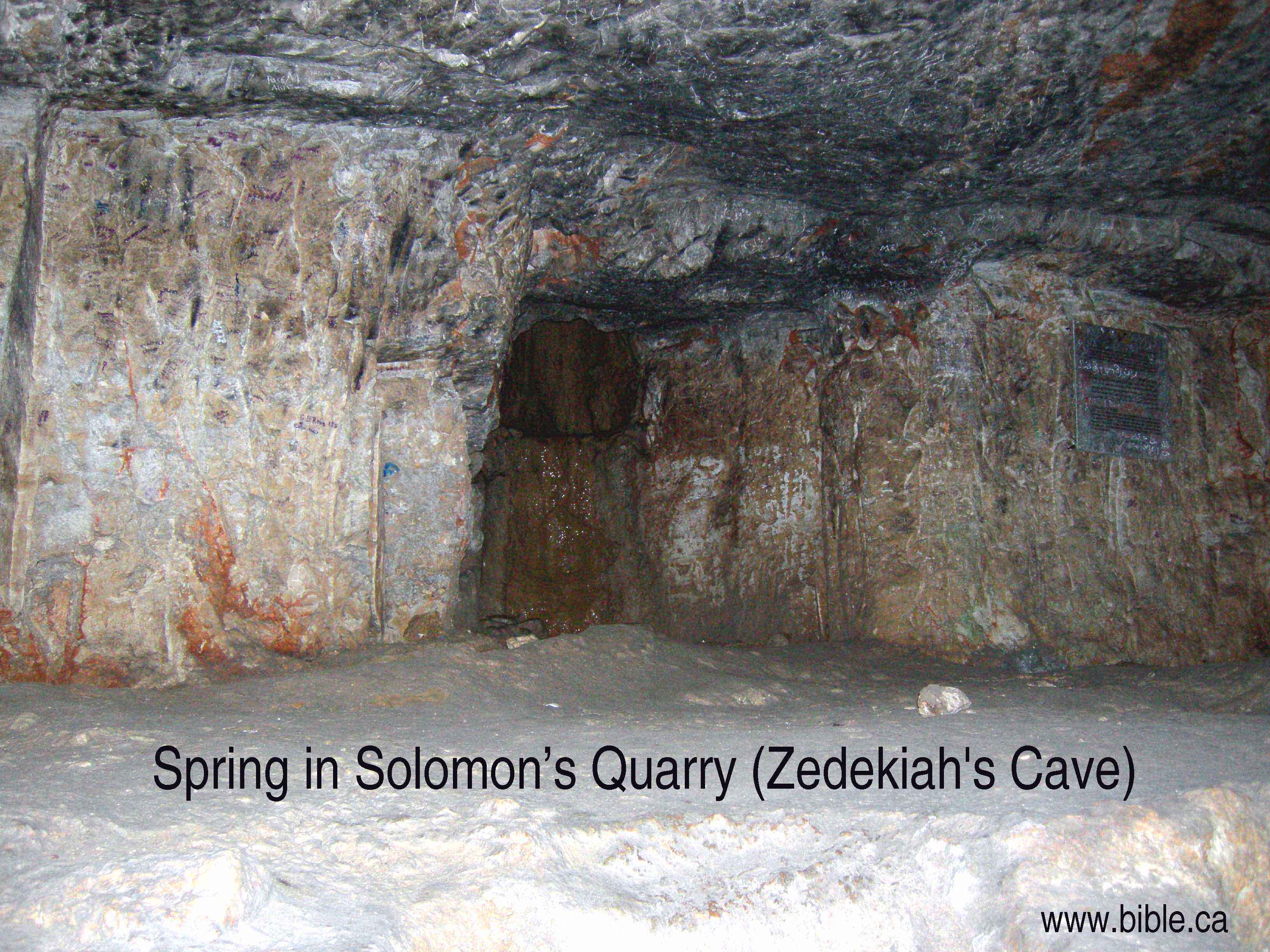
|
Sat. 29 July 587 BC (9 Tammuz) |
Gedaliah appointed Governor by Nebuchadnezzar (July - September 587 BC) 2 Kings 25:22-26; Jeremiah 40:13-14 |
1. Gedaliah appointed first governor of Judea for 3 months: Outline
- When Nebuchadnezzar deported Zedekiah in 587 BC he appointed this Gedaliah to be governor of Judah.
- Gedaliah governed only 3 months in 587 BC: 9 Tammuz-Tishri (July - September) "But it came about in the seventh month (Tishri), that Ishmael the son of Nethaniah, the son of Elishama, of the royal family, came with ten men and struck Gedaliah down so that he died along with the Jews and the Chaldeans who were with him at Mizpah." (2 Kings 25:25)
2. Bulla
of Gedaliah: Outline
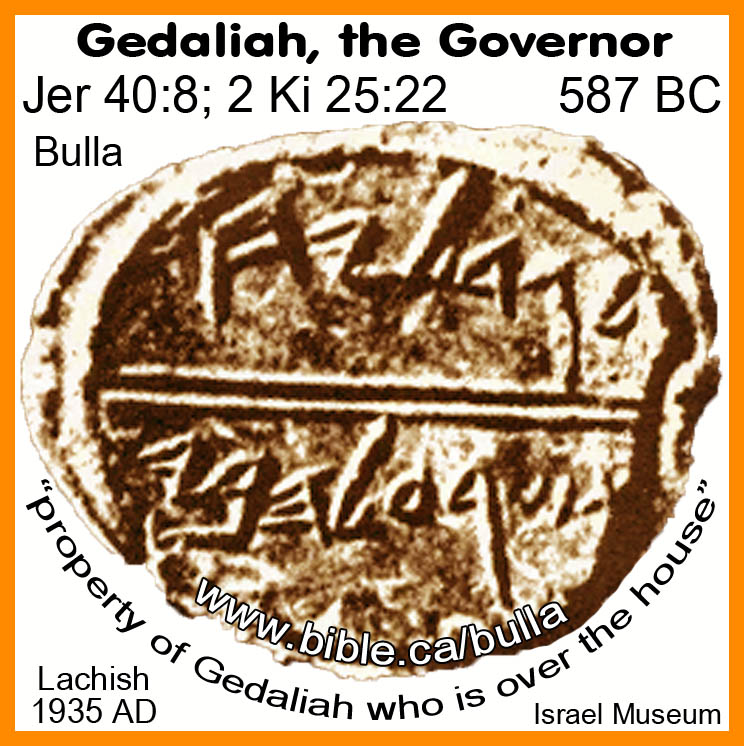
|
Solomon’s temple burned and destroyed by Edomites and Babylonians. Solomon’s and Herod’s temples were burned on the same day of the month: 10th Av. Jeremiah 52:12-13; 1 Esdras 4:45 |
|
"Israelite Siege Tower and Scythian Arrowheads: Uncovered during excavations in Jerusalem’s Jewish Quarter during the 1970s, this 22-foot tower, with walls 12 feet thick, helped defend Jerusalem against the Babylonian invasion in 587 B.C. Around the base of the tower, a thick layer of charred wood, ashes and soot bore witness to the raging fire that accompanied the Babylonian destruction. Among the charred rubble, excavators found five arrowheads: four of iron, and one of bronze. The bronze arrowhead was of the Scytho-Iranian type used by the Babylonian army. The iron arrowheads were typical of those used by the Israelites. Lying in the ashes, these five small artifacts gave poignant testimony to the furious clash that preceded the fall of Jerusalem" (BAR, top ten finds) |
1. Two and a half years earlier, on Tuesday 27 January 589 BC Nebuchadnezzar began his Third and final attack and siege of Jerusalem
a. While Nebuchadnezzar withdrew for a short time, he returned soon after Zedekiah broke his vow to release the slaves on the sabbatical year.
2. On 10th Ab 587 BC, [Monday 28th August 587 BC] the Temple of Solomon was burned by Nebuchadnezzar at the hands of the Edomites
a. "Now on the tenth day of the fifth month, which was the nineteenth year of King Nebuchadnezzar, king of Babylon, Nebuzaradan the captain of the bodyguard, who was in the service of the king of Babylon, came to Jerusalem. He burned the house of the Lord, the king’s house and all the houses of Jerusalem; even every large house he burned with fire." (Jeremiah 52:12-13)
b. "In the ninth year, in the tenth month, on the tenth day of the month, the word of the Lord came to me: Mortal, write down the name of this day, this very day. The king of Babylon has laid siege to Jerusalem this very day." (Ezekiel 24:1-2)
c. "And in the ninth year of his reign, in the tenth month, on the tenth day of the month, King Nebuchadnezzar of Babylon came with all his army against Jerusalem, and laid siege to it; they built siegeworks against it all around." (2 Kings 25:1)
d. "Now the city was taken on the ninth day of the fourth month, in the eleventh year of the reign of Zedekiah. They were indeed only generals of the king of Babylon, to whom Nebuchadnezzar committed the care of the siege, for he abode himself in the city of Riblah. The names of these generals who ravaged and subdued Jerusalem, if anyone desire to know them, were these: Nergal Sharezer, Sangar Nebo, Rabsaris, Sarsechim, and Rabmag; (136) and when the city was taken about midnight, and the enemy’s generals were entered into the temple, and when Zedekiah was sensible of it, he took his wives and his children, and his captains and friends, and with them fled out of the city, through the fortified ditch, and through the desert; (137) and when certain of the deserters had informed the Babylonians of this, at break of day, they made haste to pursue after Zedekiah, and overtook him not far from Jericho, and encompassed him about. But for those friends and captains of Zedekiah who had fled out of the city with him, when they saw their enemies near them, they left him and dispersed themselves, some one way and some another, and every one resolved to save himself; (138) so the enemy took Zedekiah alive, when he was deserted by all but a few, with his children and his wives, and brought him to the king. When he was come, Nebuchadnezzar began to call him a wicked wretch, and covenant-breaker, and one that had forgotten his former words, when he promised to keep the country for him. (139) He also reproached him for his ingratitude, that when he had received the kingdom from him, who had taken it from Jehoiachin, and given it him, he had made use of the power he gave him against him that gave it: “but,” said he, “God is great, who hateth that conduct of thine, and hath brought thee under us.” (140) And when he had used these words to Zedekiah, he commanded his sons and his friends to be slain, while Zedekiah and the rest of the captains looked on; after which he put out the eyes of Zedekiah, and bound him, and carried him to Babylon. (141) And these things happened to him, as Jeremiah and Ezekiel had foretold to him, that he should be caught, and brought before the king of Babylon, and should speak to him face to face, and should see his eyes with his own eyes; and thus far did Jeremiah prophesy. But he was also made blind, and brought to Babylon but did not see it, according to the prediction of Ezekiel." (Josephus Antiquities 10.135-140)
e. "(144) And now it was that the king of Babylon sent Nebuzaradan, the general of his army, to Jerusalem, to pillage the temple; who had it also in command to burn it and the royal palace, and to lay the city even with the ground, and to transplant the people into Babylon. (145) Accordingly he came to Jerusalem, in the eleventh year of king Zedekiah, and pillaged the temple, and carried out the vessels of God, both gold and silver, and particularly that large laver which Solomon dedicated, as also the pillars of brass, and their chapiters, with the golden tablets and the candlesticks: (146) and when he had carried these off, he set fire to the temple in the fifth month, the first day of the month, in the eleventh year of the reign of Zedekiah, and in the eighteenth year of Nebuchadnezzar; he also burnt the palace, and overthrew the city. (147) Now the temple was burnt four hundred and seventy years, six months, and ten days, after it was built. It was then one thousand and sixty-two years, six months, and ten days, from the departure out of Egypt; and from the Deluge to the destruction of the temple, the whole interval was one thousand nine hundred and fifty-seven years, six months, and ten days; [2543 BC] (148) but from the generation of Adam, until this befell the temple, there were three thousand five hundred and thirteen years, six months, and ten days; so great was the number of years hereto belonging; and what actions were done during these years, we have particularly related." (Josephus Antiquities 10.144-148)
3. Josephus noted that Herod’s temple was destroyed on the same day of the year in AD 70 as Nebuchanezzar had in 587 BC. This was a clear sign by God connecting the destruction of the two temples by divine will.
- "(249) So Titus retired into the tower of Antonia, and resolved to storm the temple the next day, early in the morning, with his whole army, and to encamp round about the holy house; (250) but, as for that house, God had for certain long ago doomed it to the fire; and now that fatal day was come, according to the revolution of ages; it was the tenth day of the month Lous [Ab], upon which it was formerly burnt by the king of Babylon; (251) although these flames took their rise from the Jews themselves, and were occasioned by them; for upon Titus’s retiring, the seditious lay still for a little while, and then attacked the Romans again, when those that guarded the holy house fought with those that quenched the fire that was burning in the inner [court of the] temple; but these Romans put the Jews to flight, and proceeded as far as the holy house itself. (252) At which time one of the soldiers, without staying for any orders, and without any concern or dread upon him at so great an undertaking, and being hurried on by a certain divine fury, snatched somewhat out of the materials that were on fire, and being lifted up by another soldier, he set fire to a golden window, through which there was a passage to the rooms that were round about the holy house, on the north side of it. (253) As the flames went upward the Jews made a clamor, such as so mighty an affliction required, and ran together to prevent it; and now they spared not their lives any longer, nor suffered anything to restrain their force, since that holy house was perishing, for whose sake it was that they kept such a guard about it. 6. (254) And now a certain person came running to Titus, and told him of this fire, as he was resting himself in his tent after the last battle; whereupon he rose up in great haste and, as he was, ran to the holy house, in order to have a stop put to the fire; (255) after him followed all his commanders, and after them followed the several legions, in great astonishment; so there was a great clamor and tumult raised, as was natural upon the disorderly motion of so great an army. (256) Then did Caesar, both by calling to the soldiers that were fighting, with a loud voice, and by giving a signal to them with his right hand, order them to quench the fire; (257) but they did not hear what he said, though he spake so loud, having their ears already dinned by a greater noise another way; nor did they attend to the signal he made with his hand neither, as still some of them were distracted with fighting, and others with passion; but as for the legions that came running thither, neither any persuasions nor any threatenings could restrain their violence, but each one’s own passion was his commander at this time; and as they were crowding into the temple together, many of them were trampled on by one another, while a great number fell among the ruins of the cloisters, which were still hot and smoking, and were destroyed in the same miserable way with those whom they had conquered: (258) and when they were come near the holy house, they made as if they did not so much as hear Caesar’s orders to the contrary; but they encouraged those that were before them to set it on fire. (259) As for the seditious, they were in too great distress already to afford their assistance [towards quenching the fire]; they were everywhere slain, and everywhere beaten; and as for a great part of the people, they were weak and without arms, and had their throats cut wherever they were caught. Now, round about the altar lay dead bodies heaped one upon another; as at the steps going up to it ran a great quantity of their blood, whither also the dead bodies that were slain above [on the altar] fell down. (260) And now, since Caesar was no way able to restrain the enthusiastic fury of the soldiers, and the fire proceeded on more and more, he went into the holy place of the temple; with his commanders, and saw it, with what was in it, which he found to be far superior to what the relations of foreigners contained, and not inferior to what we ourselves boasted of and believed about it; (261) but as the flame had not as yet reached to its inward parts, but was still consuming the rooms that were about the holy house, and Titus supposing what the fact was, that the house itself might yet be saved, (262) he came in haste and endeavored to persuade the soldiers to quench the fire, and gave order to Liberalius the centurion, and one of those spearmen that were about him, to beat the soldiers that were refractory with their staves, and to restrain them, (263) yet were their passions too hard for the regards they had for Caesar, and the dread they had of him who forbade them, as was their hatred of the Jews, and a certain vehement inclination to fight them, too hard for them also. (264) Moreover, the hope of plunder induced many to go on, as having this opinion, that all the places within were full of money, and as seeing that all round about it was made of gold; (265) and besides, one of those that went into the place prevented Caesar, when he ran so hastily out to restrain the soldiers, and threw the fire upon the hinges of the gate, in the dark; (266) whereby the flame burst out from within the holy house itself immediately, when the commanders retired, and Caesar with them, and when nobody any longer forbade those that were without to set fire to it; and thus the holy house burnt down, without Caesar;s approbation." (Josephus Wars 6.249-266)
4. Edomites actually took part in burning the temple of Solomon:
a. "Thus says the Lord God: Because Edom acted revengefully against the house of Judah and has grievously offended in taking vengeance upon them, therefore thus says the Lord God, I will stretch out my hand against Edom, and cut off from it humans and animals, and I will make it desolate; from Teman even to Dedan they shall fall by the sword. I will lay my vengeance upon Edom by the hand of my people Israel; and they shall act in Edom according to my anger and according to my wrath; and they shall know my vengeance, says the Lord God." (Ezekiel 25:12-14)
b. "You [Cyrus] also vowed to rebuild the temple which the Edomites set on fire when Judah was devastated by the Chaldeans." (1 Esdras 4:45)
5. Only 832 survive and are deported to Babylon.
a. "in the eighteenth year of Nebuchadnezzar he took into exile from Jerusalem eight hundred thirty-two persons;" (Jeremiah 52:29)
|
Monday, 18 Sept 587 BC |
Prophecy against Tyre and Sidon Ezek 26-28:19; 28:20-24 |
A. Introduction:
1. Dating the prophecy:
a. “In the aftermath of the fall of Jerusalem, Ezekiel prophesied against Tyre (Ezek 26-28). This oracle against Tyre is dated to the eleventh year (i.e., 588t) on the first day of an unspecified month (Ezek 26:1). Since the oracle says that the Tyrians had received news of Jerusalem's fall (Ezek 26:2), which happened on 9 Tammuz, it is probably the month of Elul. Thus, Ezek 26-28 was probably delivered by the prophet on 1 Elul 587 BC (Monday, September 18). (From Abraham to Paul: A Biblical Chronology (FATP), Andrew Steinmann, p168, 2011 AD)
2. Prophecy:
a. TYRE: "Now in the eleventh year, on the first of the month, the word of the Lord came to me saying, “Son of man, because Tyre has said concerning Jerusalem, ‘Aha, the gateway of the peoples is broken; it has opened to me. I shall be filled, now that she is laid waste,’ therefore thus says the Lord God, ‘Behold, I am against you, O Tyre, and I will bring up many nations against you, as the sea brings up its waves. ‘They will destroy the walls of Tyre and break down her towers; and I will scrape her debris from her and make her a bare rock. ‘She will be a place for the spreading of nets in the midst of the sea, for I have spoken,’ declares the Lord God, ‘and she will become spoil for the nations." (Ezekiel 26:1-5)
b. SIDON: "And the word of the Lord came to me saying, “Son of man, set your face toward Sidon, prophesy against her and say, ‘Thus says the Lord God, “Behold, I am against you, O Sidon, And I will be glorified in your midst. Then they will know that I am the Lord when I execute judgments in her, And I will manifest My holiness in her. “For I will send pestilence to her And blood to her streets, And the wounded will fall in her midst By the sword upon her on every side; Then they will know that I am the Lord. “And there will be no more for the house of Israel a prickling brier or a painful thorn from any round about them who scorned them; then they will know that I am the Lord God.”" (Ezekiel 28:20-24)
3. Ezekiel says that MANY NATIONS would destroy Tyre like continuous ocean waves:
a. The metaphor of the destructive power of ocean waves would be especially fitting for the Island of tyre which functioned as a major shipping port with two harbours.
b. As time goes on, each subsequent wave (nation attacking) would destroy Tyre little by little until it was a barren rock fit only for setting up nets.
c. Nebuchadnezzar and Alexander the Great were two of those great waves.
4. 586 BC: two prideful nations that thought they were invincible were prophesied against by God:
a. 722 BC: The pride of Tyre was inflated when they successfully outlasted and survived Shalmaneser V’s 5 year attack in 722.
b. Tyre: the prideful island: Prophecy of destruction in 587 BC and the attack began in 586 BC:
I. 586 BC Nebuchadnezzar was God’s agent as the “first wave” to destroy Tyre in a 13 year siege.
II. The pride of Tyre would continue down to the time of Alexander the Great who was God’s chosen instrument to fulfill the prophecy in 332 BC.
c. Edom: the prideful mountain:
I. “The arrogance of your heart has deceived you, You who live in the clefts of the rock, In the loftiness of your dwelling place, Who say in your heart, ‘Who will bring me down to earth?’ “Though you build high like the eagle, Though you set your nest among the stars, From there I will bring you down,” declares the LORD." (Obadiah 3–4)
II. The Edomites were destroyed and went extinct around 550 BC.
d. Don’t boast to God about how strong you are, because he will take great pleasure in humiliating you:
I. "When pride comes, then comes dishonor, But with the humble is wisdom." (Proverbs 11:2)
II. "Pride goes before destruction, And a haughty spirit before stumbling." (Proverbs 16:18)
III. "Before destruction the heart of man is haughty, But humility goes before honor." (Proverbs 18:12)
IV. "A man’s pride will bring him low, But a humble spirit will obtain honor." (Proverbs 29:23)
B. Assyrian king Shalmaneser V (726-722 BC) unsuccessfully attacked Tyre after a 5-year siege.
1. Shalmaneser V conquered the 10 northern tribes of Israel in 723 BC and deported them. “The ten lost tribes”.
2. Josephus records the account recorded by Menander who died in 290 BC:
a. Josephus quotes Menander who records how Shalmaneser V conquered both mainland Tyre called “Palaetyrus” and the island of Tyre:
b. “And now the king of Assyria (Shalmaneser V, 726-722 BC) invaded all Syria and Phoenicia in a hostile manner. The name of this king is also set down in the archives of Tyre, for he made an expedition against Tyre in the reign of Eluleus; and Menander attests to it, who, when he wrote his Chronology, and translated the archives of Tyre into the Greek language, gives us the following history:—(284) “One whose name was Eluleus, reigned thirty-six years: this king, upon the revolt of the Citteans, sailed to them, and reduced them again to a submission. Against these did the king of Assyria send an army, and in a hostile manner overrun all Phoenicia, but soon made peace with them all, and returned back; (285) but Sidon, and Ace, and Palaetyrus (Old Tyre-mainland), revolted; and many other cities there were which delivered themselves up to the king of Assyria. Accordingly, when the Tyrians (Island) would not submit to him, the king returned, and fell upon them again, while the Phoenicians had furnished him with threescore ships, and eight hundred men to row them; (286) and when the Tyrians had come upon them in twelve ships, and the enemy’s ships were dispersed, they took five hundred men prisoners and the reputation of all the citizens of Tyre was thereby increased; (287) but the king of Assyria returned, and placed guards at their rivers and aqueducts, who should hinder the Tyrians from drawing water. This continued for five years; and still the Tyrians bore the siege, and drank of the water they had out of the wells they dug.” And this is what is written in the Tyrian archives concerning Shalmaneser, the king of Assyria.” (Josephus Antiquities 9.283–287, quoting Greek historian Menander, d 290 BC)
C. First nation-wave against Tyre: Nebuchadnezzar attacked Tyre in a 13-year siege from 586-573 BC.
1. Nebuchadnezzar destroyed “Old Tyre” (reverenced in ancient literary sources as Palaetyrus)
a. He was unable to the Island of Tyre but did gain some wealth and booty from the mainland city.
b. “After his defeat of Jerusalem in 587 BC, Nebuchadnezzar turned his attention to Tyre. Although he defeated mainland Tyre, a 13-year siege of the island city proved fruitless. The historian Diodorus attested that Alexander used the stones from the Old Tyre destroyed by Nebuchadnezzar to build his mole. The causeway was a half-mile (0.8 km) long and 200 ft (60 m) wide, and was built so Alexander could move his siege equipment over to the island. The rubble from Old Tyre was so thoroughly cleaned out by Alexander’s engineers that no trace of the ancient city can be found today. Thus, according to H.J. Katzenstein, the precise location of mainland Tyre is a point of controversy. According to this specialist on the history of Tyre, it was “totally dismantled by Alexander the Great in his famous siege…and disappeared totally”. All of this explains why Ezekiel 26:12 says the stones and rubble of Tyre would be thrown into the sea by many nations.” (Ezekiel 26:1-14 A Proof text for Inerrancy or Fallibility of the Old Testament, Paul Ferguson, Bible and Spade, p 51, Spring 2006 AD)
2. Archeological proof Nebuchadnezzar attacked Tyre: Clay cuneiform table from Uruk that dates to 572 BC
a. The inscription: “Nebuchadnezzar and the soldiers who moved with him to the land of Tyre," receipt for provisions issued to Ina-silli-Nergal” (Clay cuneiform table found in Uruk, 572 BC, Von Eckuard Unger)
b. “The following, yet unexplainable apposition to Neriglissar has been interpreted as Sin-magir. Furthermore, the list at the end mentions the members of Phoenicians as vassals, but their names are not mentioned. These are the cities of Tyre, Gaza, Sides, Arwad, Asdod, Mir. , and a seventh, whose name is completely destroyed. All these cities are not otherwise mentioned in the historical inscriptions of Nebuchadnezzar, but at least for the most powerful, first ranked city of Tyre, there are five legal documents, of which three are even written or dated in Tyre, and where you can take interesting facts. After the fall of Jerusalem, in 585 [sic 587 BC] Nebuchadnezzar began the siege of the city of Tyre, where the king, Ithobaal, ruled; but only after 13 years (572) was it possible to force them into the Babylonian ambassadorship. Ithobaal was routed at once and Baal became a vassal king. In addition to him, the Babylonian High Commissioner (Gu-en-na = tanda-bakku) ruled Enlil-Eapik-zeri in 564, as is evident from ether deed of the 41st year of Nebuchadnezzar. This official appears 3 years later (561) under the Babylonian king Amdl-Marduk as Aandabakku of Nippur, to which he is probably transferred. The clay tablet from Tyre is a promissory note over the large sum of 3 minas, 8 shekels silver; the tandabakku is the first witness. Explanation of the position of Enlil-alpik-zeri in Tyre is of great importance for the relation of Babylon to Tyre. The equation of the "Gu-na-na" official with the dandabakku results from a juxtaposition of two legal documents, published in Babyl. Exped. VIII Nos. 42 and 48, taken from Nippur. VI, 2 nd year, 28 th, and 5 th of the year of Nabonaid, in each case 6 equal persons appear, of which at least 4 are of the highest rank, among them the otherwise well-known rab ummanui generalissimo of the army Muaezib. Nabu, the genera-lissimus of the sharks, rab kari, amita-nretkin-atti, the zakzaku (an nosh untitled title) Nabu-vra-ibni and finally Gula-auma-liair, who in No. 42 as "amelu la-an -da-ba-ak ", in No. 48 but ale" Gu-en-na "is titled in No. 42 this is at the head of witnesses before dent kipu (Vogt) of Nippur Anum-Barra-usur, in No. 48, however, above all other persons According to another ideogram, gandabakku means the "Keeper of the Seal" (DERmscH HWB 589; RADAII: Babyl. Exped. XV II, p. 134), and from the functions of the Assyrian dandabakku and from its mention and dependent vassal fiefs (cf. u.) one must conclude that the dandabakku, such. R. Nabu-liuma-era, who had sworn an assyrian official's oath, but to a certain extent acted "rich in cash" alongside a Fiiraten, or even alone, a kind of "Oberkominissar" in the name of his king. He is believed to have been the "seal keeper" in foreign administrations in the governmental acts of the Duich burial of his seal. Since the Kassite period, the following "Guen-na" or "dandabakku" (also known as "aaddabaku") have been known. … Panels 1, 4 and 5 are found in Uruk, 2 in Sippar. Although the date is destroyed in Text 1, it can be dated with some certainty. The plaque is a receipt for provisions for "the King [Nebuchadnezzar and the soldiers who moved with him to the land of Tyre," issued to Ina-silli-Nergal, this official who in similar texts hag during the years 39-43 However, Goucher 76 = Dougherty 110 occurs once on the 29th year, ie before the siege, which ended in the 33rd year of the king (572), so there is still enough room for maneuver, this panel still to date into the final years of the siege, to which the content refers. … The five documents, of which three are exhibited in Tyre, show that the surrender is correct, that at least since 570 Tyre has been firmly in the administration of Nebuchadnezzar, and Babylonian trade has unfolded there, even between the worlds distant places like Tyre and Uruk. Text 1 shows that the King [Nebuchadnezzar] pristinely directed the siege. These neglected contracts prove to be of great importance for historical research, if they are tested not on their philological form but on their more important content in crater Lithe.” (Zeitschrift fur die alttestamentliche Wissenschaft, Vol 44, Mitteilungen, Von Eckuard Unger, Nebukadnezar II. und sein Sandabakku (Oberkommissar) in Tyrna, p 314-317, 1926 AD, Translated from German by Steven Rudd, 2018)
3. 26 April 571 BC:
a. "Now in the twenty-seventh year, in the first month, on the first of the month, the word of the Lord came to me saying, “Son of man, Nebuchadnezzar king of Babylon made his army labor hard against Tyre; every head was made bald and every shoulder was rubbed bare. But he and his army had no wages from Tyre for the labor that he had performed against it.” Therefore thus says the Lord God, “Behold, I will give the land of Egypt to Nebuchadnezzar king of Babylon. And he will carry off her wealth and capture her spoil and seize her plunder; and it will be wages for his army. “I have given him the land of Egypt for his labor which he performed, because they acted for Me,” declares the Lord God." (Ezekiel 29:17–20)
4. May 571 BC:
a. Nebuchadnezzar is restored from 18 months of learning the “Pride lesson” of eating grass like an ox in Daniel 4.
b. After learning about the dangers of Pride, God rewards him for his work against prideful Tyre and gives him the spoils of Egypt!
D. Second nation-wave against Tyre: Alexander the Great’s 13 year siege against Tyre.
1. Greek historian Diodorus Siculus (17:40-47, 50 BC) records the entire battle in great detail.
2. Alexander literally scraped the mainland Tyre into the ocean for his causeway so that not even a trace of the ancient city can be found today and its location is speculative!
3.
“40 1 When Niceratus was archon at Athens, the Romans elected as consuls
Marcus Atilius and Marcus Valerius, and the one hundred and twelfth Olympic
Games were held, in which Grylus of Chalcis was the victor. In this year,
Alexander buried the dead from his victory at Issus, including even those of
the Persians who had distinguished themselves by courage. Then he performed
rich sacrifices to the gods and rewarded those who had borne themselves well in
battle with gifts appropriate to each, and rested the army for some days. 2
Then he marched on towards Egypt, and as he came into Phoenicia, received the
submission of all the other cities, for their inhabitants accepted him
willingly.
At Tyre, however, when the king wished to sacrifice to the Tyrian Heracles, the
people overhastily barred him from entering the city; 3 Alexander became angry
and threatened to resort to force, but the Tyrians cheerfully faced the
prospect of a siege. They wanted to gratify Dareius and keep unimpaired their
loyalty to him, and thought also that they would receive great gifts from the
king in return for such a favour. They would draw Alexander into a protracted
and difficult siege and give Dareius time for his military preparations, and at
the same time they had confidence in the strength of
their island and the military forces in it. They also hoped for help
from their colonists, the Carthaginians.
4 The king saw that the city could hardly be taken by sea because of the
engines mounted along its walls and the fleet that it possessed, while from the
land it was almost unassailable because it lay four
furlongs (800 m) away from the coast. Nevertheless he determined to run
every risk and make every effort to save the Macedonian army from being held in
contempt by a single undistinguished city. 5 Immediately
he demolished what was called Old Tyre and set many tens of thousands of men to
work carrying stones to construct a mole two plethra (60 m) in width. He
drafted into service the entire population of the neighbouring cities and the
project advanced rapidly because the workers were numerous.
41 1 At first, the Tyrians sailed up to the mole and mocked the king, asking if
he thought that he would get the better of Poseidon. Then, as the work
proceeded with unexpected rapidity, they voted to transport their children and
women and old men to Carthage, assigned the young and able-bodied to the
defence of the walls, and made ready for a naval engagement with their eighty
triremes. 2 They did succeed in getting a part of their children and women to
safety with the Carthaginians, but they were outstripped by the abundance of
Alexander's labour force, and, not being able to stop his advance with their
ships, were compelled to stand the siege with almost their whole preparation
still in the city. 3 They had a wealth of catapults and other engines employed
for sieges and they had no difficulty in constructing
more because of engineers and artisans of all sorts who were in the city. 4 All
kinds of novel devices were fashioned by them, so that the entire circuit of
the walls was covered with machines, especially on that side where the mole was
approaching the city.
5 As the Macedonian construction came within range or missiles, portents
(signs) were sent by the gods to them in their danger. Out of the sea a tidal
wave tossed a sea-monster of incredible size into
the midst of the Macedonian operations. It crashed into the mole but did it no
harm, remained resting a portion of its body against it for a long time and
then swam off into the sea again. 6 This strange event threw both sides into superstition,
each imagining that the portent signified that Poseidon would come to their
aid, for they were swayed by their own interest in the matter.
7 There were other strange happenings too, calculated to spread confusion and
terror among the people. At the distribution of rations on the Macedonian side,
the broken pieces of bread had a bloody look.
Someone reported, on the Tyrian side, that he had seen
a vision in which Apollo told him that he would leave the city. 8
Everyone suspected that the man had made up the story in order to curry favour
with Alexander, and some of the younger citizens set
out to stone him; he was, however, spirited away by the magistrates and
took refuge in the temple of Heracles, where as a suppliant he escaped the
people's wrath, but the Tyrians were so credulous that
they tied the image of Apollo to its base with golden cords, preventing, as
they thought, the god from leaving the city.
42 1 Now the Tyrians were alarmed at the advance of the mole, and they equipped
many small vessels with both light and heavy catapults together with archers
and slingers, and, attacking the workers on the mole, wounded many and killed
not a few. 2 As missiles of all sorts in large numbers
rained upon unarmed and densely packed men, no soldier missed his mark since
the targets were exposed and unsuspecting. The missiles struck not only from
the front but also from the back, as men were working on both sides of a rather
narrow structure and no one could protect himself from those who shot from two directions.
3 Alexander moved immediately to rectify what threatened to be a shocking
disaster, and manning all his ships and taking personal
command of them, made with all speed for the harbour of Tyre to cut off the
retreat of the Phoenicians. 4 They in turn were terrified lest he seize
the harbour and capture the city while it was empty of soldiers, and rowed back
to Tyre as fast as they could. Both fleets plied their oars at a fast stroke in
a fury of determination, and the Macedonians were already nearing the entrance,
but the Phoenicians, by a narrow margin, escaped losing their whole force and,
thrusting their way in, got safely to the city with the loss only of the ships
at the tail of the column.
5 So the king failed of this important objective, but nevertheless
pushed on with the mole, protecting his workers with a thick screen of ships.
As his engines drew close to the city and its capture seemed imminent, a powerful north-west gale blew up and damaged a large part of
the mole. 6 Alexander was at a loss to deal with the harm done to his
project by the forces of nature and thought of give up the siege attempt, but
driven by ambition he sent to the mountain and felling
huge trees, he brought them branches and all and, placing them besides the
mole, broke the force of the waves. 7 It was not long before he had
restored the collapsed parts of the mole, and pushing on with an ample labour
force until he came within missiles' range, he moved
his engines out to the end of the causeway, and attacked the walls with his
stone throwers, while he employed his light catapults against the men
stationed along the battlements. The archers and slingers joined in the
barrage, and wounded many in the city who rushed to the
defence.
43 1 The Tyrians had bronze workers and machinists, and
contrived ingenious counter-measures. Against the projectiles from the
catapults they made wheels with many spokes, and, setting these to rotate by a
certain device, they destroyed some of the missiles and deflected other, and
broke the force of all. They caught the balls from the stone throwers in soft
and yielding materials and so weakened their force. 2 While this attack
was going on from the mole, the king sailed around the city with his whole
fleet and inspected the walls, and made it clear that he was about to attack
the city alike by land and sea.
3 The Tyrians did not dare to put to sea again with their whole fleet but kept
three ships moored at the harbour mouth. The king, however, sailed up to these,
sank them all, and so returned to his camp. Wanting to double
the security of their walls, the Tyrians built a second one at a distance of
five cubits within the first; this was ten cubits in thickness, and the
passage between the walls they filled with stones and earth, 4 but Alexander
lashed triremes together, mounted his various siege engines upon them, and
overthrew the wall for the space of a plethron. 5 Through this breach the
Macedonians burst into the city, but the Tyrians rained on them a shower of
missiles and managed to turn them back, and when night came, they rebuilt the
fallen part of the wall.
Now the causeway had reached the wall and made the city
mainland, and sharp fighting took place along the walls. 6 The Tyrians
had the present danger before their eyes and easily imagined what a disaster
the actual capture of the city would be, so that they spent themselves so
freely in the contest as to despise mortal danger. 7 When the Macedonians moved
up towers as high as the walls and in this way, extending bridges, boldly
assaulted the battlements, the Tyrians fell back on the ingenuity of their
engineers and applied many counter-measures to meet the assault. 8 They forged great tridents armed with barbs and struck with
these at close range the assailants standing on the towers. These stuck in the
shields, and as ropes were attached to the tridents, they could haul on the
ropes and pull them in. 9 Their victims were faced the alternative of
releasing their arms and exposing their bodies to be wounded by the missiles
which showered upon them, or clinging to their shields for shame and perishing
in the fall from the lofty towers. 10 Other Tyrians cast
fishing nets over those Macedonians who were fighting their way across
the bridges and, making their hands helpless, pulled them off and tumbled them
down from bridge to earth.
44 1 They thought of another ingenious device also to offset the Macedonian
fighting qualities, by which they involved the bravest of the enemy in a
horrible torment which could not be avoided. They fashioned shields of bronze
and iron and, filling them with sand, roasted them
continuously over a strong fire and made the sand red hot. 2 By means of
a certain apparatus they then scattered this over those Macedonians who were
fighting most boldly and brought those within its range into utter misery. The sand sifted down under breastplates and shirts, and scorching
the skin with the intense heat inflicted upon them irremediable disaster.
3 They shrieked supplications like those under torture and there was no one to
help them, but with the excruciating agony they fell into madness and died, the
victims of a pitiable and helpless lot.
4 At the same time, the Phoenicians poured down fire
and flung javelins and stones, and by the volume of their missiles
weakened the resolution of the attackers. They let down
long poles or spars equipped with concave cutting edges and cut the ropes
supporting the rams, thus rendering these instruments useless. With
their fire-throwers they discharged huge red-hot masses
of metal into the press of the enemy, and where so many men were packed
together they did not miss their mark. With "crows"
and "iron hands" they dragged over the edge many who were
stationed behind the breastworks on the towers. 5 With many hands at work they
kept all their engines busy and caused many deaths among the besiegers.
45 1 They caused extreme terror by all of this and the fury of their fighting
became hardly resistible, but the Macedonians did not lose their boldness. 2 As
those in front kept falling, those behind moved up and were not deterred by the
sufferings of their comrades. Alexander mounted the
stone-throwing catapults in proper places and made the walls rock with the
boulders that they threw. With the dart-throwers on the wooden towers he
kept up a constant fire of all kinds of missiles and terribly punished the
defenders of the walls. 3 In response, the Tyrians rigged
marble wheels in front of the walls and causing these to rotate by some mechanism
they shattered the flying missiles of the catapults and, deflecting them from
their course, rendered their fire ineffective. 4 In addition, they stitched up hides or pairs of skins and stuffed them
with seaweed so as to receive the blows of the stones on these. As these
were soft and yielding, the force of the flying stones was lessened. 5 In sum,
the Tyrians defended themselves strongly in all regards
and showed themselves well provided with the means of defence. They were bold
in face of their enemies, and left the shelter of the walls and their
position with within the towers to push out onto the very bridges and match the
courage of the Macedonians with their own valour. 6 They grappled with the
enemy and, fighting hand to hand, put up a stout
battle for their city. Some of them used axes to chop
off any part of the body of an opponent that presented itself.
There was one of the Macedonian commanders named Admetus who was a
conspicuously brave and powerful man. He withstood the fury of the Tyrians with
high courage and died heroically, killed instantly when
his skull was split by the stroke of an axe.
7 Alexander saw that the Macedonians were held in check by the resistance of
the Tyrians, and, as it was now night, recalled his soldiers by a trumpet call.
His first impulse was to break off the siege and march on to Egypt, but he
changed his mind as he reflected that it would be disgraceful to leave the
Tyrians with all the glory of the operation. He found support in only one of
his Friends, Amyntas the son of Andromenes, but turned again to the attack.
46 1 Alexander addressed the Macedonians, calling on them to dare no less than
he. Fitting out his ships for fighting, he began a general assault upon the
walls by land and sea and this was pressed furiously. He saw that the wall on
the side of the naval base was weaker than elsewhere, and brought up to that
point his triremes lashed together and supporting his best siege engines. 2 Now he performed a feat of daring which was hardly believable
even to those who saw it. He flung a bridge across from a wooden tower to the
city walls and crossing by it alone gained a footing on the wall, neither
concerned for the envy of Fortune nor fearing the menace of the Tyrians.
Having as witness of his prowess the great army which had defeated the
Persians, he ordered the Macedonians to follow him, and
leading the way he slew some of those who came within reach with his spear,
and others by a blow of his sabre. He knocked down still others with the rim of
his shield, and put an end to the high confidence of the enemy.
3 Simultaneously in another part of the city the
battering ram, put to its work, brought down a considerable stretch of wall;
and when the Macedonians entered through this breach and Alexander's party poured
over the bridge on to the wall, the city was taken. The Tyrians,
however, kept up the resistance with mutual cries of encouragement and blocked
the alleys with barricades, so that all except a few were cut down fighting, in
number more than seven thousand. 4 The king sold the women and children into slavery and crucified all
the men of military age. These were not less than two thousand. Although
most of the non-combatants had been removed to Carthage, those who remained to
become captives were found to be more than thirteen
thousand.
5 So Tyre had undergone the siege bravely rather than wisely and come into such
misfortunes, after a resistance of seven months.
6 The king removed the golden chains and fetters from
Apollo and gave orders that the god should be called "Apollo Philalexander."
He carried out magnificent sacrifices to Heracles, rewarded those of his men
who had distinguished themselves, and gave a lavish funeral for his own dead.
He installed as king of Tyre a man named Ballonymus, the story of whose career
I cannot omit because it is an example of a quite astonishing reversal of
fortune.
47 1 The former king, Straton, was deprived of his throne because of his
friendship for Dareius, and Alexander invited Hephaestion
to nominate as king of Tyre any personal guest-friend whom he wished. 2
At first he favoured the host with whom he found pleasant lodging, and proposed
that he should be designated master of the city. He was prominent among the
citizens in wealth and position, but not being related to those who had been
kings he would not accept the offer. 3 Hephaestion then asked him to make a
choice from among the members of the royal family, and he said that he knew a man of royal descent who was wise and good in all
respects, but he was poor in the extreme. 4 Hephaestion
nevertheless agreed that he should be given the royal power, and the one
who had been given the choice went off to find the man he had named, bearing
with him the royal dress, and came upon him drawing water for hire in a garden,
dressed in common rags. 5 He informed him of the transformation in his
position, dressed him in the king's robe, and gave him the other appropriate
trappings of office. Then he conducted him to the market place and proclaimed
him king of Tyre. 6 Everyone accepted him with enthusiasm and marvelled at the
vicissitudes of Fortune. Thus he became a Friend of Alexander's and took over
the kingdom, an instructive example to those who do not
know the incredible changes which Fortune can effect.” (Diodorus Siculus
17:40-47, 50 BC)
|
September 587 BC |
Nebuchadnezzar frees Jeremiah at Ramah. Jeremiah 39:11-14; 40:1-6 |
A. Rachel weeping for her children:
1. See full outline on: the archeological location of Rachel’s tomb.
a. "Thus says the Lord, “A voice is heard in Ramah, Lamentation and bitter weeping. Rachel is weeping for her children; She refuses to be comforted for her children, Because they are no more.”" (Jeremiah 31:15)
|
“Give me children, or else I die.” (Genesis 30:1) |
"So Rachel died [in childbirth] and was buried on the way [from Bethel] to Ephrath (that is, Bethlehem)." (Genesis 35:19) |
“A voice is heard in Ramah, Lamentation and bitter weeping. Rachel is weeping for her children; She refuses to be comforted for her children, because they are no more.” (Jeremiah 31:15) |
2. Three times Rachel wept for her children at Ramah:
a. In 587 BC when Nebuchadnezzar marched the exiles past her tomb to the staging ground at Ramah.
b. In 2 BC, Rachel was weeping her children, when Herod was tricked by the Magi in revealing the location of Jesus, and he slaughter children under 2 years old.
i. In this case, Ramah represented the northern limit of the slaughter geographically from Bethlehem to Ramah.
ii. A 17 km diameter circle centered on Jerusalem is the death zone of Herod.
iii. Any child under 2 years old in this area was killed.
c.
In 2 BC when Jesus the
messiah was exiled to Egypt from Bethlehem, the town Rachel died on route to.
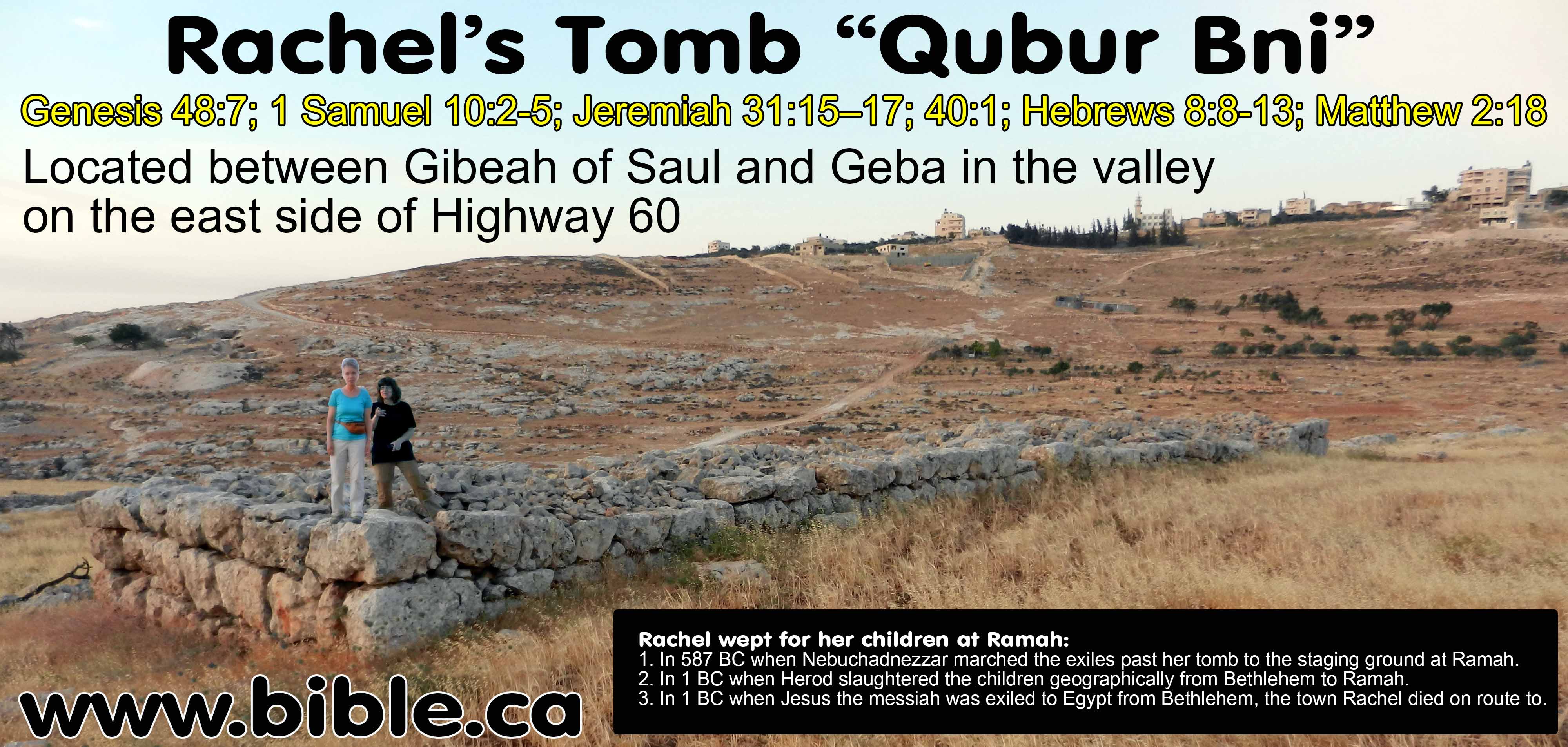
3. Rachel weeping for her children is a duel messianic prophecy with three fulfillments:
|
587 BC: Jeremiah 31:15–17 |
2 BC: Matthew 2:14–18 |
|
"Thus says the LORD, “A voice is heard in Ramah, Lamentation and bitter weeping. Rachel is weeping for her children; She refuses to be comforted for her children, Because they are no more.” Thus says the LORD, “Restrain your voice from weeping And your eyes from tears; For your work will be rewarded,” declares the LORD, “And they will return from the land of the enemy. “There is hope for your future,” declares the LORD, “And your children will return to their own territory." |
"So Joseph got up and took the Child and His mother while it was still night, and left for Egypt. He remained there until the death of Herod. This was to fulfill what had been spoken by the Lord through the prophet: “OUT OF EGYPT I CALLED MY SON.” Then when Herod saw that he had been tricked by the magi, he became very enraged, and sent and slew all the male children who were in Bethlehem and all its vicinity, from two years old and under, according to the time which he had determined from the magi. Then what had been spoken through Jeremiah the prophet was fulfilled: “A VOICE WAS HEARD IN RAMAH, WEEPING AND GREAT MOURNING, RACHEL WEEPING FOR HER CHILDREN; AND SHE REFUSED TO BE COMFORTED, BECAUSE THEY WERE NO MORE.”" |
|
Rachel wept as exiles passed her tomb on route to Babylon and would return, not for the wicked idol worshippers who were killed. |
Rachel wept for the Messiah Jesus as he was exiled to Egypt and would return, AND for the innocent children where were killed. |
B. Jeremiah is set free by Nebuchadnezzar
1. "Now Nebuchadnezzar king of Babylon gave orders about Jeremiah through Nebuzaradan the captain of the bodyguard, saying, “Take him and look after him, and do nothing harmful to him, but rather deal with him just as he tells you.” So Nebuzaradan the captain of the bodyguard sent word, along with Nebushazban the Rab-saris, and Nergal-sar-ezer the Rab-mag, and all the leading officers of the king of Babylon; they even sent and took Jeremiah out of the court of the guardhouse and entrusted him to Gedaliah, the son of Ahikam, the son of Shaphan, to take him home. So he stayed among the people." (Jeremiah 39:11-14)
2. "The word which came to Jeremiah from the Lord after Nebuzaradan captain of the bodyguard had released him from Ramah, when he had taken him bound in chains among all the exiles of Jerusalem and Judah who were being exiled to Babylon. Now the captain of the bodyguard had taken Jeremiah and said to him, “The Lord your God promised this calamity against this place; and the Lord has brought it on and done just as He promised. Because you people sinned against the Lord and did not listen to His voice, therefore this thing has happened to you. “But now, behold, I am freeing you today from the chains which are on your hands. If you would prefer to come with me to Babylon, come along, and I will look after you; but if you would prefer not to come with me to Babylon, never mind. Look, the whole land is before you; go wherever it seems good and right for you to go.” As Jeremiah was still not going back, he said, “Go on back then to Gedaliah the son of Ahikam, the son of Shaphan, whom the king of Babylon has appointed over the cities of Judah, and stay with him among the people; or else go anywhere it seems right for you to go.” So the captain of the bodyguard gave him a ration and a gift and let him go. Then Jeremiah went to Mizpah to Gedaliah the son of Ahikam and stayed with him among the people who were left in the land." (Jeremiah 40:1-6)
|
Sept 587 BC |
Gedaliah assassinated Jeremiah 41 |
|
Gedaliah over the house: Outline |
Bulla of Gedaliah: Bulla of Gedaliah, Governor: Outline Bulla of Jaazaniah king’s servant: Outline Bulla of Ishmael the king's son: Outline Bulla of Miamen Son of Ephai: Outline Bulla of Baalis King of Bnei-Ammon: Outline Bulla of Milkom servant of Baalis: Outline |
- Passages:
- "Now as for the people who were left in the land of Judah, whom Nebuchadnezzar king of Babylon had left, he appointed Gedaliah the son of Ahikam, the son of Shaphan over them. When all the captains of the forces, they and their men, heard that the king of Babylon had appointed Gedaliah governor, they came to Gedaliah to Mizpah, namely, Ishmael the son of Nethaniah, and Johanan the son of Kareah, and Seraiah the son of Tanhumeth the Netophathite, and Jaazaniah the son of the Maacathite, they and their men. Gedaliah swore to them and their men and said to them, “Do not be afraid of the servants of the Chaldeans; live in the land and serve the king of Babylon, and it will be well with you.” But it came about in the seventh month [September], that Ishmael the son of Nethaniah, the son of Elishama, of the royal family, came with ten men and struck Gedaliah down so that he died along with the Jews and the Chaldeans who were with him at Mizpah. Then all the people, both small and great, and the captains of the forces arose and went to Egypt; for they were afraid of the Chaldeans." (2 Kings 25:22-26)
- Baalas is a king of Ammon that succeeded in assassinating Gedaliah. Baalas is unknown from any outside written sources but is mentioned by name in one Bible verse: "Now Johanan the son of Kareah and all the commanders of the forces that were in the field came to Gedaliah at Mizpah and said to him, “Are you well aware that Baalis the king of the sons of Ammon has sent Ishmael the son of Nethaniah to take your life?” But Gedaliah the son of Ahikam did not believe them." (Jeremiah 40:13-14)
- Bulla of 6 men in the story of Gedaliah:
|
Seal/Bulla |
Name mentioned in the Bible |
|
|
Bulla of Gedaliah, Governor Jer 40:8; 2 Ki 25:22
|
|
Jaazaniah servant of the king Jer 40:8; 2 Ki 25:22
|
|
|
Ishmael the king's son Jer 40:14; 1 Chron 3:6
|
|
|
Miamen Son of Ephai Jer 40:8
|
|
|
Baalis King of Bnei-Ammon Jer 40:14
|
|
|
Milkom, servant of Baalis Jer 40:14 |
A. Chronological Bible reading during [Tishri] September 587-586 BC:
1. Jeremiah:
a. 587 BC (Post Tishri): Jeremiah 41:17-50:46 (Jews flee to Egypt, Jeremiah condemns)
2. Ezekiel:
a. Friday 19 January 586 (5 Tebeth) Ezek 33:21-ch 39: Ezekiel first learns Jerusalem has fallen
b. Thursday 15 March 586 (1 Adar) Ezek 32:1-16: FOURTH prophecy against Pharaoh of Egypt
c. Thursday 29 March 586 (15 Adar) Ezek 32:17-33:20: FIFTH prophecy against Egypt
3. 586 BC: Book of Obadiah: condemnation of Edom
4. Ps 137: condemnation of Edom
5. 586 BC: Book of Lamentations
B. 586 BC: Ezekiel Decodes Revelation:
|
586 BC: Ezekiel Decodes Revelation Chapter by Chapter topical/chronological correspondence between Revelation & Ezekiel |
||
|
Ezekiel |
Revelation |
Topic |
|
Monday 6th August AD 70, Ezekiel 33:21 on 19th Jan. 586 BC |
Jerusalem Temple destroyed “Come out of her, my people” |
|
|
Ezekiel 39 on Jan 586 BC |
Celebration, Marriage, Scavenger’s Feast, Hell |
|
|
Ezekiel 37-40 on Jan 586 BC Ezek 38:2; 39:1,6 |
1000 year “Days of the Messiah” |
|
C. Messianic prophecy:
1. "Therefore, thus says the Lord God to them, “Behold, I, even I, will judge between the fat sheep and the lean sheep. “Because you push with side and with shoulder, and thrust at all the weak with your horns until you have scattered them abroad, therefore, I will deliver My flock, and they will no longer be a prey; and I will judge between one sheep and another. “Then I will set over them one shepherd, My servant David, and he will feed them; he will feed them himself and be their shepherd. “And I, the Lord, will be their God, and My servant David will be prince among them; I the Lord have spoken. “I will make a covenant of peace with them and eliminate harmful beasts from the land so that they may live securely in the wilderness and sleep in the woods." (Ezekiel 34:20–25)
2. Duel prophecy of return in 536 BC and the church: "“For I will take you from the nations, gather you from all the lands and bring you into your own land. “Then I will sprinkle clean water on you, and you will be clean; I will cleanse you from all your filthiness and from all your idols. “Moreover, I will give you a new heart and put a new spirit within you; and I will remove the heart of stone from your flesh and give you a heart of flesh. “I will put My Spirit within you and cause you to walk in My statutes, and you will be careful to observe My ordinances." (Ezekiel 36:24–27)
3. Sign act of the two sticks: "“My servant David will be king over them, and they will all have one shepherd; and they will walk in My ordinances and keep My statutes and observe them." (Ezekiel 37:24)
4. Last Days prophecy: "and you will come up against My people Israel like a cloud to cover the land. It shall come about in the last days that I will bring you against My land, so that the nations may know Me when I am sanctified through you before their eyes, O Gog.”" (Ezekiel 38:16)
5. Jesus was the sacrifice: "“So you will eat fat until you are glutted, and drink blood until you are drunk, from My sacrifice which I have sacrificed for you." (Ezekiel 39:19)
6. Pentecost prophecy. Joel was written in 588 BC which echoes the identical prophecy in Joel 2:28ff. "“I will not hide My face from them any longer, for I will have poured out My Spirit on the house of Israel,” declares the Lord God." (Ezekiel 39:29)
D. Notable quotables: 588/587 BC
1. Note: In an ironic reversal, Jeremiah’s message changes:
a. "‘But if you are going to say, “We will not stay in this land,” so as not to listen to the voice of the Lord your God," (Jeremiah 42:13)
b. Before the burning the temple Jeremiah ordered everyone to leave the land.
c. After the burning of the temple, Jeremiah ordered those who left to stay in the land
3. Note: Those who refused to surrender will die no matter where they go or what they do so the land remains desolate until 536 BC: “Thus you shall say to them, ‘Thus says the Lord God, “As I live, surely those who are in the waste places will fall by the sword, and whoever is in the open field I will give to the beasts to be devoured, and those who are in the strongholds and in the caves will die of pestilence. “I will make the land a desolation and a waste, and the pride of her power will cease; and the mountains of Israel will be desolate so that no one will pass through." (Ezekiel 33:27–28)
4. Note: Just like the parable of the two foundations, we must hear AND do. Non-Christians will know that Christians were prophets when they preached about the future second coming, judgement and hell: "“They come to you as people come, and sit before you as My people and hear your words, but they do not do them, for they do the lustful desires expressed by their mouth, and their heart goes after their gain. “Behold, you are to them like a sensual song by one who has a beautiful voice and plays well on an instrument; for they hear your words but they do not practice them. “So when it comes to pass—as surely it will—then they will know that a prophet has been in their midst.”" (Ezekiel 33:31–33)
5. Note: We represent God to the world as Christians: "“When they came to the nations where they went, they profaned My holy name, because it was said of them, ‘These are the people of the Lord; yet they have come out of His land.’ “But I had concern for My holy name, which the house of Israel had profaned among the nations where they went." (Ezekiel 36:20–21)
|
Oct 587 BC |
Jerusalem Jews ignore Jeremiah and escape to Tahpanes, Egypt Jeremiah 41:17-43:1-7 |
- Jeremiah warns the Jews not to move to Egypt but is called a liar:
a. "So I have told you today, but you have not obeyed the Lord your God, even in whatever He has sent me to tell you. Therefore you should now clearly understand that you will die by the sword, by famine and by pestilence, in the place where you wish to go to reside." (Jeremiah 42:21-22)
- Jeremiah called a Liar: "Azariah the son of Hoshaiah, and Johanan the son of Kareah, and all the arrogant men said to Jeremiah, “You are telling a lie! The Lord our God has not sent you to say, ‘You are not to enter Egypt to reside there’;" (Jeremiah 43:2)
- Those who replied included Johanan, the very army commanded who first warned Gedaliah about the threat to his life, then defeated Ishmael and recaptured the hostages.
- "But as soon as Jeremiah, whom the LORD their God had sent, had finished telling all the people all the words of the LORD their God—that is, all these words— Azariah the son of Hoshaiah, and Johanan the son of Kareah, and all the arrogant men said to Jeremiah, “You are telling a lie! The LORD our God has not sent you to say, ‘You are not to enter Egypt to reside there’; but Baruch the son of Neriah is inciting you against us to give us over into the hand of the Chaldeans, so they will put us to death or exile us to Babylon.” So Johanan the son of Kareah and all the commanders of the forces, and all the people, did not obey the voice of the LORD to stay in the land of Judah. But Johanan the son of Kareah and all the commanders of the forces took the entire remnant of Judah who had returned from all the nations to which they had been driven away, in order to reside in the land of Judah— the men, the women, the children, the king’s daughters and every person that Nebuzaradan the captain of the bodyguard had left with Gedaliah the son of Ahikam and grandson of Shaphan, together with Jeremiah the prophet and Baruch the son of Neriah— and they entered the land of Egypt (for they did not obey the voice of the LORD) and went in as far as Tahpanhes." (Jeremiah 43:1-7)
- The leader then lead the entire group to Bethlehem as a staging ground to make the migration to Egypt.
- The resident Jerusalemites then all migrate to Egypt for fear of being killed by Nebuchadnezzar.
- In a display of divine love and grace of God, Jeremiah is instructed to go with them and travel as a group.
- See: Gedaliah over the house: Outline
|
December 587 BC |
Jeremiah travels to Tahpanes, Egypt with Jews Jer 43-44 |
- December 587 BC: Jeremiah in Egypt, again warns the Jews living there of their impending destruction. Jeremiah predicts destruction in Egypt and make one of the most stunning and brazen confessions in the entire Bible to Jeremiah.
2. Jeremiah’s Sign Act in 587 BC (December) (Jer 43:8-13)
- "Then the word of the Lord came to Jeremiah in Tahpanhes, saying, “Take some large stones in your hands and hide them in the mortar in the brick terrace which is at the entrance of Pharaoh’s palace in Tahpanhes, in the sight of some of the Jews; and say to them, ‘Thus says the Lord of hosts, the God of Israel, “Behold, I am going to send and get Nebuchadnezzar the king of Babylon, My servant, and I am going to set his throne right over these stones that I have hidden; and he will spread his canopy over them. “He will also come and strike the land of Egypt; those who are meant for death will be given over to death, and those for captivity to captivity, and those for the sword to the sword. “And I shall set fire to the temples of the gods of Egypt, and he will burn them and take them captive. So he will wrap himself with the land of Egypt as a shepherd wraps himself with his garment, and he will depart from there safely. “He will also shatter the obelisks of Heliopolis, which is in the land of Egypt; and the temples of the gods of Egypt he will burn with fire." (Jeremiah 43:8-13)
- See outline on 32 Sign Acts of the Bible
3. JEREMIAH CHASTISES THEM AND ESPECIALLY THE WOMEN:
- "“Have you forgotten the wickedness of your fathers, the wickedness of the kings of Judah, and the wickedness of their wives, your own wickedness, and the wickedness of your wives, which they committed in the land of Judah and in the streets of Jerusalem? “But they have not become contrite even to this day, nor have they feared nor walked in My law or My statutes, which I have set before you and before your fathers.” ’ “Therefore thus says the Lord of hosts, the God of Israel, ‘Behold, I am going to set My face against you for woe, even to cut off all Judah. ‘And I will take away the remnant of Judah who have set their mind on entering the land of Egypt to reside there, and they will all meet their end in the land of Egypt; they will fall by the sword and meet their end by famine. Both small and great will die by the sword and famine; and they will become a curse, an object of horror, an imprecation and a reproach. ‘And I will punish those who live in the land of Egypt, as I have punished Jerusalem, with the sword, with famine and with pestilence. ‘So there will be no refugees or survivors for the remnant of Judah who have entered the land of Egypt to reside there and then to return to the land of Judah, to which they are longing to return and live; for none will return except a few refugees.’ ”" (Jeremiah 44:9-14)
4. THE WOMEN SAY TO JEREMIAH:
- "Then all the men who were aware that their wives were burning sacrifices to other gods, along with all the women who were standing by, as a large assembly, including all the people who were living in Pathros in the land of Egypt, responded to Jeremiah, saying, “As for the message that you have spoken to us in the name of the Lord, we are not going to listen to you! “But rather we will certainly carry out every word that has proceeded from our mouths, by burning sacrifices to the queen of heaven and pouring out drink offerings to her, just as we ourselves, our forefathers, our kings and our princes did in the cities of Judah and in the streets of Jerusalem; for then we had plenty of food and were well off and saw no misfortune. “But since we stopped burning sacrifices to the queen of heaven and pouring out drink offerings to her, we have lacked everything and have met our end by the sword and by famine.” “And,” said the women, “when we were burning sacrifices to the queen of heaven and were pouring out drink offerings to her, was it without our husbands that we made for her sacrificial cakes in her image and poured out drink offerings to her?”" (Jeremiah 44:15-19)
- Note: Incorrect conclusion by the faithless double minded, half hearted believers:
a. Before the burning of the temple, Jeremiah told them to stop worshipping idols and al would go well. So they stopped worshipping idols but failed to completely obey by surrendering to the Babylonians. They concluded (through their partial obedience) that the destruction of Jerusalem was because they stopped worshipping idols and the idol gods hurt them.
b. After the burning of the temple, Jews started worshipping idols and their new life was one of peace of the prosperity. But this would be short lived.
5. JEREMIAH REPLIES:
- "Then Jeremiah said to all the people, including all the women, “Hear the word of the Lord, all Judah who are in the land of Egypt, thus says the Lord of hosts, the God of Israel, as follows: ‘As for you and your wives, you have spoken with your mouths and fulfilled it with your hands, saying, “We will certainly perform our vows that we have vowed, to burn sacrifices to the queen of heaven and pour out drink offerings to her.” Go ahead and confirm your vows, and certainly perform your vows!’ “Nevertheless hear the word of the Lord, all Judah who are living in the land of Egypt, ‘Behold, I have sworn by My great name,’ says the Lord, ‘never shall My name be invoked again by the mouth of any man of Judah in all the land of Egypt, saying, “As the Lord God lives.” ‘Behold, I am watching over them for harm and not for good, and all the men of Judah who are in the land of Egypt will meet their end by the sword and by famine until they are completely gone. ‘Those who escape the sword will return out of the land of Egypt to the land of Judah few in number. Then all the remnant of Judah who have gone to the land of Egypt to reside there will know whose word will stand, Mine or theirs. ‘This will be the sign to you,’ declares the Lord, ‘that I am going to punish you in this place, so that you may know that My words will surely stand against you for harm.’ “Thus says the Lord, ‘Behold, I am going to give over Pharaoh Hophra king of Egypt to the hand of his enemies, to the hand of those who seek his life, just as I gave over Zedekiah king of Judah to the hand of Nebuchadnezzar king of Babylon, who was his enemy and was seeking his life.’ ”" (Jeremiah 44:24-30)
|
Dec 587 BC |
Jeremiah prophecies Nebuchadnezzar will kill Pharaoh Hophra in 570 BC Jer 44:29-30 |
1.
Pharaoh Hophra (Apries) 589-570 BC

2. Jeremiah’s prophecy:
a. After the Jerusalem temple is burned, God prophecied against Hophra:
b. "‘This will be the sign to you,’ declares the Lord, ‘that I am going to punish you in this place, so that you may know that My words will surely stand against you for harm.’ “Thus says the Lord, ‘Behold, I am going to give over Pharaoh Hophra king of Egypt to the hand of his enemies, to the hand of those who seek his life, just as I gave over Zedekiah king of Judah to the hand of Nebuchadnezzar king of Babylon, who was his enemy and was seeking his life.’ ”" (Jeremiah 44:29-30)
3. Fulfilled:
a. In 582 BC Nebuchadnezzar attacks Egypt.
b. In 570 BC Nebuchadnezzar fully subdues Egypt and kills Hophra.
|
Friday 19th Jan 586 BC (5th Tebeth) |
Ezekiel first learns Jerusalem has fallen: Ezekiel 33:21- ch 39 |
1. "Now in the twelfth year of our exile, on the fifth of the tenth month, the refugees from Jerusalem came to me, saying, “The city has been taken.” Now the hand of the Lord had been upon me in the evening, before the refugees came. And He opened my mouth at the time they came to me in the morning; so my mouth was opened and I was no longer speechless." (Ezekiel 33:21-22)
2. Sign Act in 586 BC (Ezek 33:21-22) Ezekiel is no longer mute.
|
Friday 19 January 586 (5 Tebeth) |
Ezekiel’s Sign Act of unity in the Christian church Ezek 37:15-28 |
Sign Act in 586 BC: (Ezek 37:15-28)
1. The unifying of the two sticks after Ezekiel learns Jerusalem has fallen. Ezekiel joins two pieces of wood to signify the reunification of Israel and Judah in the church.
2. "The word of the Lord came again to me saying, “And you, son of man, take for yourself one stick and write on it, ‘For Judah and for the sons of Israel, his companions’; then take another stick and write on it, ‘For Joseph, the stick of Ephraim and all the house of Israel, his companions.’ “Then join them for yourself one to another into one stick, that they may become one in your hand. “When the sons of your people speak to you saying, ‘Will you not declare to us what you mean by these?’ say to them, ‘Thus says the Lord God, “Behold, I will take the stick of Joseph, which is in the hand of Ephraim, and the tribes of Israel, his companions; and I will put them with it, with the stick of Judah, and make them one stick, and they will be one in My hand.” ’ “The sticks on which you write will be in your hand before their eyes. “Say to them, ‘Thus says the Lord God, “Behold, I will take the sons of Israel from among the nations where they have gone, and I will gather them from every side and bring them into their own land; and I will make them one nation in the land, on the mountains of Israel; and one king will be king for all of them; and they will no longer be two nations and no longer be divided into two kingdoms. “They will no longer defile themselves with their idols, or with their detestable things, or with any of their transgressions; but I will deliver them from all their dwelling places in which they have sinned, and will cleanse them. And they will be My people, and I will be their God. “My servant David will be king over them, and they will all have one shepherd; and they will walk in My ordinances and keep My statutes and observe them. “They will live on the land that I gave to Jacob My servant, in which your fathers lived; and they will live on it, they, and their sons and their sons’ sons, forever; and David My servant will be their prince forever. “I will make a covenant of peace with them; it will be an everlasting covenant with them. And I will place them and multiply them, and will set My sanctuary in their midst forever. “My dwelling place also will be with them; and I will be their God, and they will be My people. “And the nations will know that I am the Lord who sanctifies Israel, when My sanctuary is in their midst forever.” ’ ”" (Ezekiel 37:15-28)
|
15th March 586 BC (1st Adar) |
Fourth prophecy against Egypt (Hophra) Ezek 32:1-16 |
"In the twelfth year, in the twelfth month, on the first of the month, the word of the Lord came to me saying, “Son of man, take up a lamentation over Pharaoh king of Egypt and say to him, ‘You compared yourself to a young lion of the nations, Yet you are like the monster in the seas; And you burst forth in your rivers And muddied the waters with your feet And fouled their rivers.’ ” Thus says the Lord God, “Now I will spread My net over you With a company of many peoples, And they shall lift you up in My net. “I will leave you on the land; I will cast you on the open field. And I will cause all the birds of the heavens to dwell on you, And I will satisfy the beasts of the whole earth with you. “I will lay your flesh on the mountains And fill the valleys with your refuse. “I will also make the land drink the discharge of your blood As far as the mountains, And the ravines will be full of you. “And when I extinguish you, I will cover the heavens and darken their stars; I will cover the sun with a cloud And the moon will not give its light. “All the shining lights in the heavens I will darken over you And will set darkness on your land,” Declares the Lord God. “I will also trouble the hearts of many peoples when I bring your destruction among the nations, into lands which you have not known. “I will make many peoples appalled at you, and their kings will be horribly afraid of you when I brandish My sword before them; and they will tremble every moment, every man for his own life, on the day of your fall.” For thus says the Lord God, “The sword of the king of Babylon will come upon you. “By the swords of the mighty ones I will cause your hordes to fall; all of them are tyrants of the nations, And they will devastate the pride of Egypt, And all its hordes will be destroyed. “I will also destroy all its cattle from beside many waters; And the foot of man will not muddy them anymore And the hoofs of beasts will not muddy them. “Then I will make their waters settle And will cause their rivers to run like oil,” Declares the Lord God. “When I make the land of Egypt a desolation, And the land is destitute of that which filled it, When I smite all those who live in it, Then they shall know that I am the Lord. “This is a lamentation and they shall chant it. The daughters of the nations shall chant it. Over Egypt and over all her hordes they shall chant it,” declares the Lord God." (Ezekiel 32:1-16)
|
29th March 586 BC (15th Adar) |
Fifth prophecy against Egypt (Hophra), Elam, Meshech, Tubal, Edom Ezek 32:17-33:20 |
"In the twelfth year, on the fifteenth of the month, the word of the Lord came to me saying, “Son of man, wail for the hordes of Egypt and bring it down, her and the daughters of the powerful nations, to the nether world, with those who go down to the pit; ‘Whom do you surpass in beauty? Go down and make your bed with the uncircumcised.’ “They shall fall in the midst of those who are slain by the sword. She is given over to the sword; they have drawn her and all her hordes away. “The strong among the mighty ones shall speak of him and his helpers from the midst of Sheol, ‘They have gone down, they lie still, the uncircumcised, slain by the sword.’" (Ezekiel 32:17-21)
|
586 BC |
Prophecy against Edom Ezekiel 16:55-59; 25:12-14; 32:29; Ezek 35:1-15; Ps 137, Obadiah |
- The Edomites burned Solomon's temple at the hands of the Babylonians:
- Nebuzaradan wanted to burn the temple of Solomon and the Edomites volunteered to light the match as delegated agents of destruction:
- "You [Cyrus] also vowed to rebuild the temple which the Edomites set on fire when Judah was devastated by the Chaldeans." (1 Esdras 4:45)
- "Now on the tenth day of the fifth month, which was the nineteenth year of King Nebuchadnezzar, king of Babylon, Nebuzaradan the captain of the bodyguard, who was in the service of the king of Babylon, came to Jerusalem. He burned the house of the Lord, the king’s house and all the houses of Jerusalem; even every large house he burned with fire." (Jeremiah 52:12-13)
2. Archeological and Historical notes about Edom:
a. Archeologically, Edom moved into Judah and Samaria for the first time after Babylonian captivity in 605 BC: “Because you have said, ‘These two nations and these two lands will be mine, and we will possess them,’ although the Lord was there," (Ezekiel 35:10).
b. The location of Kadesh Barnea is on the border of Edom:
1. Most Bible maps today place Kadesh at Qudeirat, which is wrong because it is no where near the border of Edom in 1446 BC
2. Edom remained was transjordan from 1446-605 BC. Only after the captivity of 605 BC did Edom move in to occupy Judean lands
3. The book of Obadiah and Ps 137 reflects this clearly.
c. By 597 BC the Edomite Threat became very serious when one of the four Negev Judean fortresses, Ramah-Negev, was about to be captured by the Edomites.
1. Arad Ostracon #40 Letter to Zedekiah: "We won't send troops" 597 BC
2. Arad Ostracon #24 Letter from Zedekiah: "Send troops or be executed" 597 BC)
d. For war crimes and hatred of a brother (Israel), Edom would go into extinction by 550 BC as a nation forever.
3. Ezekiel’s prophecies against Edom in Ezekiel:
a. "As for your sisters, Sodom and her daughters shall return to their former state, Samaria and her daughters shall return to their former state, and you and your daughters shall return to your former state. Was not your sister Sodom a byword in your mouth in the day of your pride, before your wickedness was uncovered? Now you are a mockery to the daughters of Aram and all her neighbors, and to the daughters of the Philistines, those all around who despise you. You must bear the penalty of your lewdness and your abominations, says the Lord. Yes, thus says the Lord God: I will deal with you as you have done, you who have despised the oath, breaking the covenant;" (Ezekiel 16:55-59)
b. "Thus says the Lord God: Because Edom acted revengefully against the house of Judah and has grievously offended in taking vengeance upon them, therefore thus says the Lord God, I will stretch out my hand against Edom, and cut off from it humans and animals, and I will make it desolate; from Teman even to Dedan they shall fall by the sword. I will lay my vengeance upon Edom by the hand of my people Israel; and they shall act in Edom according to my anger and according to my wrath; and they shall know my vengeance, says the Lord God." (Ezekiel 25:12-14)
c. "Edom is there, its kings and all its princes, who for all their might are laid with those who are killed by the sword; they lie with the uncircumcised, with those who go down to the Pit." (Ezekiel 32:29)
4. Anger, Envy and Hatred: Edom invaded Judah after Nebuchadnezzar’s first capture of Jerusalem in 605 BC, as witnessed in the Arad Ostraca and Edom wanted to take over the promised land in addition to its own territory:
a. Ezekiel 35:1-15: (the whole chapter) "Moreover, the word of the Lord came to me saying, “Son of man, set your face against Mount Seir, and prophesy against it and say to it, ‘Thus says the Lord God, “Behold, I am against you, Mount Seir, And I will stretch out My hand against you And make you a desolation and a waste. “I will lay waste your cities And you will become a desolation. Then you will know that I am the Lord." (Ezekiel 35:1-4)
b. “Because you have said, ‘These two nations and these two lands will be mine, and we will possess them,’ although the Lord was there, therefore as I live,” declares the Lord God, “I will deal with you according to your anger and according to your envy which you showed because of your hatred against them; so I will make Myself known among them when I judge you." (Ezekiel 35:10–11)
c. "Be angry, and yet do not sin; do not let the sun go down on your anger," (Ephesians 4:26)
d. "“But I say to you that everyone who is angry with his brother shall be guilty before the court; and whoever says to his brother, ‘You good-for-nothing,’ shall be guilty before the supreme court; and whoever says, ‘You fool,’ shall be guilty enough to go into the fiery hell." (Matthew 5:22)
|
586 BC |
Prophecy against Edom: Psalm 137 Hatred, jealousy, revenge, |
1. Ezekiel’s prophecies against Edom in Psalm 137:
a. Notice the connection with Edom burning the temple of Jerusalem
b. Ps 137 was written by Ezekiel at this time and shows that after the destruction, Edom was the only nation they hated as much as Babylon as they sat in captivity by the river Chebar: "Remember, O Lord, against the sons of Edom The day of Jerusalem, Who said, “Raze it, raze it To its very foundation.”" (Psalm 137:7)
2.
Dead Sea Scroll 11Q5 (30 BC) records Ps 137:

|
586 BC |
Prophecy against Edom: Obadiah Hatred, jealousy, revenge |
Obadiah condemns Edom war crimes, hatred of his brother Israel and for burning the temple of Solomon:
|
Esau’s crimes: Hatred, jealousy, revenge, violence, stand aloof instead of helping, cast lots to divide and loot their wealth, gloat/rejoice/boast over their disaster, kill and enslave refugees as they flee.
|
1. Obadiah dates to 586 BC.
a. Obadiah is one of the unnecessarily misdated books in the Bible. Obadiah so clearly dates to 586 BC it is shocking anyone would get it wrong.
b. It could not be written before Edom moved into Edom’s territory after the 70 year Babylonian captivity began in 605 BC.
c. When you read the book in the context of Edom helping the Babylonians destroy Jerusalem and the Temple, it becomes clear it was written after 587 BC.
d. The crimes of Edom included hatred of his brother Judea, war crimes and happily burning the temple of Solomon.
e. How Homer Hailey got this so wrong by dating Obadiah 300 years earlier is a mystery.
2. “Because of violence to your brother Jacob, You will be covered with shame, And you will be cut off forever. “On the day that you stood aloof, On the day that strangers carried off his wealth, And foreigners entered his gate And cast lots for Jerusalem— You too were as one of them. “Do not gloat over your brother’s day, The day of his misfortune. And do not rejoice over the sons of Judah In the day of their destruction; Yes, do not boast In the day of their distress. “Do not enter the gate of My people In the day of their disaster. Yes, you, do not gloat over their calamity In the day of their disaster. And do not loot their wealth In the day of their disaster. “Do not stand at the fork of the road to cut down their fugitives; And do not imprison their survivors In the day of their distress." (Obadiah 10–14)
a. The Arad ostraca archeologically witness to Edom actually standing at the fork of a road (two roads merge into one as refugees flee Jerusalem).
3. Edom burned the Jerusalem temple of Solomon:
a. "“Then the house of Jacob will be a fire. And the house of Joseph a flame; But the house of Esau will be as stubble. And they will set them on fire and consume them, So that there will be no survivor of the house of Esau,” For the LORD has spoken." (Obadiah 18)
b. "Remember, O Lord, against the sons of Edom The day of Jerusalem, Who said, “Raze it, raze it To its very foundation.”" (Psalm 137:7)
- "You [Cyrus] also vowed to rebuild the temple which the Edomites set on fire when Judah was devastated by the Chaldeans." (1 Esdras 4:45)
|
586 BC |
Lamentations of Jeremiah Bible book written as Jeremiah mourned Jerusalem. |
|
"Jerusalem sinned greatly, Therefore she has become an unclean thing. All who honored her despise her Because they have seen her nakedness; Even she herself groans and turns away. Her uncleanness was in her skirts; She did not consider her future. Therefore she has fallen astonishingly; She has no comforter. “See, O Lord, my affliction, For the enemy has magnified himself!” The adversary has stretched out his hand Over all her precious things, For she has seen the nations enter her sanctuary, The ones whom You commanded That they should not enter into Your congregation." (Lamentations 1:8–10) |
1. Messianic echo #1:
|
|
587 BC |
AD 33 |
|
True vs. False prophets |
Jeremiah vs. false prophets |
Jesus vs. Jewish leaders |
|
Hiss and shake heads |
As Jerusalem was destroyed |
Jesus on the cross |
|
Temple destroyed |
Burned |
Crucified, raised 3rd day: church |
a. "Your prophets have seen for you False and foolish visions; And they have not exposed your iniquity So as to restore you from captivity, But they have seen for you false and misleading oracles. All who pass along the way Clap their hands in derision at you; They hiss and shake their heads At the daughter of Jerusalem, “Is this the city of which they said, ‘The perfection of beauty, A joy to all the earth’?” All your enemies Have opened their mouths wide against you; They hiss and gnash their teeth. They say, “We have swallowed her up! Surely this is the day for which we waited; We have reached it, we have seen it.”" (Lamentations 2:14–16)
b. "And those passing by were hurling abuse at Him, wagging their heads and saying, “You who are going to destroy the temple and rebuild it in three days, save Yourself! If You are the Son of God, come down from the cross.”" (Matthew 27:39–40)
2. Messianic Echo #2: Crucifixion of Jeremiah and Christ
a. "I am the man who has seen affliction Because of the rod of His wrath. He has driven me and made me walk In darkness and not in light. Surely against me He has turned His hand Repeatedly all the day. He has caused my flesh and my skin to waste away, He has broken my bones. He has besieged and encompassed me with bitterness and hardship. In dark places He has made me dwell, Like those who have long been dead." (Lamentations 3:1–6)
b. Notice that Jeremiah switches to the FIRST PERSON in the narrative where he talks about himself.
c. Jeremiah likens himself to someone who is suffering, whom God brought down to the sheol.
d. Note: Jeremiah never uses the Hebrew word sheol, but he does reference the realm of the dead in this passage without using sheol.
3. Synchronism: Cannibalism occurred in 587 BC and AD 70
a. See Bible Only Revelation Chronology of Josephus for details.
b. Cannibalism in 587 BC:
i. "See, O Lord, and look! With whom have You dealt thus? Should women eat their offspring, The little ones who were born healthy? Should priest and prophet be slain In the sanctuary of the Lord?" (Lamentations 2:20)
ii. "The hands of compassionate women Boiled their own children; They became food for them Because of the destruction of the daughter of my people." (Lamentations 4:10)
iii. "‘Therefore, fathers will eat their sons among you, and sons will eat their fathers; for I will execute judgments on you and scatter all your remnant to every wind." (Ezekiel 5:10)
iv. “I will make them eat the flesh of their sons and the flesh of their daughters, and they will eat one another’s flesh in the siege and in the distress with which their enemies and those who seek their life will distress them.” (Jeremiah 19:9)
c. 24th July AD 70, Tuesday [27 Panemus/Tammuz] CANNIBALISM: Mother eats her living baby (famine). Josephus describes cannibalism because of the famine. (Josephus Wars 6:193-219)
i. “She [Mary] then attempted a most unnatural thing; (205) and snatching up her son, who was a child sucking at her breast, she said, “O, thou miserable infant! For whom shall I preserve thee in this war, this famine, and this sedition? (206) As to the war with the Romans, if they preserve our lives, we must be slaves! This famine also will destroy us, even before that slavery comes upon us:—yet are these seditious rogues more terrible than both the other. (207) Come on; be thou my food, and be thou a fury to these seditious varlets and a byword to the world, which is all that is now wanting to complete the calamities of us Jews.” (208) As soon as she had said this she slew her son; and then roasted him, and ate the one half of him, and kept the other half by her concealed. (209) Upon this the seditous came in presently, and smelling the horrid scent of this food, they threatened her, that they would cut her throat immediately if she did not show them what food she had gotten ready. She replied, that she had saved a very fine portion of it for them; and withal uncovered what was left of her son. (210) Hereupon they were seized with a horror and amazement of mind, and stood astonished at the sight; when she said to them, “This is my own son; and what hath been done was mine own doing! Come, eat of this food; for I have eaten of it myself! (211) Do not you pretend to be either more tender than a woman, or more compassionate than a mother; but if you be so scrupulous and do abominate this my sacrifice, as I have eaten the one half, let the rest be reserved for me also.” (212) After which, those men went out trembling, being never so much affrighted at anything as they were at this, and with some difficulty they left the rest of that meat to the mother. Upon which the whole city was full of this horrid action immediately; and while every body laid his miserable case before their own eyes, they trembled, as if this unheard-of action had been by themselves. (213) So those that were thus distressed by the famine were very desirous to die; and those already dead were esteemed happy, because they had not lived long enough either to hear or to see such miseries.”
4. Chilling first hand account of the moment the Babylonians entered the city:
a. "They hunted our steps So that we could not walk in our streets; Our end drew near, Our days were finished For our end had come." (Lamentations 4:18)
Note: 4 years from Tishri 586-582 pass.
A. Chronological Bible reading during [Tishri] September 586-582 BC:
1. Jeremiah 44:24-30
|
582 BC |
Nebuchadnezzar attacks Egypt and kills Jews living in Tahpanes. Archeological, Jeremiah 44:24-30 |
- Prophecy in 586: "never shall My name be invoked again by the mouth of any man of Judah in all the land of Egypt, saying, “As the Lord God lives.” ‘Behold, I am watching over them for harm and not for good, and all the men of Judah who are in the land of Egypt will meet their end by the sword and by famine until they are completely gone. ‘Those who escape the sword will return out of the land of Egypt to the land of Judah few in number. Then all the remnant of Judah who have gone to the land of Egypt to reside there will know whose word will stand, Mine or theirs. ‘This will be the sign to you,’ declares the Lord, ‘that I am going to punish you in this place, so that you may know that My words will surely stand against you for harm.’ “Thus says the Lord, ‘Behold, I am going to give over Pharaoh Hophra king of Egypt to the hand of his enemies, to the hand of those who seek his life, just as I gave over Zedekiah king of Judah to the hand of Nebuchadnezzar king of Babylon, who was his enemy and was seeking his life.’”" (Jeremiah 44:24-30)
|
Archeology of Hophra: A stele records defeat of Apries by his successor pharaoh Amoses II (Amasis) in the Cairo Museum Jeremiah predicted the death of Hophra in Jer 44:28-30. Both Josephus and Herodotus record the fulfillment. |
- Archeological Josephus:
- “Accordingly, both the people and Johanan disobeyed the counsel of God, which he gave them by the prophet, and removed into Egypt, and carried Jeremiah and Baruch along with them. (180) And when they were there, God signified to the prophet that the king of Babylon was about making an expedition against the Egyptians, and commanded him to foretell to the people that Egypt should be taken, and the king of Babylon should slay some of them, and should take others captive, and bring them to Babylon; (181) which things came to pass accordingly; for on the fifth year after the destruction of Jerusalem, which was the twenty-third of the reign of Nebuchadnezzar, he made an expedition against Celesyria (Coele-Syria); and when he had possessed himself of it, he made war against the Ammonites and Moabites; (182) and when he had brought all those nations under subjection, he fell upon Egypt, in order to overthrow it; and he slew the king that then reigned, and set up another; and he took those Jews that were there captives, and led them away to Babylon; (183) and such was the end of the nation of the Hebrews” (Josephus Antiquities 10.179-183)
- “He then says, “That this Babylonian king conquered Egypt, and Syria, and Phoenicia, and Arabia; and exceeded in his exploits all that had reigned before him in Babylon and Chaldea.”” (Josesphus Against Apion 1.133)
- Archeological Herodotus:
- Herodotus says says that Pharaoh Hophra (Apries) was strangled by his enemy fellow-Egyptians exactly like Jeremiah prophesied “by his enemies”.
- “When Apries with his guards and Amasis with the whole force of Egyptians came to the town of Momemphis, they engaged; and though the foreigners fought well, they were vastly outnumbered, and therefore were beaten. [2] Apries, they say, supposed that not even a god could depose him from his throne, so firmly did he think he was established; and now, defeated in battle and taken captive, he was brought to Saïs, to the royal dwelling which belonged to him once but now belonged to Amasis. [3] There, he was kept alive for a while in the palace and well treated by Amasis. But presently the Egyptians complained that there was no justice in keeping alive one who was their own and their king’s bitterest enemy; whereupon Amasis gave Apries up to them, and they strangled him and then buried him in the burial-place of his fathers. [4] This is in the temple of Athena, very near to the sanctuary, on the left of the entrance. The people of Saïs buried within the temple precinct all kings who were natives of their district. [5] The tomb of Amasis is farther from the sanctuary than the tomb of Apries and his ancestors; yet it, too, is within the temple court; it is a great colonnade of stone, richly adorned, the pillars made in the form of palm trees. In this colonnade are two portals, and the place where the coffin lies is within their doors.” (Herodotus, Hist. 2.169.1–5)
Note: 8 years from Tishri 582-574 pass.
A. Chronological Bible reading during [Tishri] September 574 BC:
1. Oct 574 BC: Ezekiel 40-48
2. Daniel 4:1-27 (Nebuchadnezzar may have composed the text of Daniel 4 himself under inspiration because it is narrated in the first person.)
B. 574 BC: Ezekiel Decodes Revelation:
|
574 BC: Ezekiel Decodes Revelation Chapter by Chapter topical/chronological correspondence between Revelation & Ezekiel |
||
|
Ezekiel |
Revelation |
Topic |
|
Ezekiel 40-48 on Oct 574 BC Isa 65:17; 66:22 |
Heaven, New Jerusalem |
|
C. Messianic prophecy:
1. Starting in Ezekiel 36 to the end of the book, the last 13 chapters of Ezekiel are messianic.
D. Notable quotables: 574 BC
1. "‘And in that it was commanded to leave the stump with the roots of the tree, your kingdom will be assured to you after you recognize that it is Heaven that rules." (Daniel 4:26)
|
2 Nov 574 BC |
Ezekiel’s vision of the Christian church “The Third Temple” Ezek 40:1-48:31 |
1. Starting in Ezekiel 36 to the end of the book, the last 13 chapters of Ezekiel are messianic.
a. Ezekiel has a vision where he is translated to Jerusalem to see the temple.
b. It was Rosh HaShanah, New Year’s Day. Only in a Jubilee year did Rosh HaShanah occur on Tishri 10 instead of the usual Tishri 1.
2. "In the twenty-fifth year of our exile, at the beginning of the year, on the tenth of the month, in the fourteenth year after the city was taken, on that same day the hand of the Lord was upon me and He brought me there. In the visions of God He brought me into the land of Israel and set me on a very high mountain, and on it to the south there was a structure like a city. So He brought me there; and behold, there was a man whose appearance was like the appearance of bronze, with a line of flax and a measuring rod in his hand; and he was standing in the gateway. The man said to me, “Son of man, see with your eyes, hear with your ears, and give attention to all that I am going to show you; for you have been brought here in order to show it to you. Declare to the house of Israel all that you see.” And behold, there was a wall on the outside of the temple all around, and in the man’s hand was a measuring rod of six cubits, each of which was a cubit and a handbreadth. So he measured the thickness of the wall, one rod; and the height, one rod." (Ezekiel 40:1-5)
3. The Temple Ezekiel sees is the church of Christ, founded on 3 April 33 AD when Christ shed his blood and then on Pentecost 33 AD in Acts 2
|
Fall 574 BC |
Nebuchadnezzar’s vision of the great tree (God warns about his pride) Daniel 4:1-27 |
1. Timing of Nebuchadnezzar’s vision of the tree: Fall 574 BC
a. We know from the Babylonian Tablets, that Kings went out to battle from November to March.
b. The timing on the Tree Vision would likely be in the fall after all the battles were won, the war booty enriched Babylon and Nebuchadnezzar was well rested.
c. Fall is likely the time when Nebuchadnezzar saw the vision and one year later, September/October of 573 BC he is struck with insanity for a period of 9-18 months.
d. Nebuchadnezzar’s insanity lasted from Fall 573 to spring of 571 BC.
e. What is amazing is that during this time of insanity, Egypt rebels against Nebuchadnezzar! He gains his insanity at the time when the kings wars have just ended. But in 570 BC, Nebuchadnezzar will kill the rebellious Pharaoh Hophra, fulfilling prophecy of Daniel and Ezekiel!
2. "“I, Nebuchadnezzar, was at ease in my house and flourishing in my palace. “I saw a dream and it made me fearful; and these fantasies as I lay on my bed and the visions in my mind kept alarming me. … ‘Now these were the visions in my mind as I lay on my bed: I was looking, and behold, there was a tree in the midst of the earth and its height was great. ‘The tree grew large and became strong And its height reached to the sky, And it was visible to the end of the whole earth. ‘Its foliage was beautiful and its fruit abundant, And in it was food for all. The beasts of the field found shade under it, And the birds of the sky dwelt in its branches, And all living creatures fed themselves from it. ‘I was looking in the visions in my mind as I lay on my bed, and behold, an angelic watcher, a holy one, descended from heaven. ‘He shouted out and spoke as follows: “Chop down the tree and cut off its branches, Strip off its foliage and scatter its fruit; Let the beasts flee from under it And the birds from its branches." (Daniel 4:4-14)
3. Nebuchadnezzar may have composed the text of Daniel 4 himself under inspiration because it is narrated in the first person.
A. Chronological Bible reading during [Tishri] September 573-572 BC:
1. Daniel 4:28-33
B. Notable quotables: 573 BC
1. “Now I, Nebuchadnezzar, praise, exalt and honor the King of heaven, for all His works are true and His ways just, and He is able to humble those who walk in pride.”" (Daniel 4:37)
|
Fall 573 BC |
Nebuchadnezzar struck with insanity and becomes cow 9-18 months: Fall 573-Spring 571 BC Daniel 4:28-33 |
1. Nebuchadnezzar’s insanity lasted from Fall 573 to spring of 571 BC.
a. "“All this happened to Nebuchadnezzar the king. “Twelve months later he was walking on the roof of the royal palace of Babylon. “The king reflected and said, ‘Is this not Babylon the great, which I myself have built as a royal residence by the might of my power and for the glory of my majesty?’ “While the word was in the king’s mouth, a voice came from heaven, saying, ‘King Nebuchadnezzar, to you it is declared: sovereignty has been removed from you, and you will be driven away from mankind, and your dwelling place will be with the beasts of the field. You will be given grass to eat like cattle, and seven periods of time will pass over you until you recognize that the Most High is ruler over the realm of mankind and bestows it on whomever He wishes.’ “Immediately the word concerning Nebuchadnezzar was fulfilled; and he was driven away from mankind and began eating grass like cattle, and his body was drenched with the dew of heaven until his hair had grown like eagles’ feathers and his nails like birds’ claws. “(Daniel 4:28-33)
|
Spring 572 BC |
Nebuchadnezzar’s insanity triggers rebellion in Pharaoh Hophra Word spreads of Nebuchadnezzar’s state of mind. |
1. What is amazing is that during this time of Nebuchadnezzar’s insanity, Egypt rebels against Nebuchadnezzar!
a. Word would have spread fast throughout the 127 vassal states under Babylonian control that Nebuchadnezzar lost his marbles.
b. The Babylonian kingdom was in a state of paralysis.
2. Pharaoh Hophra rebels in spring 572 BC:
a. He gains his insanity at the time when the kings wars have just ended.
b. 26 April 571: Ezekiel’s SIXTH prophecy against Egypt: Ezek 29:17-30:19
c. But in 570 BC, Nebuchadnezzar will kill the rebellious Pharaoh Hophra, fulfilling prophecy of Daniel and Ezekiel!
Note: 2 years from Tishri 573-571 pass.
A. Chronological Bible reading during [Tishri] September 572-571 BC:
1. Ezek 29:17-30:19
2. Daniel 4:28-33
B. Notable quotables: 571 BC
|
26 April 571 |
Ezekiel’s SIXTH prophecy against Egypt Ezek 29:17-30:19 |
1. Ezekiel makes his 6th and final prophecy of the doom of Egypt:
a. 26 April 571: Ezekiel’s SIXTH prophecy against Egypt: Ezek 29:17-30:19
b. "Now in the twenty-seventh year, in the first month, on the first of the month, the word of the Lord came to me saying, “Son of man, Nebuchadnezzar king of Babylon made his army labor hard against Tyre; every head was made bald and every shoulder was rubbed bare. But he and his army had no wages from Tyre for the labor that he had performed against it.” Therefore thus says the Lord God, “Behold, I will give the land of Egypt to Nebuchadnezzar king of Babylon. And he will carry off her wealth and capture her spoil and seize her plunder; and it will be wages for his army. “I have given him the land of Egypt for his labor which he performed, because they acted for Me,” declares the Lord God." (Ezekiel 29:17-20)
|
May 571 |
Nebuchadnezzar is restored by God Daniel 4:34-37 |
1. Nebuchadnezzar restored by God:
a. "“But at the end of that period, I, Nebuchadnezzar, raised my eyes toward heaven and my reason returned to me, and I blessed the Most High and praised and honored Him who lives forever; For His dominion is an everlasting dominion, And His kingdom endures from generation to generation. “All the inhabitants of the earth are accounted as nothing, But He does according to His will in the host of heaven And among the inhabitants of earth; And no one can ward off His hand Or say to Him, ‘What have You done?’ “At that time my reason returned to me. And my majesty and splendor were restored to me for the glory of my kingdom, and my counselors and my nobles began seeking me out; so I was reestablished in my sovereignty, and surpassing greatness was added to me. “Now I, Nebuchadnezzar, praise, exalt and honor the King of heaven, for all His works are true and His ways just, and He is able to humble those who walk in pride.”" (Daniel 4:34-37)
2. Nebuchadnezzar uses the rest of the year to re-establish his kingdom
a. As for Egypt, Ezekiel calls Nebuchadnezzar “his servant” who will conquer Egypt once for all and kill Pharaoh Hophra. Nebuchadnezzar may have composed the text of Daniel 4 himself under inspiration because it is narrated in the first person.
b. “I have given him the land of Egypt for his labor which he performed, because they acted for Me,” declares the Lord God." (Ezekiel 29:17-20)
c. In 570 BC, Nebuchadnezzar kills Pharaoh Hophra (Apries) 589-570 BC and plunders Egypt.
|
571 |
Nebuchadnezzar uses praise of Nebo, Bel for the one true God Pagan Lord’s Prayer to Nebo” |
1. Throughout the Babylonian kingdom and Persian kingdom the rulers would praise their key pagan gods: Nebo and Bel
a. "Bel has bowed down, Nebo stoops over; Their images are consigned to the beasts and the cattle. The things that you carry are burdensome, A load for the weary beast." (Isaiah 46:1)
b. "“Declare and proclaim among the nations. Proclaim it and lift up a standard. Do not conceal it but say, ‘Babylon has been captured, Bel has been put to shame, Marduk has been shattered; Her images have been put to shame, her idols have been shattered.’" (Jeremiah 50:2)
c. "“I will punish Bel in Babylon, And I will make what he has swallowed come out of his mouth; And the nations will no longer stream to him. Even the wall of Babylon has fallen down!" (Jeremiah 51:44)
2. Pagan Lord’s Prayer to Nebo: Temple Statue of Nebo of Adad-nirari III: 804 BC
a. "To the god Nebo who is heroic, exalted, surpassing in wisdom, mighty prince whose command is supreme, master of the arts, guardian of all heaven and earth, all knowing, whose ear is open [ie. to prayer] who writes the book of man's life and destiny, merciful, approachable, who depopulate and repopulate the land [determines the boundaries of man's habitation.] lord of lords, whose might has no equal, without whom no counsel is given in heaven, merciful, compassionate, kindly forgiving. Trust in the god Nebo! Do not trust in another god." (Trust Nebo Alone Statue of Adad-nardi III, 804 BC)
b. This would have angered the one true God and made Him jealous.
c. Notice the trust Nebo alone mirrors Isa 26:44 and 44:8 where we are to trust YHWH alone!
- "And I saw that for all the adulteries of faithless Israel, I had sent her away and given her a writ of divorce, yet her treacherous sister Judah did not fear; but she went and was a harlot also. “Because of the lightness of her harlotry, she polluted the land and committed adultery with stones and trees." (Jeremiah 3:8–9)
3. The prophet Daniel and the Babylonian kings were all named after Bel and Nebo:
- Nebuchadnezzar: "O Nebo, defend the landmark"
- Belteshazzar (Daniel): "Bel (Marduk) guard his life”
- Shadrach (Hananiah): "Marduk" (Bel) alternate corrupt spelling for Marduk
- Abednego (Azariah): "servant of Nebo" Nego is an alternate corrupt spelling of Nebo/Nabu”
- Michach (Mishael): “Who is what God is?” (Meshach has all the appearance of a further disfigurement of a Babylonian original no longer recognizable.)
|
Babylonian Kings |
Reign BC |
Relation |
Meaning and definition of Babylonian name |
|
Nabopolassar |
626- 605 |
Father |
Nabopolassar: "May Nebo protect the son" |
|
Nebuchadnezzar |
605-562 |
Son of Nabopolassar |
Nebuchadnezzar: "O Nebo, defend the landmark" |
|
Evil-Merodach |
562-560 |
Son Nebuchadnezzar |
Evil-Merodach: "Man of Marduk (Bel)" |
|
Nergal-Sharezer |
560-556 |
Nebuchadnezzar’s son-in-law; Evil-Merodach’s brother in law |
Nergal-Sharezer: O Nergal, defend the king |
|
Labashi-Marduk |
556 |
Son of Nergal-Sharezer |
Labashi-Marduk: "? Marduk (Bel)" |
|
Nabonidus |
556-539 |
Assumed to be related by marriage to Nebuchadnezzar through mother or grandmother. |
Nabonidus: "Nebo is exalted" |
|
Belshazzar
|
553-539 |
Son of Nabonidus Second under Nabonidus his father: Daniel offered 3rd place: Dan 5:29) |
Belshazzar: "Bel (Marduk) protect the king" |
|
Nebuzaradan |
605-586 |
Nebuchadnezzar's army general in Jerusalem in 587 BC. |
Nebuzaradan: "Nebo has given a seed" |
|
Belteshazzar (Daniel) |
605-536 |
Prophet in Babylon, Persia |
Belteshazzar (Daniel): "Bel (Marduk) guard his life” |
4. 5 times in the book of Daniel YHWH puts the words of praise, normally given to Nebo and Bel, in the words of Babylonian kings IN PRAISE TO HIMSELF!!! Notice the praise the Babylonian kings gave to the one true God through the ministry of Daniel, Shadrach, Meshach, Abednego. God triumphed over Bel and Nebo as the one who determines man's destiny:
- 602 BC: Nebuchadnezzar after Statue of four kingdoms: "The king answered Daniel and said, “Surely your God is a God of gods and a Lord of kings and a revealer of mysteries, since you have been able to reveal this mystery.”" (Daniel 2:47)
- 594 BC: Nebuchadnezzar after Furnace of fire: "Nebuchadnezzar responded and said, “Blessed be the God of Shadrach, Meshach and Abed-nego, who has sent His angel and delivered His servants who put their trust in Him, violating the king’s command, and yielded up their bodies so as not to serve or worship any god except their own God. “Therefore I make a decree that any people, nation or tongue that speaks anything offensive against the God of Shadrach, Meshach and Abed-nego shall be torn limb from limb and their houses reduced to a rubbish heap, inasmuch as there is no other god who is able to deliver in this way.” Then the king caused Shadrach, Meshach and Abed-nego to prosper in the province of Babylon. Nebuchadnezzar the king to all the peoples, nations, and men of every language that live in all the earth: “May your peace abound! “It has seemed good to me to declare the signs and wonders which the Most High God has done for me. “How great are His signs And how mighty are His wonders! His kingdom is an everlasting kingdom And His dominion is from generation to generation." (Daniel 3:28–4:3)
- 573-571 BC: Nebuchadnezzar after stricken with insanity: “But at the end of that period, I, Nebuchadnezzar, raised my eyes toward heaven and my reason returned to me, and I blessed the Most High and praised and honored Him who lives forever; For His dominion is an everlasting dominion, And His kingdom endures from generation to generation. “All the inhabitants of the earth are accounted as nothing, But He does according to His will in the host of heaven And among the inhabitants of earth; And no one can ward off His hand Or say to Him, ‘What have You done?’ “At that time my reason returned to me. And my majesty and splendor were restored to me for the glory of my kingdom, and my counselors and my nobles began seeking me out; so I was reestablished in my sovereignty, and surpassing greatness was added to me. “Now I, Nebuchadnezzar, praise, exalt and honor the King of heaven, for all His works are true and His ways just, and He is able to humble those who walk in pride.”" (Daniel 4:34–37)
- 15 Tishri 539 BC: Belshazzar after Handwriting on wall: "Yet you, his [Nebuchadnezzar] son, Belshazzar, have not humbled your heart, even though you knew all this, but you have exalted yourself against the Lord of heaven; and they have brought the vessels of His house before you, and you and your nobles, your wives and your concubines have been drinking wine from them; and you have praised the gods of silver and gold, of bronze, iron, wood and stone, which do not see, hear or understand. But the God in whose hand are your life-breath and all your ways, you have not glorified." (Daniel 5:22–23)
- 12 Marcheshvan 539- Adar 538 BC: Darius After Lion's den: "I make a decree that in all the dominion of my kingdom men are to fear and tremble before the God of Daniel; For He is the living God and enduring forever, And His kingdom is one which will not be destroyed, And His dominion will be forever. “He delivers and rescues and performs signs and wonders In heaven and on earth, Who has also delivered Daniel from the power of the lions.” (Daniel 6:26–27)
5. See full outline: "Trust Nebo Alone" and praise statue of 804 BC”
|
HEBREW REGNAL NEW YEAR BEGINS ON 1 TISHRI 570 BC 36th year of Nebuchadnezzar (Babylonian Regnal new year starts 6 months earlier in Nisan) Year 37th of 70 year Babylonian Captivity that ends 536 BC |
A. Chronological Bible reading during [Tishri] September 570-569 BC:
1. Ezek 29:17-30:19
2. Daniel 4:28-33
|
570 BC |
Nebuchadnezzar kills Pharaoh Hophra in 570 BC Amasis II (Amoses) becomes king of Egypt (570-526 BC) Ezek 29:17-30:19 |
|
Hophra is killed by Nebuchadnezzar fulfilling prophecy |
Amasis II (Amoses) becomes king of Egypt (570-526 BC) |
1. In 570 BC, Nebuchadnezzar kills Pharaoh Hophra (Apries) 589-570 BC and plunders Egypt.
2. This was to fulfill both Jeremiah’s and Ezekiel’s prophecy
a. 587 BC: Jeremiah "‘This will be the sign to you,’ declares the Lord, ‘that I am going to punish you in this place, so that you may know that My words will surely stand against you for harm.’ “Thus says the Lord, ‘Behold, I am going to give over Pharaoh Hophra king of Egypt to the hand of his enemies, to the hand of those who seek his life, just as I gave over Zedekiah king of Judah to the hand of Nebuchadnezzar king of Babylon, who was his enemy and was seeking his life.’ ”" (Jeremiah 44:29-30)
a. 571 BC: Ezekiel calls Nebuchadnezzar “his servant” who earned wages from God, who will conquer Egypt once for all and kill Pharaoh Hophra. Nebuchadnezzar may have composed the text of Daniel 4 himself under inspiration because it is narrated in the first person.
b. 571 BC: "Now in the twenty-seventh year, in the first month, on the first of the month, the word of the Lord came to me saying, “Son of man, Nebuchadnezzar king of Babylon made his army labor hard against Tyre; every head was made bald and every shoulder was rubbed bare. But he and his army had no wages from Tyre for the labor that he had performed against it.” Therefore thus says the Lord God, “Behold, I will give the land of Egypt to Nebuchadnezzar king of Babylon. And he will carry off her wealth and capture her spoil and seize her plunder; and it will be wages for his army. “I have given him the land of Egypt for his labor which he performed, because they acted for Me,” declares the Lord God. “On that day I will make a horn sprout for the house of Israel, and I will open your mouth in their midst. Then they will know that I am the Lord.” The word of the Lord came again to me saying, “Son of man, prophesy and say, ‘Thus says the Lord God, “Wail, ‘Alas for the day!’ “For the day is near, Even the day of the Lord is near; It will be a day of clouds, A time of doom for the nations. “A sword will come upon Egypt, And anguish will be in Ethiopia; When the slain fall in Egypt, They take away her wealth, And her foundations are torn down. “Ethiopia, Put, Lud, all Arabia, Libya and the people of the land that is in league will fall with them by the sword.” ‘Thus says the Lord, “Indeed, those who support Egypt will fall And the pride of her power will come down; From Migdol to Syene They will fall within her by the sword,” Declares the Lord God. “They will be desolate In the midst of the desolated lands; And her cities will be In the midst of the devastated cities. “And they will know that I am the Lord, When I set a fire in Egypt And all her helpers are broken. “On that day messengers will go forth from Me in ships to frighten secure Ethiopia; and anguish will be on them as on the day of Egypt; for behold, it comes!” ‘Thus says the Lord God, “I will also make the hordes of Egypt cease By the hand of Nebuchadnezzar king of Babylon. “He and his people with him, The most ruthless of the nations, Will be brought in to destroy the land; And they will draw their swords against Egypt And fill the land with the slain. “Moreover, I will make the Nile canals dry And sell the land into the hands of evil men. And I will make the land desolate And all that is in it, By the hand of strangers; I the Lord have spoken.” ‘Thus says the Lord God, “I will also destroy the idols And make the images cease from Memphis. And there will no longer be a prince in the land of Egypt; And I will put fear in the land of Egypt. “I will make Pathros desolate, Set a fire in Zoan And execute judgments on Thebes. “I will pour out My wrath on Sin, The stronghold of Egypt; I will also cut off the hordes of Thebes. “I will set a fire in Egypt; Sin will writhe in anguish, Thebes will be breached And Memphis will have distresses daily. “The young men of On and of Pi-beseth Will fall by the sword, And the women will go into captivity. “In Tehaphnehes the day will be dark When I break there the yoke bars of Egypt. Then the pride of her power will cease in her; A cloud will cover her, And her daughters will go into captivity. “Thus I will execute judgments on Egypt, And they will know that I am the Lord.” ’ ”" (Ezekiel 29:17-30:19)
Note: 2 years from Tishri 570-568 pass.
|
568 BC |
Nebuchadnezzar fully subdues Egypt once for all. Archeological: Historical text found in Babylon around 1897 AD |
1. Several Bible trashing archeologists and historians say there is no proof that Nebuchadnezzar attacked Egypt in fulfillment of several bible prophesies in 568 BC.
2. Stele from Babylon: “From a fragmentary historical text (BrM 78-10-15, 22, 37, and 38), published (last publication) by N. Strassmaier, Nbk. No. 329. cf. also, H. Winckler, Altorientalische Forschungen (Leipzig, 1897), pp. 511 ff. (“Pittakos?”). Translation: Zehn-pfund-Langdon, in V AB, IV, 206 f.” (ANET 308)
a. Translation: “… [in] the 37th year [568 BC], Nebuchadnezzar, king of Bab[ylon] mar[ched against] Egypt (Mi-ṣir) to deliver a battle. [Ama]sis (text: [ … ]-a(?) -su), of Egypt, [called up his a]rm[y] … [ … ]ku from the town Puṭu-I̯aman … distant regions which (are situated on islands) amidst the sea … many … which/who (are) in Egypt … [car]rying weapons, horses and [chariot]s … he called up to assist him and … did [ … ] in front of him … he put his trust … (only the first signs at the beginning and the end of the following 7 or 8 lines are legible).”(ANET 308, lines 13-22)
b. Year 37 of Nebuchadnezzar was 568 BC, or more properly, 568n because the Babylonian year started in Nisan.
3. Once again the Bible skeptics are proven wrong!
4. What you read in the book you find in the ground!
Note: 4 years from Tishri 568-572 pass.
|
562 BC |
Nebuchadnezzar dies in 562 BC Succeeded by his son Evil-merodach (562-560 BC) |
Nebuchadnezzar dies in 562 BC and is succeeded by Evil-merodach (562-560 BC)
|
HEBREW REGNAL NEW YEAR BEGINS ON 1 TISHRI 562-561 BC 1st year of Evil-Merodack (Babylonian Regnal new year starts 6 months earlier in Nisan) Year 43rd of 70 year Babylonian Captivity that ends 536 BC |
Chronological Bible reading during 561 BC:
1. Jeremiah 52:31-34
2. 2 Kings 25:27-30
|
561 BC |
Evil-merodack frees Jeconiah from prison Ration tablet discovered! |
Jeremiah and a Babylonian tablet both record that in 561 BC, Evil-merodack (Nebuchadnezzar's son) frees Jeconiah from prison and issues him food rations.
1. "Now it came about in the thirty-seventh year of the exile of Jehoiachin king of Judah, in the twelfth month, on the twenty-fifth of the month, that Evil-merodach king of Babylon, in the first year of his reign, showed favor to Jehoiachin king of Judah and brought him out of prison. Then he spoke kindly to him and set his throne above the thrones of the kings who were with him in Babylon. So Jehoiachin changed his prison clothes, and had his meals in the king’s presence regularly all the days of his life. For his allowance, a regular allowance was given him by the king of Babylon, a daily portion all the days of his life until the day of his death." (Jeremiah 52:31-34, 2 Kings 25:27-30)
2. Here is the Babylonian Cuneiform tablet that directly confirms the Bible story.
3.
What we read in the book, we find in
the ground!

Conclusion:
1. Jews destroyed their own temple:
a. In both 587 BC and AD 70 it was the Jews who destroyed their temple, not the pagans.
b. Zedekiah like the three Jewish Rebel leaders of the first Jewish war (AD 66-70) were the ones who were responsible for the destruction of the Jewish temple
c. God offered Zedekiah countless opportunities to remain king if only he would submit to God’s servant: Nebuchadnezzar.
d. God offered the three Rebel leaders (AD 66) countless chances to save the temple if only they would quick rebelling against Rome and submit to its authority.
2. Zedekiah rejected truth and preferred a lie:
a. In 587 BC Zedekiah listened to the false prophets but rejected, persecuted and imprisoned the true prophets.
b. In AD 70 the three Jewish zealot leaders listened to false prophets but rejected, persecuted and imprisoned Jesus Christ as the true prophets.
3. The Holy Spirit was very active during the 11 year reign of Zedekiah:
a. Large portions of Jeremiah
b. Daniel 1-3
c. Large portions of Ezekiel which became the prototype of the book of Revelation
d. The book of Joel
e. The book of Obadiah
f. The book of Lamentations
g. Ps 137
4. What you read in the book you find in the ground. Archeology had confirmed the Bible story The Bible is read history. Trust your bible and read it daily. The Christian New Testament especially has the words of eternal life through salvation by faith in Jesus Christ.
a. the Babylonian chronicles
b. countless inscriptions
c. seals and bulla
d. ancient literary sources
5. Zedekiah: Israel's last hope: FAIL: After countless loving warnings from God to repent of idolatry and moral sins, Zedekiah was Israel’s last chance before the temple of Solomon was destroyed on Monday 28th August 587 BC.
a. Jesus vs. Zedekiah: Zedekiah was a failed king who sought to save his own life but brought destruction upon his people.
b. Jesus was a successful king who sought to lose his own life but saved his people from death.
6. Why not attend a Bible believing church in your own home town this Sunday:
|
|
Attend a Bible church this Sunday: Click here to locate a Bible believing church in your own home town
|
By Steve Rudd: Contact the author for comments, input or corrections.
